Exhibit 99.1
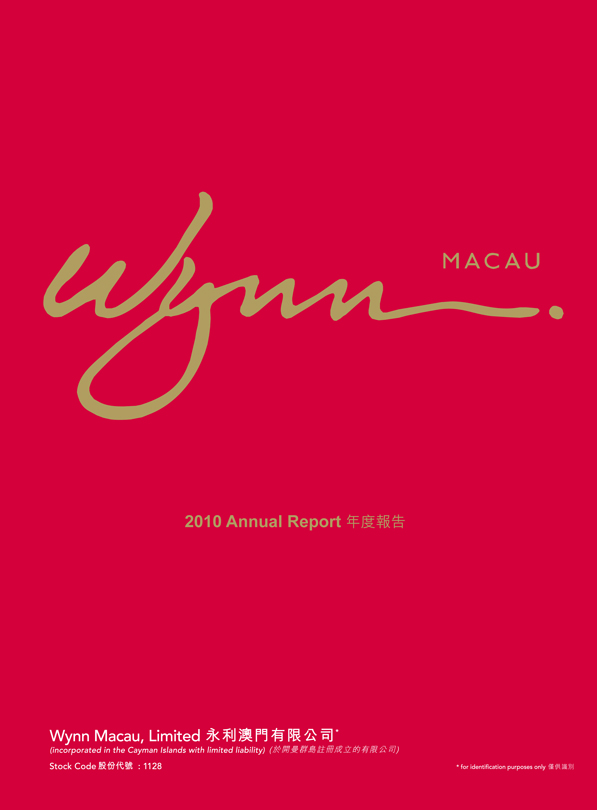
2010 Annual Report Wynn Macau, Limited
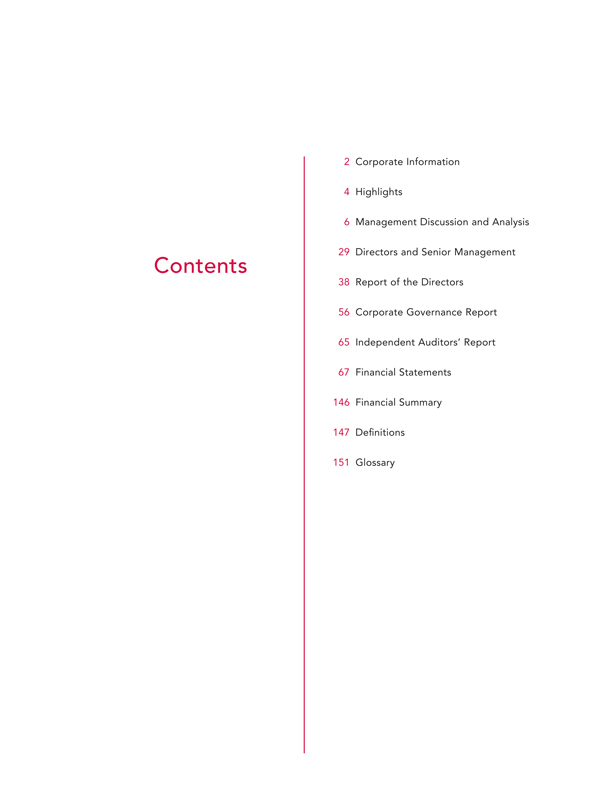
6 | | Management Discussion and Analysis |
29 | | Directors and Senior Management |
Contents
38 | | Report of the Directors |
56 | | Corporate Governance Report |
65 | | Independent Auditors’ Report |
146 Financial Summary
147 Definitions
151 Glossary
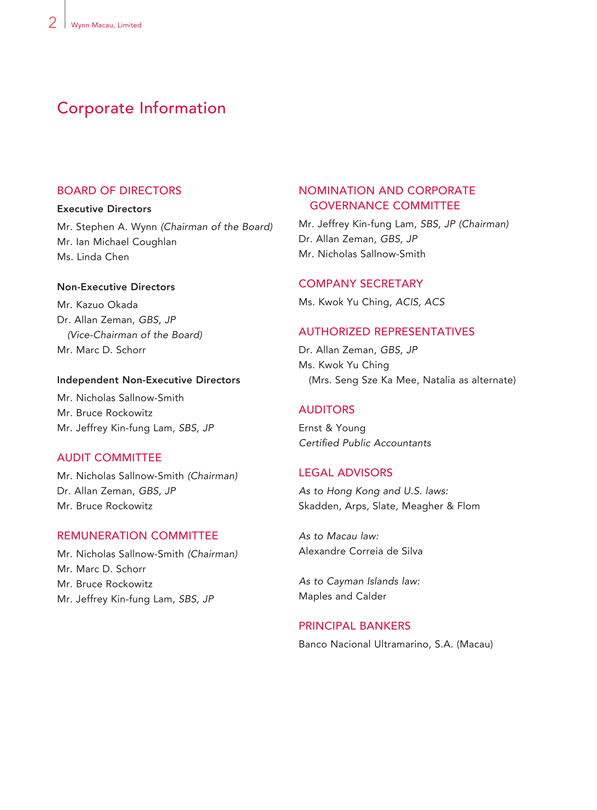
Corporate Information
BOARD OF DIRECTORS
Executive Directors
Mr. Stephen A. Wynn (Chairman of the Board)
Mr. Ian Michael Coughlan Ms. Linda Chen
Non-Executive Directors
Mr. Kazuo Okada Dr. Allan Zeman, GBS, JP
(Vice-Chairman of the Board)
Mr. Marc D. Schorr
Independent Non-Executive Directors
Mr. Nicholas Sallnow-Smith Mr. Bruce Rockowitz Mr. Jeffrey Kin-fung Lam, SBS, JP
AUDIT COMMITTEE
Mr. Nicholas Sallnow-Smith (Chairman) Dr. Allan Zeman, GBS, JP
Mr. Bruce Rockowitz
REMUNERATION COMMITTEE
Mr. Nicholas Sallnow-Smith (Chairman) Mr. Marc D. Schorr Mr. Bruce Rockowitz Mr. Jeffrey Kin-fung Lam, SBS, JP
NOMINATION AND CORPORATE GOVERNANCE COMMITTEE
Mr. Jeffrey Kin-fung Lam, SBS, JP (Chairman) Dr. Allan Zeman, GBS, JP
Mr. Nicholas Sallnow-Smith
COMPANY SECRETARY
Ms. Kwok Yu Ching, ACIS, ACS
AUTHORIZED REPRESENTATIVES
Dr. Allan Zeman, GBS, JP Ms. Kwok Yu Ching
(Mrs. Seng Sze Ka Mee, Natalia as alternate)
AUDITORS
Ernst & Young
Certified Public Accountants
LEGAL ADVISORS
As to Hong Kong and U.S. laws:
Skadden, Arps, Slate, Meagher & Flom
As to Macau law:
Alexandre Correia de Silva
As to Cayman Islands law:
Maples and Calder
PRINCIPAL BANKERS
Banco Nacional Ultramarino, S.A. (Macau)
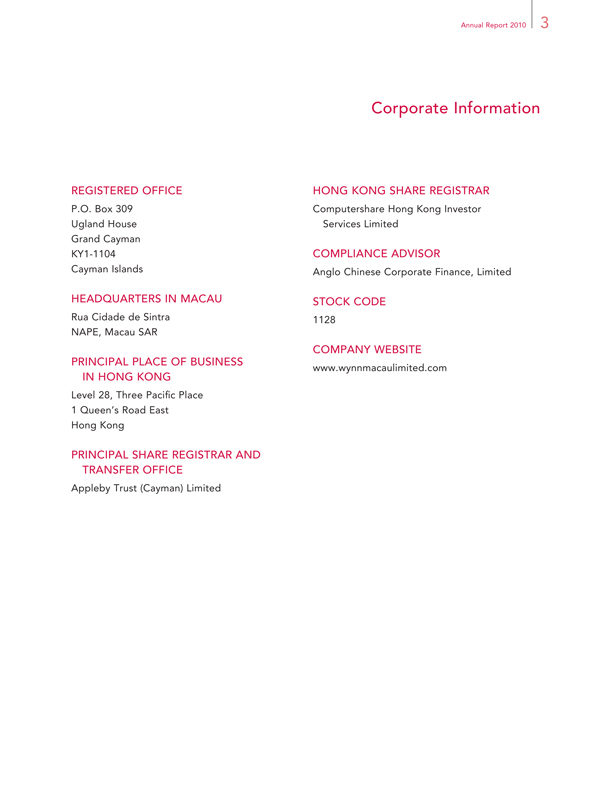
Annual Report 2010 3
Corporate Information
REGISTERED OFFICE HONG KONG SHARE REGISTRAR
P.O. Box 309 Computershare Hong Kong Investor
Ugland House Services Limited
Grand Cayman
KY1-1104 COMPLIANCE ADVISOR
Cayman Islands Anglo Chinese Corporate Finance, Limited
HEADQUARTERS IN MACAU STOCK CODE
Rua Cidade de Sintra 1128
NAPE, Macau SAR
COMPANY WEBSITE
PRINCIPAL PLACE OF BUSINESS www.wynnmacaulimited.com
IN HONG KONG
Level 28, Three Pacific Place
Hong Kong
PRINCIPAL SHARE REGISTRAR AND
TRANSFER OFFICE
Appleby Trust (Cayman) Limited
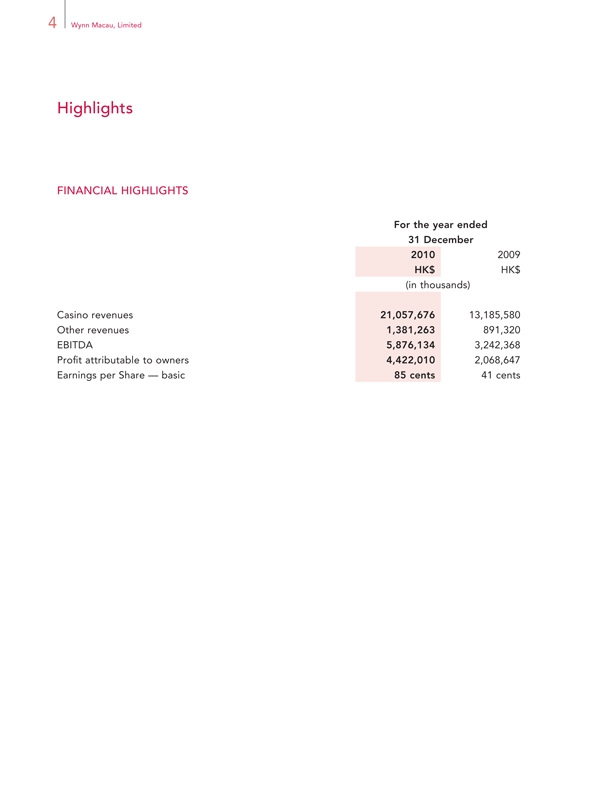
Highlights
FINANCIAL HIGHLIGHTS
For the year ended
2010 2009
HK$ HK$
(in thousands)
Casino revenues 21,057,676 13,185,580
Other revenues 1,381,263 891,320
EBITDA 5,876,134 3,242,368
Profit attributable to owners 4,422,010 2,068,647
Earnings per Share — basic 85 cents 41 cents
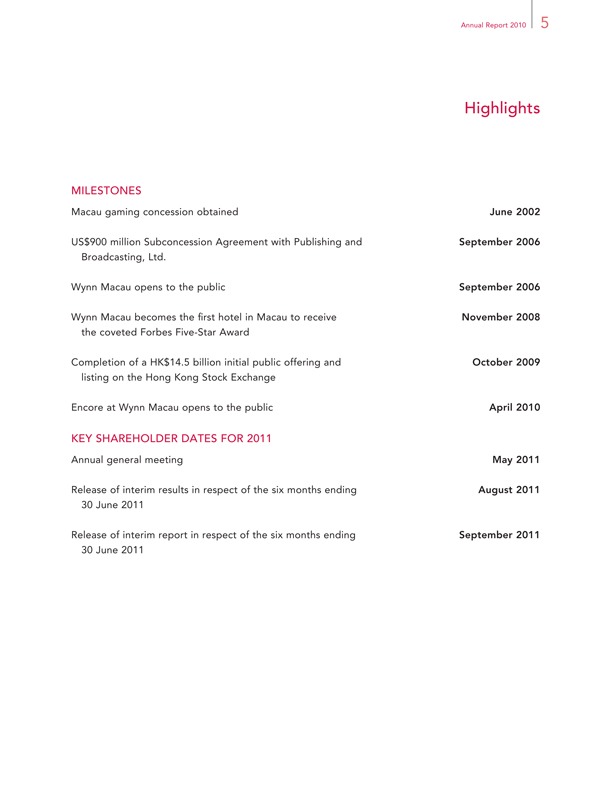
Annual Report 2010 5
Highlights
MILESTONES
Macau gaming concession obtained June 2002
US$900 million Subconcession Agreement with Publishing and September 2006
Broadcasting, Ltd.
Wynn Macau opens to the public September 2006
Wynn Macau becomes the first hotel in Macau to receive November 2008
the coveted Forbes Five-Star Award
Completion of a HK$14.5 billion initial public offering and October 2009
listing on the Hong Kong Stock Exchange
Encore at Wynn Macau opens to the public April 2010
KEY SHAREHOLDER DATES FOR 2011
Annual general meeting May 2011
Release of interim results in respect of the six months ending August 2011
Release of interim report in respect of the six months ending September 2011
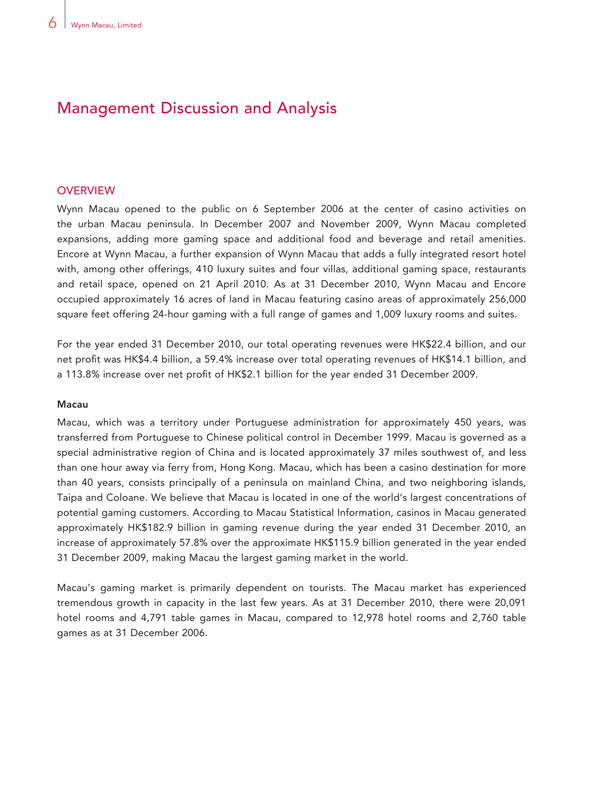
Management Discussion and Analysis
OVERVIEW
Wynn Macau opened to the public on 6 September 2006 at the center of casino activities on the urban Macau peninsula. In December 2007 and November 2009, Wynn Macau completed expansions, adding more gaming space and additional food and beverage and retail amenities. Encore at Wynn Macau, a further expansion of Wynn Macau that adds a fully integrated resort hotel with, among other offerings, 410 luxury suites and four villas, additional gaming space, restaurants and retail space, opened on 21 April 2010. As at 31 December 2010, Wynn Macau and Encore occupied approximately 16 acres of land in Macau featuring casino areas of approximately 256,000 square feet offering 24-hour gaming with a full range of games and 1,009 luxury rooms and suites.
For the year ended 31 December 2010, our total operating revenues were HK$22.4 billion, and our net profit was HK$4.4 billion, a 59.4% increase over total operating revenues of HK$14.1 billion, and a 113.8% increase over net profit of HK$2.1 billion for the year ended 31 December 2009.
Macau
Macau, which was a territory under Portuguese administration for approximately 450 years, was transferred from Portuguese to Chinese political control in December 1999. Macau is governed as a special administrative region of China and is located approximately 37 miles southwest of, and less than one hour away via ferry from, Hong Kong. Macau, which has been a casino destination for more than 40 years, consists principally of a peninsula on mainland China, and two neighboring islands, Taipa and Coloane. We believe that Macau is located in one of the world’s largest concentrations of potential gaming customers. According to Macau Statistical Information, casinos in Macau generated approximately HK$182.9 billion in gaming revenue during the year ended 31 December 2010, an increase of approximately 57.8% over the approximate HK$115.9 billion generated in the year ended 31 December 2009, making Macau the largest gaming market in the world.
Macau’s gaming market is primarily dependent on tourists. The Macau market has experienced tremendous growth in capacity in the last few years. As at 31 December 2010, there were 20,091 hotel rooms and 4,791 table games in Macau, compared to 12,978 hotel rooms and 2,760 table games as at 31 December 2006.
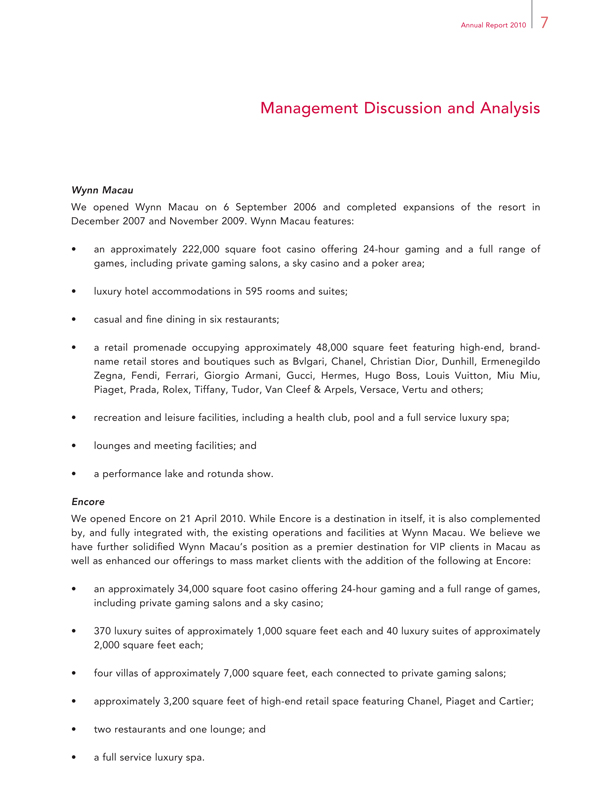
Annual Report 2010 7
Management Discussion and Analysis
Wynn Macau
We opened Wynn Macau on 6 September 2006 and completed expansions of the resort in December 2007 and November 2009. Wynn Macau features:
an approximately 222,000 square foot casino offering 24-hour gaming and a full range of games, including private gaming salons, a sky casino and a poker area;
luxury hotel accommodations in 595 rooms and suites;
casual and fine dining in six restaurants;
a retail promenade occupying approximately 48,000 square feet featuring high-end, brand- name retail stores and boutiques such as Bvlgari, Chanel, Christian Dior, Dunhill, Ermenegildo Zegna, Fendi, Ferrari, Giorgio Armani, Gucci, Hermes, Hugo Boss, Louis Vuitton, Miu Miu, Piaget, Prada, Rolex, Tiffany, Tudor, Van Cleef & Arpels, Versace, Vertu and others;
recreation and leisure facilities, including a health club, pool and a full service luxury spa;
lounges and meeting facilities; and
a performance lake and rotunda show.
Encore
We opened Encore on 21 April 2010. While Encore is a destination in itself, it is also complemented by, and fully integrated with, the existing operations and facilities at Wynn Macau. We believe we have further solidified Wynn Macau’s position as a premier destination for VIP clients in Macau as well as enhanced our offerings to mass market clients with the addition of the following at Encore:
an approximately 34,000 square foot casino offering 24-hour gaming and a full range of games, including private gaming salons and a sky casino;
370 luxury suites of approximately 1,000 square feet each and 40 luxury suites of approximately 2,000 square feet each;
four villas of approximately 7,000 square feet, each connected to private gaming salons;
approximately 3,200 square feet of high-end retail space featuring Chanel, Piaget and Cartier;
two restaurants and one lounge; and
a full service luxury spa.
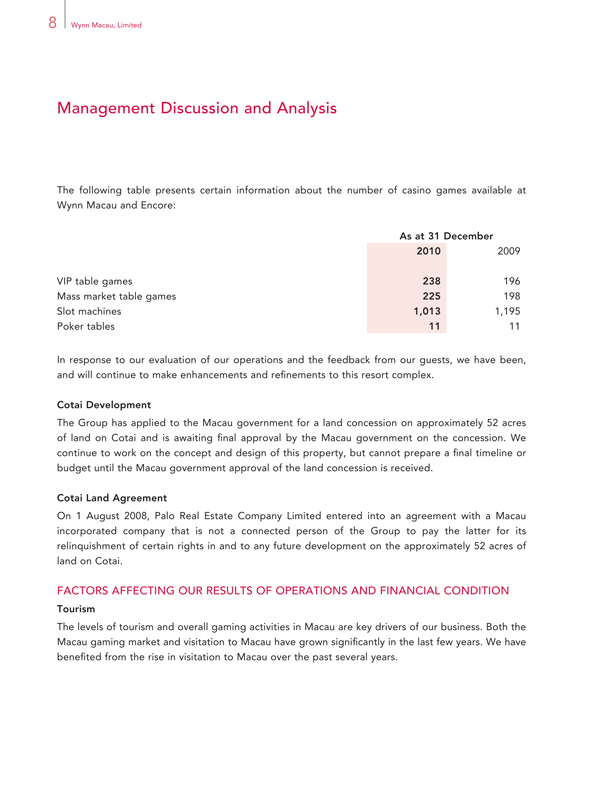
Management Discussion and Analysis
The following table presents certain information about the number of casino games available at Wynn Macau and Encore:
As at 31 December
2010 2009
VIP table games 238 196
Mass market table games 225 198
Slot machines 1,013 1,195
Poker tables 11 11
In response to our evaluation of our operations and the feedback from our guests, we have been, and will continue to make enhancements and refinements to this resort complex.
Cotai Development
The Group has applied to the Macau government for a land concession on approximately 52 acres of land on Cotai and is awaiting final approval by the Macau government on the concession. We continue to work on the concept and design of this property, but cannot prepare a final timeline or budget until the Macau government approval of the land concession is received.
Cotai Land Agreement
On 1 August 2008, Palo Real Estate Company Limited entered into an agreement with a Macau incorporated company that is not a connected person of the Group to pay the latter for its relinquishment of certain rights in and to any future development on the approximately 52 acres of land on Cotai.
FACTORS AFFECTING OUR RESULTS OF OPERATIONS AND FINANCIAL CONDITION
Tourism
The levels of tourism and overall gaming activities in Macau are key drivers of our business. Both the Macau gaming market and visitation to Macau have grown significantly in the last few years. We have benefited from the rise in visitation to Macau over the past several years.
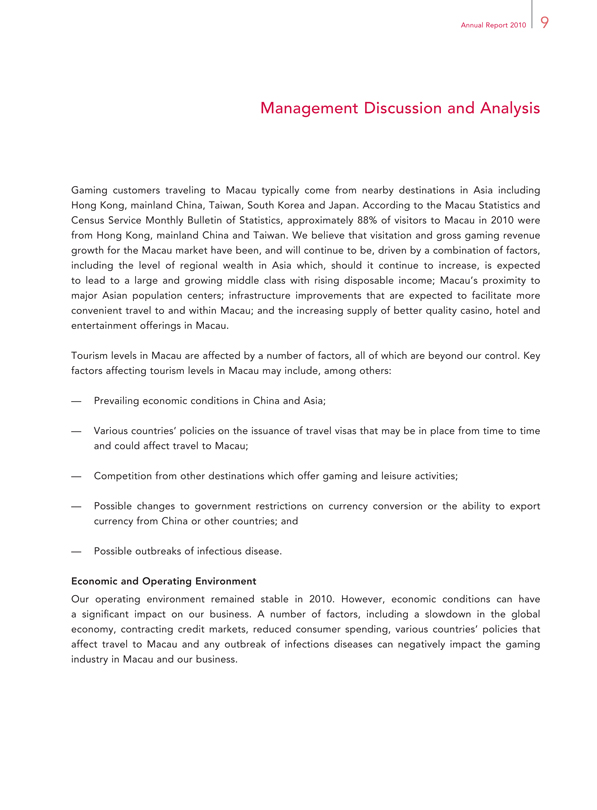
Annual Report 2010 9
Management Discussion and Analysis
Gaming customers traveling to Macau typically come from nearby destinations in Asia including Hong Kong, mainland China, Taiwan, South Korea and Japan. According to the Macau Statistics and Census Service Monthly Bulletin of Statistics, approximately 88% of visitors to Macau in 2010 were from Hong Kong, mainland China and Taiwan. We believe that visitation and gross gaming revenue growth for the Macau market have been, and will continue to be, driven by a combination of factors, including the level of regional wealth in Asia which, should it continue to increase, is expected to lead to a large and growing middle class with rising disposable income; Macau’s proximity to major Asian population centers; infrastructure improvements that are expected to facilitate more convenient travel to and within Macau; and the increasing supply of better quality casino, hotel and entertainment offerings in Macau.
Tourism levels in Macau are affected by a number of factors, all of which are beyond our control. Key factors affecting tourism levels in Macau may include, among others:
Prevailing economic conditions in China and Asia;
Various countries’ policies on the issuance of travel visas that may be in place from time to time and could affect travel to Macau;
Competition from other destinations which offer gaming and leisure activities;
Possible changes to government restrictions on currency conversion or the ability to export currency from China or other countries; and
Possible outbreaks of infectious disease.
Economic and Operating Environment
Our operating environment remained stable in 2010. However, economic conditions can have a significant impact on our business. A number of factors, including a slowdown in the global economy, contracting credit markets, reduced consumer spending, various countries’ policies that affect travel to Macau and any outbreak of infections diseases can negatively impact the gaming industry in Macau and our business.
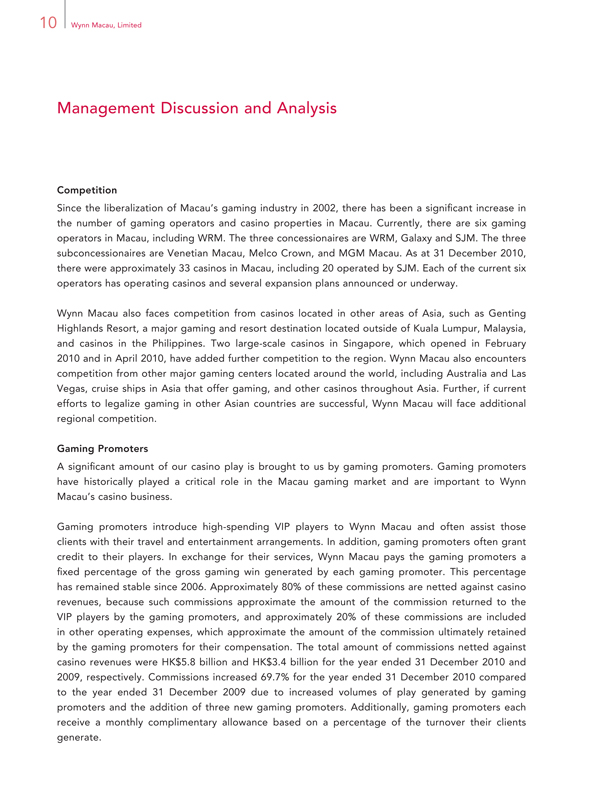
10 Wynn Macau, Limited
Management Discussion and Analysis
Competition
Since the liberalization of Macau’s gaming industry in 2002, there has been a significant increase in the number of gaming operators and casino properties in Macau. Currently, there are six gaming operators in Macau, including WRM. The three concessionaires are WRM, Galaxy and SJM. The three subconcessionaires are Venetian Macau, Melco Crown, and MGM Macau. As at 31 December 2010, there were approximately 33 casinos in Macau, including 20 operated by SJM. Each of the current six operators has operating casinos and several expansion plans announced or underway.
Wynn Macau also faces competition from casinos located in other areas of Asia, such as Genting Highlands Resort, a major gaming and resort destination located outside of Kuala Lumpur, Malaysia, and casinos in the Philippines. Two large-scale casinos in Singapore, which opened in February 2010 and in April 2010, have added further competition to the region. Wynn Macau also encounters competition from other major gaming centers located around the world, including Australia and Las Vegas, cruise ships in Asia that offer gaming, and other casinos throughout Asia. Further, if current efforts to legalize gaming in other Asian countries are successful, Wynn Macau will face additional regional competition.
Gaming Promoters
A significant amount of our casino play is brought to us by gaming promoters. Gaming promoters have historically played a critical role in the Macau gaming market and are important to Wynn Macau’s casino business.
Gaming promoters introduce high-spending VIP players to Wynn Macau and often assist those clients with their travel and entertainment arrangements. In addition, gaming promoters often grant credit to their players. In exchange for their services, Wynn Macau pays the gaming promoters a fixed percentage of the gross gaming win generated by each gaming promoter. This percentage has remained stable since 2006. Approximately 80% of these commissions are netted against casino revenues, because such commissions approximate the amount of the commission returned to the VIP players by the gaming promoters, and approximately 20% of these commissions are included in other operating expenses, which approximate the amount of the commission ultimately retained by the gaming promoters for their compensation. The total amount of commissions netted against casino revenues were HK$5.8 billion and HK$3.4 billion for the year ended 31 December 2010 and 2009, respectively. Commissions increased 69.7% for the year ended 31 December 2010 compared to the year ended 31 December 2009 due to increased volumes of play generated by gaming promoters and the addition of three new gaming promoters. Additionally, gaming promoters each receive a monthly complimentary allowance based on a percentage of the turnover their clients generate.
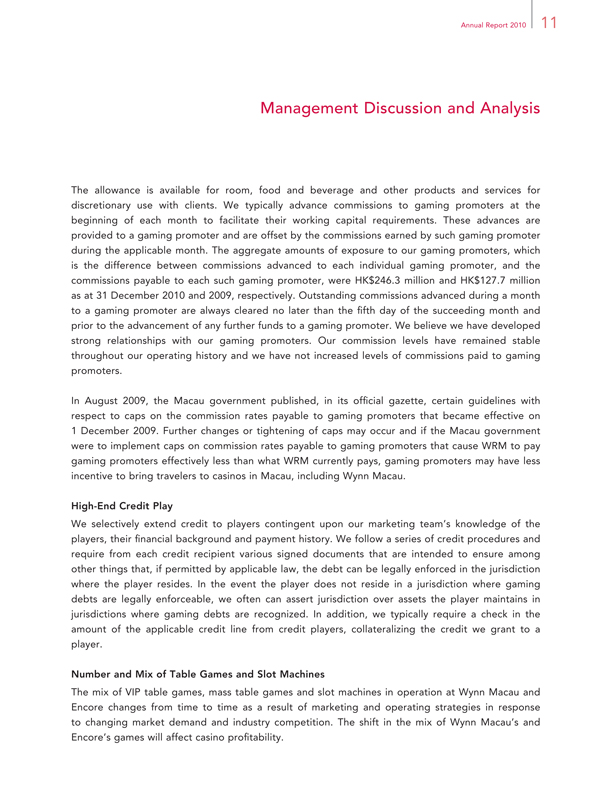
Annual Report 2010 11
Management Discussion and Analysis
The allowance is available for room, food and beverage and other products and services for discretionary use with clients. We typically advance commissions to gaming promoters at the beginning of each month to facilitate their working capital requirements. These advances are provided to a gaming promoter and are offset by the commissions earned by such gaming promoter during the applicable month. The aggregate amounts of exposure to our gaming promoters, which is the difference between commissions advanced to each individual gaming promoter, and the commissions payable to each such gaming promoter, were HK$246.3 million and HK$127.7 million as at 31 December 2010 and 2009, respectively. Outstanding commissions advanced during a month to a gaming promoter are always cleared no later than the fifth day of the succeeding month and prior to the advancement of any further funds to a gaming promoter. We believe we have developed strong relationships with our gaming promoters. Our commission levels have remained stable throughout our operating history and we have not increased levels of commissions paid to gaming promoters.
In August 2009, the Macau government published, in its official gazette, certain guidelines with respect to caps on the commission rates payable to gaming promoters that became effective on 1 December 2009. Further changes or tightening of caps may occur and if the Macau government were to implement caps on commission rates payable to gaming promoters that cause WRM to pay gaming promoters effectively less than what WRM currently pays, gaming promoters may have less incentive to bring travelers to casinos in Macau, including Wynn Macau.
High-End Credit Play
We selectively extend credit to players contingent upon our marketing team’s knowledge of the players, their financial background and payment history. We follow a series of credit procedures and require from each credit recipient various signed documents that are intended to ensure among other things that, if permitted by applicable law, the debt can be legally enforced in the jurisdiction where the player resides. In the event the player does not reside in a jurisdiction where gaming debts are legally enforceable, we often can assert jurisdiction over assets the player maintains in jurisdictions where gaming debts are recognized. In addition, we typically require a check in the amount of the applicable credit line from credit players, collateralizing the credit we grant to a player.
Number and Mix of Table Games and Slot Machines
The mix of VIP table games, mass table games and slot machines in operation at Wynn Macau and Encore changes from time to time as a result of marketing and operating strategies in response to changing market demand and industry competition. The shift in the mix of Wynn Macau’s and Encore’s games will affect casino profitability.

12 Wynn Macau, Limited
Management Discussion and Analysis
ADJUSTED EBITDA
Adjusted EBITDA is earnings before finance costs, taxes, depreciation, amortization, pre-opening costs, property charges and other, share-based payments, and other non-operating income/ (expense). Adjusted EBITDA is presented exclusively as a supplemental disclosure because our Directors believe that it is widely used to measure the performance, and as a basis for valuation, of gaming companies. Our Adjusted EBITDA presented herein also differs from the Adjusted EBITDA presented by Wynn Resorts, Limited for its Macau segment in its filings with the Securities and Exchange Commission in the United States, primarily due to the inclusion of royalty fees, adjustments for IFRS differences with U.S. GAAP, corporate support and other support services in arriving at operating profit.
The following table sets forth a quantitative reconciliation of Adjusted EBITDA to its most directly comparable IFRS measurement, operating profit, for the years ended 31 December 2010 and 2009.
Note:
Pre-opening costs for the years 2010 and 2009 primarily consisted of payroll attributable to staff engaged in the start-up operations of Encore which opened on 21 April 2010.
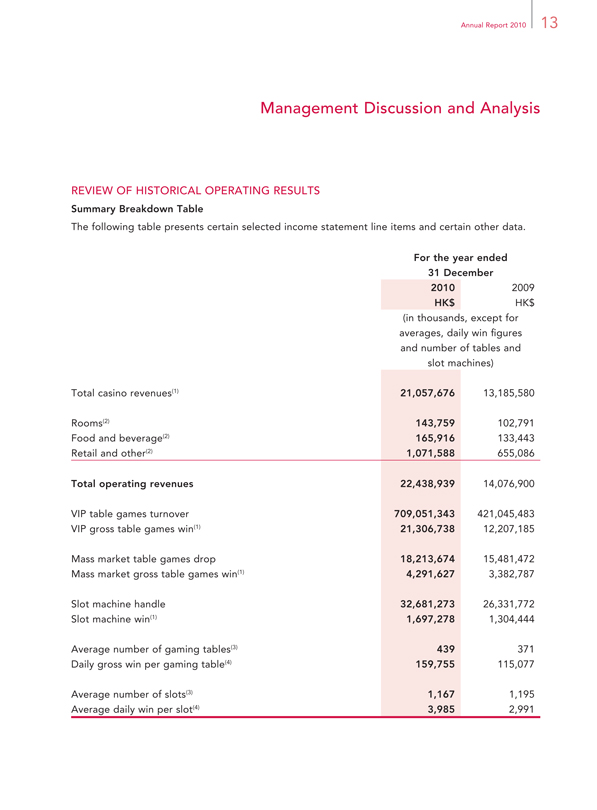
Annual Report 2010 13
Management Discussion and Analysis
REVIEW OF HISTORICAL OPERATING RESULTS
Summary Breakdown Table
The following table presents certain selected income statement line items and certain other data.
For the year ended
2010 2009
HK$ HK$
(in thousands, except for
averages, daily win figures
and number of tables and
slot machines)
Total casino revenues(1) 21,057,676 13,185,580
Rooms(2) 143,759 102,791
Food and beverage(2) 165,916 133,443
Retail and other(2) 1,071,588 655,086
Total operating revenues 22,438,939 14,076,900
VIP table games turnover 709,051,343 421,045,483
VIP gross table games win(1) 21,306,738 12,207,185
Mass market table games drop 18,213,674 15,481,472
Mass market gross table games win(1) 4,291,627 3,382,787
Slot machine handle 32,681,273 26,331,772
Slot machine win(1) 1,697,278 1,304,444
Average number of gaming tables(3) 439 371
Daily gross win per gaming table(4) 159,755 115,077
Average number of slots(3) 1,167 1,195
Average daily win per slot(4) 3,985 2,991
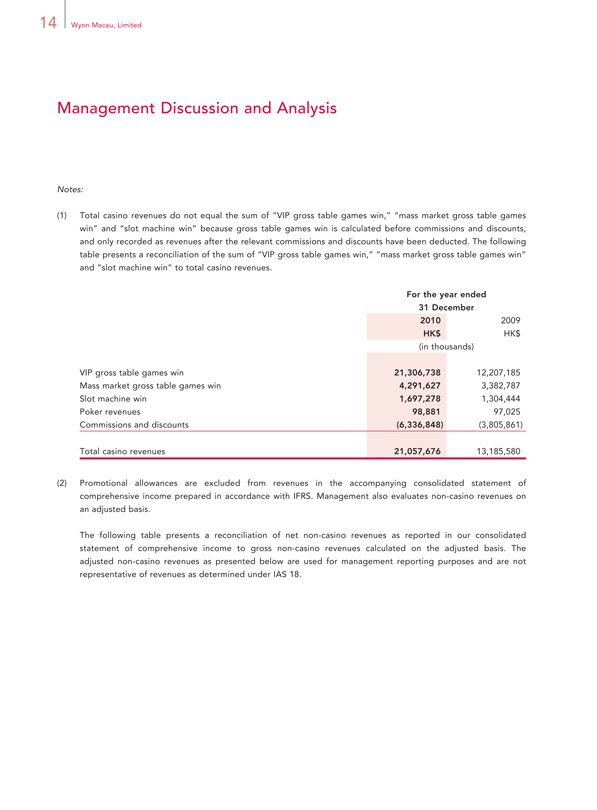
14 Wynn Macau, Limited
Management Discussion and Analysis
Notes:
Total casino revenues do not equal the sum of “VIP gross table games win,” “mass market gross table games win” and “slot machine win” because gross table games win is calculated before commissions and discounts, and only recorded as revenues after the relevant commissions and discounts have been deducted. The following table presents a reconciliation of the sum of “VIP gross table games win,” “mass market gross table games win” and “slot machine win” to total casino revenues.
For the year ended
2010 2009
HK$ HK$
(in thousands)
VIP gross table games win 21,306,738 12,207,185
Mass market gross table games win 4,291,627 3,382,787
Slot machine win 1,697,278 1,304,444
Poker revenues 98,881 97,025
Commissions and discounts(6,336,848)(3,805,861)
Total casino revenues 21,057,676 13,185,580
Promotional allowances are excluded from revenues in the accompanying consolidated statement of comprehensive income prepared in accordance with IFRS. Management also evaluates non-casino revenues on an adjusted basis.
The following table presents a reconciliation of net non-casino revenues as reported in our consolidated statement of comprehensive income to gross non-casino revenues calculated on the adjusted basis. The adjusted non-casino revenues as presented below are used for management reporting purposes and are not representative of revenues as determined under IAS 18.
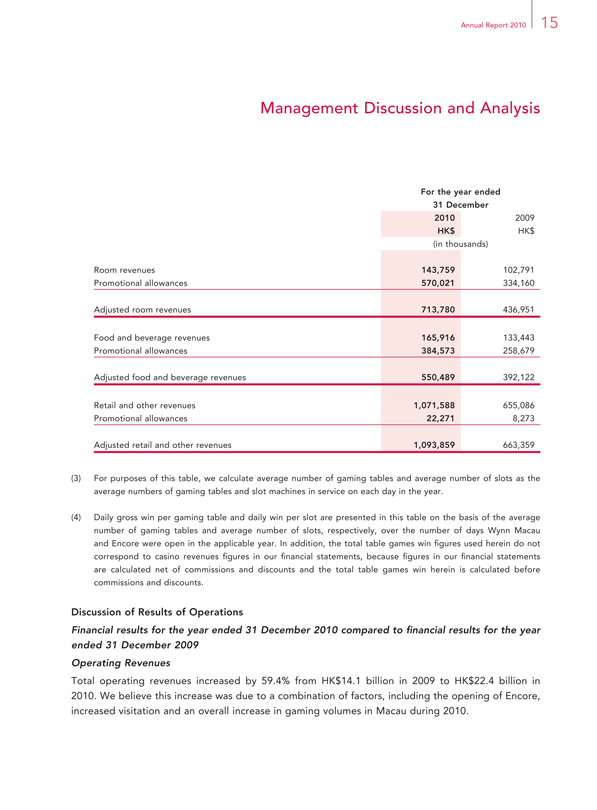
Annual Report 2010 15
Management Discussion and Analysis
For the year ended
2010 2009
HK$ HK$
(in thousands)
Room revenues 143,759 102,791
Promotional allowances 570,021 334,160
Adjusted room revenues 713,780 436,951
Food and beverage revenues 165,916 133,443
Promotional allowances 384,573 258,679
Adjusted food and beverage revenues 550,489 392,122
Retail and other revenues 1,071,588 655,086
Promotional allowances 22,271 8,273
Adjusted retail and other revenues 1,093,859 663,359
For purposes of this table, we calculate average number of gaming tables and average number of slots as the average numbers of gaming tables and slot machines in service on each day in the year.
Daily gross win per gaming table and daily win per slot are presented in this table on the basis of the average number of gaming tables and average number of slots, respectively, over the number of days Wynn Macau and Encore were open in the applicable year. In addition, the total table games win figures used herein do not correspond to casino revenues figures in our financial statements, because figures in our financial statements are calculated net of commissions and discounts and the total table games win herein is calculated before commissions and discounts.
Discussion of Results of Operations
Financial results for the year ended 31 December 2010 compared to financial results for the year ended 31 December 2009
Operating Revenues
Total operating revenues increased by 59.4% from HK$14.1 billion in 2009 to HK$22.4 billion in 2010. We believe this increase was due to a combination of factors, including the opening of Encore, increased visitation and an overall increase in gaming volumes in Macau during 2010.
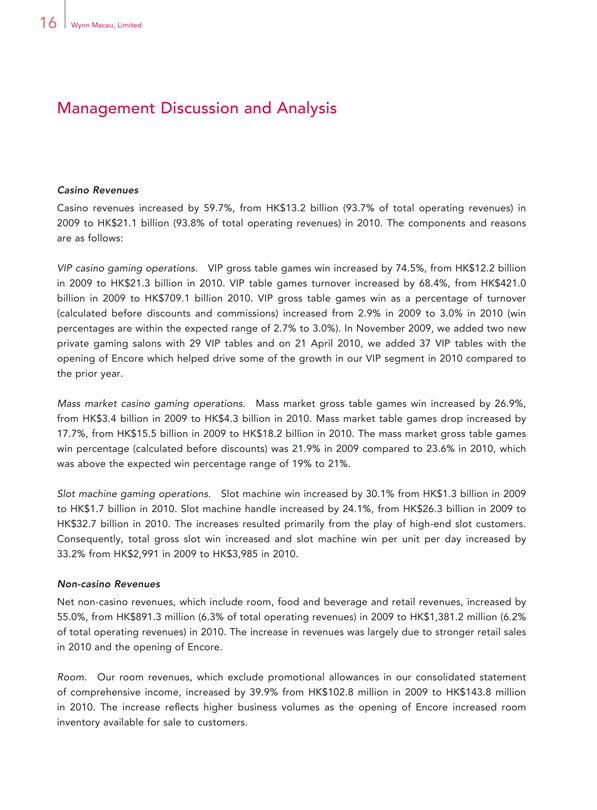
16 Wynn Macau, Limited
Management Discussion and Analysis
Casino Revenues
Casino revenues increased by 59.7%, from HK$13.2 billion (93.7% of total operating revenues) in 2009 to HK$21.1 billion (93.8% of total operating revenues) in 2010. The components and reasons are as follows:
VIP casino gaming operations. VIP gross table games win increased by 74.5%, from HK$12.2 billion in 2009 to HK$21.3 billion in 2010. VIP table games turnover increased by 68.4%, from HK$421.0 billion in 2009 to HK$709.1 billion 2010. VIP gross table games win as a percentage of turnover (calculated before discounts and commissions) increased from 2.9% in 2009 to 3.0% in 2010 (win percentages are within the expected range of 2.7% to 3.0%). In November 2009, we added two new private gaming salons with 29 VIP tables and on 21 April 2010, we added 37 VIP tables with the opening of Encore which helped drive some of the growth in our VIP segment in 2010 compared to the prior year.
Mass market casino gaming operations. Mass market gross table games win increased by 26.9%, from HK$3.4 billion in 2009 to HK$4.3 billion in 2010. Mass market table games drop increased by 17.7%, from HK$15.5 billion in 2009 to HK$18.2 billion in 2010. The mass market gross table games win percentage (calculated before discounts) was 21.9% in 2009 compared to 23.6% in 2010, which was above the expected win percentage range of 19% to 21%.
Slot machine gaming operations. Slot machine win increased by 30.1% from HK$1.3 billion in 2009 to HK$1.7 billion in 2010. Slot machine handle increased by 24.1%, from HK$26.3 billion in 2009 to HK$32.7 billion in 2010. The increases resulted primarily from the play of high-end slot customers. Consequently, total gross slot win increased and slot machine win per unit per day increased by 33.2% from HK$2,991 in 2009 to HK$3,985 in 2010.
Non-casino Revenues
Net non-casino revenues, which include room, food and beverage and retail revenues, increased by 55.0%, from HK$891.3 million (6.3% of total operating revenues) in 2009 to HK$1,381.2 million (6.2% of total operating revenues) in 2010. The increase in revenues was largely due to stronger retail sales in 2010 and the opening of Encore.
Room. Our room revenues, which exclude promotional allowances in our consolidated statement of comprehensive income, increased by 39.9% from HK$102.8 million in 2009 to HK$143.8 million in 2010. The increase reflects higher business volumes as the opening of Encore increased room inventory available for sale to customers.
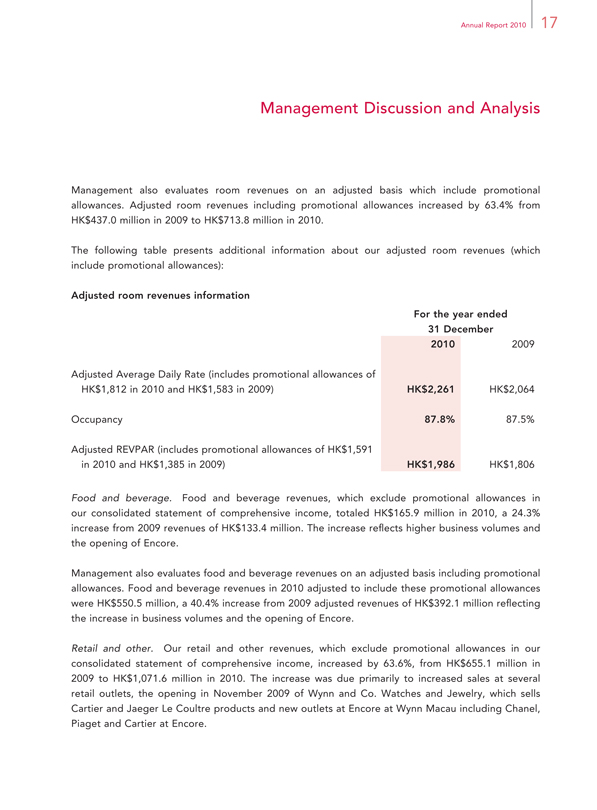
Annual Report 2010 17
Management Discussion and Analysis
Management also evaluates room revenues on an adjusted basis which include promotional allowances. Adjusted room revenues including promotional allowances increased by 63.4% from HK$437.0 million in 2009 to HK$713.8 million in 2010.
The following table presents additional information about our adjusted room revenues (which include promotional allowances):
Food and beverage. Food and beverage revenues, which exclude promotional allowances in our consolidated statement of comprehensive income, totaled HK$165.9 million in 2010, a 24.3% increase from 2009 revenues of HK$133.4 million. The increase reflects higher business volumes and the opening of Encore.
Management also evaluates food and beverage revenues on an adjusted basis including promotional allowances. Food and beverage revenues in 2010 adjusted to include these promotional allowances were HK$550.5 million, a 40.4% increase from 2009 adjusted revenues of HK$392.1 million reflecting the increase in business volumes and the opening of Encore.
Retail and other. Our retail and other revenues, which exclude promotional allowances in our consolidated statement of comprehensive income, increased by 63.6%, from HK$655.1 million in 2009 to HK$1,071.6 million in 2010. The increase was due primarily to increased sales at several retail outlets, the opening in November 2009 of Wynn and Co. Watches and Jewelry, which sells Cartier and Jaeger Le Coultre products and new outlets at Encore at Wynn Macau including Chanel, Piaget and Cartier at Encore.
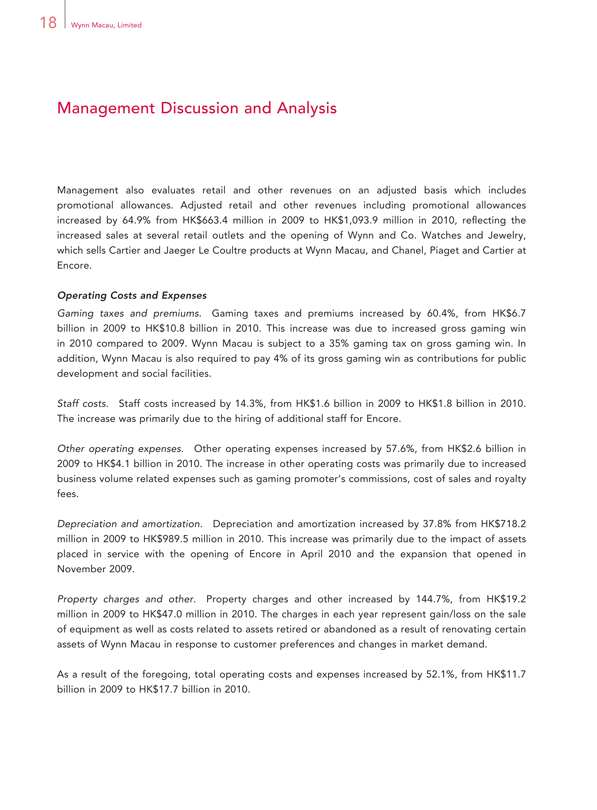
18 Wynn Macau, Limited
Management Discussion and Analysis
Management also evaluates retail and other revenues on an adjusted basis which includes promotional allowances. Adjusted retail and other revenues including promotional allowances increased by 64.9% from HK$663.4 million in 2009 to HK$1,093.9 million in 2010, reflecting the increased sales at several retail outlets and the opening of Wynn and Co. Watches and Jewelry, which sells Cartier and Jaeger Le Coultre products at Wynn Macau, and Chanel, Piaget and Cartier at Encore.
Operating Costs and Expenses
Gaming taxes and premiums. Gaming taxes and premiums increased by 60.4%, from HK$6.7 billion in 2009 to HK$10.8 billion in 2010. This increase was due to increased gross gaming win in 2010 compared to 2009. Wynn Macau is subject to a 35% gaming tax on gross gaming win. In addition, Wynn Macau is also required to pay 4% of its gross gaming win as contributions for public development and social facilities.
Staff costs. Staff costs increased by 14.3%, from HK$1.6 billion in 2009 to HK$1.8 billion in 2010. The increase was primarily due to the hiring of additional staff for Encore.
Other operating expenses. Other operating expenses increased by 57.6%, from HK$2.6 billion in 2009 to HK$4.1 billion in 2010. The increase in other operating costs was primarily due to increased business volume related expenses such as gaming promoter’s commissions, cost of sales and royalty fees.
Depreciation and amortization. Depreciation and amortization increased by 37.8% from HK$718.2 million in 2009 to HK$989.5 million in 2010. This increase was primarily due to the impact of assets placed in service with the opening of Encore in April 2010 and the expansion that opened in November 2009.
Property charges and other. Property charges and other increased by 144.7%, from HK$19.2 million in 2009 to HK$47.0 million in 2010. The charges in each year represent gain/loss on the sale of equipment as well as costs related to assets retired or abandoned as a result of renovating certain assets of Wynn Macau in response to customer preferences and changes in market demand.
As a result of the foregoing, total operating costs and expenses increased by 52.1%, from HK$11.7 billion in 2009 to HK$17.7 billion in 2010.
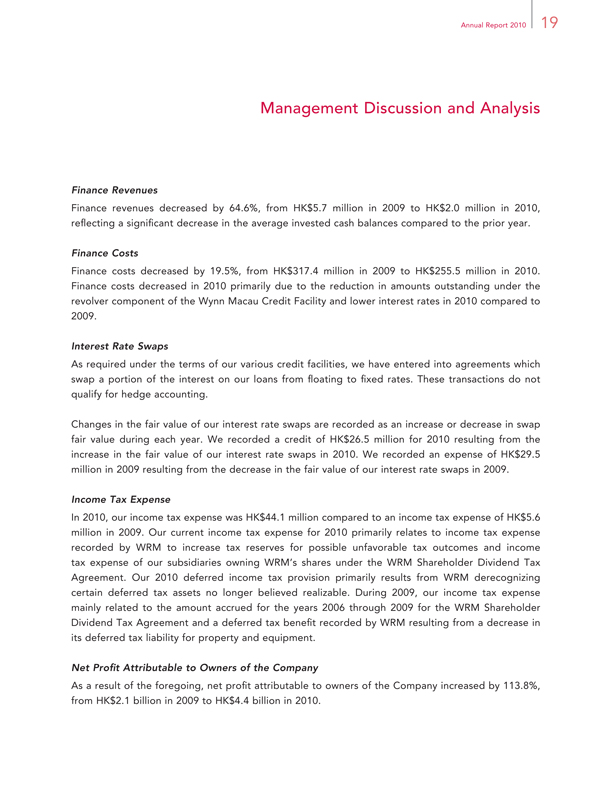
Annual Report 2010 19
Management Discussion and Analysis
Finance Revenues
Finance revenues decreased by 64.6%, from HK$5.7 million in 2009 to HK$2.0 million in 2010, reflecting a significant decrease in the average invested cash balances compared to the prior year.
Finance Costs
Finance costs decreased by 19.5%, from HK$317.4 million in 2009 to HK$255.5 million in 2010. Finance costs decreased in 2010 primarily due to the reduction in amounts outstanding under the revolver component of the Wynn Macau Credit Facility and lower interest rates in 2010 compared to 2009.
Interest Rate Swaps
As required under the terms of our various credit facilities, we have entered into agreements which swap a portion of the interest on our loans from floating to fixed rates. These transactions do not qualify for hedge accounting.
Changes in the fair value of our interest rate swaps are recorded as an increase or decrease in swap fair value during each year. We recorded a credit of HK$26.5 million for 2010 resulting from the increase in the fair value of our interest rate swaps in 2010. We recorded an expense of HK$29.5 million in 2009 resulting from the decrease in the fair value of our interest rate swaps in 2009.
Income Tax Expense
In 2010, our income tax expense was HK$44.1 million compared to an income tax expense of HK$5.6 million in 2009. Our current income tax expense for 2010 primarily relates to income tax expense recorded by WRM to increase tax reserves for possible unfavorable tax outcomes and income tax expense of our subsidiaries owning WRM’s shares under the WRM Shareholder Dividend Tax Agreement. Our 2010 deferred income tax provision primarily results from WRM derecognizing certain deferred tax assets no longer believed realizable. During 2009, our income tax expense mainly related to the amount accrued for the years 2006 through 2009 for the WRM Shareholder Dividend Tax Agreement and a deferred tax benefit recorded by WRM resulting from a decrease in its deferred tax liability for property and equipment.
Net Profit Attributable to Owners of the Company
As a result of the foregoing, net profit attributable to owners of the Company increased by 113.8%, from HK$2.1 billion in 2009 to HK$4.4 billion in 2010.
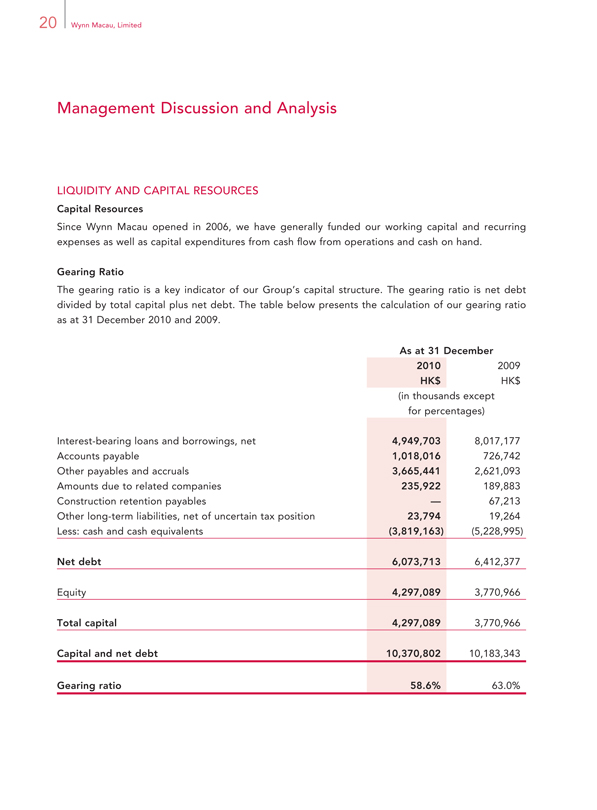
20 Wynn Macau, Limited
Management Discussion and Analysis
LIQUIDITY AND CAPITAL RESOURCES
Capital Resources
Since Wynn Macau opened in 2006, we have generally funded our working capital and recurring expenses as well as capital expenditures from cash flow from operations and cash on hand.
Gearing Ratio
The gearing ratio is a key indicator of our Group’s capital structure. The gearing ratio is net debt divided by total capital plus net debt. The table below presents the calculation of our gearing ratio as at 31 December 2010 and 2009.
As at 31 December
2010 2009
HK$ HK$
(in thousands except
for percentages)
Interest-bearing loans and borrowings, net 4,949,703 8,017,177
Accounts payable 1,018,016 726,742
Other payables and accruals 3,665,441 2,621,093
Amounts due to related companies 235,922 189,883
Construction retention payables — 67,213
Other long-term liabilities, net of uncertain tax position 23,794 19,264
Less: cash and cash equivalents (3,819,163) (5,228,995)
Net debt 6,073,713 6,412,377
Equity 4,297,089 3,770,966
Total capital 4,297,089 3,770,966
Capital and net debt 10,370,802 10,183,343
Gearing ratio
58.6%
63.0%
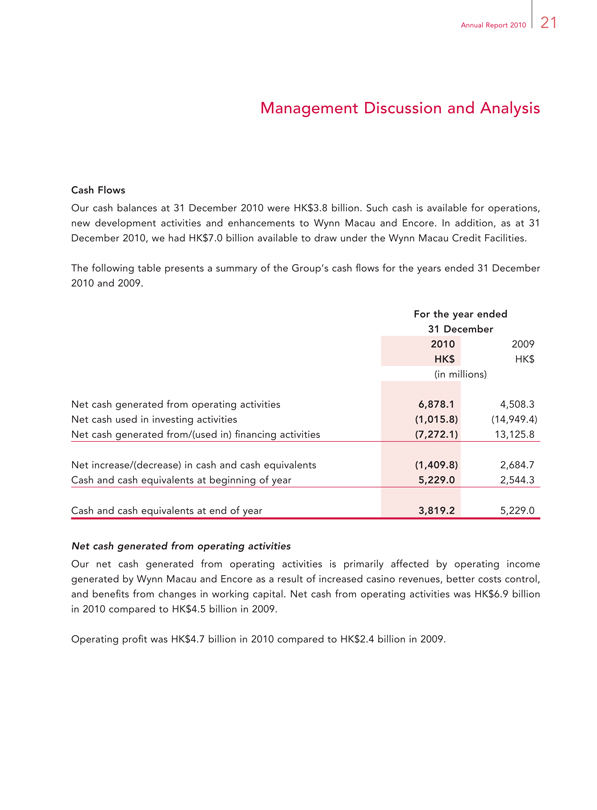
Annual Report 2010 21
Management Discussion and Analysis
Cash Flows
Our cash balances at 31 December 2010 were HK$3.8 billion. Such cash is available for operations, new development activities and enhancements to Wynn Macau and Encore. In addition, as at 31 December 2010, we had HK$7.0 billion available to draw under the Wynn Macau Credit Facilities.
The following table presents a summary of the Group’s cash flows for the years ended 31 December 2010 and 2009.
For the year ended
2010 2009
HK$ HK$
(in millions)
Net cash generated from operating activities 6,878.1 4,508.3
Net cash used in investing activities (1,015.8) (14,949.4)
Net cash generated from/(used in) financing activities(7,272.1) 13,125.8
Net increase/(decrease) in cash and cash equivalents (1,409.8) 2,684.7
Cash and cash equivalents at beginning of year 5,229.0 2,544.3
Cash and cash equivalents at end of year 3,819.2 5,229.0
Net cash generated from operating activities
Our net cash generated from operating activities is primarily affected by operating income generated by Wynn Macau and Encore as a result of increased casino revenues, better costs control, and benefits from changes in working capital. Net cash from operating activities was HK$6.9 billion in 2010 compared to HK$4.5 billion in 2009.
Operating profit was HK$4.7 billion in 2010 compared to HK$2.4 billion in 2009.
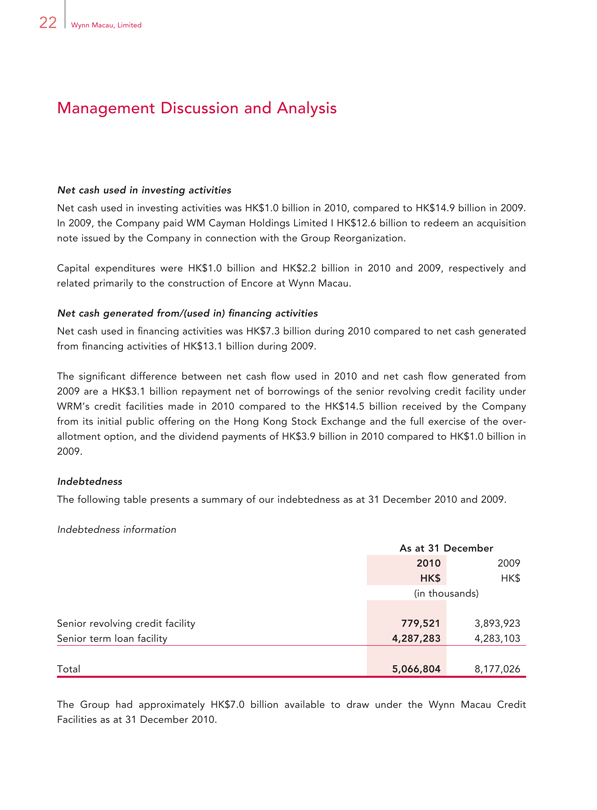
22 Wynn Macau, Limited
Management Discussion and Analysis
Net cash used in investing activities
Net cash used in investing activities was HK$1.0 billion in 2010, compared to HK$14.9 billion in 2009. In 2009, the Company paid WM Cayman Holdings Limited I HK$12.6 billion to redeem an acquisition note issued by the Company in connection with the Group Reorganization.
Capital expenditures were HK$1.0 billion and HK$2.2 billion in 2010 and 2009, respectively and related primarily to the construction of Encore at Wynn Macau.
Net cash generated from/(used in) financing activities
Net cash used in financing activities was HK$7.3 billion during 2010 compared to net cash generated from financing activities of HK$13.1 billion during 2009.
The significant difference between net cash flow used in 2010 and net cash flow generated from 2009 are a HK$3.1 billion repayment net of borrowings of the senior revolving credit facility under WRM’s credit facilities made in 2010 compared to the HK$14.5 billion received by the Company from its initial public offering on the Hong Kong Stock Exchange and the full exercise of the over-allotment option, and the dividend payments of HK$3.9 billion in 2010 compared to HK$1.0 billion in 2009.
Indebtedness
The following table presents a summary of our indebtedness as at 31 December 2010 and 2009.
The Group had approximately HK$7.0 billion available to draw under the Wynn Macau Credit Facilities as at 31 December 2010.
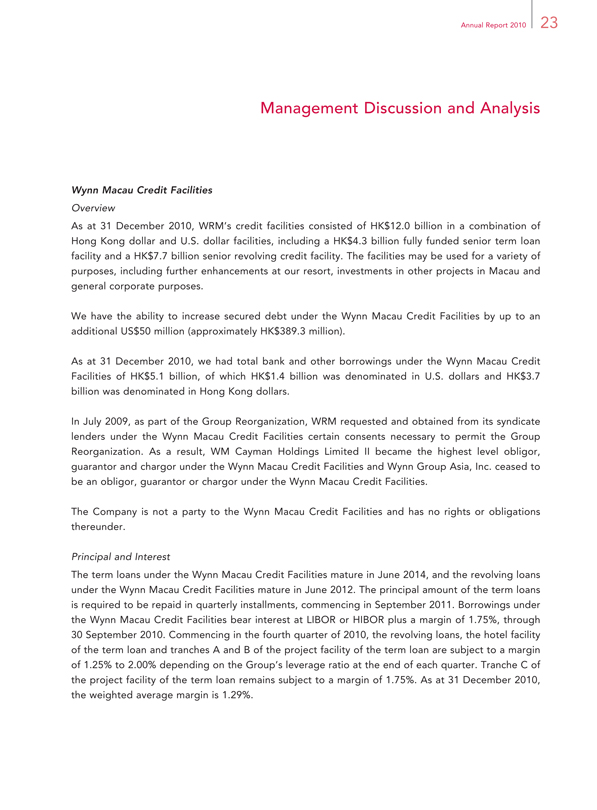
Annual Report 2010 23
Management Discussion and Analysis
Wynn Macau Credit Facilities
Overview
As at 31 December 2010, WRM’s credit facilities consisted of HK$12.0 billion in a combination of Hong Kong dollar and U.S. dollar facilities, including a HK$4.3 billion fully funded senior term loan facility and a HK$7.7 billion senior revolving credit facility. The facilities may be used for a variety of purposes, including further enhancements at our resort, investments in other projects in Macau and general corporate purposes.
We have the ability to increase secured debt under the Wynn Macau Credit Facilities by up to an additional US$50 million (approximately HK$389.3 million).
As at 31 December 2010, we had total bank and other borrowings under the Wynn Macau Credit Facilities of HK$5.1 billion, of which HK$1.4 billion was denominated in U.S. dollars and HK$3.7 billion was denominated in Hong Kong dollars.
In July 2009, as part of the Group Reorganization, WRM requested and obtained from its syndicate lenders under the Wynn Macau Credit Facilities certain consents necessary to permit the Group Reorganization. As a result, WM Cayman Holdings Limited II became the highest level obligor, guarantor and chargor under the Wynn Macau Credit Facilities and Wynn Group Asia, Inc. ceased to be an obligor, guarantor or chargor under the Wynn Macau Credit Facilities.
The Company is not a party to the Wynn Macau Credit Facilities and has no rights or obligations thereunder.
Principal and Interest
The term loans under the Wynn Macau Credit Facilities mature in June 2014, and the revolving loans under the Wynn Macau Credit Facilities mature in June 2012. The principal amount of the term loans is required to be repaid in quarterly installments, commencing in September 2011. Borrowings under the Wynn Macau Credit Facilities bear interest at LIBOR or HIBOR plus a margin of 1.75%, through 30 September 2010. Commencing in the fourth quarter of 2010, the revolving loans, the hotel facility of the term loan and tranches A and B of the project facility of the term loan are subject to a margin of 1.25% to 2.00% depending on the Group’s leverage ratio at the end of each quarter. Tranche C of the project facility of the term loan remains subject to a margin of 1.75%. As at 31 December 2010, the weighted average margin is 1.29%.
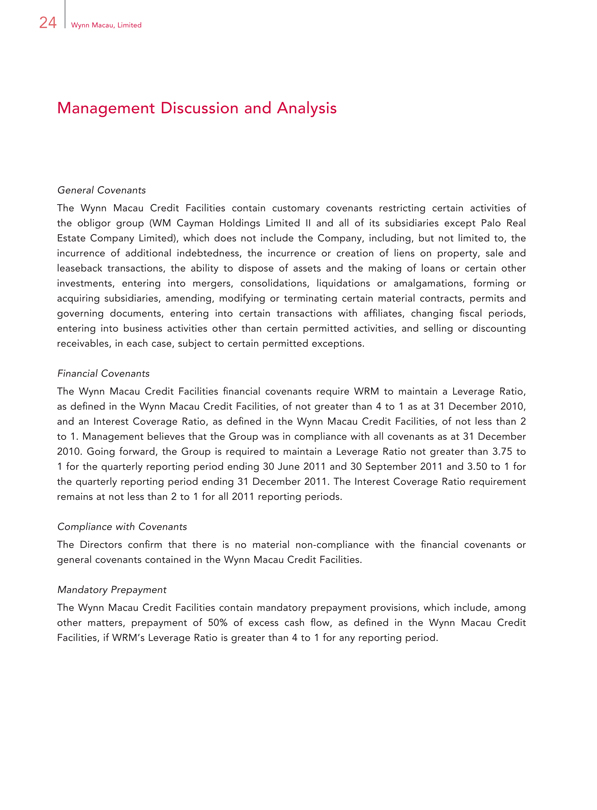
24 Wynn Macau, Limited
Management Discussion and Analysis
General Covenants
The Wynn Macau Credit Facilities contain customary covenants restricting certain activities of the obligor group (WM Cayman Holdings Limited II and all of its subsidiaries except Palo Real Estate Company Limited), which does not include the Company, including, but not limited to, the incurrence of additional indebtedness, the incurrence or creation of liens on property, sale and leaseback transactions, the ability to dispose of assets and the making of loans or certain other investments, entering into mergers, consolidations, liquidations or amalgamations, forming or acquiring subsidiaries, amending, modifying or terminating certain material contracts, permits and governing documents, entering into certain transactions with affiliates, changing fiscal periods, entering into business activities other than certain permitted activities, and selling or discounting receivables, in each case, subject to certain permitted exceptions.
Financial Covenants
The Wynn Macau Credit Facilities financial covenants require WRM to maintain a Leverage Ratio, as defined in the Wynn Macau Credit Facilities, of not greater than 4 to 1 as at 31 December 2010, and an Interest Coverage Ratio, as defined in the Wynn Macau Credit Facilities, of not less than 2 to 1. Management believes that the Group was in compliance with all covenants as at 31 December 2010. Going forward, the Group is required to maintain a Leverage Ratio not greater than 3.75 to 1 for the quarterly reporting period ending 30 June 2011 and 30 September 2011 and 3.50 to 1 for the quarterly reporting period ending 31 December 2011. The Interest Coverage Ratio requirement remains at not less than 2 to 1 for all 2011 reporting periods.
Compliance with Covenants
The Directors confirm that there is no material non-compliance with the financial covenants or general covenants contained in the Wynn Macau Credit Facilities.
Mandatory Prepayment
The Wynn Macau Credit Facilities contain mandatory prepayment provisions, which include, among other matters, prepayment of 50% of excess cash flow, as defined in the Wynn Macau Credit Facilities, if WRM’s Leverage Ratio is greater than 4 to 1 for any reporting period.
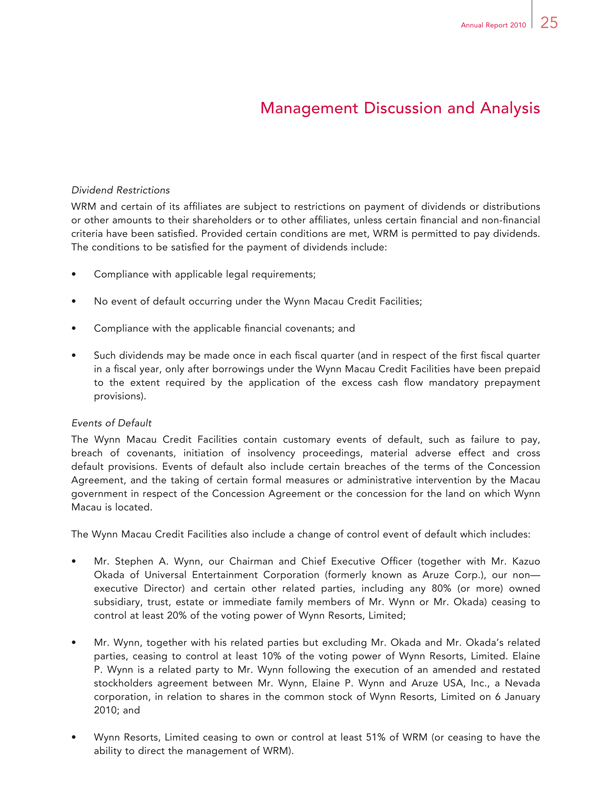
Annual Report 2010 25
Management Discussion and Analysis
Dividend Restrictions
WRM and certain of its affi liates are subject to restrictions on payment of dividends or distributions or other amounts to their shareholders or to other affi liates, unless certain fi nancial and non-fi nancial criteria have been satisfi ed. Provided certain conditions are met, WRM is permitted to pay dividends. The conditions to be satisfi ed for the payment of dividends include:
Compliance with applicable legal requirements;
No event of default occurring under the Wynn Macau Credit Facilities;
Compliance with the applicable financial covenants; and
Such dividends may be made once in each fiscal quarter (and in respect of the first fiscal quarter in a fiscal year, only after borrowings under the Wynn Macau Credit Facilities have been prepaid to the extent required by the application of the excess cash flow mandatory prepayment provisions).
Events of Default
The Wynn Macau Credit Facilities contain customary events of default, such as failure to pay, breach of covenants, initiation of insolvency proceedings, material adverse effect and cross default provisions. Events of default also include certain breaches of the terms of the Concession Agreement, and the taking of certain formal measures or administrative intervention by the Macau government in respect of the Concession Agreement or the concession for the land on which Wynn Macau is located.
The Wynn Macau Credit Facilities also include a change of control event of default which includes:
Mr. Stephen A. Wynn, our Chairman and Chief Executive Officer (together with Mr. Kazuo Okada of Universal Entertainment Corporation (formerly known as Aruze Corp.), our non— executive Director) and certain other related parties, including any 80% (or more) owned subsidiary, trust, estate or immediate family members of Mr. Wynn or Mr. Okada) ceasing to control at least 20% of the voting power of Wynn Resorts, Limited;
Mr. Wynn, together with his related parties but excluding Mr. Okada and Mr. Okada’s related parties, ceasing to control at least 10% of the voting power of Wynn Resorts, Limited. Elaine P. Wynn is a related party to Mr. Wynn following the execution of an amended and restated stockholders agreement between Mr. Wynn, Elaine P. Wynn and Aruze USA, Inc., a Nevada corporation, in relation to shares in the common stock of Wynn Resorts, Limited on 6 January 2010; and
Wynn Resorts, Limited ceasing to own or control at least 51% of WRM (or ceasing to have the ability to direct the management of WRM).
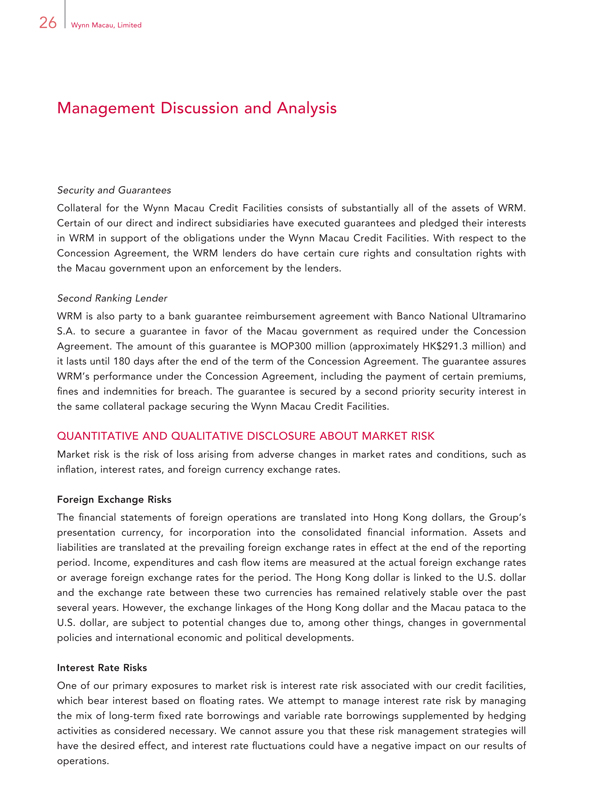
26 Wynn Macau, Limited
Management Discussion and Analysis
Security and Guarantees
Collateral for the Wynn Macau Credit Facilities consists of substantially all of the assets of WRM. Certain of our direct and indirect subsidiaries have executed guarantees and pledged their interests in WRM in support of the obligations under the Wynn Macau Credit Facilities. With respect to the Concession Agreement, the WRM lenders do have certain cure rights and consultation rights with the Macau government upon an enforcement by the lenders.
Second Ranking Lender
WRM is also party to a bank guarantee reimbursement agreement with Banco National Ultramarino S.A. to secure a guarantee in favor of the Macau government as required under the Concession Agreement. The amount of this guarantee is MOP300 million (approximately HK$291.3 million) and it lasts until 180 days after the end of the term of the Concession Agreement. The guarantee assures WRM’s performance under the Concession Agreement, including the payment of certain premiums, fines and indemnities for breach. The guarantee is secured by a second priority security interest in the same collateral package securing the Wynn Macau Credit Facilities.
QUANTITATIVE AND QUALITATIVE DISCLOSURE ABOUT MARKET RISK
Market risk is the risk of loss arising from adverse changes in market rates and conditions, such as inflation, interest rates, and foreign currency exchange rates.
Foreign Exchange Risks
The financial statements of foreign operations are translated into Hong Kong dollars, the Group’s presentation currency, for incorporation into the consolidated financial information. Assets and liabilities are translated at the prevailing foreign exchange rates in effect at the end of the reporting period. Income, expenditures and cash flow items are measured at the actual foreign exchange rates or average foreign exchange rates for the period. The Hong Kong dollar is linked to the U.S. dollar and the exchange rate between these two currencies has remained relatively stable over the past several years. However, the exchange linkages of the Hong Kong dollar and the Macau pataca to the U.S. dollar, are subject to potential changes due to, among other things, changes in governmental policies and international economic and political developments.
Interest Rate Risks
One of our primary exposures to market risk is interest rate risk associated with our credit facilities, which bear interest based on floating rates. We attempt to manage interest rate risk by managing the mix of long-term fixed rate borrowings and variable rate borrowings supplemented by hedging activities as considered necessary. We cannot assure you that these risk management strategies will have the desired effect, and interest rate fluctuations could have a negative impact on our results of operations.
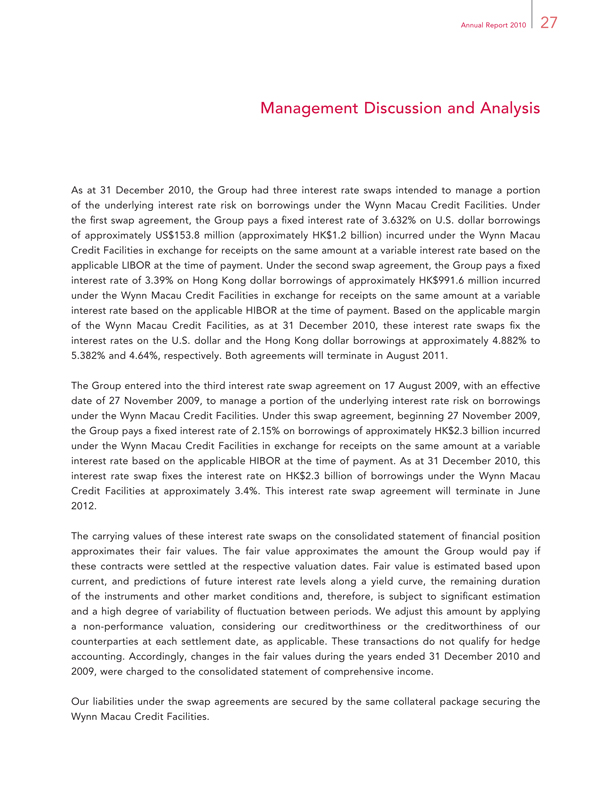
Annual Report 2010 27
Management Discussion and Analysis
As at 31 December 2010, the Group had three interest rate swaps intended to manage a portion of the underlying interest rate risk on borrowings under the Wynn Macau Credit Facilities. Under the first swap agreement, the Group pays a fixed interest rate of 3.632% on U.S. dollar borrowings of approximately US$153.8 million (approximately HK$1.2 billion) incurred under the Wynn Macau Credit Facilities in exchange for receipts on the same amount at a variable interest rate based on the applicable LIBOR at the time of payment. Under the second swap agreement, the Group pays a fixed interest rate of 3.39% on Hong Kong dollar borrowings of approximately HK$991.6 million incurred under the Wynn Macau Credit Facilities in exchange for receipts on the same amount at a variable interest rate based on the applicable HIBOR at the time of payment. Based on the applicable margin of the Wynn Macau Credit Facilities, as at 31 December 2010, these interest rate swaps fix the interest rates on the U.S. dollar and the Hong Kong dollar borrowings at approximately 4.882% to 5.382% and 4.64%, respectively. Both agreements will terminate in August 2011.
The Group entered into the third interest rate swap agreement on 17 August 2009, with an effective date of 27 November 2009, to manage a portion of the underlying interest rate risk on borrowings under the Wynn Macau Credit Facilities. Under this swap agreement, beginning 27 November 2009, the Group pays a fi xed interest rate of 2.15% on borrowings of approximately HK$2.3 billion incurred under the Wynn Macau Credit Facilities in exchange for receipts on the same amount at a variable interest rate based on the applicable HIBOR at the time of payment. As at 31 December 2010, this interest rate swap fixes the interest rate on HK$2.3 billion of borrowings under the Wynn Macau Credit Facilities at approximately 3.4%. This interest rate swap agreement will terminate in June 2012.
The carrying values of these interest rate swaps on the consolidated statement of financial position approximates their fair values. The fair value approximates the amount the Group would pay if these contracts were settled at the respective valuation dates. Fair value is estimated based upon current, and predictions of future interest rate levels along a yield curve, the remaining duration of the instruments and other market conditions and, therefore, is subject to significant estimation and a high degree of variability of fluctuation between periods. We adjust this amount by applying a non-performance valuation, considering our creditworthiness or the creditworthiness of our counterparties at each settlement date, as applicable. These transactions do not qualify for hedge accounting. Accordingly, changes in the fair values during the years ended 31 December 2010 and 2009, were charged to the consolidated statement of comprehensive income.
Our liabilities under the swap agreements are secured by the same collateral package securing the Wynn Macau Credit Facilities.
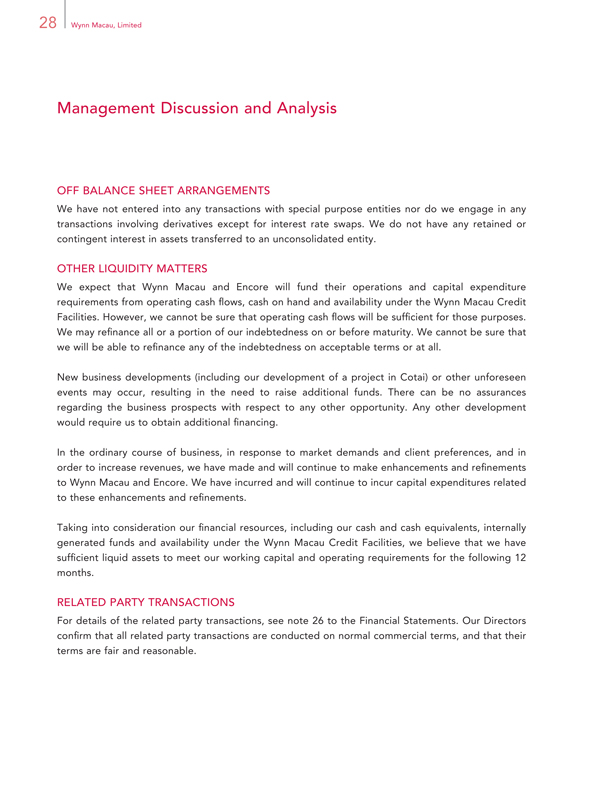
28 Wynn Macau, Limited
Management Discussion and Analysis
OFF BALANCE SHEET ARRANGEMENTS
We have not entered into any transactions with special purpose entities nor do we engage in any transactions involving derivatives except for interest rate swaps. We do not have any retained or contingent interest in assets transferred to an unconsolidated entity.
OTHER LIQUIDITY MATTERS
We expect that Wynn Macau and Encore will fund their operations and capital expenditure requirements from operating cash flows, cash on hand and availability under the Wynn Macau Credit Facilities. However, we cannot be sure that operating cash flows will be sufficient for those purposes. We may refinance all or a portion of our indebtedness on or before maturity. We cannot be sure that we will be able to refinance any of the indebtedness on acceptable terms or at all.
New business developments (including our development of a project in Cotai) or other unforeseen events may occur, resulting in the need to raise additional funds. There can be no assurances regarding the business prospects with respect to any other opportunity. Any other development would require us to obtain additional financing.
In the ordinary course of business, in response to market demands and client preferences, and in order to increase revenues, we have made and will continue to make enhancements and refinements to Wynn Macau and Encore. We have incurred and will continue to incur capital expenditures related to these enhancements and refinements.
Taking into consideration our financial resources, including our cash and cash equivalents, internally generated funds and availability under the Wynn Macau Credit Facilities, we believe that we have sufficient liquid assets to meet our working capital and operating requirements for the following 12 months.
RELATED PARTY TRANSACTIONS
For details of the related party transactions, see note 26 to the Financial Statements. Our Directors confirm that all related party transactions are conducted on normal commercial terms, and that their terms are fair and reasonable.
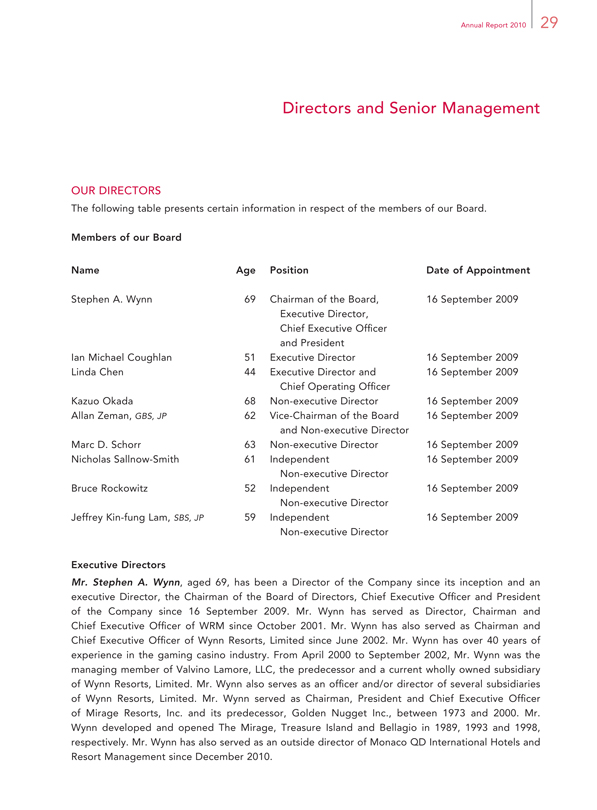
Annual Report 2010 29
Directors and Senior Management
OUR DIRECTORS
The following table presents certain information in respect of the members of our Board.
Members of our Board
Name Age Position Date of Appointment
Stephen A. Wynn 69 Chairman of the Board, 16 September 2009
Executive Director,
Chief Executive Officer
and President
Ian Michael Coughlan 51 Executive Director 16 September 2009
Linda Chen 44 Executive Director and 16 September 2009
Chief Operating Officer
Kazuo Okada 68 Non-executive Director 16 September 2009
Allan Zeman, GBS, JP 62 Vice-Chairman of the Board 16 September 2009
and Non-executive Director
Marc D. Schorr 63 Non-executive Director 16 September 2009
Nicholas Sallnow-Smith 61 Independent 16 September 2009
Non-executive Director
Bruce Rockowitz 52 Independent 16 September 2009
Non-executive Director
Jeffrey Kin-fung Lam, SBS, JP 59 Independent 16 September 2009
Non-executive Director
Executive Directors
Mr. Stephen A. Wynn, aged 69, has been a Director of the Company since its inception and an executive Director, the Chairman of the Board of Directors, Chief Executive Officer and President of the Company since 16 September 2009. Mr. Wynn has served as Director, Chairman and Chief Executive Officer of WRM since October 2001. Mr. Wynn has also served as Chairman and Chief Executive Officer of Wynn Resorts, Limited since June 2002. Mr. Wynn has over 40 years of experience in the gaming casino industry. From April 2000 to September 2002, Mr. Wynn was the managing member of Valvino Lamore, LLC, the predecessor and a current wholly owned subsidiary of Wynn Resorts, Limited. Mr. Wynn also serves as an officer and/or director of several subsidiaries of Wynn Resorts, Limited. Mr. Wynn served as Chairman, President and Chief Executive Officer of Mirage Resorts, Inc. and its predecessor, Golden Nugget Inc., between 1973 and 2000. Mr. Wynn developed and opened The Mirage, Treasure Island and Bellagio in 1989, 1993 and 1998, respectively. Mr. Wynn has also served as an outside director of Monaco QD International Hotels and Resort Management since December 2010.
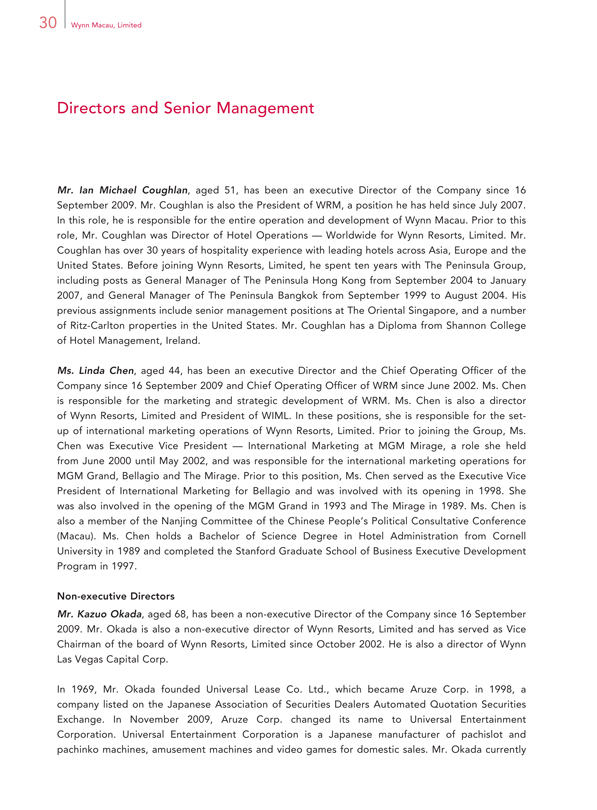
30 Wynn Macau, Limited
Directors and Senior Management
Mr. Ian Michael Coughlan, aged 51, has been an executive Director of the Company since 16 September 2009. Mr. Coughlan is also the President of WRM, a position he has held since July 2007. In this role, he is responsible for the entire operation and development of Wynn Macau. Prior to this role, Mr. Coughlan was Director of Hotel Operations — Worldwide for Wynn Resorts, Limited. Mr. Coughlan has over 30 years of hospitality experience with leading hotels across Asia, Europe and the United States. Before joining Wynn Resorts, Limited, he spent ten years with The Peninsula Group, including posts as General Manager of The Peninsula Hong Kong from September 2004 to January 2007, and General Manager of The Peninsula Bangkok from September 1999 to August 2004. His previous assignments include senior management positions at The Oriental Singapore, and a number of Ritz-Carlton properties in the United States. Mr. Coughlan has a Diploma from Shannon College of Hotel Management, Ireland.
Ms. Linda Chen, aged 44, has been an executive Director and the Chief Operating Officer of the Company since 16 September 2009 and Chief Operating Officer of WRM since June 2002. Ms. Chen is responsible for the marketing and strategic development of WRM. Ms. Chen is also a director of Wynn Resorts, Limited and President of WIML. In these positions, she is responsible for the setup of international marketing operations of Wynn Resorts, Limited. Prior to joining the Group, Ms. Chen was Executive Vice President — International Marketing at MGM Mirage, a role she held from June 2000 until May 2002, and was responsible for the international marketing operations for MGM Grand, Bellagio and The Mirage. Prior to this position, Ms. Chen served as the Executive Vice President of International Marketing for Bellagio and was involved with its opening in 1998. She was also involved in the opening of the MGM Grand in 1993 and The Mirage in 1989. Ms. Chen is also a member of the Nanjing Committee of the Chinese People’s Political Consultative Conference (Macau). Ms. Chen holds a Bachelor of Science Degree in Hotel Administration from Cornell University in 1989 and completed the Stanford Graduate School of Business Executive Development Program in 1997.
Non-executive Directors
Mr. Kazuo Okada, aged 68, has been a non-executive Director of the Company since 16 September 2009. Mr. Okada is also a non-executive director of Wynn Resorts, Limited and has served as Vice Chairman of the board of Wynn Resorts, Limited since October 2002. He is also a director of Wynn Las Vegas Capital Corp.
In 1969, Mr. Okada founded Universal Lease Co. Ltd., which became Aruze Corp. in 1998, a company listed on the Japanese Association of Securities Dealers Automated Quotation Securities Exchange. In November 2009, Aruze Corp. changed its name to Universal Entertainment Corporation. Universal Entertainment Corporation is a Japanese manufacturer of pachislot and pachinko machines, amusement machines and video games for domestic sales. Mr. Okada currently
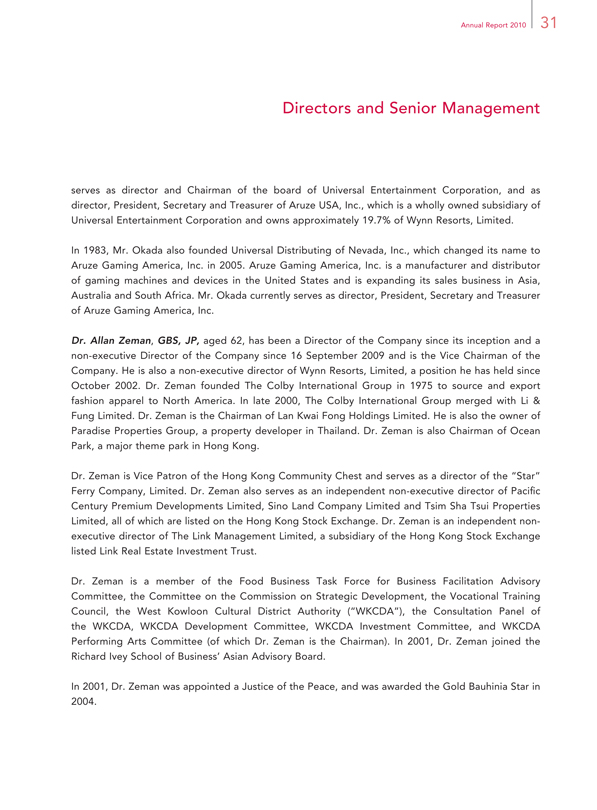
Annual Report 2010 31
Directors and Senior Management
serves as director and Chairman of the board of Universal Entertainment Corporation, and as director, President, Secretary and Treasurer of Aruze USA, Inc., which is a wholly owned subsidiary of Universal Entertainment Corporation and owns approximately 19.7% of Wynn Resorts, Limited.
In 1983, Mr. Okada also founded Universal Distributing of Nevada, Inc., which changed its name to Aruze Gaming America, Inc. in 2005. Aruze Gaming America, Inc. is a manufacturer and distributor of gaming machines and devices in the United States and is expanding its sales business in Asia, Australia and South Africa. Mr. Okada currently serves as director, President, Secretary and Treasurer of Aruze Gaming America, Inc.
Dr. Allan Zeman, GBS, JP, aged 62, has been a Director of the Company since its inception and a non-executive Director of the Company since 16 September 2009 and is the Vice Chairman of the Company. He is also a non-executive director of Wynn Resorts, Limited, a position he has held since October 2002. Dr. Zeman founded The Colby International Group in 1975 to source and export fashion apparel to North America. In late 2000, The Colby International Group merged with Li & Fung Limited. Dr. Zeman is the Chairman of Lan Kwai Fong Holdings Limited. He is also the owner of Paradise Properties Group, a property developer in Thailand. Dr. Zeman is also Chairman of Ocean Park, a major theme park in Hong Kong.
Dr. Zeman is Vice Patron of the Hong Kong Community Chest and serves as a director of the “Star” Ferry Company, Limited. Dr. Zeman also serves as an independent non-executive director of Pacific Century Premium Developments Limited, Sino Land Company Limited and Tsim Sha Tsui Properties Limited, all of which are listed on the Hong Kong Stock Exchange. Dr. Zeman is an independent non-executive director of The Link Management Limited, a subsidiary of the Hong Kong Stock Exchange listed Link Real Estate Investment Trust.
Dr. Zeman is a member of the Food Business Task Force for Business Facilitation Advisory Committee, the Committee on the Commission on Strategic Development, the Vocational Training Council, the West Kowloon Cultural District Authority (“WKCDA”), the Consultation Panel of the WKCDA, WKCDA Development Committee, WKCDA Investment Committee, and WKCDA Performing Arts Committee (of which Dr. Zeman is the Chairman). In 2001, Dr. Zeman joined the Richard Ivey School of Business’ Asian Advisory Board.
In 2001, Dr. Zeman was appointed a Justice of the Peace, and was awarded the Gold Bauhinia Star in 2004.
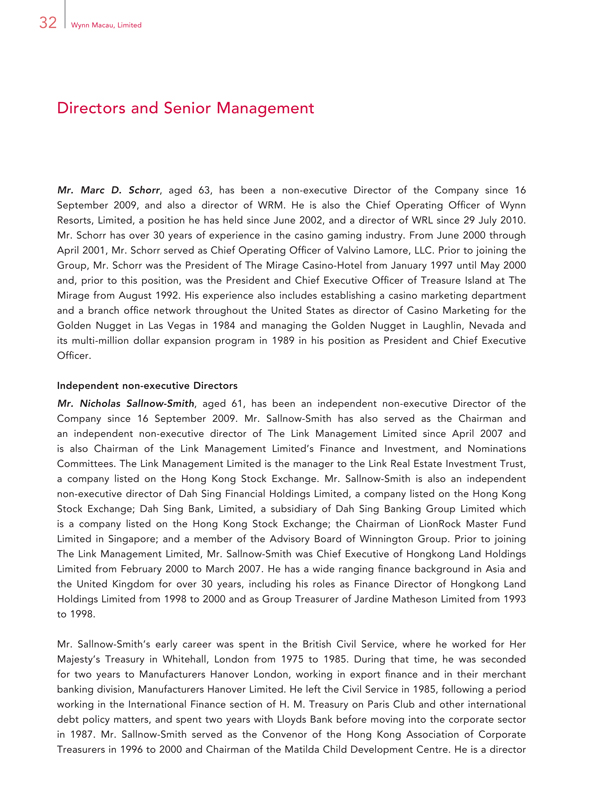
32 Wynn Macau, Limited
Directors and Senior Management
Mr. Marc D. Schorr, aged 63, has been a non-executive Director of the Company since 16 September 2009, and also a director of WRM. He is also the Chief Operating Officer of Wynn Resorts, Limited, a position he has held since June 2002, and a director of WRL since 29 July 2010. Mr. Schorr has over 30 years of experience in the casino gaming industry. From June 2000 through April 2001, Mr. Schorr served as Chief Operating Officer of Valvino Lamore, LLC. Prior to joining the Group, Mr. Schorr was the President of The Mirage Casino-Hotel from January 1997 until May 2000 and, prior to this position, was the President and Chief Executive Officer of Treasure Island at The Mirage from August 1992. His experience also includes establishing a casino marketing department and a branch office network throughout the United States as director of Casino Marketing for the Golden Nugget in Las Vegas in 1984 and managing the Golden Nugget in Laughlin, Nevada and its multi-million dollar expansion program in 1989 in his position as President and Chief Executive Officer.
Independent non-executive Directors
Mr. Nicholas Sallnow-Smith, aged 61, has been an independent non-executive Director of the Company since 16 September 2009. Mr. Sallnow-Smith has also served as the Chairman and an independent non-executive director of The Link Management Limited since April 2007 and is also Chairman of the Link Management Limited’s Finance and Investment, and Nominations Committees. The Link Management Limited is the manager to the Link Real Estate Investment Trust, a company listed on the Hong Kong Stock Exchange. Mr. Sallnow-Smith is also an independent non-executive director of Dah Sing Financial Holdings Limited, a company listed on the Hong Kong Stock Exchange; Dah Sing Bank, Limited, a subsidiary of Dah Sing Banking Group Limited which is a company listed on the Hong Kong Stock Exchange; the Chairman of LionRock Master Fund Limited in Singapore; and a member of the Advisory Board of Winnington Group. Prior to joining The Link Management Limited, Mr. Sallnow-Smith was Chief Executive of Hongkong Land Holdings Limited from February 2000 to March 2007. He has a wide ranging finance background in Asia and the United Kingdom for over 30 years, including his roles as Finance Director of Hongkong Land Holdings Limited from 1998 to 2000 and as Group Treasurer of Jardine Matheson Limited from 1993 to 1998.
Mr. Sallnow-Smith’s early career was spent in the British Civil Service, where he worked for Her Majesty’s Treasury in Whitehall, London from 1975 to 1985. During that time, he was seconded for two years to Manufacturers Hanover London, working in export finance and in their merchant banking division, Manufacturers Hanover Limited. He left the Civil Service in 1985, following a period working in the International Finance section of H. M. Treasury on Paris Club and other international debt policy matters, and spent two years with Lloyds Bank before moving into the corporate sector in 1987. Mr. Sallnow-Smith served as the Convenor of the Hong Kong Association of Corporate Treasurers in 1996 to 2000 and Chairman of the Matilda Child Development Centre. He is a director
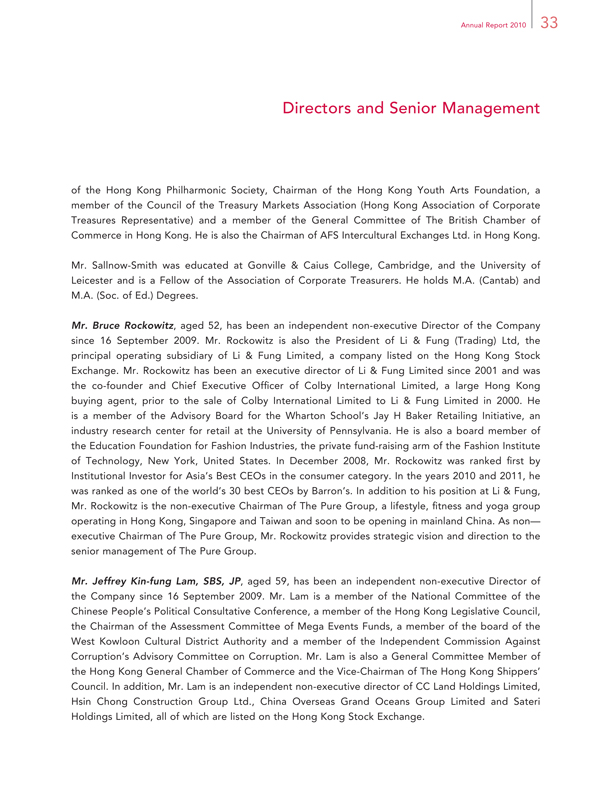
Annual Report 2010 33
Directors and Senior Management
of the Hong Kong Philharmonic Society, Chairman of the Hong Kong Youth Arts Foundation, a member of the Council of the Treasury Markets Association (Hong Kong Association of Corporate Treasures Representative) and a member of the General Committee of The British Chamber of Commerce in Hong Kong. He is also the Chairman of AFS Intercultural Exchanges Ltd. in Hong Kong.
Mr. Sallnow-Smith was educated at Gonville & Caius College, Cambridge, and the University of Leicester and is a Fellow of the Association of Corporate Treasurers. He holds M.A. (Cantab) and M.A. (Soc. of Ed.) Degrees.
Mr. Bruce Rockowitz, aged 52, has been an independent non-executive Director of the Company since 16 September 2009. Mr. Rockowitz is also the President of Li & Fung (Trading) Ltd, the principal operating subsidiary of Li & Fung Limited, a company listed on the Hong Kong Stock Exchange. Mr. Rockowitz has been an executive director of Li & Fung Limited since 2001 and was the co-founder and Chief Executive Officer of Colby International Limited, a large Hong Kong buying agent, prior to the sale of Colby International Limited to Li & Fung Limited in 2000. He is a member of the Advisory Board for the Wharton School’s Jay H Baker Retailing Initiative, an industry research center for retail at the University of Pennsylvania. He is also a board member of the Education Foundation for Fashion Industries, the private fund-raising arm of the Fashion Institute of Technology, New York, United States. In December 2008, Mr. Rockowitz was ranked first by Institutional Investor for Asia’s Best CEOs in the consumer category. In the years 2010 and 2011, he was ranked as one of the world’s 30 best CEOs by Barron’s. In addition to his position at Li & Fung, Mr. Rockowitz is the non-executive Chairman of The Pure Group, a lifestyle, fitness and yoga group operating in Hong Kong, Singapore and Taiwan and soon to be opening in mainland China. As non—executive Chairman of The Pure Group, Mr. Rockowitz provides strategic vision and direction to the senior management of The Pure Group.
Mr. Jeffrey Kin-fung Lam, SBS, JP, aged 59, has been an independent non-executive Director of the Company since 16 September 2009. Mr. Lam is a member of the National Committee of the Chinese People’s Political Consultative Conference, a member of the Hong Kong Legislative Council, the Chairman of the Assessment Committee of Mega Events Funds, a member of the board of the West Kowloon Cultural District Authority and a member of the Independent Commission Against Corruption’s Advisory Committee on Corruption. Mr. Lam is also a General Committee Member of the Hong Kong General Chamber of Commerce and the Vice-Chairman of The Hong Kong Shippers’ Council. In addition, Mr. Lam is an independent non-executive director of CC Land Holdings Limited, Hsin Chong Construction Group Ltd., China Overseas Grand Oceans Group Limited and Sateri Holdings Limited, all of which are listed on the Hong Kong Stock Exchange.
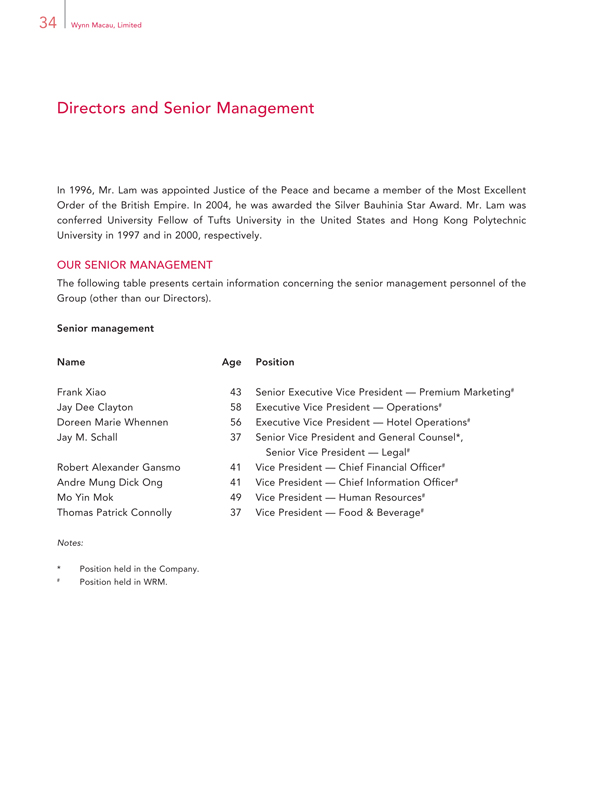
34 Wynn Macau, Limited
Directors and Senior Management
In 1996, Mr. Lam was appointed Justice of the Peace and became a member of the Most Excellent Order of the British Empire. In 2004, he was awarded the Silver Bauhinia Star Award. Mr. Lam was conferred University Fellow of Tufts University in the United States and Hong Kong Polytechnic University in 1997 and in 2000, respectively.
OUR SENIOR MANAGEMENT
The following table presents certain information concerning the senior management personnel of the Group (other than our Directors).
Senior management
Name Age Position
Frank Xiao 43 Senior Executive Vice President — Premium Marketing#
Jay Dee Clayton 58 Executive Vice President — Operations#
Doreen Marie Whennen 56 Executive Vice President — Hotel Operations#
Jay M. Schall 37 Senior Vice President and General Counsel*,
Senior Vice President — Legal#
Robert Alexander Gansmo 41 Vice President — Chief Financial Officer#
Andre Mung Dick Ong 41 Vice President — Chief Information Officer#
Mo Yin Mok 49 Vice President — Human Resources#
Thomas Patrick Connolly 37 Vice President — Food & Beverage#
Notes:
* | | Position held in the Company. |
# Position held in WRM.
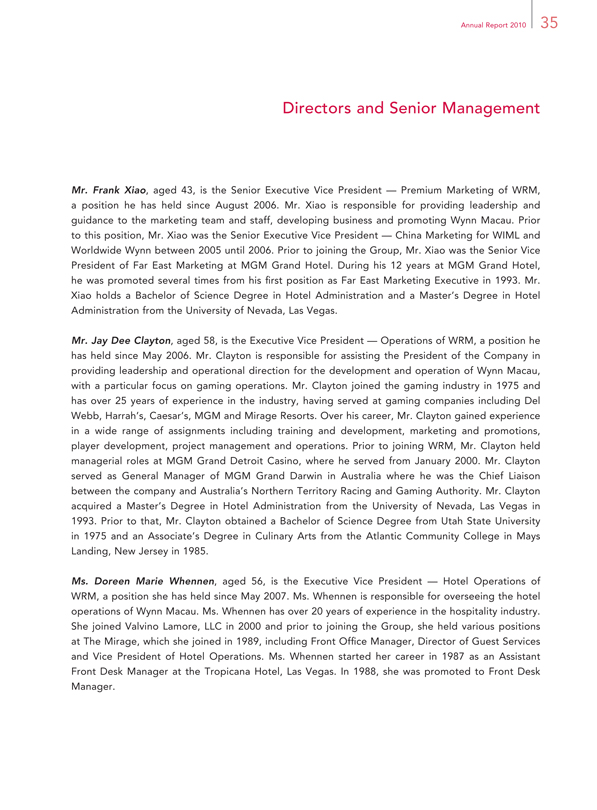
Annual Report 2010 35
Directors and Senior Management
Mr. Frank Xiao, aged 43, is the Senior Executive Vice President — Premium Marketing of WRM, a position he has held since August 2006. Mr. Xiao is responsible for providing leadership and guidance to the marketing team and staff, developing business and promoting Wynn Macau. Prior to this position, Mr. Xiao was the Senior Executive Vice President — China Marketing for WIML and Worldwide Wynn between 2005 until 2006. Prior to joining the Group, Mr. Xiao was the Senior Vice President of Far East Marketing at MGM Grand Hotel. During his 12 years at MGM Grand Hotel, he was promoted several times from his first position as Far East Marketing Executive in 1993. Mr. Xiao holds a Bachelor of Science Degree in Hotel Administration and a Master’s Degree in Hotel Administration from the University of Nevada, Las Vegas.
Mr. Jay Dee Clayton, aged 58, is the Executive Vice President — Operations of WRM, a position he has held since May 2006. Mr. Clayton is responsible for assisting the President of the Company in providing leadership and operational direction for the development and operation of Wynn Macau, with a particular focus on gaming operations. Mr. Clayton joined the gaming industry in 1975 and has over 25 years of experience in the industry, having served at gaming companies including Del Webb, Harrah’s, Caesar’s, MGM and Mirage Resorts. Over his career, Mr. Clayton gained experience in a wide range of assignments including training and development, marketing and promotions, player development, project management and operations. Prior to joining WRM, Mr. Clayton held managerial roles at MGM Grand Detroit Casino, where he served from January 2000. Mr. Clayton served as General Manager of MGM Grand Darwin in Australia where he was the Chief Liaison between the company and Australia’s Northern Territory Racing and Gaming Authority. Mr. Clayton acquired a Master’s Degree in Hotel Administration from the University of Nevada, Las Vegas in 1993. Prior to that, Mr. Clayton obtained a Bachelor of Science Degree from Utah State University in 1975 and an Associate’s Degree in Culinary Arts from the Atlantic Community College in Mays Landing, New Jersey in 1985.
Ms. Doreen Marie Whennen, aged 56, is the Executive Vice President — Hotel Operations of WRM, a position she has held since May 2007. Ms. Whennen is responsible for overseeing the hotel operations of Wynn Macau. Ms. Whennen has over 20 years of experience in the hospitality industry. She joined Valvino Lamore, LLC in 2000 and prior to joining the Group, she held various positions at The Mirage, which she joined in 1989, including Front Office Manager, Director of Guest Services and Vice President of Hotel Operations. Ms. Whennen started her career in 1987 as an Assistant Front Desk Manager at the Tropicana Hotel, Las Vegas. In 1988, she was promoted to Front Desk Manager.
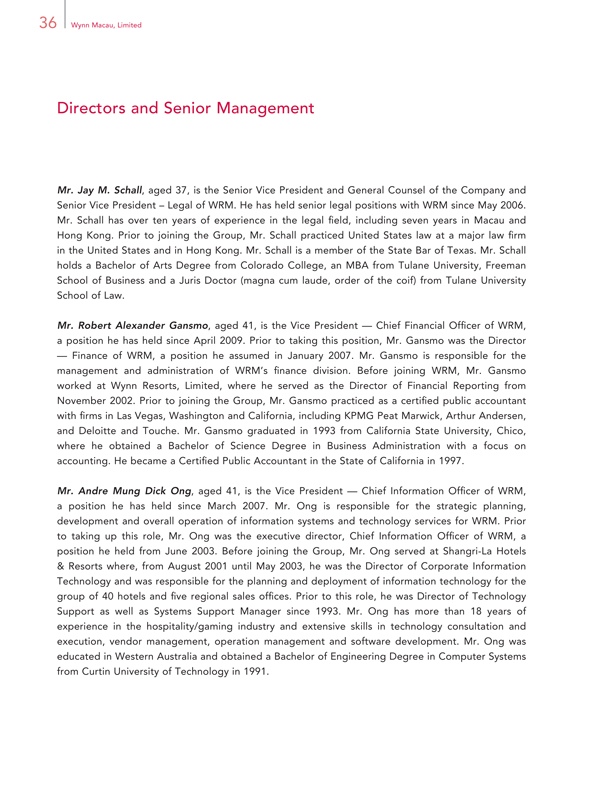
36 Wynn Macau, Limited
Directors and Senior Management
Mr. Jay M. Schall, aged 37, is the Senior Vice President and General Counsel of the Company and Senior Vice President – Legal of WRM. He has held senior legal positions with WRM since May 2006. Mr. Schall has over ten years of experience in the legal field, including seven years in Macau and Hong Kong. Prior to joining the Group, Mr. Schall practiced United States law at a major law firm in the United States and in Hong Kong. Mr. Schall is a member of the State Bar of Texas. Mr. Schall holds a Bachelor of Arts Degree from Colorado College, an MBA from Tulane University, Freeman School of Business and a Juris Doctor (magna cum laude, order of the coif) from Tulane University School of Law.
Mr. Robert Alexander Gansmo, aged 41, is the Vice President — Chief Financial Officer of WRM, a position he has held since April 2009. Prior to taking this position, Mr. Gansmo was the Director
— Finance of WRM, a position he assumed in January 2007. Mr. Gansmo is responsible for the management and administration of WRM’s finance division. Before joining WRM, Mr. Gansmo worked at Wynn Resorts, Limited, where he served as the Director of Financial Reporting from November 2002. Prior to joining the Group, Mr. Gansmo practiced as a certified public accountant with fi rms in Las Vegas, Washington and California, including KPMG Peat Marwick, Arthur Andersen, and Deloitte and Touche. Mr. Gansmo graduated in 1993 from California State University, Chico, where he obtained a Bachelor of Science Degree in Business Administration with a focus on accounting. He became a Certified Public Accountant in the State of California in 1997.
Mr. Andre Mung Dick Ong, aged 41, is the Vice President — Chief Information Officer of WRM, a position he has held since March 2007. Mr. Ong is responsible for the strategic planning, development and overall operation of information systems and technology services for WRM. Prior to taking up this role, Mr. Ong was the executive director, Chief Information Officer of WRM, a position he held from June 2003. Before joining the Group, Mr. Ong served at Shangri-La Hotels & Resorts where, from August 2001 until May 2003, he was the Director of Corporate Information Technology and was responsible for the planning and deployment of information technology for the group of 40 hotels and five regional sales offices. Prior to this role, he was Director of Technology Support as well as Systems Support Manager since 1993. Mr. Ong has more than 18 years of experience in the hospitality/gaming industry and extensive skills in technology consultation and execution, vendor management, operation management and software development. Mr. Ong was educated in Western Australia and obtained a Bachelor of Engineering Degree in Computer Systems from Curtin University of Technology in 1991.
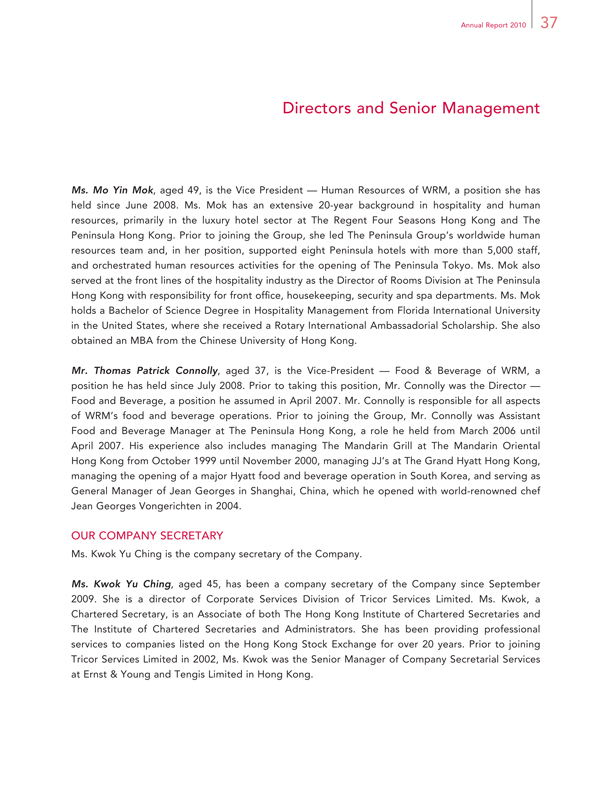
Annual Report 2010 37
Directors and Senior Management
Ms. Mo Yin Mok, aged 49, is the Vice President — Human Resources of WRM, a position she has held since June 2008. Ms. Mok has an extensive 20-year background in hospitality and human resources, primarily in the luxury hotel sector at The Regent Four Seasons Hong Kong and The Peninsula Hong Kong. Prior to joining the Group, she led The Peninsula Group’s worldwide human resources team and, in her position, supported eight Peninsula hotels with more than 5,000 staff, and orchestrated human resources activities for the opening of The Peninsula Tokyo. Ms. Mok also served at the front lines of the hospitality industry as the Director of Rooms Division at The Peninsula Hong Kong with responsibility for front office, housekeeping, security and spa departments. Ms. Mok holds a Bachelor of Science Degree in Hospitality Management from Florida International University in the United States, where she received a Rotary International Ambassadorial Scholarship. She also obtained an MBA from the Chinese University of Hong Kong.
Mr. Thomas Patrick Connolly, aged 37, is the Vice-President — Food & Beverage of WRM, a position he has held since July 2008. Prior to taking this position, Mr. Connolly was the Director —Food and Beverage, a position he assumed in April 2007. Mr. Connolly is responsible for all aspects of WRM’s food and beverage operations. Prior to joining the Group, Mr. Connolly was Assistant Food and Beverage Manager at The Peninsula Hong Kong, a role he held from March 2006 until April 2007. His experience also includes managing The Mandarin Grill at The Mandarin Oriental Hong Kong from October 1999 until November 2000, managing JJ’s at The Grand Hyatt Hong Kong, managing the opening of a major Hyatt food and beverage operation in South Korea, and serving as General Manager of Jean Georges in Shanghai, China, which he opened with world-renowned chef Jean Georges Vongerichten in 2004.
OUR COMPANY SECRETARY
Ms. Kwok Yu Ching is the company secretary of the Company.
Ms. Kwok Yu Ching, aged 45, has been a company secretary of the Company since September 2009. She is a director of Corporate Services Division of Tricor Services Limited. Ms. Kwok, a Chartered Secretary, is an Associate of both The Hong Kong Institute of Chartered Secretaries and The Institute of Chartered Secretaries and Administrators. She has been providing professional services to companies listed on the Hong Kong Stock Exchange for over 20 years. Prior to joining Tricor Services Limited in 2002, Ms. Kwok was the Senior Manager of Company Secretarial Services at Ernst & Young and Tengis Limited in Hong Kong.
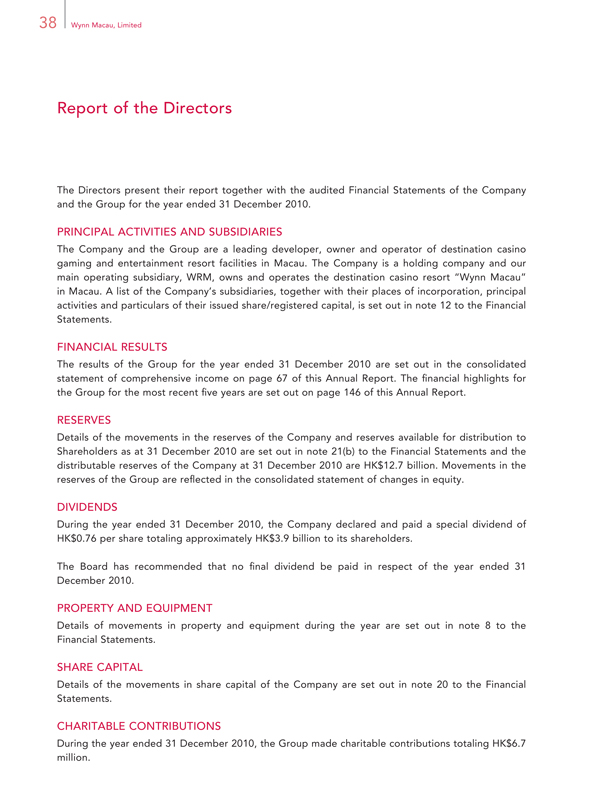
38 Wynn Macau, Limited
Report of the Directors
The Directors present their report together with the audited Financial Statements of the Company and the Group for the year ended 31 December 2010.
PRINCIPAL ACTIVITIES AND SUBSIDIARIES
The Company and the Group are a leading developer, owner and operator of destination casino gaming and entertainment resort facilities in Macau. The Company is a holding company and our main operating subsidiary, WRM, owns and operates the destination casino resort “Wynn Macau” in Macau. A list of the Company’s subsidiaries, together with their places of incorporation, principal activities and particulars of their issued share/registered capital, is set out in note 12 to the Financial Statements.
FINANCIAL RESULTS
The results of the Group for the year ended 31 December 2010 are set out in the consolidated statement of comprehensive income on page 67 of this Annual Report. The financial highlights for the Group for the most recent five years are set out on page 146 of this Annual Report.
RESERVES
Details of the movements in the reserves of the Company and reserves available for distribution to Shareholders as at 31 December 2010 are set out in note 21(b) to the Financial Statements and the distributable reserves of the Company at 31 December 2010 are HK$12.7 billion. Movements in the reserves of the Group are reflected in the consolidated statement of changes in equity.
DIVIDENDS
During the year ended 31 December 2010, the Company declared and paid a special dividend of HK$0.76 per share totaling approximately HK$3.9 billion to its shareholders.
The Board has recommended that no final dividend be paid in respect of the year ended 31 December 2010.
PROPERTY AND EQUIPMENT
Details of movements in property and equipment during the year are set out in note 8 to the Financial Statements.
SHARE CAPITAL
Details of the movements in share capital of the Company are set out in note 20 to the Financial Statements.
CHARITABLE CONTRIBUTIONS
During the year ended 31 December 2010, the Group made charitable contributions totaling HK$6.7 million.
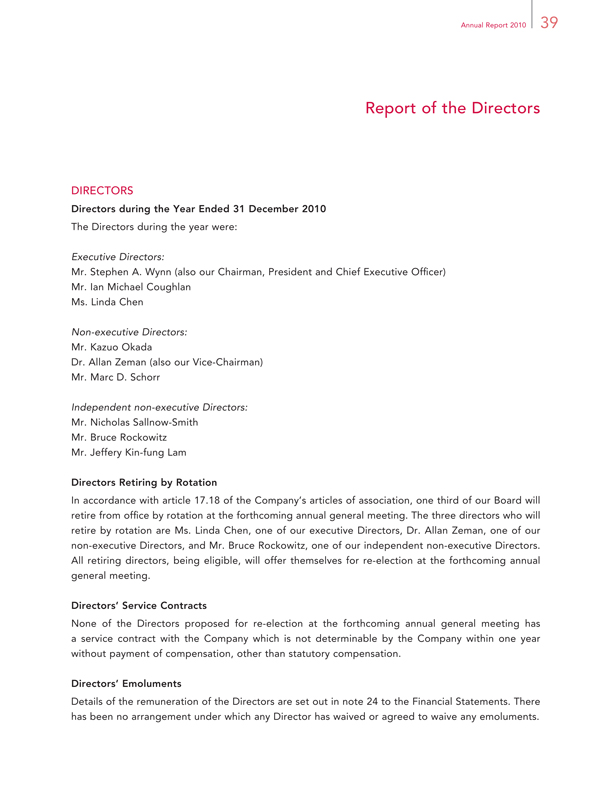
Annual Report 2010 39
Report of the Directors
DIRECTORS
Directors during the Year Ended 31 December 2010
The Directors during the year were:
Executive Directors:
Mr. Stephen A. Wynn (also our Chairman, President and Chief Executive Officer) Mr. Ian Michael Coughlan Ms. Linda Chen
Non-executive Directors:
Mr. Kazuo Okada
Dr. Allan Zeman (also our Vice-Chairman)
Mr. Marc D. Schorr
Independent non-executive Directors:
Mr. Nicholas Sallnow-Smith
Mr. Bruce Rockowitz
Mr. Jeffery Kin-fung Lam
Directors Retiring by Rotation
In accordance with article 17.18 of the Company’s articles of association, one third of our Board will retire from office by rotation at the forthcoming annual general meeting. The three directors who will retire by rotation are Ms. Linda Chen, one of our executive Directors, Dr. Allan Zeman, one of our non-executive Directors, and Mr. Bruce Rockowitz, one of our independent non-executive Directors. All retiring directors, being eligible, will offer themselves for re-election at the forthcoming annual general meeting.
Directors’ Service Contracts
None of the Directors proposed for re-election at the forthcoming annual general meeting has a service contract with the Company which is not determinable by the Company within one year without payment of compensation, other than statutory compensation.
Directors’ Emoluments
Details of the remuneration of the Directors are set out in note 24 to the Financial Statements. There has been no arrangement under which any Director has waived or agreed to waive any emoluments.
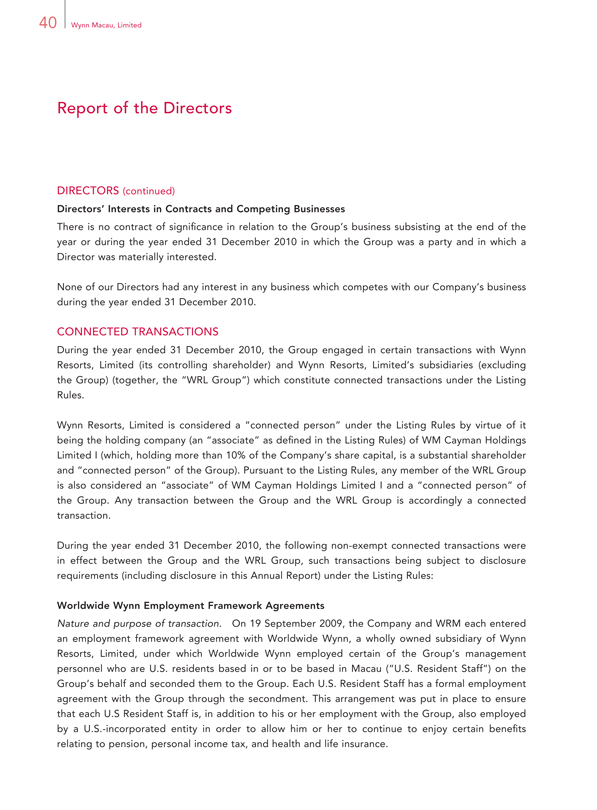
40 Wynn Macau, Limited
Report of the Directors
DIRECTORS (continued)
Directors’ Interests in Contracts and Competing Businesses
There is no contract of significance in relation to the Group’s business subsisting at the end of the year or during the year ended 31 December 2010 in which the Group was a party and in which a Director was materially interested.
None of our Directors had any interest in any business which competes with our Company’s business during the year ended 31 December 2010.
CONNECTED TRANSACTIONS
During the year ended 31 December 2010, the Group engaged in certain transactions with Wynn Resorts, Limited (its controlling shareholder) and Wynn Resorts, Limited’s subsidiaries (excluding the Group) (together, the “WRL Group”) which constitute connected transactions under the Listing Rules.
Wynn Resorts, Limited is considered a “connected person” under the Listing Rules by virtue of it being the holding company (an “associate” as defined in the Listing Rules) of WM Cayman Holdings Limited I (which, holding more than 10% of the Company’s share capital, is a substantial shareholder and “connected person” of the Group). Pursuant to the Listing Rules, any member of the WRL Group is also considered an “associate” of WM Cayman Holdings Limited I and a “connected person” of the Group. Any transaction between the Group and the WRL Group is accordingly a connected transaction.
During the year ended 31 December 2010, the following non-exempt connected transactions were in effect between the Group and the WRL Group, such transactions being subject to disclosure requirements (including disclosure in this Annual Report) under the Listing Rules:
Worldwide Wynn Employment Framework Agreements
Nature and purpose of transaction. On 19 September 2009, the Company and WRM each entered an employment framework agreement with Worldwide Wynn, a wholly owned subsidiary of Wynn Resorts, Limited, under which Worldwide Wynn employed certain of the Group’s management personnel who are U.S. residents based in or to be based in Macau (“U.S. Resident Staff”) on the Group’s behalf and seconded them to the Group. Each U.S. Resident Staff has a formal employment agreement with the Group through the secondment. This arrangement was put in place to ensure that each U.S Resident Staff is, in addition to his or her employment with the Group, also employed by a U.S.-incorporated entity in order to allow him or her to continue to enjoy certain benefits relating to pension, personal income tax, and health and life insurance.
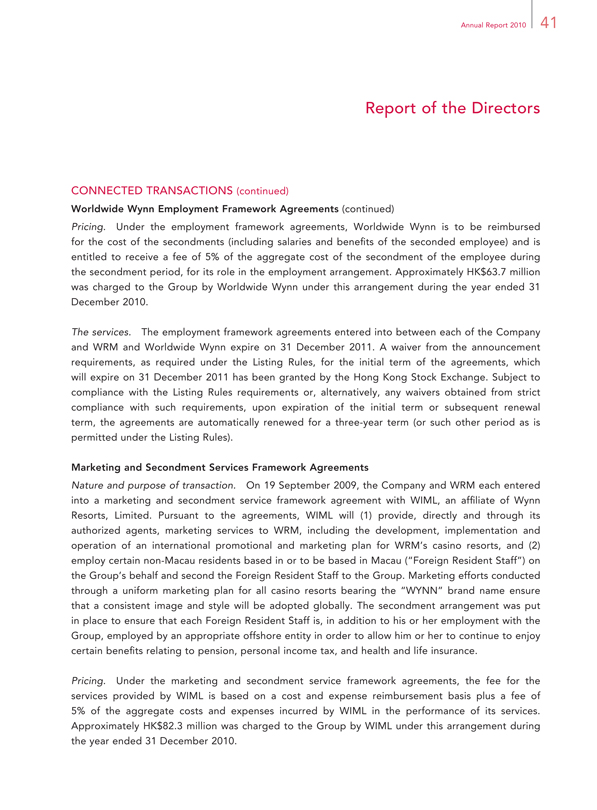
Annual Report 2010 41
Report of the Directors
CONNECTED TRANSACTIONS (continued)
Worldwide Wynn Employment Framework Agreements (continued)
Pricing. Under the employment framework agreements, Worldwide Wynn is to be reimbursed for the cost of the secondments (including salaries and benefits of the seconded employee) and is entitled to receive a fee of 5% of the aggregate cost of the secondment of the employee during the secondment period, for its role in the employment arrangement. Approximately HK$63.7 million was charged to the Group by Worldwide Wynn under this arrangement during the year ended 31 December 2010.
The services. The employment framework agreements entered into between each of the Company and WRM and Worldwide Wynn expire on 31 December 2011. A waiver from the announcement requirements, as required under the Listing Rules, for the initial term of the agreements, which will expire on 31 December 2011 has been granted by the Hong Kong Stock Exchange. Subject to compliance with the Listing Rules requirements or, alternatively, any waivers obtained from strict compliance with such requirements, upon expiration of the initial term or subsequent renewal term, the agreements are automatically renewed for a three-year term (or such other period as is permitted under the Listing Rules).
Marketing and Secondment Services Framework Agreements
Nature and purpose of transaction. On 19 September 2009, the Company and WRM each entered into a marketing and secondment service framework agreement with WIML, an affiliate of Wynn Resorts, Limited. Pursuant to the agreements, WIML will (1) provide, directly and through its authorized agents, marketing services to WRM, including the development, implementation and operation of an international promotional and marketing plan for WRM’s casino resorts, and (2) employ certain non-Macau residents based in or to be based in Macau (“Foreign Resident Staff”) on the Group’s behalf and second the Foreign Resident Staff to the Group. Marketing efforts conducted through a uniform marketing plan for all casino resorts bearing the “WYNN” brand name ensure that a consistent image and style will be adopted globally. The secondment arrangement was put in place to ensure that each Foreign Resident Staff is, in addition to his or her employment with the Group, employed by an appropriate offshore entity in order to allow him or her to continue to enjoy certain benefits relating to pension, personal income tax, and health and life insurance.
Pricing. Under the marketing and secondment service framework agreements, the fee for the services provided by WIML is based on a cost and expense reimbursement basis plus a fee of 5% of the aggregate costs and expenses incurred by WIML in the performance of its services. Approximately HK$82.3 million was charged to the Group by WIML under this arrangement during the year ended 31 December 2010.
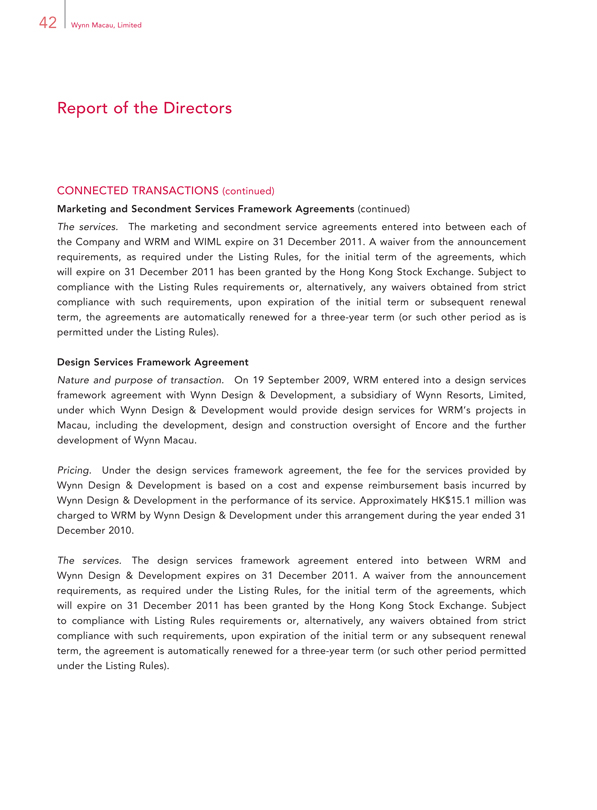
42 Wynn Macau, Limited
Report of the Directors
CONNECTED TRANSACTIONS (continued)
Marketing and Secondment Services Framework Agreements (continued)
The services. The marketing and secondment service agreements entered into between each of the Company and WRM and WIML expire on 31 December 2011. A waiver from the announcement requirements, as required under the Listing Rules, for the initial term of the agreements, which will expire on 31 December 2011 has been granted by the Hong Kong Stock Exchange. Subject to compliance with the Listing Rules requirements or, alternatively, any waivers obtained from strict compliance with such requirements, upon expiration of the initial term or subsequent renewal term, the agreements are automatically renewed for a three-year term (or such other period as is permitted under the Listing Rules).
Design Services Framework Agreement
Nature and purpose of transaction. On 19 September 2009, WRM entered into a design services framework agreement with Wynn Design & Development, a subsidiary of Wynn Resorts, Limited, under which Wynn Design & Development would provide design services for WRM’s projects in Macau, including the development, design and construction oversight of Encore and the further development of Wynn Macau.
Pricing. Under the design services framework agreement, the fee for the services provided by Wynn Design & Development is based on a cost and expense reimbursement basis incurred by Wynn Design & Development in the performance of its service. Approximately HK$15.1 million was charged to WRM by Wynn Design & Development under this arrangement during the year ended 31 December 2010.
The services. The design services framework agreement entered into between WRM and Wynn Design & Development expires on 31 December 2011. A waiver from the announcement requirements, as required under the Listing Rules, for the initial term of the agreements, which will expire on 31 December 2011 has been granted by the Hong Kong Stock Exchange. Subject to compliance with Listing Rules requirements or, alternatively, any waivers obtained from strict compliance with such requirements, upon expiration of the initial term or any subsequent renewal term, the agreement is automatically renewed for a three-year term (or such other period permitted under the Listing Rules).
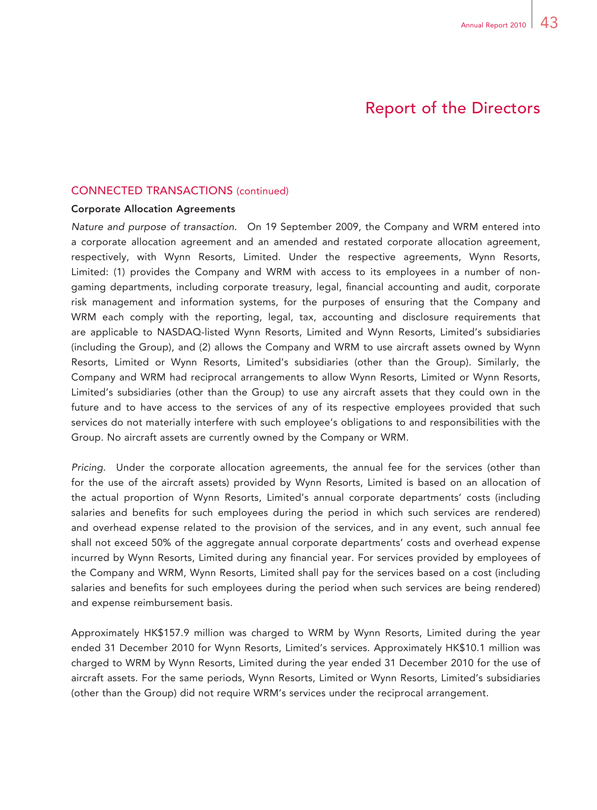
Annual Report 2010 43
Report of the Directors
CONNECTED TRANSACTIONS (continued)
Corporate Allocation Agreements
Nature and purpose of transaction. On 19 September 2009, the Company and WRM entered into a corporate allocation agreement and an amended and restated corporate allocation agreement, respectively, with Wynn Resorts, Limited. Under the respective agreements, Wynn Resorts, Limited: (1) provides the Company and WRM with access to its employees in a number of non-gaming departments, including corporate treasury, legal, financial accounting and audit, corporate risk management and information systems, for the purposes of ensuring that the Company and WRM each comply with the reporting, legal, tax, accounting and disclosure requirements that are applicable to NASDAQ-listed Wynn Resorts, Limited and Wynn Resorts, Limited’s subsidiaries (including the Group), and (2) allows the Company and WRM to use aircraft assets owned by Wynn Resorts, Limited or Wynn Resorts, Limited’s subsidiaries (other than the Group). Similarly, the Company and WRM had reciprocal arrangements to allow Wynn Resorts, Limited or Wynn Resorts, Limited’s subsidiaries (other than the Group) to use any aircraft assets that they could own in the future and to have access to the services of any of its respective employees provided that such services do not materially interfere with such employee’s obligations to and responsibilities with the Group. No aircraft assets are currently owned by the Company or WRM.
Pricing. Under the corporate allocation agreements, the annual fee for the services (other than for the use of the aircraft assets) provided by Wynn Resorts, Limited is based on an allocation of the actual proportion of Wynn Resorts, Limited’s annual corporate departments’ costs (including salaries and benefits for such employees during the period in which such services are rendered) and overhead expense related to the provision of the services, and in any event, such annual fee shall not exceed 50% of the aggregate annual corporate departments’ costs and overhead expense incurred by Wynn Resorts, Limited during any fi nancial year. For services provided by employees of the Company and WRM, Wynn Resorts, Limited shall pay for the services based on a cost (including salaries and benefits for such employees during the period when such services are being rendered) and expense reimbursement basis.
Approximately HK$157.9 million was charged to WRM by Wynn Resorts, Limited during the year ended 31 December 2010 for Wynn Resorts, Limited’s services. Approximately HK$10.1 million was charged to WRM by Wynn Resorts, Limited during the year ended 31 December 2010 for the use of aircraft assets. For the same periods, Wynn Resorts, Limited or Wynn Resorts, Limited’s subsidiaries (other than the Group) did not require WRM’s services under the reciprocal arrangement.
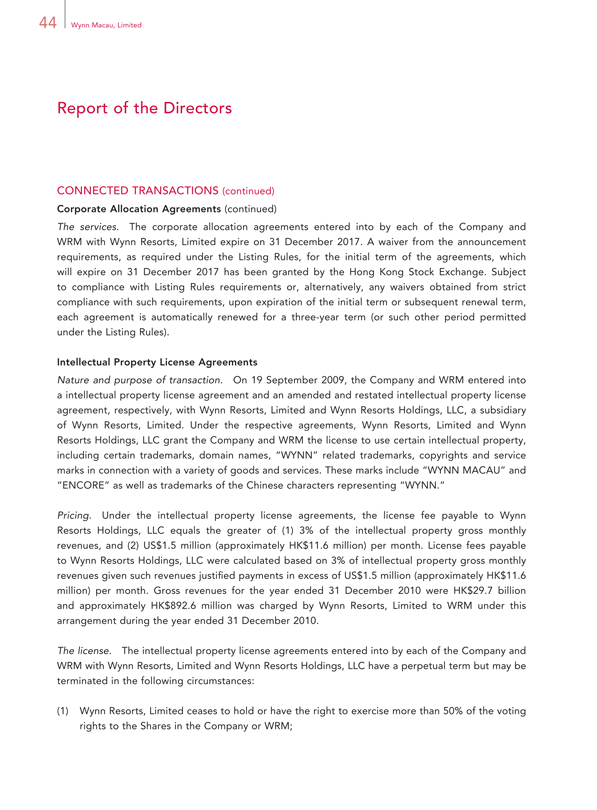
44 Wynn Macau, Limited
Report of the Directors
CONNECTED TRANSACTIONS (continued)
Corporate Allocation Agreements (continued)
The services. The corporate allocation agreements entered into by each of the Company and WRM with Wynn Resorts, Limited expire on 31 December 2017. A waiver from the announcement requirements, as required under the Listing Rules, for the initial term of the agreements, which will expire on 31 December 2017 has been granted by the Hong Kong Stock Exchange. Subject to compliance with Listing Rules requirements or, alternatively, any waivers obtained from strict compliance with such requirements, upon expiration of the initial term or subsequent renewal term, each agreement is automatically renewed for a three-year term (or such other period permitted under the Listing Rules).
Intellectual Property License Agreements
Nature and purpose of transaction. On 19 September 2009, the Company and WRM entered into a intellectual property license agreement and an amended and restated intellectual property license agreement, respectively, with Wynn Resorts, Limited and Wynn Resorts Holdings, LLC, a subsidiary of Wynn Resorts, Limited. Under the respective agreements, Wynn Resorts, Limited and Wynn Resorts Holdings, LLC grant the Company and WRM the license to use certain intellectual property, including certain trademarks, domain names, “WYNN” related trademarks, copyrights and service marks in connection with a variety of goods and services. These marks include “WYNN MACAU” and “ENCORE” as well as trademarks of the Chinese characters representing “WYNN.”
Pricing. Under the intellectual property license agreements, the license fee payable to Wynn Resorts Holdings, LLC equals the greater of (1) 3% of the intellectual property gross monthly revenues, and (2) US$1.5 million (approximately HK$11.6 million) per month. License fees payable to Wynn Resorts Holdings, LLC were calculated based on 3% of intellectual property gross monthly revenues given such revenues justified payments in excess of US$1.5 million (approximately HK$11.6 million) per month. Gross revenues for the year ended 31 December 2010 were HK$29.7 billion and approximately HK$892.6 million was charged by Wynn Resorts, Limited to WRM under this arrangement during the year ended 31 December 2010.
The license. The intellectual property license agreements entered into by each of the Company and WRM with Wynn Resorts, Limited and Wynn Resorts Holdings, LLC have a perpetual term but may be terminated in the following circumstances:
Wynn Resorts, Limited ceases to hold or have the right to exercise more than 50% of the voting rights to the Shares in the Company or WRM;
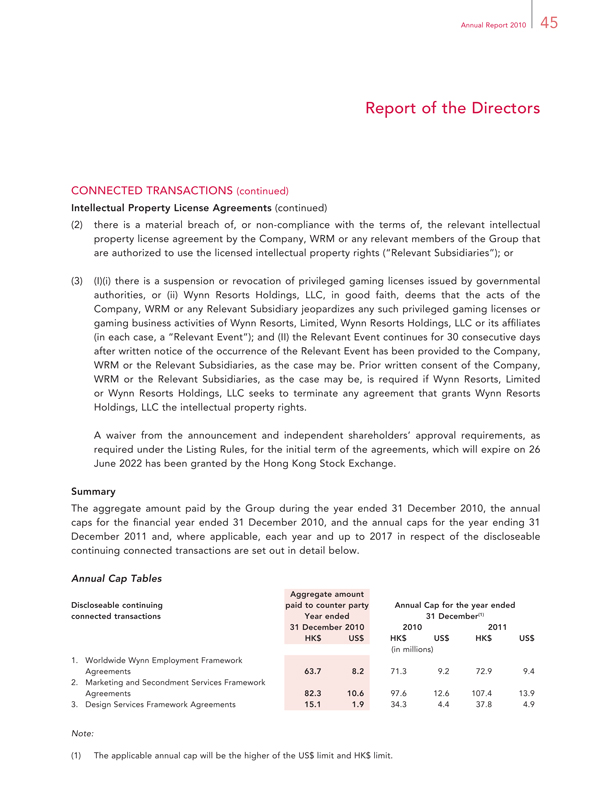
Annual Report 2010 45
Report of the Directors
CONNECTED TRANSACTIONS (continued)
Intellectual Property License Agreements (continued)
there is a material breach of, or non-compliance with the terms of, the relevant intellectual property license agreement by the Company, WRM or any relevant members of the Group that are authorized to use the licensed intellectual property rights (“Relevant Subsidiaries”); or
(I)(i) there is a suspension or revocation of privileged gaming licenses issued by governmental authorities, or (ii) Wynn Resorts Holdings, LLC, in good faith, deems that the acts of the Company, WRM or any Relevant Subsidiary jeopardizes any such privileged gaming licenses or gaming business activities of Wynn Resorts, Limited, Wynn Resorts Holdings, LLC or its affiliates (in each case, a “Relevant Event”); and (II) the Relevant Event continues for 30 consecutive days after written notice of the occurrence of the Relevant Event has been provided to the Company, WRM or the Relevant Subsidiaries, as the case may be. Prior written consent of the Company, WRM or the Relevant Subsidiaries, as the case may be, is required if Wynn Resorts, Limited or Wynn Resorts Holdings, LLC seeks to terminate any agreement that grants Wynn Resorts Holdings, LLC the intellectual property rights.
A waiver from the announcement and independent shareholders’ approval requirements, as required under the Listing Rules, for the initial term of the agreements, which will expire on 26 June 2022 has been granted by the Hong Kong Stock Exchange.
Summary
The aggregate amount paid by the Group during the year ended 31 December 2010, the annual caps for the financial year ended 31 December 2010, and the annual caps for the year ending 31 December 2011 and, where applicable, each year and up to 2017 in respect of the discloseable continuing connected transactions are set out in detail below.
Annual Cap Tables
Aggregate amount
Discloseable continuing paid to counter party Annual Cap for the year ended
connected transactions Year ended 31 December(1)
31 | | December 2010 2010 2011 |
HK$ US$ HK$ US$ HK$ US$
(in millions)
1. | | Worldwide Wynn Employment Framework |
Agreements 63.7 8.2 71.3 9.2 72.9 9.4
2. | | Marketing and Secondment Services Framework |
Agreements 82.3 10.6 97.6 12.6 107.4 13.9
3. | | Design Services Framework Agreements 15.1 1.9 34.3 4.4 37.8 4.9 |
Note:
(1) | | The applicable annual cap will be the higher of the US$ limit and HK$ limit. |
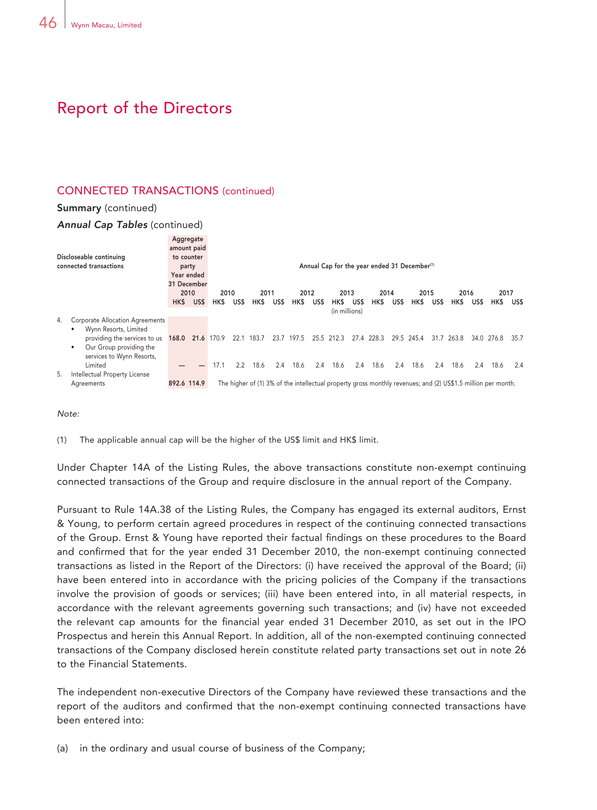
46 Wynn Macau, Limited
Report of the Directors
CONNECTED TRANSACTIONS (continued)
Summary (continued)
Annual Cap Tables (continued)
Aggregate
amount paid
Discloseable continuing to counter
connected transactions party Annual Cap for the year ended 31 December(1)
Year ended
2010 2010 2011 2012 2013 2014 2015 2016 2017
HK$ US$ HK$ US$ HK$ US$ HK$ US$ HK$ US$ HK$ US$ HK$ US$ HK$ US$ HK$ US$
(in millions)
Corporate Allocation Agreements
Wynn Resorts, Limited providing the services to us 168.0 21.6 170.9 22.1 183.7 23.7 197.5 25.5 212.3 27.4 228.3 29.5 245.4 31.7 263.8 34.0 276.8 35.7
Our Group providing the services to Wynn Resorts,
Limited — — 17.1 2.2 18.6 2.4 18.6 2.4 18.6 2.4 18.6 2.4 18.6 2.4 18.6 2.4 18.6 2.4
5. | | Intellectual Property License |
Agreements 892.6 114.9 The higher of (1) 3% of the intellectual property gross monthly revenues; and (2) US$1.5 million per month.
Note:
(1) | | The applicable annual cap will be the higher of the US$ limit and HK$ limit. |
Under Chapter 14A of the Listing Rules, the above transactions constitute non-exempt continuing connected transactions of the Group and require disclosure in the annual report of the Company.
Pursuant to Rule 14A.38 of the Listing Rules, the Company has engaged its external auditors, Ernst & Young, to perform certain agreed procedures in respect of the continuing connected transactions of the Group. Ernst & Young have reported their factual findings on these procedures to the Board and confirmed that for the year ended 31 December 2010, the non-exempt continuing connected transactions as listed in the Report of the Directors: (i) have received the approval of the Board; (ii) have been entered into in accordance with the pricing policies of the Company if the transactions involve the provision of goods or services; (iii) have been entered into, in all material respects, in accordance with the relevant agreements governing such transactions; and (iv) have not exceeded the relevant cap amounts for the financial year ended 31 December 2010, as set out in the IPO Prospectus and herein this Annual Report. In addition, all of the non-exempted continuing connected transactions of the Company disclosed herein constitute related party transactions set out in note 26 to the Financial Statements.
The independent non-executive Directors of the Company have reviewed these transactions and the report of the auditors and confirmed that the non-exempt continuing connected transactions have been entered into:
(a) | | in the ordinary and usual course of business of the Company; |
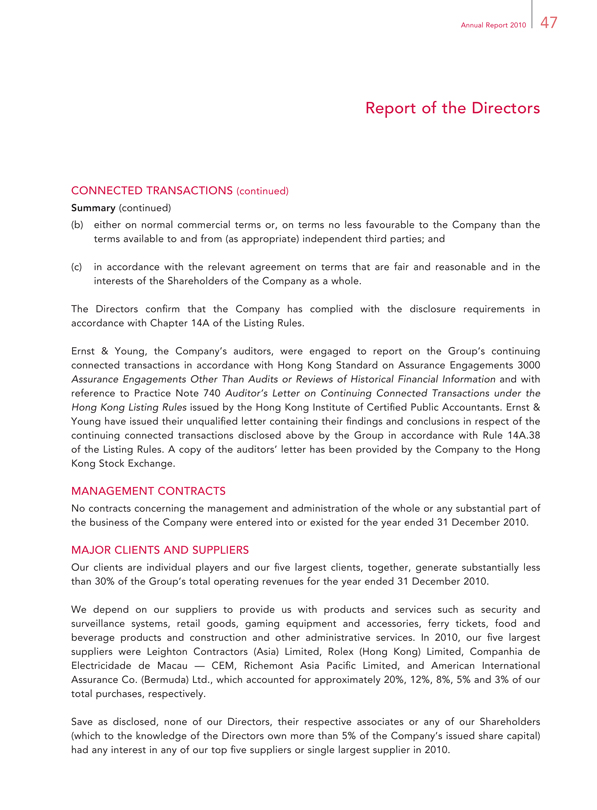
Annual Report 2010 47
Report of the Directors
CONNECTED TRANSACTIONS (continued)
Summary (continued)
either on normal commercial terms or, on terms no less favourable to the Company than the terms available to and from (as appropriate) independent third parties; and
in accordance with the relevant agreement on terms that are fair and reasonable and in the interests of the Shareholders of the Company as a whole.
The Directors confirm that the Company has complied with the disclosure requirements in accordance with Chapter 14A of the Listing Rules.
Ernst & Young, the Company’s auditors, were engaged to report on the Group’s continuing connected transactions in accordance with Hong Kong Standard on Assurance Engagements 3000
Assurance Engagements Other Than Audits or Reviews of Historical Financial Information and with reference to Practice Note 740 Auditor’s Letter on Continuing Connected Transactions under the Hong Kong Listing Rules issued by the Hong Kong Institute of Certified Public Accountants. Ernst & Young have issued their unqualified letter containing their findings and conclusions in respect of the continuing connected transactions disclosed above by the Group in accordance with Rule 14A.38 of the Listing Rules. A copy of the auditors’ letter has been provided by the Company to the Hong Kong Stock Exchange.
MANAGEMENT CONTRACTS
No contracts concerning the management and administration of the whole or any substantial part of the business of the Company were entered into or existed for the year ended 31 December 2010.
MAJOR CLIENTS AND SUPPLIERS
Our clients are individual players and our five largest clients, together, generate substantially less than 30% of the Group’s total operating revenues for the year ended 31 December 2010.
We depend on our suppliers to provide us with products and services such as security and surveillance systems, retail goods, gaming equipment and accessories, ferry tickets, food and beverage products and construction and other administrative services. In 2010, our five largest suppliers were Leighton Contractors (Asia) Limited, Rolex (Hong Kong) Limited, Companhia de Electricidade de Macau — CEM, Richemont Asia Pacific Limited, and American International Assurance Co. (Bermuda) Ltd., which accounted for approximately 20%, 12%, 8%, 5% and 3% of our total purchases, respectively.
Save as disclosed, none of our Directors, their respective associates or any of our Shareholders (which to the knowledge of the Directors own more than 5% of the Company’s issued share capital) had any interest in any of our top five suppliers or single largest supplier in 2010.
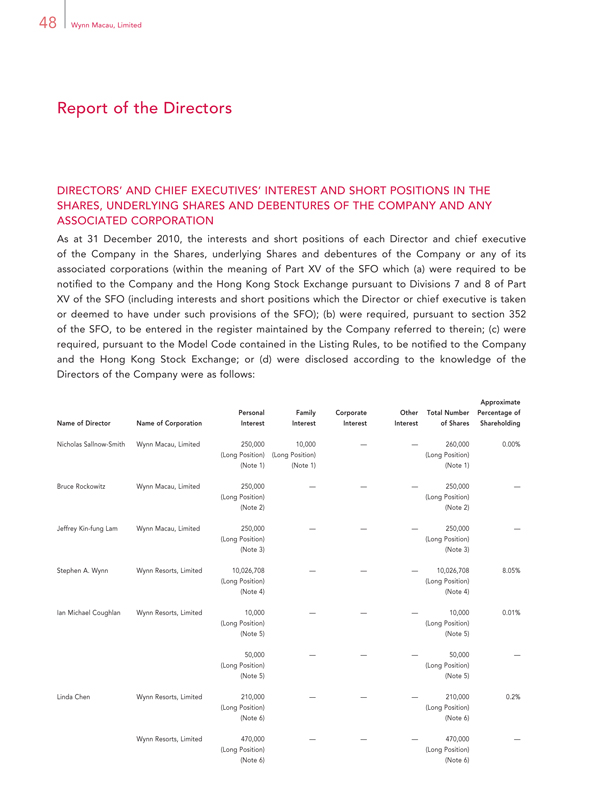
48 Wynn Macau, Limited
Report of the Directors
DIRECTORS’ AND CHIEF EXECUTIVES’ INTEREST AND SHORT POSITIONS IN THE SHARES, UNDERLYING SHARES AND DEBENTURES OF THE COMPANY AND ANY ASSOCIATED CORPORATION
As at 31 December 2010, the interests and short positions of each Director and chief executive of the Company in the Shares, underlying Shares and debentures of the Company or any of its associated corporations (within the meaning of Part XV of the SFO which (a) were required to be notified to the Company and the Hong Kong Stock Exchange pursuant to Divisions 7 and 8 of Part XV of the SFO (including interests and short positions which the Director or chief executive is taken or deemed to have under such provisions of the SFO); (b) were required, pursuant to section 352 of the SFO, to be entered in the register maintained by the Company referred to therein; (c) were required, pursuant to the Model Code contained in the Listing Rules, to be notified to the Company and the Hong Kong Stock Exchange; or (d) were disclosed according to the knowledge of the Directors of the Company were as follows:
Approximate
Personal Family Corporate Other Total Number Percentage of
Name of Director Name of Corporation Interest Interest Interest Interest of Shares Shareholding
Nicholas Sallnow-Smith Wynn Macau, Limited 250,000 10,000 — — 260,000 0.00%
(Long Position) (Long Position) (Long Position)
(Note 1) (Note 1) (Note 1)
Bruce Rockowitz Wynn Macau, Limited 250,000 — — — 250,000 —
(Long Position) (Long Position)
(Note 2) (Note 2)
Jeffrey Kin-fung Lam Wynn Macau, Limited 250,000 — — — 250,000 —
(Long Position) (Long Position)
(Note 3) (Note 3)
Stephen A. Wynn Wynn Resorts, Limited 10,026,708 — — — 10,026,708 8.05%
(Long Position) (Long Position)
(Note 4) (Note 4)
Ian Michael Coughlan Wynn Resorts, Limited 10,000 — — — 10,000 0.01%
(Long Position) (Long Position)
(Note 5) (Note 5)
50,000 — — — 50,000 —
(Long Position) (Long Position)
(Note 5) (Note 5)
Linda Chen Wynn Resorts, Limited 210,000 — — — 210,000 0.2%
(Long Position) (Long Position)
(Note 6) (Note 6)
Wynn Resorts, Limited 470,000 — — — 470,000 —
(Long Position) (Long Position)
(Note 6) (Note 6)
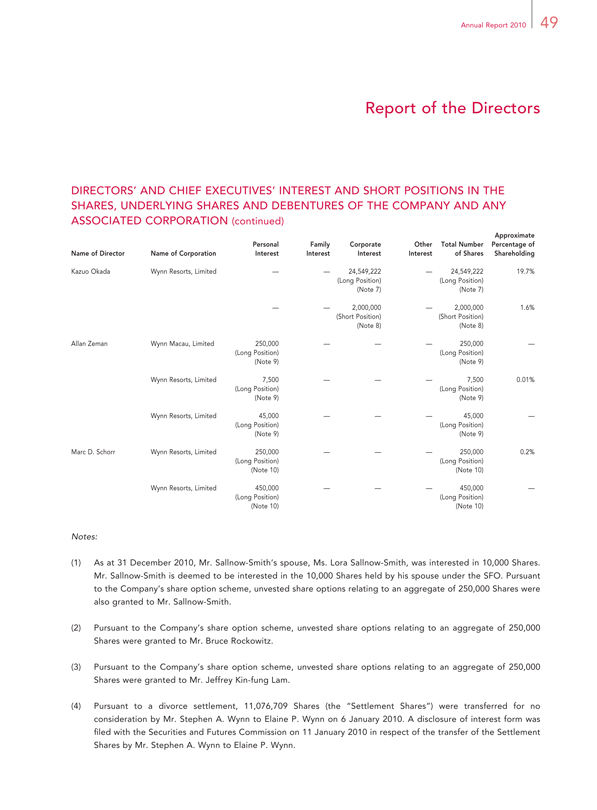
Annual Report 2010 49
Report of the Directors
DIRECTORS’ AND CHIEF EXECUTIVES’ INTEREST AND SHORT POSITIONS IN THE SHARES, UNDERLYING SHARES AND DEBENTURES OF THE COMPANY AND ANY ASSOCIATED CORPORATION (continued)
Approximate
Personal Family Corporate Other Total Number Percentage of
Name of Director Name of Corporation Interest Interest Interest Interest of Shares Shareholding
Kazuo Okada Wynn Resorts, Limited — — 24,549,222 — 24,549,222 19.7%
(Long Position) (Long Position)
(Note 7) (Note 7)
— — 2,000,000 — 2,000,000 1.6%
(Short Position) (Short Position)
(Note 8) (Note 8)
Allan Zeman Wynn Macau, Limited 250,000 — — — 250,000 —
(Long Position) (Long Position)
(Note 9) (Note 9)
Wynn Resorts, Limited 7,500 — — — 7,500 0.01%
(Long Position) (Long Position)
(Note 9) (Note 9)
Wynn Resorts, Limited 45,000 — — — 45,000 —
(Long Position) (Long Position)
(Note 9) (Note 9)
Marc D. Schorr Wynn Resorts, Limited 250,000 — — — 250,000 0.2%
(Long Position) (Long Position)
(Note 10) (Note 10)
Wynn Resorts, Limited 450,000 — — — 450,000 —
(Long Position) (Long Position)
(Note 10) (Note 10)
Notes:
As at 31 December 2010, Mr. Sallnow-Smith’s spouse, Ms. Lora Sallnow-Smith, was interested in 10,000 Shares. Mr. Sallnow-Smith is deemed to be interested in the 10,000 Shares held by his spouse under the SFO. Pursuant to the Company’s share option scheme, unvested share options relating to an aggregate of 250,000 Shares were also granted to Mr. Sallnow-Smith.
Pursuant to the Company’s share option scheme, unvested share options relating to an aggregate of 250,000 Shares were granted to Mr. Bruce Rockowitz.
Pursuant to the Company’s share option scheme, unvested share options relating to an aggregate of 250,000 Shares were granted to Mr. Jeffrey Kin-fung Lam.
Pursuant to a divorce settlement, 11,076,709 Shares (the “Settlement Shares”) were transferred for no consideration by Mr. Stephen A. Wynn to Elaine P. Wynn on 6 January 2010. A disclosure of interest form was filed with the Securities and Futures Commission on 11 January 2010 in respect of the transfer of the Settlement Shares by Mr. Stephen A. Wynn to Elaine P. Wynn.
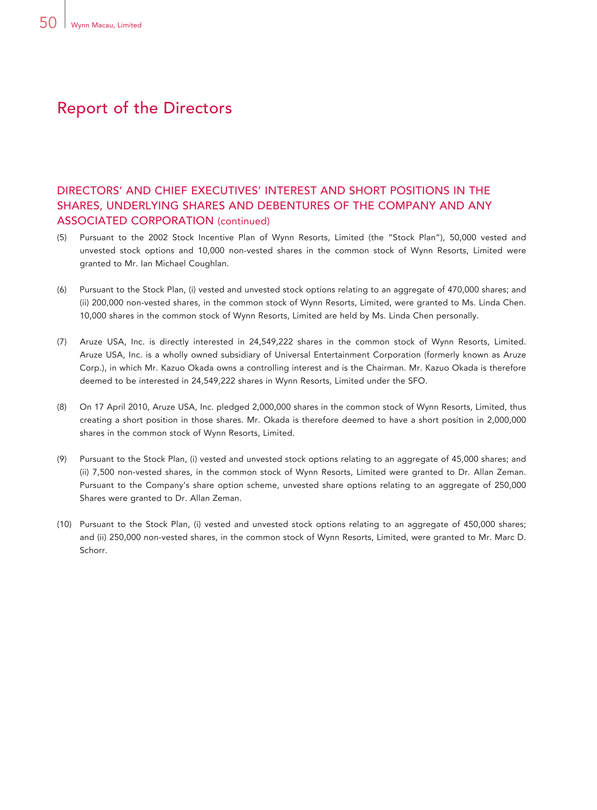
50 Wynn Macau, Limited
Report of the Directors
DIRECTORS’ AND CHIEF EXECUTIVES’ INTEREST AND SHORT POSITIONS IN THE SHARES, UNDERLYING SHARES AND DEBENTURES OF THE COMPANY AND ANY ASSOCIATED CORPORATION (continued)
Pursuant to the 2002 Stock Incentive Plan of Wynn Resorts, Limited (the “Stock Plan”), 50,000 vested and unvested stock options and 10,000 non-vested shares in the common stock of Wynn Resorts, Limited were granted to Mr. Ian Michael Coughlan.
Pursuant to the Stock Plan, (i) vested and unvested stock options relating to an aggregate of 470,000 shares; and
200,000 non-vested shares, in the common stock of Wynn Resorts, Limited, were granted to Ms. Linda Chen.
10,000 shares in the common stock of Wynn Resorts, Limited are held by Ms. Linda Chen personally.
Aruze USA, Inc. is directly interested in 24,549,222 shares in the common stock of Wynn Resorts, Limited. Aruze USA, Inc. is a wholly owned subsidiary of Universal Entertainment Corporation (formerly known as Aruze Corp.), in which Mr. Kazuo Okada owns a controlling interest and is the Chairman. Mr. Kazuo Okada is therefore deemed to be interested in 24,549,222 shares in Wynn Resorts, Limited under the SFO.
On 17 April 2010, Aruze USA, Inc. pledged 2,000,000 shares in the common stock of Wynn Resorts, Limited, thus creating a short position in those shares. Mr. Okada is therefore deemed to have a short position in 2,000,000 shares in the common stock of Wynn Resorts, Limited.
Pursuant to the Stock Plan, (i) vested and unvested stock options relating to an aggregate of 45,000 shares; and
7,500 non-vested shares, in the common stock of Wynn Resorts, Limited were granted to Dr. Allan Zeman.
Pursuant to the Company’s share option scheme, unvested share options relating to an aggregate of 250,000 Shares were granted to Dr. Allan Zeman.
Pursuant to the Stock Plan, (i) vested and unvested stock options relating to an aggregate of 450,000 shares; and (ii) 250,000 non-vested shares, in the common stock of Wynn Resorts, Limited, were granted to Mr. Marc D.
Schorr.
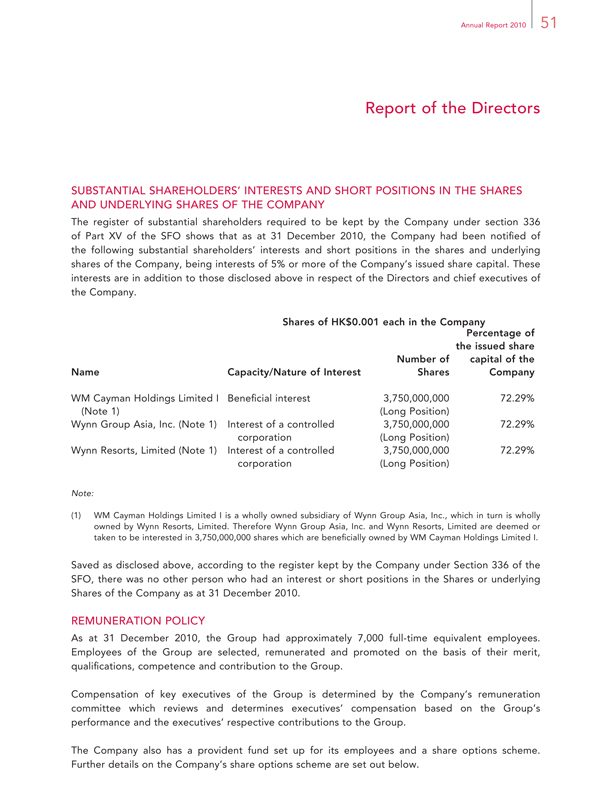
Annual Report 2010 51
Report of the Directors
SUBSTANTIAL SHAREHOLDERS’ INTERESTS AND SHORT POSITIONS IN THE SHARES AND UNDERLYING SHARES OF THE COMPANY
The register of substantial shareholders required to be kept by the Company under section 336 of Part XV of the SFO shows that as at 31 December 2010, the Company had been notified of the following substantial shareholders’ interests and short positions in the shares and underlying shares of the Company, being interests of 5% or more of the Company’s issued share capital. These interests are in addition to those disclosed above in respect of the Directors and chief executives of the Company.
Shares of HK$0.001 each in the Company
Percentage of
the issued share
Number of capital of the
Name Capacity/Nature of Interest Shares Company
WM Cayman Holdings Limited I Beneficial interest 3,750,000,000 72.29%
(Note 1)(Long Position)
Wynn Group Asia, Inc. (Note 1) Interest of a controlled 3,750,000,000 72.29%
corporation(Long Position)
Wynn Resorts, Limited (Note 1) Interest of a controlled 3,750,000,000 72.29%
corporation(Long Position)
Note:
WM Cayman Holdings Limited I is a wholly owned subsidiary of Wynn Group Asia, Inc., which in turn is wholly owned by Wynn Resorts, Limited. Therefore Wynn Group Asia, Inc. and Wynn Resorts, Limited are deemed or taken to be interested in 3,750,000,000 shares which are beneficially owned by WM Cayman Holdings Limited I.
Saved as disclosed above, according to the register kept by the Company under Section 336 of the SFO, there was no other person who had an interest or short positions in the Shares or underlying Shares of the Company as at 31 December 2010.
REMUNERATION POLICY
As at 31 December 2010, the Group had approximately 7,000 full-time equivalent employees. Employees of the Group are selected, remunerated and promoted on the basis of their merit, qualifications, competence and contribution to the Group.
Compensation of key executives of the Group is determined by the Company’s remuneration committee which reviews and determines executives’ compensation based on the Group’s performance and the executives’ respective contributions to the Group.
The Company also has a provident fund set up for its employees and a share options scheme. Further details on the Company’s share options scheme are set out below.
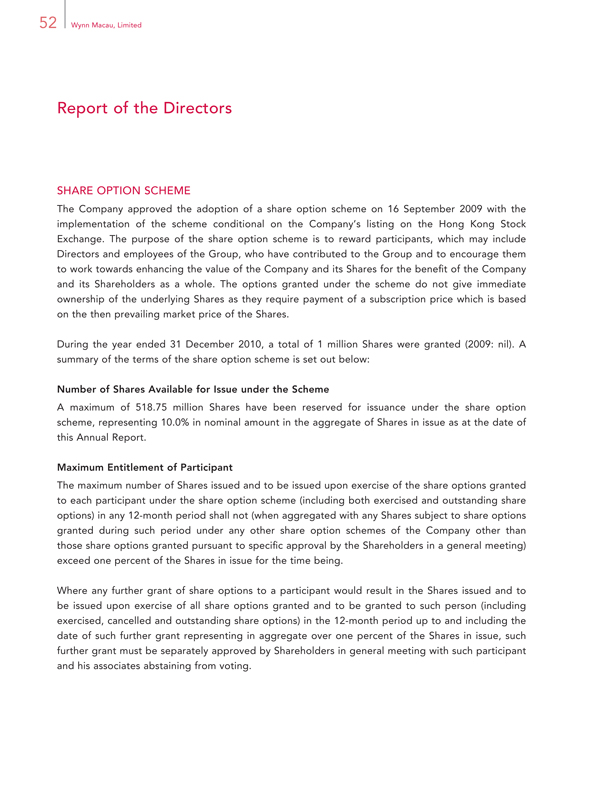
52 Wynn Macau, Limited
Report of the Directors
SHARE OPTION SCHEME
The Company approved the adoption of a share option scheme on 16 September 2009 with the implementation of the scheme conditional on the Company’s listing on the Hong Kong Stock Exchange. The purpose of the share option scheme is to reward participants, which may include Directors and employees of the Group, who have contributed to the Group and to encourage them to work towards enhancing the value of the Company and its Shares for the benefit of the Company and its Shareholders as a whole. The options granted under the scheme do not give immediate ownership of the underlying Shares as they require payment of a subscription price which is based on the then prevailing market price of the Shares.
During the year ended 31 December 2010, a total of 1 million Shares were granted (2009: nil). A summary of the terms of the share option scheme is set out below:
Number of Shares Available for Issue under the Scheme
A maximum of 518.75 million Shares have been reserved for issuance under the share option scheme, representing 10.0% in nominal amount in the aggregate of Shares in issue as at the date of this Annual Report.
Maximum Entitlement of Participant
The maximum number of Shares issued and to be issued upon exercise of the share options granted to each participant under the share option scheme (including both exercised and outstanding share options) in any 12-month period shall not (when aggregated with any Shares subject to share options granted during such period under any other share option schemes of the Company other than those share options granted pursuant to specific approval by the Shareholders in a general meeting) exceed one percent of the Shares in issue for the time being.
Where any further grant of share options to a participant would result in the Shares issued and to be issued upon exercise of all share options granted and to be granted to such person (including exercised, cancelled and outstanding share options) in the 12-month period up to and including the date of such further grant representing in aggregate over one percent of the Shares in issue, such further grant must be separately approved by Shareholders in general meeting with such participant and his associates abstaining from voting.
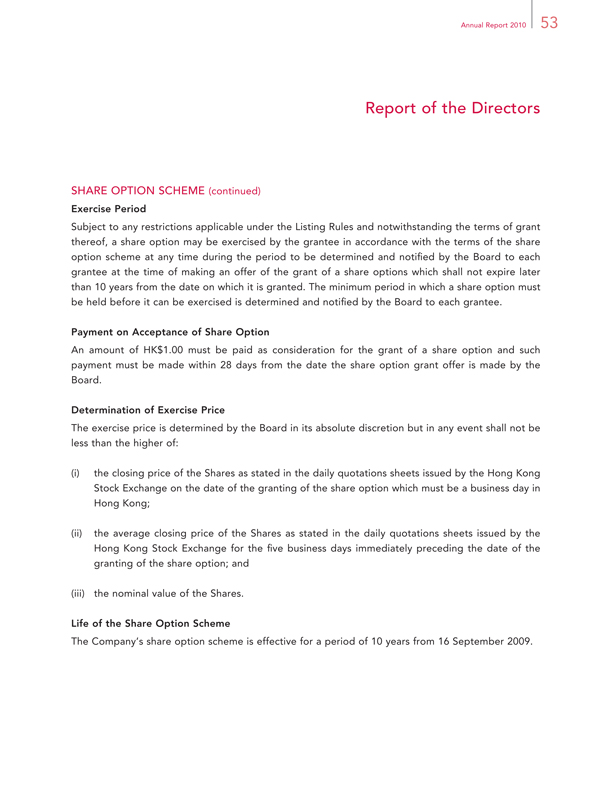
Annual Report 2010 53
Report of the Directors
SHARE OPTION SCHEME (continued)
Exercise Period
Subject to any restrictions applicable under the Listing Rules and notwithstanding the terms of grant thereof, a share option may be exercised by the grantee in accordance with the terms of the share option scheme at any time during the period to be determined and notified by the Board to each grantee at the time of making an offer of the grant of a share options which shall not expire later than 10 years from the date on which it is granted. The minimum period in which a share option must be held before it can be exercised is determined and notified by the Board to each grantee.
Payment on Acceptance of Share Option
An amount of HK$1.00 must be paid as consideration for the grant of a share option and such payment must be made within 28 days from the date the share option grant offer is made by the Board.
Determination of Exercise Price
The exercise price is determined by the Board in its absolute discretion but in any event shall not be less than the higher of:
the closing price of the Shares as stated in the daily quotations sheets issued by the Hong Kong Stock Exchange on the date of the granting of the share option which must be a business day in Hong Kong;
the average closing price of the Shares as stated in the daily quotations sheets issued by the Hong Kong Stock Exchange for the five business days immediately preceding the date of the granting of the share option; and
the nominal value of the Shares.
Life of the Share Option Scheme
The Company’s share option scheme is effective for a period of 10 years from 16 September 2009.
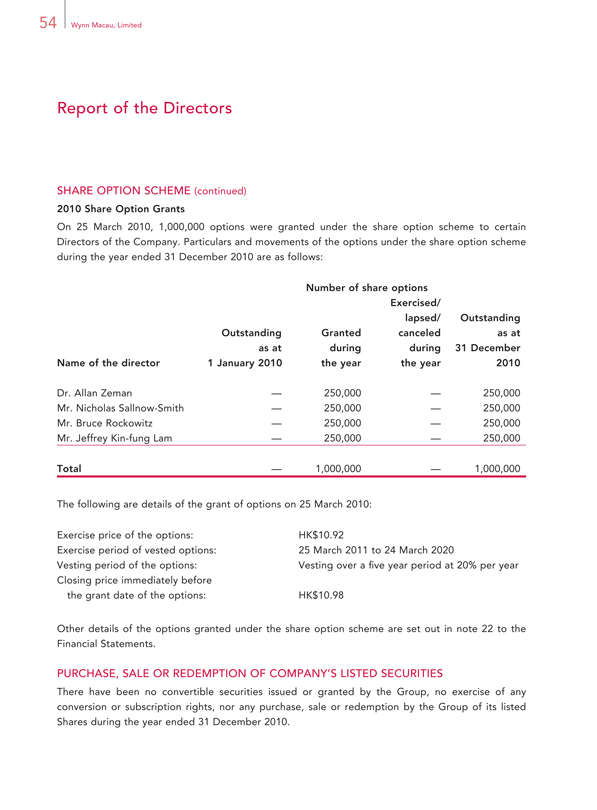
54 Wynn Macau, Limited
Report of the Directors
SHARE OPTION SCHEME (continued)
2010 Share Option Grants
On 25 March 2010, 1,000,000 options were granted under the share option scheme to certain Directors of the Company. Particulars and movements of the options under the share option scheme during the year ended 31 December 2010 are as follows:
Number of share options
Exercised/
lapsed/ Outstanding
Outstanding Granted canceled as at
as at during during 31 December
Name of the director 1 January 2010 the year the year 2010
Dr. Allan Zeman — 250,000 — 250,000
Mr. Nicholas Sallnow-Smith — 250,000 — 250,000
Mr. Bruce Rockowitz — 250,000 — 250,000
Mr. Jeffrey Kin-fung Lam — 250,000 — 250,000
Total — 1,000,000 — 1,000,000
The following are details of the grant of options on 25 March 2010:
Exercise price of the options: HK$10.92
Exercise period of vested options: 25 March 2011 to 24 March 2020
Vesting period of the options: Vesting over a five year period at 20% per year
Closing price immediately before
the grant date of the options: HK$10.98
Other details of the options granted under the share option scheme are set out in note 22 to the Financial Statements.
PURCHASE, SALE OR REDEMPTION OF COMPANY’S LISTED SECURITIES
There have been no convertible securities issued or granted by the Group, no exercise of any conversion or subscription rights, nor any purchase, sale or redemption by the Group of its listed Shares during the year ended 31 December 2010.
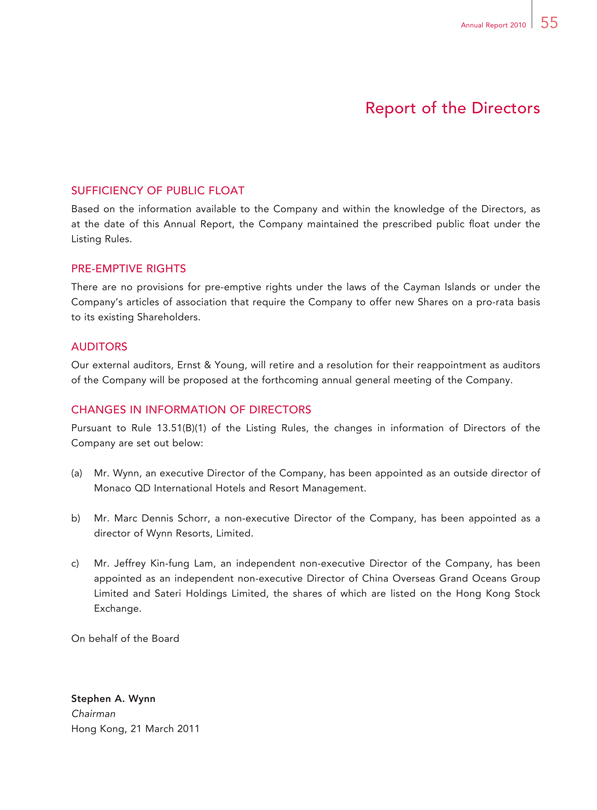
Annual Report 2010 55
Report of the Directors
SUFFICIENCY OF PUBLIC FLOAT
Based on the information available to the Company and within the knowledge of the Directors, as at the date of this Annual Report, the Company maintained the prescribed public fl oat under the Listing Rules.
PRE-EMPTIVE RIGHTS
There are no provisions for pre-emptive rights under the laws of the Cayman Islands or under the Company’s articles of association that require the Company to offer new Shares on a pro-rata basis to its existing Shareholders.
AUDITORS
Our external auditors, Ernst & Young, will retire and a resolution for their reappointment as auditors of the Company will be proposed at the forthcoming annual general meeting of the Company.
CHANGES IN INFORMATION OF DIRECTORS
Pursuant to Rule 13.51(B)(1) of the Listing Rules, the changes in information of Directors of the Company are set out below:
Mr. Wynn, an executive Director of the Company, has been appointed as an outside director of Monaco QD International Hotels and Resort Management.
Mr. Marc Dennis Schorr, a non-executive Director of the Company, has been appointed as a director of Wynn Resorts, Limited.
Mr. Jeffrey Kin-fung Lam, an independent non-executive Director of the Company, has been appointed as an independent non-executive Director of China Overseas Grand Oceans Group Limited and Sateri Holdings Limited, the shares of which are listed on the Hong Kong Stock Exchange.
On behalf of the Board
Stephen A. Wynn
Chairman
Hong Kong, 21 March 2011
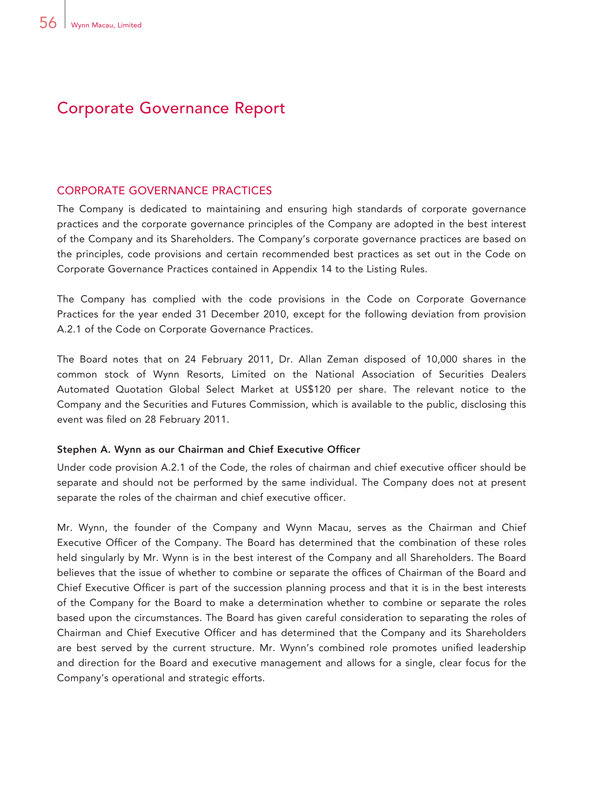
56 Wynn Macau, Limited
Corporate Governance Report
CORPORATE GOVERNANCE PRACTICES
The Company is dedicated to maintaining and ensuring high standards of corporate governance practices and the corporate governance principles of the Company are adopted in the best interest of the Company and its Shareholders. The Company’s corporate governance practices are based on the principles, code provisions and certain recommended best practices as set out in the Code on Corporate Governance Practices contained in Appendix 14 to the Listing Rules.
The Company has complied with the code provisions in the Code on Corporate Governance Practices for the year ended 31 December 2010, except for the following deviation from provision A.2.1 of the Code on Corporate Governance Practices.
The Board notes that on 24 February 2011, Dr. Allan Zeman disposed of 10,000 shares in the common stock of Wynn Resorts, Limited on the National Association of Securities Dealers Automated Quotation Global Select Market at US$120 per share. The relevant notice to the Company and the Securities and Futures Commission, which is available to the public, disclosing this event was filed on 28 February 2011.
Stephen A. Wynn as our Chairman and Chief Executive Officer
Under code provision A.2.1 of the Code, the roles of chairman and chief executive officer should be separate and should not be performed by the same individual. The Company does not at present separate the roles of the chairman and chief executive officer.
Mr. Wynn, the founder of the Company and Wynn Macau, serves as the Chairman and Chief Executive Officer of the Company. The Board has determined that the combination of these roles held singularly by Mr. Wynn is in the best interest of the Company and all Shareholders. The Board believes that the issue of whether to combine or separate the offices of Chairman of the Board and Chief Executive Officer is part of the succession planning process and that it is in the best interests of the Company for the Board to make a determination whether to combine or separate the roles based upon the circumstances. The Board has given careful consideration to separating the roles of Chairman and Chief Executive Officer and has determined that the Company and its Shareholders are best served by the current structure. Mr. Wynn’s combined role promotes unified leadership and direction for the Board and executive management and allows for a single, clear focus for the Company’s operational and strategic efforts.
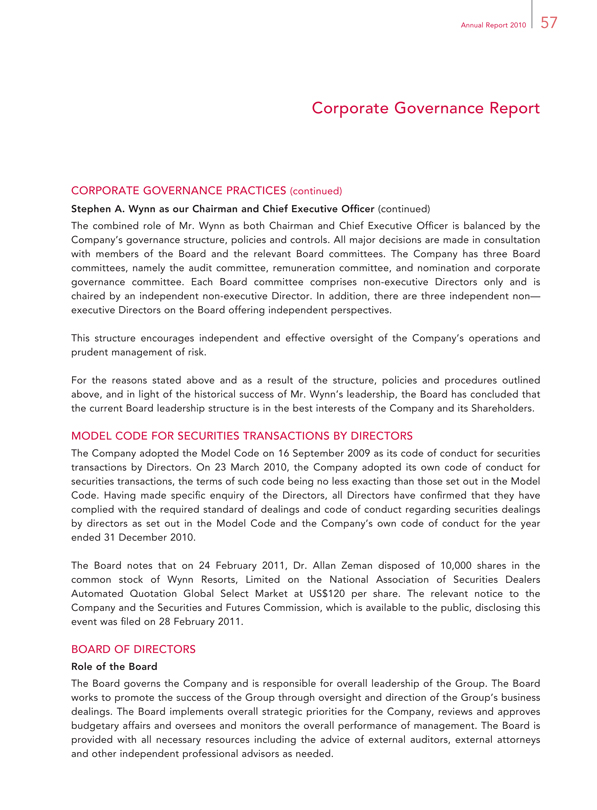
Annual Report 2010 57
Corporate Governance Report
CORPORATE GOVERNANCE PRACTICES (continued)
Stephen A. Wynn as our Chairman and Chief Executive Officer (continued)
The combined role of Mr. Wynn as both Chairman and Chief Executive Officer is balanced by the Company’s governance structure, policies and controls. All major decisions are made in consultation with members of the Board and the relevant Board committees. The Company has three Board committees, namely the audit committee, remuneration committee, and nomination and corporate governance committee. Each Board committee comprises non-executive Directors only and is chaired by an independent non-executive Director. In addition, there are three independent non—executive Directors on the Board offering independent perspectives.
This structure encourages independent and effective oversight of the Company’s operations and prudent management of risk.
For the reasons stated above and as a result of the structure, policies and procedures outlined above, and in light of the historical success of Mr. Wynn’s leadership, the Board has concluded that the current Board leadership structure is in the best interests of the Company and its Shareholders.
MODEL CODE FOR SECURITIES TRANSACTIONS BY DIRECTORS
The Company adopted the Model Code on 16 September 2009 as its code of conduct for securities transactions by Directors. On 23 March 2010, the Company adopted its own code of conduct for securities transactions, the terms of such code being no less exacting than those set out in the Model Code. Having made specific enquiry of the Directors, all Directors have confirmed that they have complied with the required standard of dealings and code of conduct regarding securities dealings by directors as set out in the Model Code and the Company’s own code of conduct for the year ended 31 December 2010.
The Board notes that on 24 February 2011, Dr. Allan Zeman disposed of 10,000 shares in the common stock of Wynn Resorts, Limited on the National Association of Securities Dealers Automated Quotation Global Select Market at US$120 per share. The relevant notice to the Company and the Securities and Futures Commission, which is available to the public, disclosing this event was filed on 28 February 2011.
BOARD OF DIRECTORS
Role of the Board
The Board governs the Company and is responsible for overall leadership of the Group. The Board works to promote the success of the Group through oversight and direction of the Group’s business dealings. The Board implements overall strategic priorities for the Company, reviews and approves budgetary affairs and oversees and monitors the overall performance of management. The Board is provided with all necessary resources including the advice of external auditors, external attorneys and other independent professional advisors as needed.
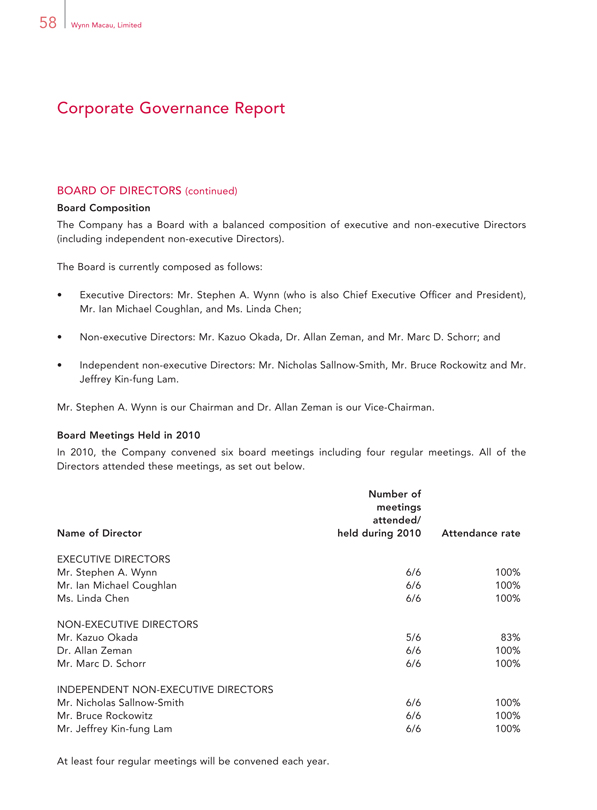
58 Wynn Macau, Limited
Corporate Governance Report
BOARD OF DIRECTORS (continued)
Board Composition
The Company has a Board with a balanced composition of executive and non-executive Directors (including independent non-executive Directors).
The Board is currently composed as follows:
Executive Directors: Mr. Stephen A. Wynn (who is also Chief Executive Officer and President), Mr. Ian Michael Coughlan, and Ms. Linda Chen;
Non-executive Directors: Mr. Kazuo Okada, Dr. Allan Zeman, and Mr. Marc D. Schorr; and
Independent non-executive Directors: Mr. Nicholas Sallnow-Smith, Mr. Bruce Rockowitz and Mr. Jeffrey Kin-fung Lam.
Mr. Stephen A. Wynn is our Chairman and Dr. Allan Zeman is our Vice-Chairman.
Board Meetings Held in 2010
In 2010, the Company convened six board meetings including four regular meetings. All of the Directors attended these meetings, as set out below.
Number of
meetings
attended/
Name of Director held during 2010 Attendance rate
EXECUTIVE DIRECTORS
Mr. Stephen A. Wynn 6/6 100%
Mr. Ian Michael Coughlan 6/6 100%
Ms. Linda Chen 6/6 100%
NON-EXECUTIVE DIRECTORS
Mr. Kazuo Okada 5/6 83%
Dr. Allan Zeman 6/6 100%
Mr. Marc D. Schorr 6/6 100%
INDEPENDENT NON-EXECUTIVE DIRECTORS
Mr. Nicholas Sallnow-Smith 6/6 100%
Mr. Bruce Rockowitz 6/6 100%
Mr. Jeffrey Kin-fung Lam 6/6 100%
At least four regular meetings will be convened each year.
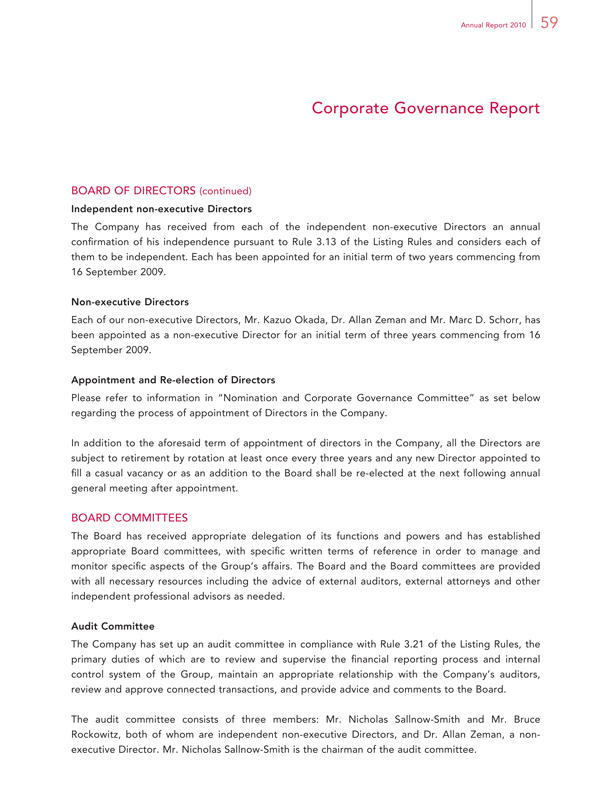
Annual Report 2010 59
Corporate Governance Report
BOARD OF DIRECTORS (continued)
Independent non-executive Directors
The Company has received from each of the independent non-executive Directors an annual confirmation of his independence pursuant to Rule 3.13 of the Listing Rules and considers each of them to be independent. Each has been appointed for an initial term of two years commencing from 16 September 2009.
Non-executive Directors
Each of our non-executive Directors, Mr. Kazuo Okada, Dr. Allan Zeman and Mr. Marc D. Schorr, has been appointed as a non-executive Director for an initial term of three years commencing from 16 September 2009.
Appointment and Re-election of Directors
Please refer to information in “Nomination and Corporate Governance Committee” as set below regarding the process of appointment of Directors in the Company.
In addition to the aforesaid term of appointment of directors in the Company, all the Directors are subject to retirement by rotation at least once every three years and any new Director appointed to fill a casual vacancy or as an addition to the Board shall be re-elected at the next following annual general meeting after appointment.
BOARD COMMITTEES
The Board has received appropriate delegation of its functions and powers and has established appropriate Board committees, with specific written terms of reference in order to manage and monitor specific aspects of the Group’s affairs. The Board and the Board committees are provided with all necessary resources including the advice of external auditors, external attorneys and other independent professional advisors as needed.
Audit Committee
The Company has set up an audit committee in compliance with Rule 3.21 of the Listing Rules, the primary duties of which are to review and supervise the financial reporting process and internal control system of the Group, maintain an appropriate relationship with the Company’s auditors, review and approve connected transactions, and provide advice and comments to the Board.
The audit committee consists of three members: Mr. Nicholas Sallnow-Smith and Mr. Bruce Rockowitz, both of whom are independent non-executive Directors, and Dr. Allan Zeman, a non-executive Director. Mr. Nicholas Sallnow-Smith is the chairman of the audit committee.
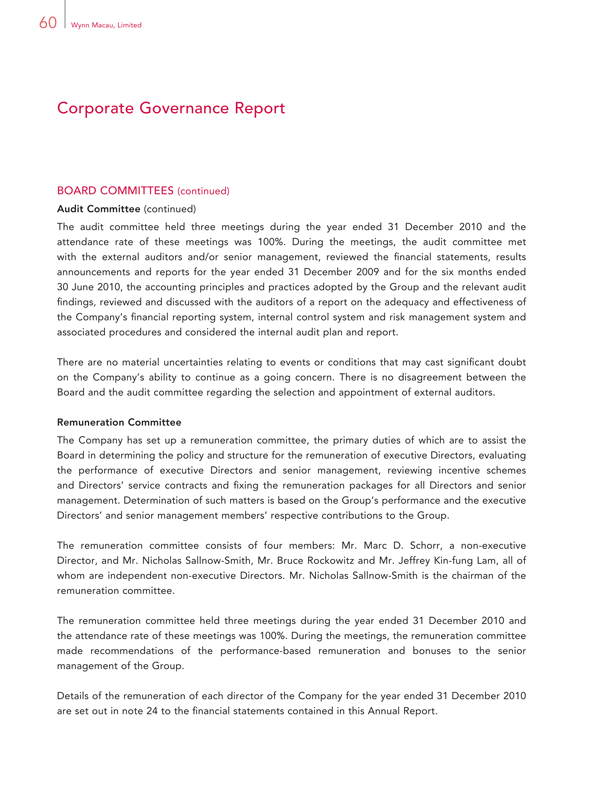
60 Wynn Macau, Limited
Corporate Governance Report
BOARD COMMITTEES (continued)
Audit Committee (continued)
The audit committee held three meetings during the year ended 31 December 2010 and the attendance rate of these meetings was 100%. During the meetings, the audit committee met with the external auditors and/or senior management, reviewed the financial statements, results announcements and reports for the year ended 31 December 2009 and for the six months ended 30 June 2010, the accounting principles and practices adopted by the Group and the relevant audit findings, reviewed and discussed with the auditors of a report on the adequacy and effectiveness of the Company’s financial reporting system, internal control system and risk management system and associated procedures and considered the internal audit plan and report.
There are no material uncertainties relating to events or conditions that may cast significant doubt on the Company’s ability to continue as a going concern. There is no disagreement between the Board and the audit committee regarding the selection and appointment of external auditors.
Remuneration Committee
The Company has set up a remuneration committee, the primary duties of which are to assist the Board in determining the policy and structure for the remuneration of executive Directors, evaluating the performance of executive Directors and senior management, reviewing incentive schemes and Directors’ service contracts and fixing the remuneration packages for all Directors and senior management. Determination of such matters is based on the Group’s performance and the executive Directors’ and senior management members’ respective contributions to the Group.
The remuneration committee consists of four members: Mr. Marc D. Schorr, a non-executive Director, and Mr. Nicholas Sallnow-Smith, Mr. Bruce Rockowitz and Mr. Jeffrey Kin-fung Lam, all of whom are independent non-executive Directors. Mr. Nicholas Sallnow-Smith is the chairman of the remuneration committee.
The remuneration committee held three meetings during the year ended 31 December 2010 and the attendance rate of these meetings was 100%. During the meetings, the remuneration committee made recommendations of the performance-based remuneration and bonuses to the senior management of the Group.
Details of the remuneration of each director of the Company for the year ended 31 December 2010 are set out in note 24 to the financial statements contained in this Annual Report.
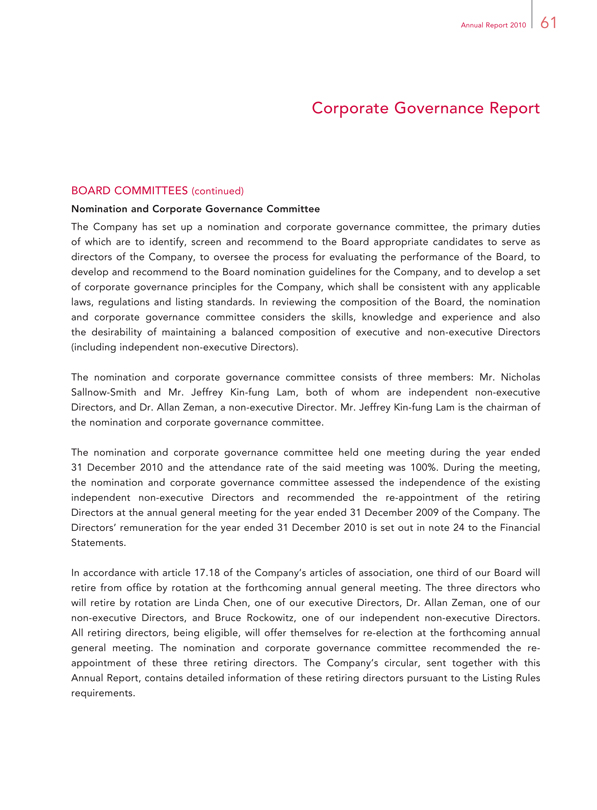
Annual Report 2010 61
Corporate Governance Report
BOARD COMMITTEES (continued)
Nomination and Corporate Governance Committee
The Company has set up a nomination and corporate governance committee, the primary duties of which are to identify, screen and recommend to the Board appropriate candidates to serve as directors of the Company, to oversee the process for evaluating the performance of the Board, to develop and recommend to the Board nomination guidelines for the Company, and to develop a set of corporate governance principles for the Company, which shall be consistent with any applicable laws, regulations and listing standards. In reviewing the composition of the Board, the nomination and corporate governance committee considers the skills, knowledge and experience and also the desirability of maintaining a balanced composition of executive and non-executive Directors (including independent non-executive Directors).
The nomination and corporate governance committee consists of three members: Mr. Nicholas Sallnow-Smith and Mr. Jeffrey Kin-fung Lam, both of whom are independent non-executive Directors, and Dr. Allan Zeman, a non-executive Director. Mr. Jeffrey Kin-fung Lam is the chairman of the nomination and corporate governance committee.
The nomination and corporate governance committee held one meeting during the year ended
31 December 2010 and the attendance rate of the said meeting was 100%. During the meeting, the nomination and corporate governance committee assessed the independence of the existing independent non-executive Directors and recommended the re-appointment of the retiring Directors at the annual general meeting for the year ended 31 December 2009 of the Company. The Directors’ remuneration for the year ended 31 December 2010 is set out in note 24 to the Financial Statements.
In accordance with article 17.18 of the Company’s articles of association, one third of our Board will retire from office by rotation at the forthcoming annual general meeting. The three directors who will retire by rotation are Linda Chen, one of our executive Directors, Dr. Allan Zeman, one of our non-executive Directors, and Bruce Rockowitz, one of our independent non-executive Directors. All retiring directors, being eligible, will offer themselves for re-election at the forthcoming annual general meeting. The nomination and corporate governance committee recommended the reappointment of these three retiring directors. The Company’s circular, sent together with this Annual Report, contains detailed information of these retiring directors pursuant to the Listing Rules requirements.
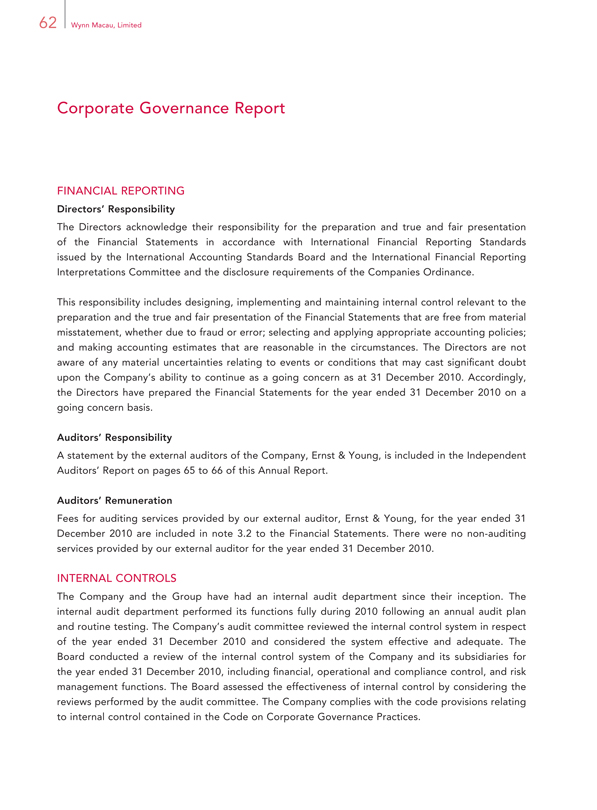
62 Wynn Macau, Limited
Corporate Governance Report
FINANCIAL REPORTING
Directors’ Responsibility
The Directors acknowledge their responsibility for the preparation and true and fair presentation of the Financial Statements in accordance with International Financial Reporting Standards issued by the International Accounting Standards Board and the International Financial Reporting Interpretations Committee and the disclosure requirements of the Companies Ordinance.
This responsibility includes designing, implementing and maintaining internal control relevant to the preparation and the true and fair presentation of the Financial Statements that are free from material misstatement, whether due to fraud or error; selecting and applying appropriate accounting policies; and making accounting estimates that are reasonable in the circumstances. The Directors are not aware of any material uncertainties relating to events or conditions that may cast significant doubt upon the Company’s ability to continue as a going concern as at 31 December 2010. Accordingly, the Directors have prepared the Financial Statements for the year ended 31 December 2010 on a going concern basis.
Auditors’ Responsibility
A statement by the external auditors of the Company, Ernst & Young, is included in the Independent Auditors’ Report on pages 65 to 66 of this Annual Report.
Auditors’ Remuneration
Fees for auditing services provided by our external auditor, Ernst & Young, for the year ended 31 December 2010 are included in note 3.2 to the Financial Statements. There were no non-auditing services provided by our external auditor for the year ended 31 December 2010.
INTERNAL CONTROLS
The Company and the Group have had an internal audit department since their inception. The internal audit department performed its functions fully during 2010 following an annual audit plan and routine testing. The Company’s audit committee reviewed the internal control system in respect of the year ended 31 December 2010 and considered the system effective and adequate. The Board conducted a review of the internal control system of the Company and its subsidiaries for the year ended 31 December 2010, including financial, operational and compliance control, and risk management functions. The Board assessed the effectiveness of internal control by considering the reviews performed by the audit committee. The Company complies with the code provisions relating to internal control contained in the Code on Corporate Governance Practices.
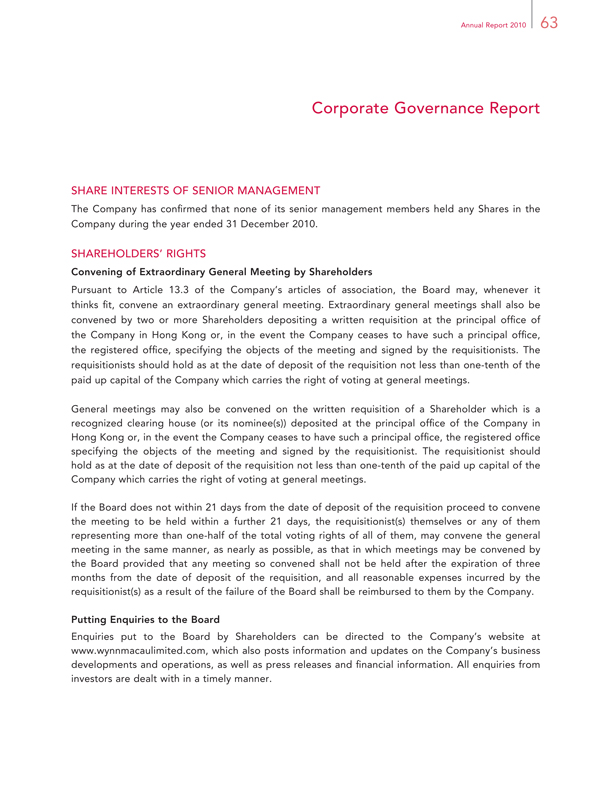
Annual Report 2010 63
Corporate Governance Report
SHARE INTERESTS OF SENIOR MANAGEMENT
The Company has confirmed that none of its senior management members held any Shares in the Company during the year ended 31 December 2010.
SHAREHOLDERS’ RIGHTS
Convening of Extraordinary General Meeting by Shareholders
Pursuant to Article 13.3 of the Company’s articles of association, the Board may, whenever it thinks fit, convene an extraordinary general meeting. Extraordinary general meetings shall also be convened by two or more Shareholders depositing a written requisition at the principal office of the Company in Hong Kong or, in the event the Company ceases to have such a principal office, the registered office, specifying the objects of the meeting and signed by the requisitionists. The requisitionists should hold as at the date of deposit of the requisition not less than one-tenth of the paid up capital of the Company which carries the right of voting at general meetings.
General meetings may also be convened on the written requisition of a Shareholder which is a recognized clearing house (or its nominee(s)) deposited at the principal office of the Company in Hong Kong or, in the event the Company ceases to have such a principal office, the registered office specifying the objects of the meeting and signed by the requisitionist. The requisitionist should hold as at the date of deposit of the requisition not less than one-tenth of the paid up capital of the Company which carries the right of voting at general meetings.
If the Board does not within 21 days from the date of deposit of the requisition proceed to convene the meeting to be held within a further 21 days, the requisitionist(s) themselves or any of them representing more than one-half of the total voting rights of all of them, may convene the general meeting in the same manner, as nearly as possible, as that in which meetings may be convened by the Board provided that any meeting so convened shall not be held after the expiration of three months from the date of deposit of the requisition, and all reasonable expenses incurred by the requisitionist(s) as a result of the failure of the Board shall be reimbursed to them by the Company.
Putting Enquiries to the Board
Enquiries put to the Board by Shareholders can be directed to the Company’s website at www.wynnmacaulimited.com, which also posts information and updates on the Company’s business developments and operations, as well as press releases and financial information. All enquiries from investors are dealt with in a timely manner.
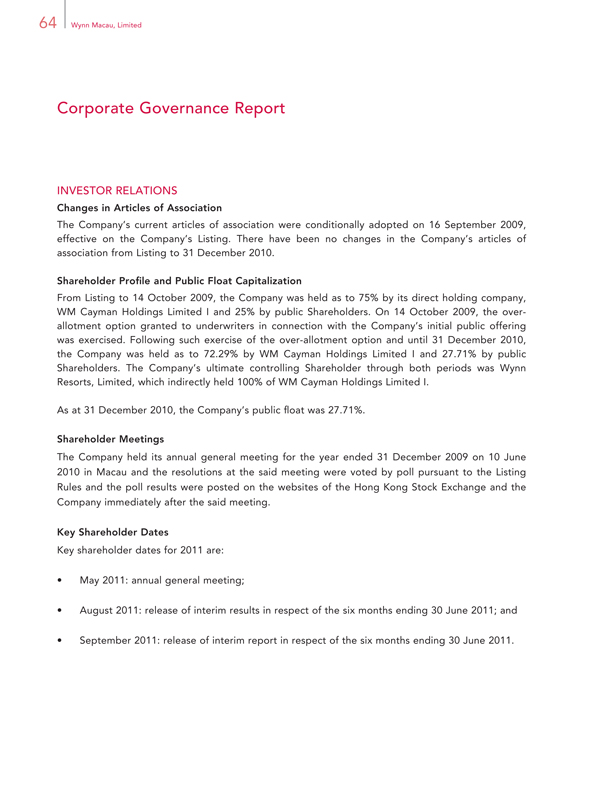
64 Wynn Macau, Limited
Corporate Governance Report
INVESTOR RELATIONS
Changes in Articles of Association
The Company’s current articles of association were conditionally adopted on 16 September 2009, effective on the Company’s Listing. There have been no changes in the Company’s articles of association from Listing to 31 December 2010.
Shareholder Profile and Public Float Capitalization
From Listing to 14 October 2009, the Company was held as to 75% by its direct holding company, WM Cayman Holdings Limited I and 25% by public Shareholders. On 14 October 2009, the over-allotment option granted to underwriters in connection with the Company’s initial public offering was exercised. Following such exercise of the over-allotment option and until 31 December 2010, the Company was held as to 72.29% by WM Cayman Holdings Limited I and 27.71% by public Shareholders. The Company’s ultimate controlling Shareholder through both periods was Wynn Resorts, Limited, which indirectly held 100% of WM Cayman Holdings Limited I.
As at 31 December 2010, the Company’s public fl oat was 27.71%.
Shareholder Meetings
The Company held its annual general meeting for the year ended 31 December 2009 on 10 June 2010 in Macau and the resolutions at the said meeting were voted by poll pursuant to the Listing Rules and the poll results were posted on the websites of the Hong Kong Stock Exchange and the Company immediately after the said meeting.
Key Shareholder Dates
Key shareholder dates for 2011 are:
May 2011: annual general meeting;
August 2011: release of interim results in respect of the six months ending 30 June 2011; and
September 2011: release of interim report in respect of the six months ending 30 June 2011.
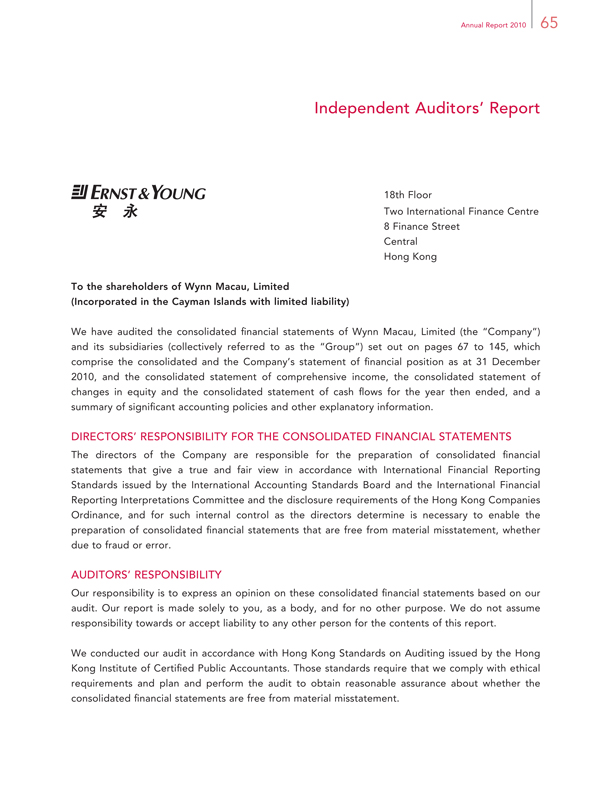
Annual Report 2010 65
Independent Auditors’ Report
18th Floor
Two International Finance Centre
Central
Hong Kong
To the shareholders of Wynn Macau, Limited
(Incorporated in the Cayman Islands with limited liability)
We have audited the consolidated financial statements of Wynn Macau, Limited (the “Company”) and its subsidiaries (collectively referred to as the “Group”) set out on pages 67 to 145, which comprise the consolidated and the Company’s statement of financial position as at 31 December 2010, and the consolidated statement of comprehensive income, the consolidated statement of changes in equity and the consolidated statement of cash flows for the year then ended, and a summary of significant accounting policies and other explanatory information.
DIRECTORS’ RESPONSIBILITY FOR THE CONSOLIDATED FINANCIAL STATEMENTS
The directors of the Company are responsible for the preparation of consolidated financial statements that give a true and fair view in accordance with International Financial Reporting Standards issued by the International Accounting Standards Board and the International Financial Reporting Interpretations Committee and the disclosure requirements of the Hong Kong Companies Ordinance, and for such internal control as the directors determine is necessary to enable the preparation of consolidated financial statements that are free from material misstatement, whether due to fraud or error.
AUDITORS’ RESPONSIBILITY
Our responsibility is to express an opinion on these consolidated financial statements based on our audit. Our report is made solely to you, as a body, and for no other purpose. We do not assume responsibility towards or accept liability to any other person for the contents of this report.
We conducted our audit in accordance with Hong Kong Standards on Auditing issued by the Hong Kong Institute of Certified Public Accountants. Those standards require that we comply with ethical requirements and plan and perform the audit to obtain reasonable assurance about whether the consolidated financial statements are free from material misstatement.
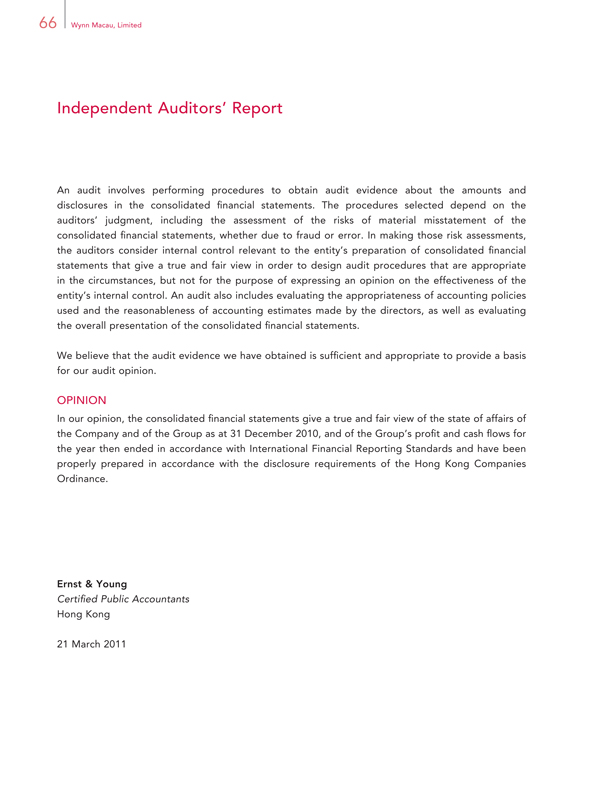
66 Wynn Macau, Limited
Independent Auditors’ Report
An audit involves performing procedures to obtain audit evidence about the amounts and disclosures in the consolidated financial statements. The procedures selected depend on the auditors’ judgment, including the assessment of the risks of material misstatement of the consolidated financial statements, whether due to fraud or error. In making those risk assessments, the auditors consider internal control relevant to the entity’s preparation of consolidated financial statements that give a true and fair view in order to design audit procedures that are appropriate in the circumstances, but not for the purpose of expressing an opinion on the effectiveness of the entity’s internal control. An audit also includes evaluating the appropriateness of accounting policies used and the reasonableness of accounting estimates made by the directors, as well as evaluating the overall presentation of the consolidated financial statements.
We believe that the audit evidence we have obtained is sufficient and appropriate to provide a basis for our audit opinion.
OPINION
In our opinion, the consolidated financial statements give a true and fair view of the state of affairs of the Company and of the Group as at 31 December 2010, and of the Group’s profit and cash flows for the year then ended in accordance with International Financial Reporting Standards and have been properly prepared in accordance with the disclosure requirements of the Hong Kong Companies Ordinance.
Ernst & Young
Certified Public Accountants
Hong Kong
21 March 2011
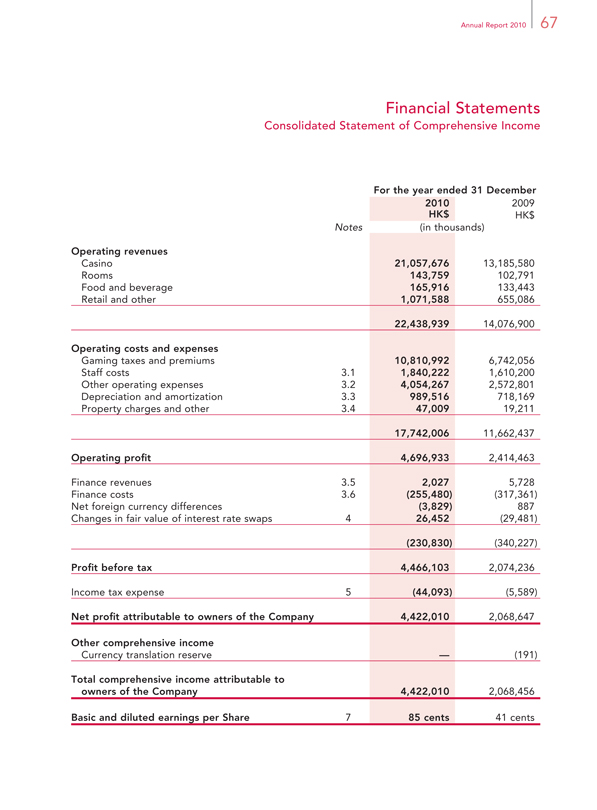
Annual Report 2010 67
Financial Statements
Consolidated Statement of Comprehensive Income
For the year ended 31 December
2010 2009
HK$ HK$
Notes (in thousands)
Operating revenues
Casino 21,057,676 13,185,580
Rooms 143,759 102,791
Food and beverage 165,916 133,443
Retail and other 1,071,588 655,086
22,438,939 14,076,900
Operating costs and expenses
Gaming taxes and premiums 10,810,992 6,742,056
Staff costs 3.1 1,840,222 1,610,200
Other operating expenses 3.2 4,054,267 2,572,801
Depreciation and amortization 3.3 989,516 718,169
Property charges and other 3.4 47,009 19,211
17,742,006 11,662,437
Operating profit 4,696,933 2,414,463
Finance revenues 3.5 2,027 5,728
Finance costs 3.6 (255,480) (317,361)
Net foreign currency differences (3,829) 887
Changes in fair value of interest rate swaps 4 26,452 (29,481)
(230,830) (340,227)
Profit before tax 4,466,103 2,074,236
Income tax expense 5 (44,093) (5,589)
Net profit attributable to owners of the Company 4,422,010 2,068,647
Other comprehensive income
Currency translation reserve — (191)
Total comprehensive income attributable to
owners of the Company 4,422,010 2,068,456
Basic and diluted earnings per Share 7 85 cents 41 cents
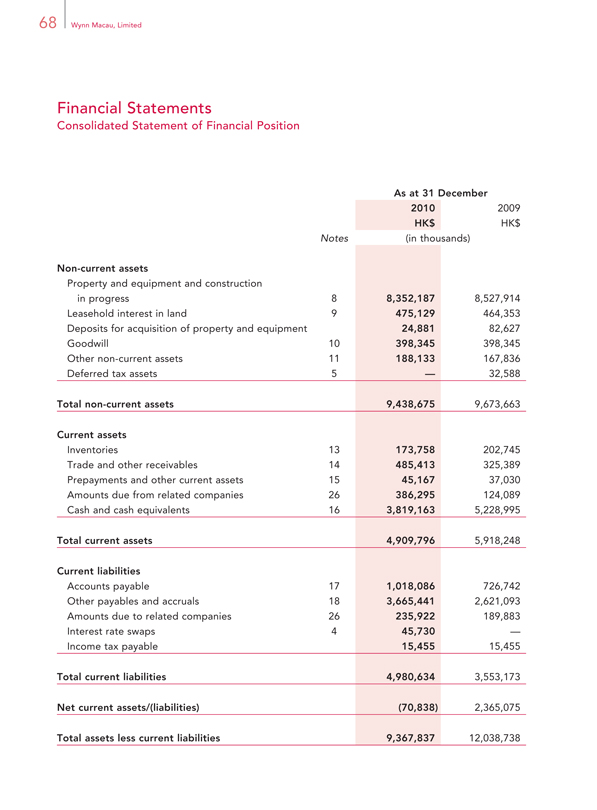
68 Wynn Macau, Limited
Financial Statements
Consolidated Statement of Financial Position
As at 31 December
2010 2009
HK$ HK$
Notes(in thousands)
Non-current assets
Property and equipment and construction
in progress 8 8,352,187 8,527,914
Leasehold interest in land 9 475,129 464,353
Deposits for acquisition of property and equipment 24,881 82,627
Goodwill 10 398,345 398,345
Other non-current assets 11 188,133 167,836
Deferred tax assets 5 — 32,588
Total non-current assets 9,438,675 9,673,663
Current assets
Inventories 13 173,758 202,745
Trade and other receivables 14 485,413 325,389
Prepayments and other current assets 15 45,167 37,030
Amounts due from related companies 26 386,295 124,089
Cash and cash equivalents 16 3,819,163 5,228,995
Total current assets 4,909,796 5,918,248
Current liabilities
Accounts payable 17 1,018,086 726,742
Other payables and accruals 18 3,665,441 2,621,093
Amounts due to related companies 26 235,922 189,883
Interest rate swaps 4 45,730 —
Income tax payable 15,455 15,455
Total current liabilities 4,980,634 3,553,173
Net current assets/(liabilities)(70,838) 2,365,075
Total assets less current liabilities
9,367,837
12,038,738
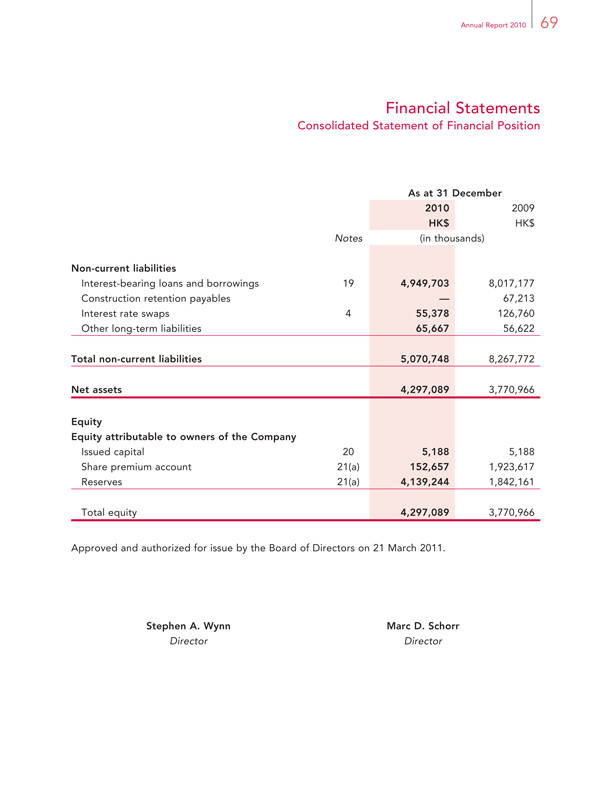
Annual Report 2010 69
Financial Statements
Consolidated Statement of Financial Position
As at 31 December
2010 2009
HK$ HK$
Notes (in thousands)
Non-current liabilities
Interest-bearing loans and borrowings 19 4,949,703 8,017,177
Construction retention payables — 67,213
Interest rate swaps 4 55,378 126,760
Other long-term liabilities 65,667 56,622
Total non-current liabilities 5,070,748 8,267,772
Net assets 4,297,089 3,770,966
Equity
Equity attributable to owners of the Company
Issued capital 20 5,188 5,188
Share premium account 21(a) 152,657 1,923,617
Reserves 21(a) 4,139,244 1,842,161
Total equity 4,297,089 3,770,966
Approved and authorized for issue by the Board of Directors on 21 March 2011.
Stephen A. Wynn Marc D. Schorr
Director Director
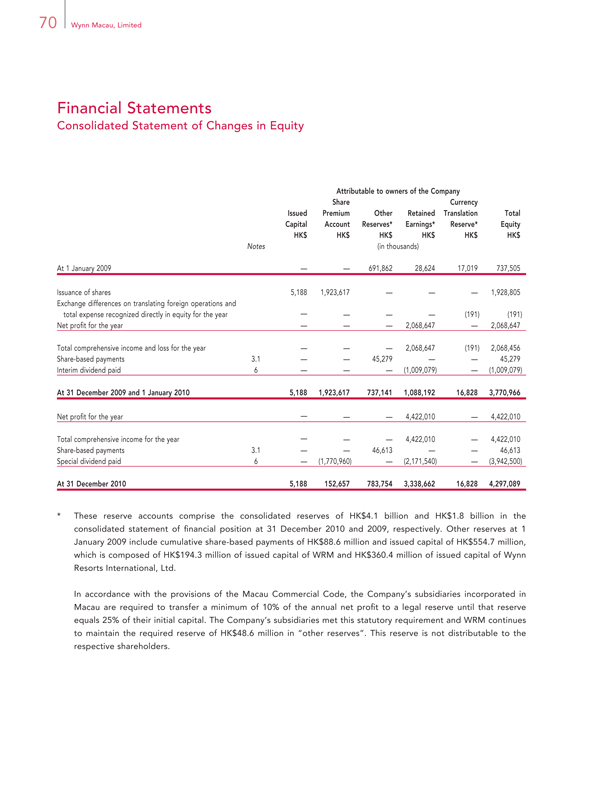
70 Wynn Macau, Limited
Financial Statements
Consolidated Statement of Changes in Equity
Attributable to owners of the Company
Share Currency
Issued Premium Other Retained Translation Total
Capital Account Reserves* Earnings* Reserve* Equity
HK$ HK$ HK$ HK$ HK$ HK$
Notes(in thousands)
At 1 January 2009 — — 691,862 28,624 17,019 737,505
Issuance of shares 5,188 1,923,617 — — — 1,928,805
Exchange differences on translating foreign operations and
total expense recognized directly in equity for the year — — — —(191)(191)
Net profit for the year — — — 2,068,647 — 2,068,647
Total comprehensive income and loss for the year — — — 2,068,647(191) 2,068,456
Share-based payments 3.1 — — 45,279 — — 45,279
Interim dividend paid 6 — — —(1,009,079) —(1,009,079)
At 31 December 2009 and 1 January 2010 5,188 1,923,617 737,141 1,088,192 16,828 3,770,966
Net profit for the year — — — 4,422,010 — 4,422,010
Total comprehensive income for the year — — — 4,422,010 — 4,422,010
Share-based payments 3.1 — — 46,613 — — 46,613
Special dividend paid 6 —(1,770,960) —(2,171,540) —(3,942,500)
At 31 December 2010 5,188 152,657 783,754 3,338,662 16,828 4,297,089
These reserve accounts comprise the consolidated reserves of HK$4.1 billion and HK$1.8 billion in the consolidated statement of financial position at 31 December 2010 and 2009, respectively. Other reserves at 1 January 2009 include cumulative share-based payments of HK$88.6 million and issued capital of HK$554.7 million, which is composed of HK$194.3 million of issued capital of WRM and HK$360.4 million of issued capital of Wynn Resorts International, Ltd.
In accordance with the provisions of the Macau Commercial Code, the Company’s subsidiaries incorporated in Macau are required to transfer a minimum of 10% of the annual net profit to a legal reserve until that reserve equals 25% of their initial capital. The Company’s subsidiaries met this statutory requirement and WRM continues to maintain the required reserve of HK$48.6 million in “other reserves”. This reserve is not distributable to the respective shareholders.
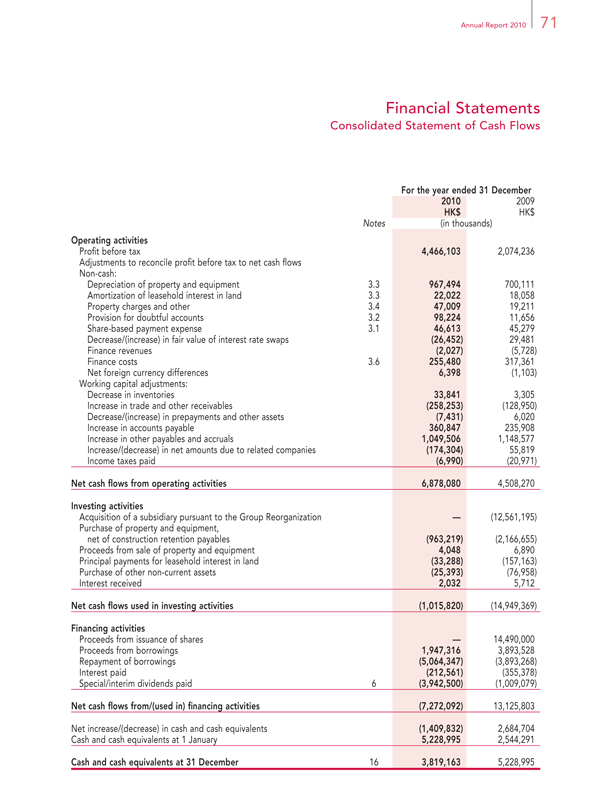
Annual Report 2010 71
Financial Statements
Consolidated Statement of Cash Flows
For the year ended 31 December
2010 2009
HK$ HK$
Notes(in thousands)
Operating activities
Profit before tax 4,466,103 2,074,236
Adjustments to reconcile profit before tax to net cash flows
Non-cash:
Depreciation of property and equipment 3.3 967,494 700,111
Amortization of leasehold interest in land 3.3 22,022 18,058
Property charges and other 3.4 47,009 19,211
Provision for doubtful accounts 3.2 98,224 11,656
Share-based payment expense 3.1 46,613 45,279
Decrease/(increase) in fair value of interest rate swaps(26,452) 29,481
Finance revenues(2,027)(5,728)
Finance costs 3.6 255,480 317,361
Net foreign currency differences 6,398(1,103)
Working capital adjustments:
Decrease in inventories 33,841 3,305
Increase in trade and other receivables(258,253)(128,950)
Decrease/(increase) in prepayments and other assets(7,431) 6,020
Increase in accounts payable 360,847 235,908
Increase in other payables and accruals 1,049,506 1,148,577
Increase/(decrease) in net amounts due to related companies(174,304) 55,819
Income taxes paid(6,990)(20,971)
Net cash flows from operating activities 6,878,080 4,508,270
Investing activities
Acquisition of a subsidiary pursuant to the Group Reorganization —(12,561,195)
Purchase of property and equipment,
net of construction retention payables(963,219)(2,166,655)
Proceeds from sale of property and equipment 4,048 6,890
Principal payments for leasehold interest in land(33,288)(157,163)
Purchase of other non-current assets(25,393)(76,958)
Interest received 2,032 5,712
Net cash flows used in investing activities(1,015,820)(14,949,369)
Financing activities
Proceeds from issuance of shares — 14,490,000
Proceeds from borrowings 1,947,316 3,893,528
Repayment of borrowings(5,064,347)(3,893,268)
Interest paid(212,561)(355,378)
Special/interim dividends paid 6(3,942,500)(1,009,079)
Net cash flows from/(used in) financing activities(7,272,092) 13,125,803
Net increase/(decrease) in cash and cash equivalents(1,409,832) 2,684,704
Cash and cash equivalents at 1 January 5,228,995 2,544,291
Cash and cash equivalents at 31 December 16 3,819,163 5,228,995
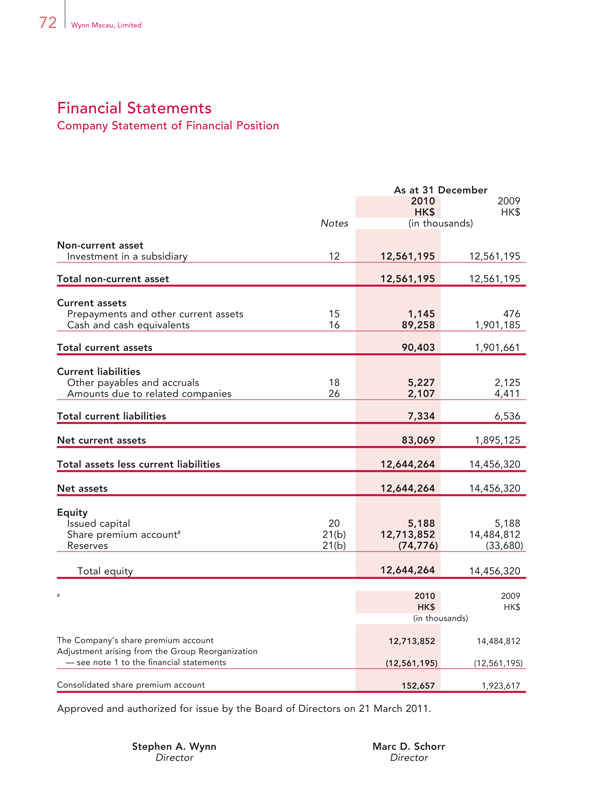
72 Wynn Macau, Limited
Financial Statements
Company Statement of Financial Position
As at 31 December
2010 2009
HK$ HK$
Notes(in thousands)
Non-current asset
Investment in a subsidiary 12 12,561,195 12,561,195
Total non-current asset 12,561,195 12,561,195
Current assets
Prepayments and other current assets 15 1,145 476
Cash and cash equivalents 16 89,258 1,901,185
Total current assets 90,403 1,901,661
Current liabilities
Other payables and accruals 18 5,227 2,125
Amounts due to related companies 26 2,107 4,411
Total current liabilities 7,334 6,536
Net current assets 83,069 1,895,125
Total assets less current liabilities 12,644,264 14,456,320
Net assets 12,644,264 14,456,320
Equity
Issued capital 20 5,188 5,188
Share premium account# 21(b) 12,713,852 14,484,812
Reserves 21(b)(74,776)(33,680)
Total equity 12,644,264 14,456,320
# 2010 2009
HK$ HK$
(in thousands)
The Company’s share premium account 12,713,852 14,484,812
Adjustment arising from the Group Reorganization
— see note 1 to the financial statements(12,561,195)(12,561,195)
Consolidated share premium account 152,657 1,923,617
Approved and authorized for issue by the Board of Directors on 21 March 2011.
Stephen A. Wynn Marc D. Schorr
Director Director
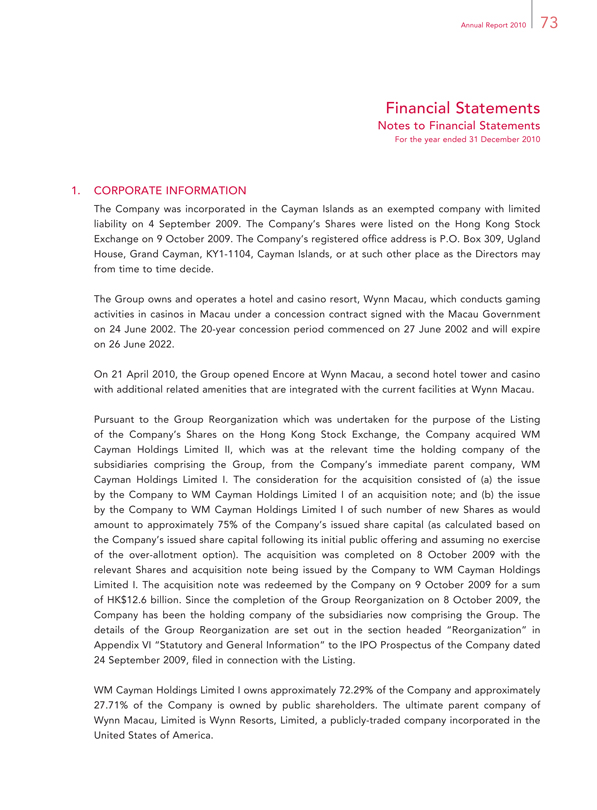
Annual Report 2010 73
Financial Statements
Notes to Financial Statements
For the year ended 31 December 2010
CORPORATE INFORMATION
The Company was incorporated in the Cayman Islands as an exempted company with limited liability on 4 September 2009. The Company’s Shares were listed on the Hong Kong Stock Exchange on 9 October 2009. The Company’s registered office address is P.O. Box 309, Ugland House, Grand Cayman, KY1-1104, Cayman Islands, or at such other place as the Directors may from time to time decide.
The Group owns and operates a hotel and casino resort, Wynn Macau, which conducts gaming activities in casinos in Macau under a concession contract signed with the Macau Government on 24 June 2002. The 20-year concession period commenced on 27 June 2002 and will expire on 26 June 2022.
On 21 April 2010, the Group opened Encore at Wynn Macau, a second hotel tower and casino with additional related amenities that are integrated with the current facilities at Wynn Macau.
Pursuant to the Group Reorganization which was undertaken for the purpose of the Listing of the Company’s Shares on the Hong Kong Stock Exchange, the Company acquired WM
Cayman Holdings Limited II, which was at the relevant time the holding company of the subsidiaries comprising the Group, from the Company’s immediate parent company, WM
Cayman Holdings Limited I. The consideration for the acquisition consisted of (a) the issue by the Company to WM Cayman Holdings Limited I of an acquisition note; and (b) the issue by the Company to WM Cayman Holdings Limited I of such number of new Shares as would amount to approximately 75% of the Company’s issued share capital (as calculated based on the Company’s issued share capital following its initial public offering and assuming no exercise of the over-allotment option). The acquisition was completed on 8 October 2009 with the relevant Shares and acquisition note being issued by the Company to WM Cayman Holdings Limited I. The acquisition note was redeemed by the Company on 9 October 2009 for a sum of HK$12.6 billion. Since the completion of the Group Reorganization on 8 October 2009, the Company has been the holding company of the subsidiaries now comprising the Group. The details of the Group Reorganization are set out in the section headed “Reorganization” in Appendix VI “Statutory and General Information” to the IPO Prospectus of the Company dated 24 September 2009, filed in connection with the Listing.
WM Cayman Holdings Limited I owns approximately 72.29% of the Company and approximately 27.71% of the Company is owned by public shareholders. The ultimate parent company of Wynn Macau, Limited is Wynn Resorts, Limited, a publicly-traded company incorporated in the United States of America.
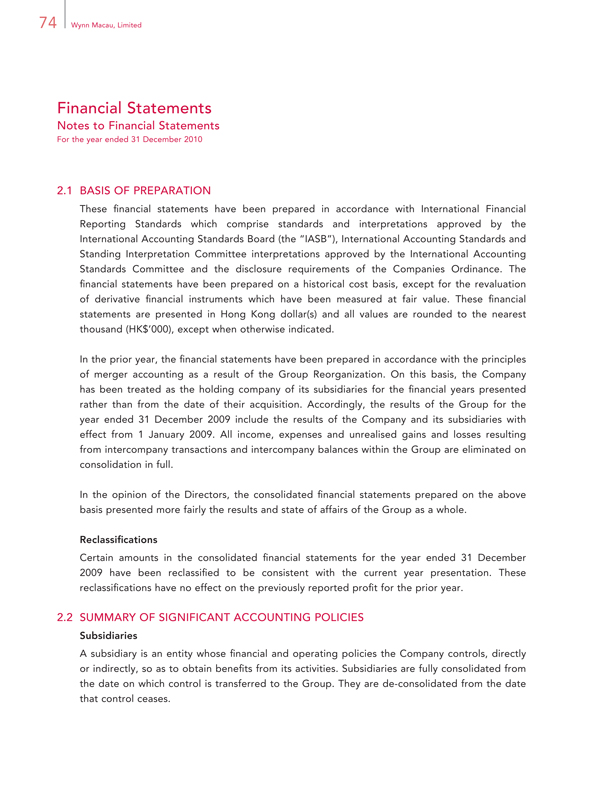
74 Wynn Macau, Limited
Financial Statements
Notes to Financial Statements
For the year ended 31 December 2010
BASIS OF PREPARATION
These financial statements have been prepared in accordance with International Financial Reporting Standards which comprise standards and interpretations approved by the International Accounting Standards Board (the “IASB”), International Accounting Standards and Standing Interpretation Committee interpretations approved by the International Accounting Standards Committee and the disclosure requirements of the Companies Ordinance. The financial statements have been prepared on a historical cost basis, except for the revaluation of derivative financial instruments which have been measured at fair value. These financial statements are presented in Hong Kong dollar(s) and all values are rounded to the nearest thousand (HK$’000), except when otherwise indicated.
In the prior year, the financial statements have been prepared in accordance with the principles of merger accounting as a result of the Group Reorganization. On this basis, the Company has been treated as the holding company of its subsidiaries for the financial years presented rather than from the date of their acquisition. Accordingly, the results of the Group for the year ended 31 December 2009 include the results of the Company and its subsidiaries with effect from 1 January 2009. All income, expenses and unrealised gains and losses resulting from intercompany transactions and intercompany balances within the Group are eliminated on consolidation in full.
In the opinion of the Directors, the consolidated financial statements prepared on the above basis presented more fairly the results and state of affairs of the Group as a whole.
Reclassifications
Certain amounts in the consolidated financial statements for the year ended 31 December 2009 have been reclassified to be consistent with the current year presentation. These reclassifications have no effect on the previously reported profit for the prior year.
SUMMARY OF SIGNIFICANT ACCOUNTING POLICIES
Subsidiaries
A subsidiary is an entity whose financial and operating policies the Company controls, directly or indirectly, so as to obtain benefits from its activities. Subsidiaries are fully consolidated from the date on which control is transferred to the Group. They are de-consolidated from the date that control ceases.
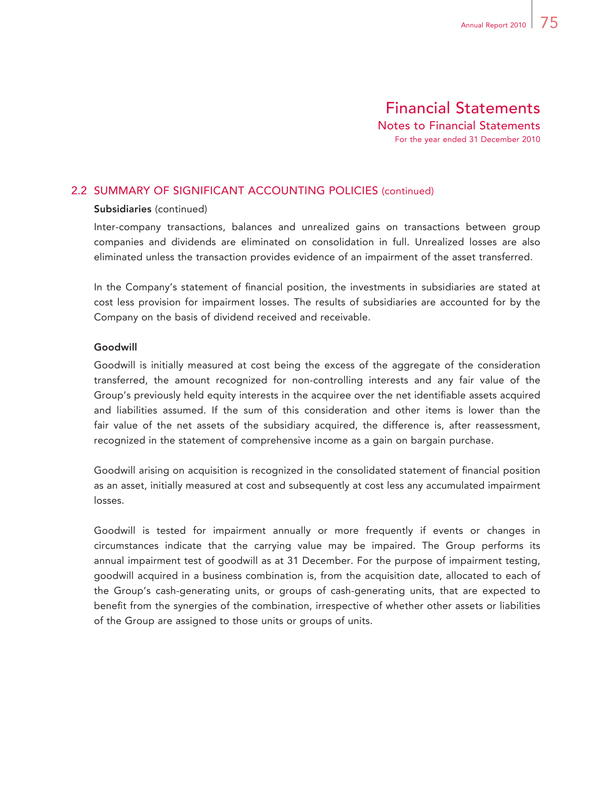
Annual Report 2010 75
Financial Statements
Notes to Financial Statements
For the year ended 31 December 2010
SUMMARY OF SIGNIFICANT ACCOUNTING POLICIES (continued)
Subsidiaries (continued)
Inter-company transactions, balances and unrealized gains on transactions between group companies and dividends are eliminated on consolidation in full. Unrealized losses are also eliminated unless the transaction provides evidence of an impairment of the asset transferred.
In the Company’s statement of financial position, the investments in subsidiaries are stated at cost less provision for impairment losses. The results of subsidiaries are accounted for by the Company on the basis of dividend received and receivable.
Goodwill
Goodwill is initially measured at cost being the excess of the aggregate of the consideration transferred, the amount recognized for non-controlling interests and any fair value of the Group’s previously held equity interests in the acquiree over the net identifiable assets acquired and liabilities assumed. If the sum of this consideration and other items is lower than the fair value of the net assets of the subsidiary acquired, the difference is, after reassessment, recognized in the statement of comprehensive income as a gain on bargain purchase.
Goodwill arising on acquisition is recognized in the consolidated statement of financial position as an asset, initially measured at cost and subsequently at cost less any accumulated impairment losses.
Goodwill is tested for impairment annually or more frequently if events or changes in circumstances indicate that the carrying value may be impaired. The Group performs its annual impairment test of goodwill as at 31 December. For the purpose of impairment testing, goodwill acquired in a business combination is, from the acquisition date, allocated to each of the Group’s cash-generating units, or groups of cash-generating units, that are expected to benefit from the synergies of the combination, irrespective of whether other assets or liabilities of the Group are assigned to those units or groups of units.
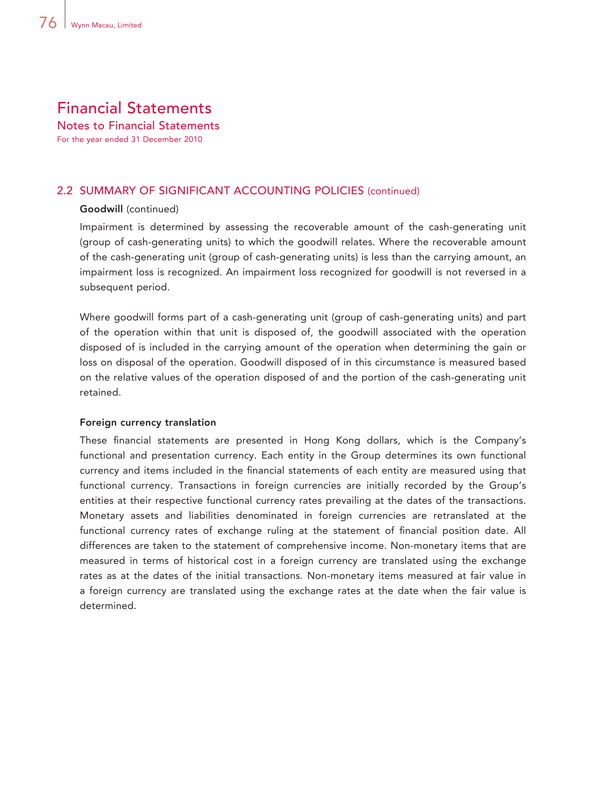
76 Wynn Macau, Limited
Financial Statements
Notes to Financial Statements
For the year ended 31 December 2010
SUMMARY OF SIGNIFICANT ACCOUNTING POLICIES (continued)
Goodwill (continued)
Impairment is determined by assessing the recoverable amount of the cash-generating unit (group of cash-generating units) to which the goodwill relates. Where the recoverable amount of the cash-generating unit (group of cash-generating units) is less than the carrying amount, an impairment loss is recognized. An impairment loss recognized for goodwill is not reversed in a subsequent period.
Where goodwill forms part of a cash-generating unit (group of cash-generating units) and part of the operation within that unit is disposed of, the goodwill associated with the operation disposed of is included in the carrying amount of the operation when determining the gain or loss on disposal of the operation. Goodwill disposed of in this circumstance is measured based on the relative values of the operation disposed of and the portion of the cash-generating unit retained.
Foreign currency translation
These financial statements are presented in Hong Kong dollars, which is the Company’s functional and presentation currency. Each entity in the Group determines its own functional currency and items included in the financial statements of each entity are measured using that functional currency. Transactions in foreign currencies are initially recorded by the Group’s entities at their respective functional currency rates prevailing at the dates of the transactions.
Monetary assets and liabilities denominated in foreign currencies are retranslated at the functional currency rates of exchange ruling at the statement of financial position date. All differences are taken to the statement of comprehensive income. Non-monetary items that are measured in terms of historical cost in a foreign currency are translated using the exchange rates as at the dates of the initial transactions. Non-monetary items measured at fair value in a foreign currency are translated using the exchange rates at the date when the fair value is determined.
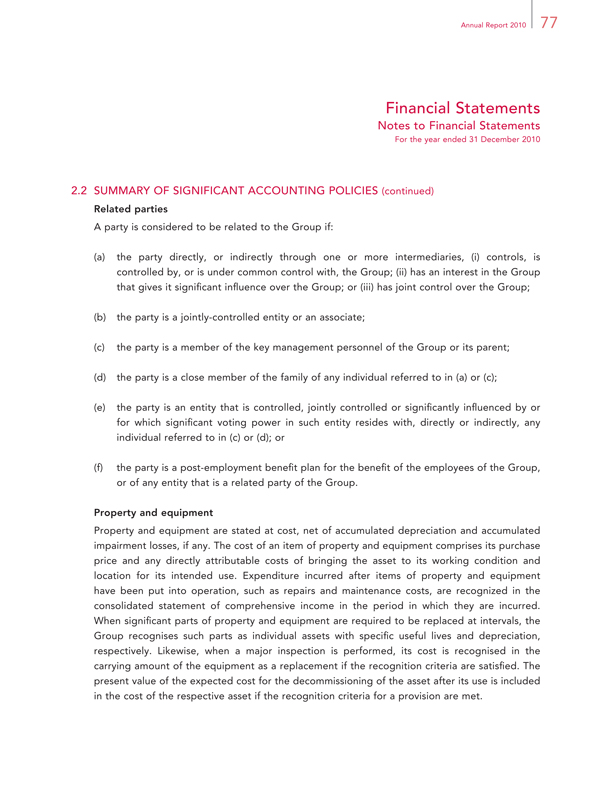
Annual Report 2010 77
Financial Statements
Notes to Financial Statements
For the year ended 31 December 2010
SUMMARY OF SIGNIFICANT ACCOUNTING POLICIES (continued)
Related parties
A party is considered to be related to the Group if:
the party directly, or indirectly through one or more intermediaries, (i) controls, is controlled by, or is under common control with, the Group; (ii) has an interest in the Group that gives it significant influence over the Group; or (iii) has joint control over the Group;
the party is a jointly-controlled entity or an associate;
the party is a member of the key management personnel of the Group or its parent;
the party is a close member of the family of any individual referred to in (a) or (c);
the party is an entity that is controlled, jointly controlled or significantly influenced by or for which significant voting power in such entity resides with, directly or indirectly, any individual referred to in (c) or (d); or
the party is a post-employment benefit plan for the benefit of the employees of the Group, or of any entity that is a related party of the Group.
Property and equipment
Property and equipment are stated at cost, net of accumulated depreciation and accumulated impairment losses, if any. The cost of an item of property and equipment comprises its purchase price and any directly attributable costs of bringing the asset to its working condition and location for its intended use. Expenditure incurred after items of property and equipment have been put into operation, such as repairs and maintenance costs, are recognized in the consolidated statement of comprehensive income in the period in which they are incurred. When significant parts of property and equipment are required to be replaced at intervals, the Group recognises such parts as individual assets with specific useful lives and depreciation, respectively. Likewise, when a major inspection is performed, its cost is recognised in the carrying amount of the equipment as a replacement if the recognition criteria are satisfied. The present value of the expected cost for the decommissioning of the asset after its use is included in the cost of the respective asset if the recognition criteria for a provision are met.
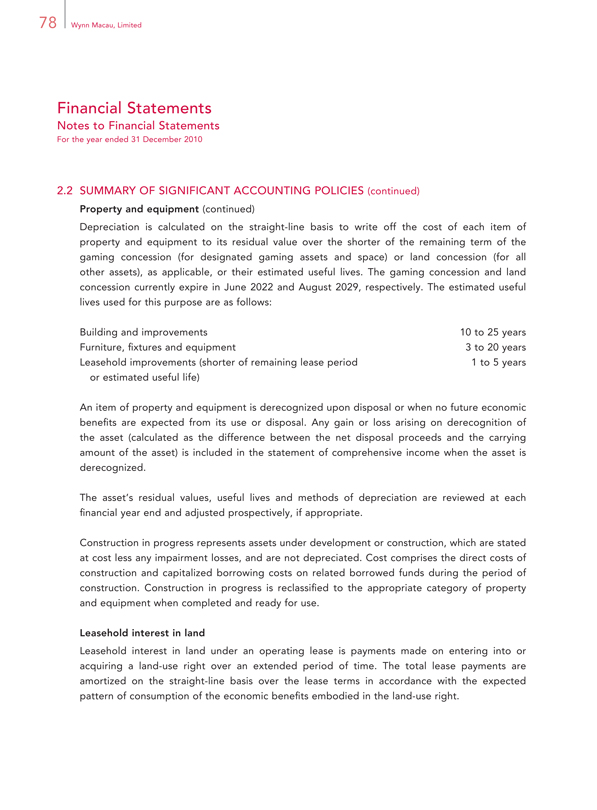
78 Wynn Macau, Limited
Financial Statements
Notes to Financial Statements
For the year ended 31 December 2010
SUMMARY OF SIGNIFICANT ACCOUNTING POLICIES (continued)
Property and equipment (continued)
Depreciation is calculated on the straight-line basis to write off the cost of each item of property and equipment to its residual value over the shorter of the remaining term of the gaming concession (for designated gaming assets and space) or land concession (for all other assets), as applicable, or their estimated useful lives. The gaming concession and land concession currently expire in June 2022 and August 2029, respectively. The estimated useful lives used for this purpose are as follows:
Building and improvements 10 to 25 years
Furniture, fixtures and equipment 3 to 20 years
Leasehold improvements (shorter of remaining lease period 1 to 5 years
or estimated useful life)
An item of property and equipment is derecognized upon disposal or when no future economic benefits are expected from its use or disposal. Any gain or loss arising on derecognition of the asset (calculated as the difference between the net disposal proceeds and the carrying amount of the asset) is included in the statement of comprehensive income when the asset is derecognized.
The asset’s residual values, useful lives and methods of depreciation are reviewed at each financial year end and adjusted prospectively, if appropriate.
Construction in progress represents assets under development or construction, which are stated at cost less any impairment losses, and are not depreciated. Cost comprises the direct costs of construction and capitalized borrowing costs on related borrowed funds during the period of construction. Construction in progress is reclassified to the appropriate category of property and equipment when completed and ready for use.
Leasehold interest in land
Leasehold interest in land under an operating lease is payments made on entering into or acquiring a land-use right over an extended period of time. The total lease payments are amortized on the straight-line basis over the lease terms in accordance with the expected pattern of consumption of the economic benefits embodied in the land-use right.
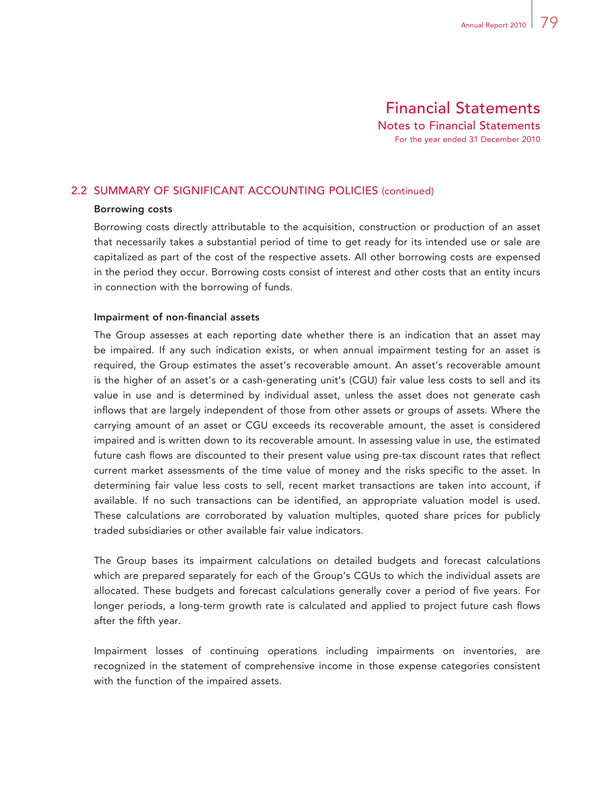
Annual Report 2010 79
Financial Statements
Notes to Financial Statements
For the year ended 31 December 2010
SUMMARY OF SIGNIFICANT ACCOUNTING POLICIES (continued)
Borrowing costs
Borrowing costs directly attributable to the acquisition, construction or production of an asset that necessarily takes a substantial period of time to get ready for its intended use or sale are capitalized as part of the cost of the respective assets. All other borrowing costs are expensed in the period they occur. Borrowing costs consist of interest and other costs that an entity incurs in connection with the borrowing of funds.
Impairment of non-financial assets
The Group assesses at each reporting date whether there is an indication that an asset may be impaired. If any such indication exists, or when annual impairment testing for an asset is required, the Group estimates the asset’s recoverable amount. An asset’s recoverable amount is the higher of an asset’s or a cash-generating unit’s (CGU) fair value less costs to sell and its value in use and is determined by individual asset, unless the asset does not generate cash inflows that are largely independent of those from other assets or groups of assets. Where the carrying amount of an asset or CGU exceeds its recoverable amount, the asset is considered impaired and is written down to its recoverable amount. In assessing value in use, the estimated future cash flows are discounted to their present value using pre-tax discount rates that reflect current market assessments of the time value of money and the risks specific to the asset. In determining fair value less costs to sell, recent market transactions are taken into account, if available. If no such transactions can be identified, an appropriate valuation model is used.
These calculations are corroborated by valuation multiples, quoted share prices for publicly traded subsidiaries or other available fair value indicators.
The Group bases its impairment calculations on detailed budgets and forecast calculations which are prepared separately for each of the Group’s CGUs to which the individual assets are allocated. These budgets and forecast calculations generally cover a period of five years. For longer periods, a long-term growth rate is calculated and applied to project future cash flows after the fifth year.
Impairment losses of continuing operations including impairments on inventories, are recognized in the statement of comprehensive income in those expense categories consistent with the function of the impaired assets.
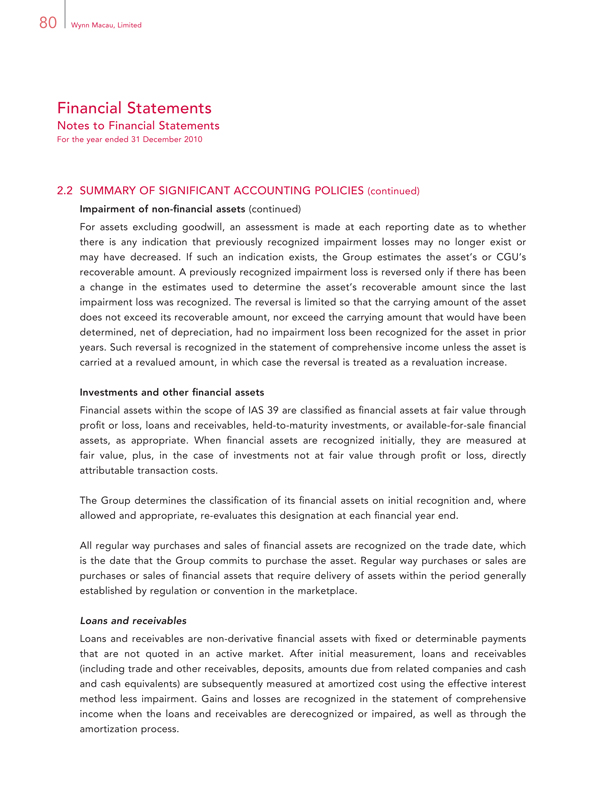
80 Wynn Macau, Limited
Financial Statements
Notes to Financial Statements
For the year ended 31 December 2010
SUMMARY OF SIGNIFICANT ACCOUNTING POLICIES (continued)
Impairment of non-financial assets (continued)
For assets excluding goodwill, an assessment is made at each reporting date as to whether there is any indication that previously recognized impairment losses may no longer exist or may have decreased. If such an indication exists, the Group estimates the asset’s or CGU’s recoverable amount. A previously recognized impairment loss is reversed only if there has been a change in the estimates used to determine the asset’s recoverable amount since the last impairment loss was recognized. The reversal is limited so that the carrying amount of the asset does not exceed its recoverable amount, nor exceed the carrying amount that would have been determined, net of depreciation, had no impairment loss been recognized for the asset in prior years. Such reversal is recognized in the statement of comprehensive income unless the asset is carried at a revalued amount, in which case the reversal is treated as a revaluation increase.
Investments and other financial assets
Financial assets within the scope of IAS 39 are classified as financial assets at fair value through profit or loss, loans and receivables, held-to-maturity investments, or available-for-sale financial assets, as appropriate. When financial assets are recognized initially, they are measured at fair value, plus, in the case of investments not at fair value through profit or loss, directly attributable transaction costs.
The Group determines the classification of its financial assets on initial recognition and, where allowed and appropriate, re-evaluates this designation at each financial year end.
All regular way purchases and sales of financial assets are recognized on the trade date, which is the date that the Group commits to purchase the asset. Regular way purchases or sales are purchases or sales of financial assets that require delivery of assets within the period generally established by regulation or convention in the marketplace.
Loans and receivables
Loans and receivables are non-derivative financial assets with fixed or determinable payments that are not quoted in an active market. After initial measurement, loans and receivables (including trade and other receivables, deposits, amounts due from related companies and cash and cash equivalents) are subsequently measured at amortized cost using the effective interest method less impairment. Gains and losses are recognized in the statement of comprehensive income when the loans and receivables are derecognized or impaired, as well as through the amortization process.
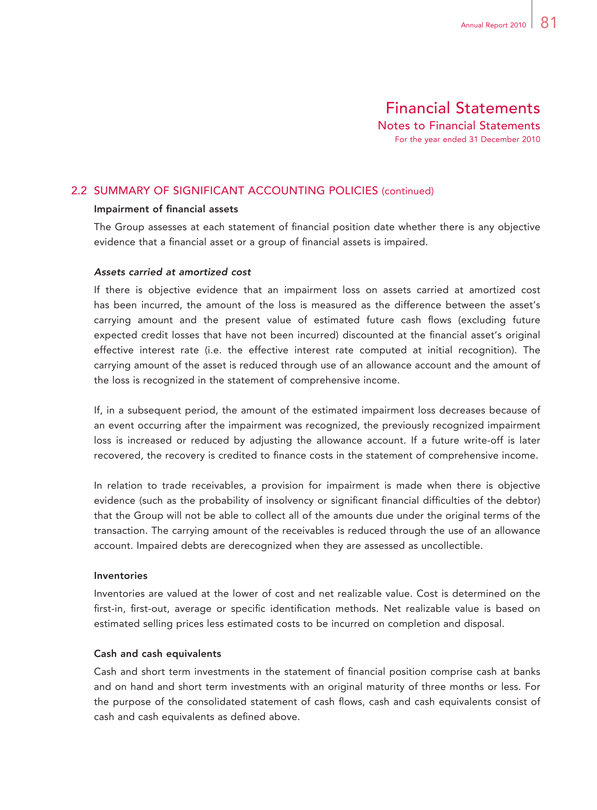
Annual Report 2010 81
Financial Statements
Notes to Financial Statements
For the year ended 31 December 2010
SUMMARY OF SIGNIFICANT ACCOUNTING POLICIES (continued)
Impairment of financial assets
The Group assesses at each statement of financial position date whether there is any objective evidence that a financial asset or a group of financial assets is impaired.
Assets carried at amortized cost
If there is objective evidence that an impairment loss on assets carried at amortized cost has been incurred, the amount of the loss is measured as the difference between the asset’s carrying amount and the present value of estimated future cash flows (excluding future expected credit losses that have not been incurred) discounted at the financial asset’s original effective interest rate (i.e. the effective interest rate computed at initial recognition). The carrying amount of the asset is reduced through use of an allowance account and the amount of the loss is recognized in the statement of comprehensive income.
If, in a subsequent period, the amount of the estimated impairment loss decreases because of an event occurring after the impairment was recognized, the previously recognized impairment loss is increased or reduced by adjusting the allowance account. If a future write-off is later recovered, the recovery is credited to finance costs in the statement of comprehensive income.
In relation to trade receivables, a provision for impairment is made when there is objective evidence (such as the probability of insolvency or significant financial difficulties of the debtor) that the Group will not be able to collect all of the amounts due under the original terms of the transaction. The carrying amount of the receivables is reduced through the use of an allowance account. Impaired debts are derecognized when they are assessed as uncollectible.
Inventories
Inventories are valued at the lower of cost and net realizable value. Cost is determined on the first-in, first-out, average or specific identification methods. Net realizable value is based on estimated selling prices less estimated costs to be incurred on completion and disposal.
Cash and cash equivalents
Cash and short term investments in the statement of financial position comprise cash at banks and on hand and short term investments with an original maturity of three months or less. For the purpose of the consolidated statement of cash flows, cash and cash equivalents consist of cash and cash equivalents as defined above.
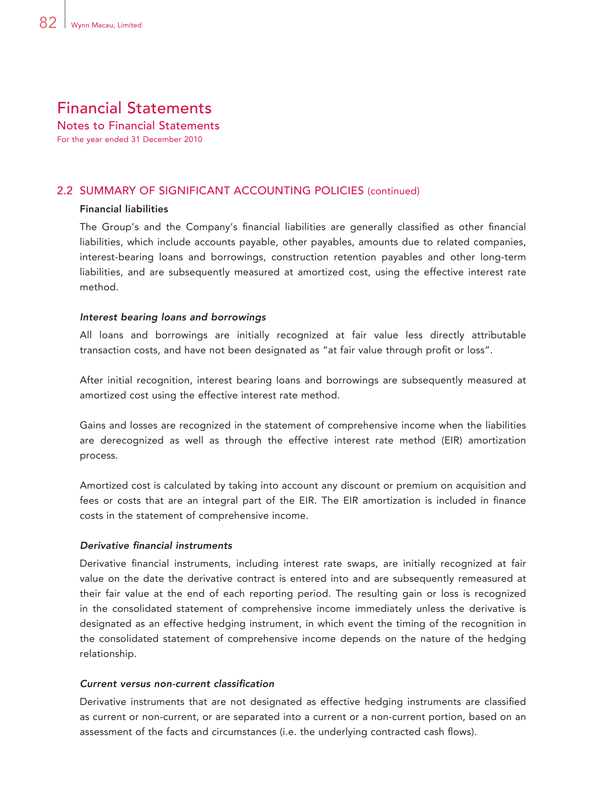
82 Wynn Macau, Limited
Financial Statements
Notes to Financial Statements
For the year ended 31 December 2010
SUMMARY OF SIGNIFICANT ACCOUNTING POLICIES (continued)
Financial liabilities
The Group’s and the Company’s financial liabilities are generally classified as other financial liabilities, which include accounts payable, other payables, amounts due to related companies, interest-bearing loans and borrowings, construction retention payables and other long-term liabilities, and are subsequently measured at amortized cost, using the effective interest rate method.
Interest bearing loans and borrowings
All loans and borrowings are initially recognized at fair value less directly attributable transaction costs, and have not been designated as “at fair value through profit or loss”.
After initial recognition, interest bearing loans and borrowings are subsequently measured at amortized cost using the effective interest rate method.
Gains and losses are recognized in the statement of comprehensive income when the liabilities are derecognized as well as through the effective interest rate method (EIR) amortization process.
Amortized cost is calculated by taking into account any discount or premium on acquisition and fees or costs that are an integral part of the EIR. The EIR amortization is included in finance costs in the statement of comprehensive income.
Derivative financial instruments
Derivative financial instruments, including interest rate swaps, are initially recognized at fair value on the date the derivative contract is entered into and are subsequently remeasured at their fair value at the end of each reporting period. The resulting gain or loss is recognized in the consolidated statement of comprehensive income immediately unless the derivative is designated as an effective hedging instrument, in which event the timing of the recognition in the consolidated statement of comprehensive income depends on the nature of the hedging relationship.
Current versus non-current classification
Derivative instruments that are not designated as effective hedging instruments are classified as current or non-current, or are separated into a current or a non-current portion, based on an assessment of the facts and circumstances (i.e. the underlying contracted cash flows).
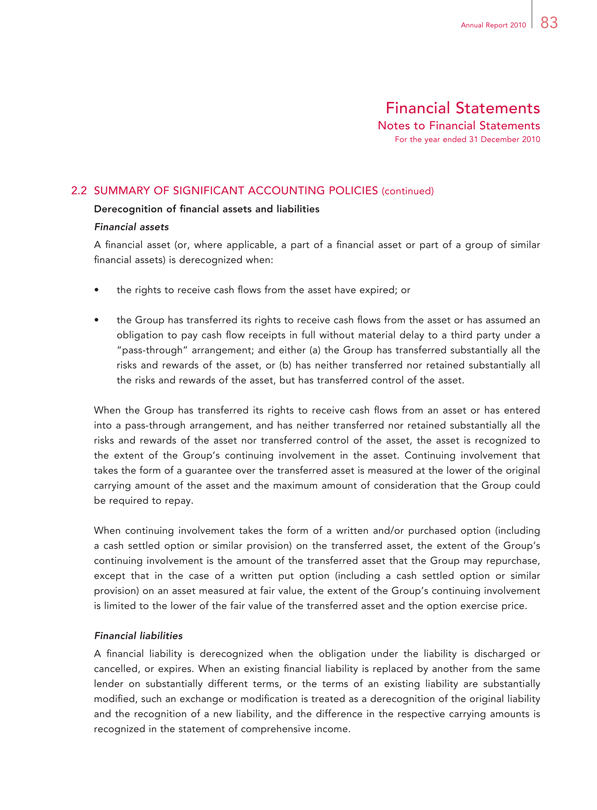
Annual Report 2010 83
Financial Statements
Notes to Financial Statements
For the year ended 31 December 2010
SUMMARY OF SIGNIFICANT ACCOUNTING POLICIES (continued)
Derecognition of financial assets and liabilities
Financial assets
A financial asset (or, where applicable, a part of a financial asset or part of a group of similar financial assets) is derecognized when:
• the rights to receive cash flows from the asset have expired; or
the Group has transferred its rights to receive cash flows from the asset or has assumed an obligation to pay cash flow receipts in full without material delay to a third party under a “pass-through” arrangement; and either (a) the Group has transferred substantially all the risks and rewards of the asset, or (b) has neither transferred nor retained substantially all the risks and rewards of the asset, but has transferred control of the asset.
When the Group has transferred its rights to receive cash flows from an asset or has entered into a pass-through arrangement, and has neither transferred nor retained substantially all the risks and rewards of the asset nor transferred control of the asset, the asset is recognized to the extent of the Group’s continuing involvement in the asset. Continuing involvement that takes the form of a guarantee over the transferred asset is measured at the lower of the original carrying amount of the asset and the maximum amount of consideration that the Group could be required to repay.
When continuing involvement takes the form of a written and/or purchased option (including a cash settled option or similar provision) on the transferred asset, the extent of the Group’s continuing involvement is the amount of the transferred asset that the Group may repurchase, except that in the case of a written put option (including a cash settled option or similar provision) on an asset measured at fair value, the extent of the Group’s continuing involvement is limited to the lower of the fair value of the transferred asset and the option exercise price.
Financial liabilities
A financial liability is derecognized when the obligation under the liability is discharged or cancelled, or expires. When an existing financial liability is replaced by another from the same lender on substantially different terms, or the terms of an existing liability are substantially modified, such an exchange or modification is treated as a derecognition of the original liability and the recognition of a new liability, and the difference in the respective carrying amounts is recognized in the statement of comprehensive income.
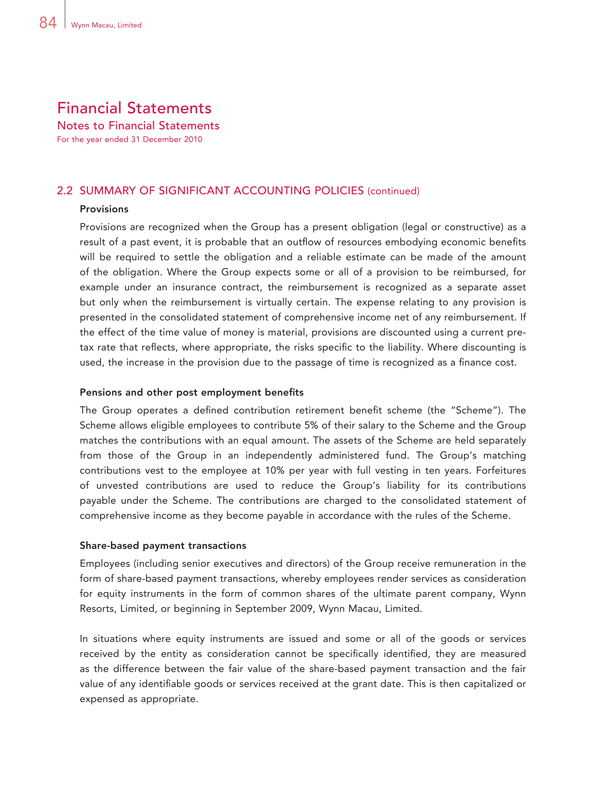
84 Wynn Macau, Limited
Financial Statements
Notes to Financial Statements
For the year ended 31 December 2010
SUMMARY OF SIGNIFICANT ACCOUNTING POLICIES (continued)
Provisions
Provisions are recognized when the Group has a present obligation (legal or constructive) as a result of a past event, it is probable that an outflow of resources embodying economic benefits will be required to settle the obligation and a reliable estimate can be made of the amount of the obligation. Where the Group expects some or all of a provision to be reimbursed, for example under an insurance contract, the reimbursement is recognized as a separate asset but only when the reimbursement is virtually certain. The expense relating to any provision is presented in the consolidated statement of comprehensive income net of any reimbursement. If the effect of the time value of money is material, provisions are discounted using a current pre-tax rate that reflects, where appropriate, the risks specific to the liability. Where discounting is used, the increase in the provision due to the passage of time is recognized as a finance cost.
Pensions and other post employment benefits
The Group operates a defined contribution retirement benefit scheme (the “Scheme”). The Scheme allows eligible employees to contribute 5% of their salary to the Scheme and the Group matches the contributions with an equal amount. The assets of the Scheme are held separately from those of the Group in an independently administered fund. The Group’s matching contributions vest to the employee at 10% per year with full vesting in ten years. Forfeitures of unvested contributions are used to reduce the Group’s liability for its contributions payable under the Scheme. The contributions are charged to the consolidated statement of comprehensive income as they become payable in accordance with the rules of the Scheme.
Share-based payment transactions
Employees (including senior executives and directors) of the Group receive remuneration in the form of share-based payment transactions, whereby employees render services as consideration for equity instruments in the form of common shares of the ultimate parent company, Wynn Resorts, Limited, or beginning in September 2009, Wynn Macau, Limited.
In situations where equity instruments are issued and some or all of the goods or services received by the entity as consideration cannot be specifically identified, they are measured as the difference between the fair value of the share-based payment transaction and the fair value of any identifiable goods or services received at the grant date. This is then capitalized or expensed as appropriate.
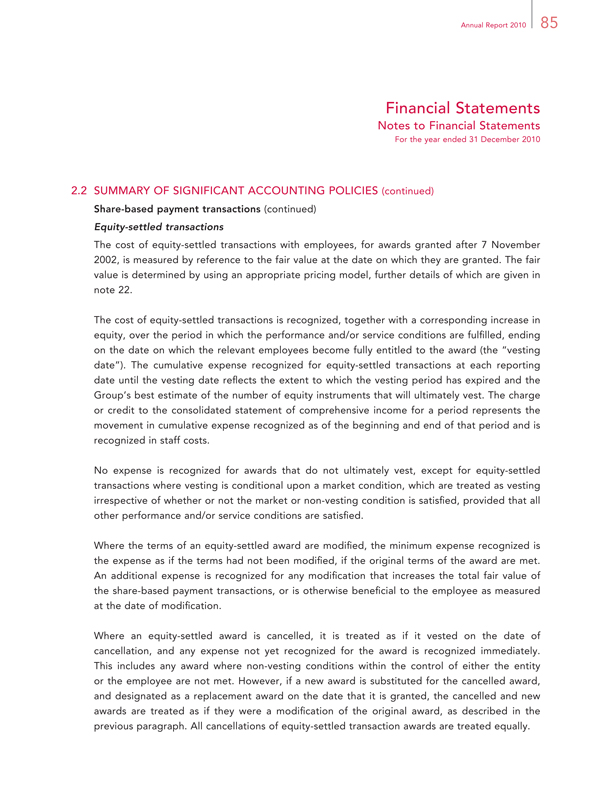
Annual Report 2010 85
Financial Statements
Notes to Financial Statements
For the year ended 31 December 2010
SUMMARY OF SIGNIFICANT ACCOUNTING POLICIES (continued)
Share-based payment transactions (continued)
Equity-settled transactions
The cost of equity-settled transactions with employees, for awards granted after 7 November 2002, is measured by reference to the fair value at the date on which they are granted. The fair value is determined by using an appropriate pricing model, further details of which are given in note 22.
The cost of equity-settled transactions is recognized, together with a corresponding increase in equity, over the period in which the performance and/or service conditions are fulfilled, ending on the date on which the relevant employees become fully entitled to the award (the “vesting date”). The cumulative expense recognized for equity-settled transactions at each reporting date until the vesting date reflects the extent to which the vesting period has expired and the Group’s best estimate of the number of equity instruments that will ultimately vest. The charge or credit to the consolidated statement of comprehensive income for a period represents the movement in cumulative expense recognized as of the beginning and end of that period and is recognized in staff costs.
No expense is recognized for awards that do not ultimately vest, except for equity-settled transactions where vesting is conditional upon a market condition, which are treated as vesting irrespective of whether or not the market or non-vesting condition is satisfied, provided that all other performance and/or service conditions are satisfied.
Where the terms of an equity-settled award are modified, the minimum expense recognized is the expense as if the terms had not been modified, if the original terms of the award are met.
An additional expense is recognized for any modification that increases the total fair value of the share-based payment transactions, or is otherwise beneficial to the employee as measured at the date of modification.
Where an equity-settled award is cancelled, it is treated as if it vested on the date of cancellation, and any expense not yet recognized for the award is recognized immediately.
This includes any award where non-vesting conditions within the control of either the entity or the employee are not met. However, if a new award is substituted for the cancelled award, and designated as a replacement award on the date that it is granted, the cancelled and new awards are treated as if they were a modification of the original award, as described in the previous paragraph. All cancellations of equity-settled transaction awards are treated equally.
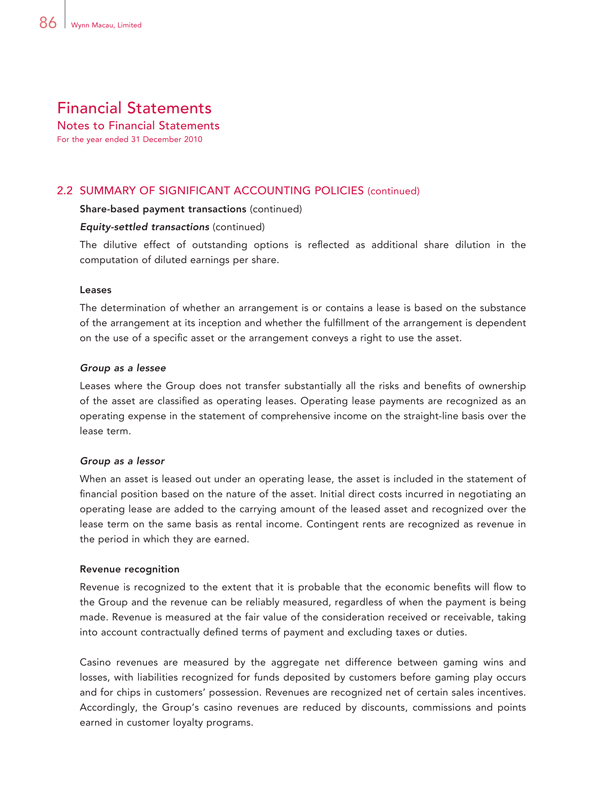
86 Wynn Macau, Limited
Financial Statements
Notes to Financial Statements
For the year ended 31 December 2010
SUMMARY OF SIGNIFICANT ACCOUNTING POLICIES (continued)
Share-based payment transactions (continued)
Equity-settled transactions (continued)
The dilutive effect of outstanding options is reflected as additional share dilution in the computation of diluted earnings per share.
Leases
The determination of whether an arrangement is or contains a lease is based on the substance of the arrangement at its inception and whether the fulfillment of the arrangement is dependent on the use of a specific asset or the arrangement conveys a right to use the asset.
Group as a lessee
Leases where the Group does not transfer substantially all the risks and benefits of ownership of the asset are classified as operating leases. Operating lease payments are recognized as an operating expense in the statement of comprehensive income on the straight-line basis over the lease term.
Group as a lessor
When an asset is leased out under an operating lease, the asset is included in the statement of financial position based on the nature of the asset. Initial direct costs incurred in negotiating an operating lease are added to the carrying amount of the leased asset and recognized over the lease term on the same basis as rental income. Contingent rents are recognized as revenue in the period in which they are earned.
Revenue recognition
Revenue is recognized to the extent that it is probable that the economic benefits will flow to the Group and the revenue can be reliably measured, regardless of when the payment is being made. Revenue is measured at the fair value of the consideration received or receivable, taking into account contractually defined terms of payment and excluding taxes or duties.
Casino revenues are measured by the aggregate net difference between gaming wins and losses, with liabilities recognized for funds deposited by customers before gaming play occurs and for chips in customers’ possession. Revenues are recognized net of certain sales incentives.
Accordingly, the Group’s casino revenues are reduced by discounts, commissions and points earned in customer loyalty programs.
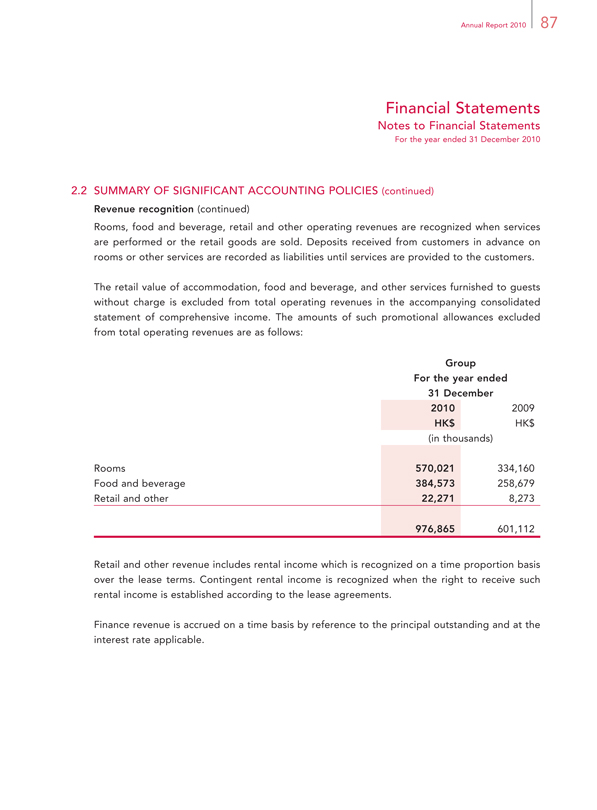
Annual Report 2010 87
Financial Statements
Notes to Financial Statements
For the year ended 31 December 2010
SUMMARY OF SIGNIFICANT ACCOUNTING POLICIES (continued)
Revenue recognition (continued)
Rooms, food and beverage, retail and other operating revenues are recognized when services are performed or the retail goods are sold. Deposits received from customers in advance on rooms or other services are recorded as liabilities until services are provided to the customers.
The retail value of accommodation, food and beverage, and other services furnished to guests without charge is excluded from total operating revenues in the accompanying consolidated statement of comprehensive income. The amounts of such promotional allowances excluded from total operating revenues are as follows:
Group For the year ended
31 December
20102009
HK$HK$
(in thousands)
Rooms 570,021 334,160
Food and beverage 384,573 258,679
Retail and other 22,271 8,273
976,865 601,112
Retail and other revenue includes rental income which is recognized on a time proportion basis over the lease terms. Contingent rental income is recognized when the right to receive such rental income is established according to the lease agreements.
Finance revenue is accrued on a time basis by reference to the principal outstanding and at the interest rate applicable.
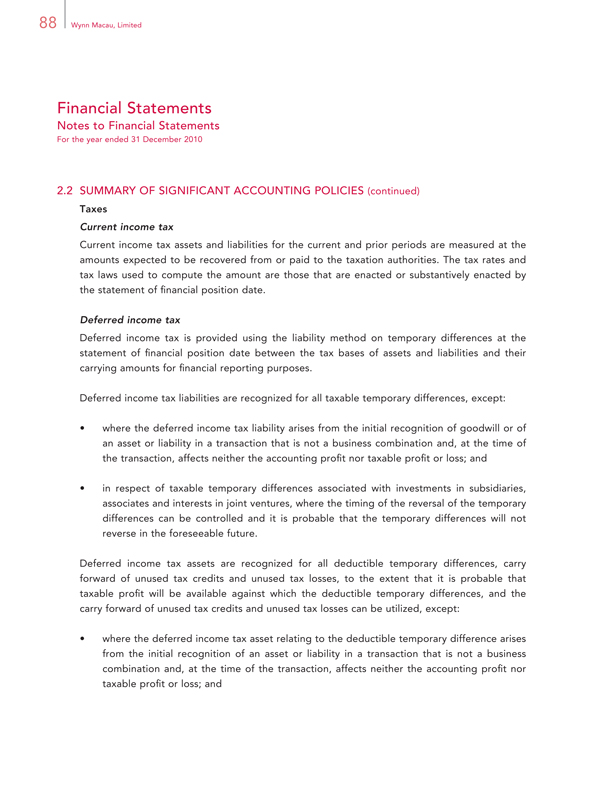
88 Wynn Macau, Limited
Financial Statements
Notes to Financial Statements
For the year ended 31 December 2010
SUMMARY OF SIGNIFICANT ACCOUNTING POLICIES (continued)
Taxes
Current income tax
Current income tax assets and liabilities for the current and prior periods are measured at the amounts expected to be recovered from or paid to the taxation authorities. The tax rates and tax laws used to compute the amount are those that are enacted or substantively enacted by the statement of financial position date.
Deferred income tax
Deferred income tax is provided using the liability method on temporary differences at the statement of financial position date between the tax bases of assets and liabilities and their carrying amounts for financial reporting purposes.
Deferred income tax liabilities are recognized for all taxable temporary differences, except:
where the deferred income tax liability arises from the initial recognition of goodwill or of an asset or liability in a transaction that is not a business combination and, at the time of the transaction, affects neither the accounting profit nor taxable profit or loss; and
in respect of taxable temporary differences associated with investments in subsidiaries, associates and interests in joint ventures, where the timing of the reversal of the temporary differences can be controlled and it is probable that the temporary differences will not reverse in the foreseeable future.
Deferred income tax assets are recognized for all deductible temporary differences, carry forward of unused tax credits and unused tax losses, to the extent that it is probable that taxable profit will be available against which the deductible temporary differences, and the carry forward of unused tax credits and unused tax losses can be utilized, except:
where the deferred income tax asset relating to the deductible temporary difference arises from the initial recognition of an asset or liability in a transaction that is not a business combination and, at the time of the transaction, affects neither the accounting profit nor taxable profit or loss; and

Annual Report 2010 89
Financial Statements
Notes to Financial Statements
For the year ended 31 December 2010
SUMMARY OF SIGNIFICANT ACCOUNTING POLICIES (continued)
Taxes (continued)
Deferred income tax (continued)
in respect of deductible temporary differences associated with investments in subsidiaries, associates and interests in joint ventures, deferred income tax assets are recognized only to the extent that it is probable that the temporary differences will reverse in the foreseeable future and taxable profit will be available against which the temporary differences can be utilized.
The carrying amount of deferred income tax assets is reviewed at each statement of financial position date and reduced to the extent that it is no longer probable that sufficient taxable profit will be available to allow all or part of the deferred income tax asset to be utilized. Unrecognized deferred income tax assets are reassessed at each statement of financial position date and are recognized to the extent that it has become probable that future taxable profit will allow the deferred tax asset to be recovered.
Deferred income tax assets and liabilities are measured at the tax rates that are expected to apply in the year when the asset is realized or the liability is settled, based on tax rates (and tax laws) that have been enacted or substantively enacted at the statement of financial position date. Deferred income tax items are recognized in correlation to the underlying transaction either in other comprehensive income or directly in equity. Deferred income tax assets and deferred income tax liabilities are offset, if a legally enforceable right exists to set off current tax assets against current income tax liabilities and the deferred income taxes relate to the same taxable entity and the same taxation authority.
Gaming taxes and premiums
According to the gaming concession granted by the Macau government and the relevant legislation, the Group is required to pay a 35% gaming tax on gross gaming win. The Group is also required to pay an additional 4% of gross gaming win as public development and social related contributions. The Group also makes certain variable and fixed payments to the Macau government based on the number of slot machines and table games in its operation on monthly and yearly bases, respectively. These expenses are reported as “gaming taxes and premiums” in the consolidated statement of comprehensive income.
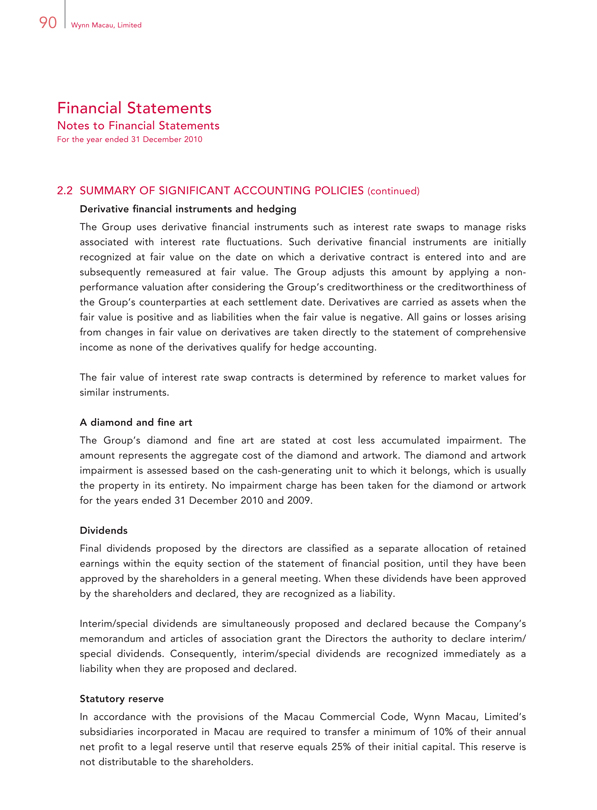
90 Wynn Macau, Limited
Financial Statements
Notes to Financial Statements
For the year ended 31 December 2010
SUMMARY OF SIGNIFICANT ACCOUNTING POLICIES (continued)
Derivative financial instruments and hedging
The Group uses derivative financial instruments such as interest rate swaps to manage risks associated with interest rate fluctuations. Such derivative financial instruments are initially recognized at fair value on the date on which a derivative contract is entered into and are subsequently remeasured at fair value. The Group adjusts this amount by applying a non- performance valuation after considering the Group’s creditworthiness or the creditworthiness of the Group’s counterparties at each settlement date. Derivatives are carried as assets when the fair value is positive and as liabilities when the fair value is negative. All gains or losses arising from changes in fair value on derivatives are taken directly to the statement of comprehensive income as none of the derivatives qualify for hedge accounting.
The fair value of interest rate swap contracts is determined by reference to market values for similar instruments.
A diamond and fine art
The Group’s diamond and fine art are stated at cost less accumulated impairment. The amount represents the aggregate cost of the diamond and artwork. The diamond and artwork impairment is assessed based on the cash-generating unit to which it belongs, which is usually the property in its entirety. No impairment charge has been taken for the diamond or artwork for the years ended 31 December 2010 and 2009.
Dividends
Final dividends proposed by the directors are classified as a separate allocation of retained earnings within the equity section of the statement of financial position, until they have been approved by the shareholders in a general meeting. When these dividends have been approved by the shareholders and declared, they are recognized as a liability.
Interim/special dividends are simultaneously proposed and declared because the Company’s memorandum and articles of association grant the Directors the authority to declare interim/ special dividends. Consequently, interim/special dividends are recognized immediately as a liability when they are proposed and declared.
Statutory reserve
In accordance with the provisions of the Macau Commercial Code, Wynn Macau, Limited’s subsidiaries incorporated in Macau are required to transfer a minimum of 10% of their annual net profit to a legal reserve until that reserve equals 25% of their initial capital. This reserve is not distributable to the shareholders.
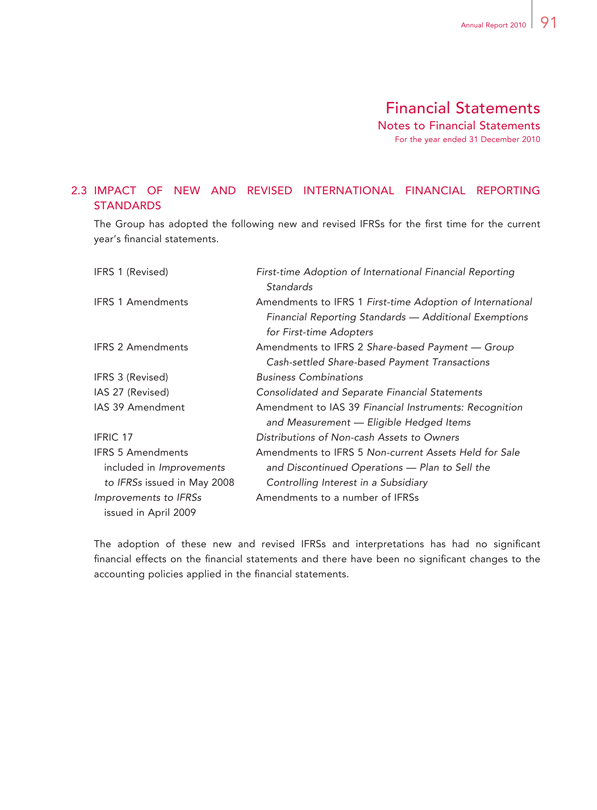
Annual Report 2010 91
Financial Statements
Notes to Financial Statements
For the year ended 31 December 2010
IMPACT OF NEW AND REVISED INTERNATIONAL FINANCIAL REPORTING STANDARDS
The Group has adopted the following new and revised IFRSs for the first time for the current year’s financial statements.
IFRS 1 (Revised)
IFRS 1 Amendments
IFRS 2 Amendments
IFRS 3 (Revised) IAS 27 (Revised) IAS 39 Amendment
IFRIC 17
IFRS 5 Amendments included in Improvements to IFRSs issued in May 2008
Improvements to IFRSs issued in April 2009
First-time Adoption of International Financial Reporting Standards Amendments to IFRS 1 First-time Adoption of International Financial Reporting Standards — Additional Exemptions for First-time Adopters Amendments to IFRS 2 Share-based Payment — Group Cash-settled Share-based Payment Transactions Business Combinations Consolidated and Separate Financial Statements Amendment to IAS 39 Financial Instruments: Recognition and Measurement — Eligible Hedged Items Distributions of Non-cash Assets to Owners Amendments to IFRS 5 Non-current Assets Held for Sale and Discontinued Operations — Plan to Sell the Controlling Interest in a Subsidiary
Amendments to a number of IFRSs
The adoption of these new and revised IFRSs and interpretations has had no signifi cant fi nancial effects on the fi nancial statements and there have been no signifi cant changes to the accounting policies applied in the fi nancial statements.
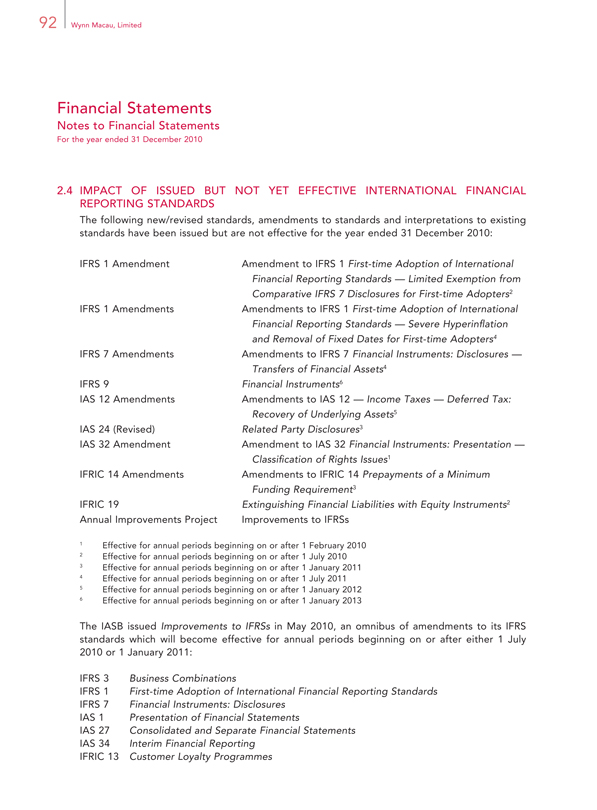
92 Wynn Macau, Limited
Financial Statements
Notes to Financial Statements
For the year ended 31 December 2010
IMPACT OF ISSUED BUT NOT YET EFFECTIVE INTERNATIONAL FINANCIAL REPORTING STANDARDS
The following new/revised standards, amendments to standards and interpretations to existing standards have been issued but are not effective for the year ended 31 December 2010:
IFRS 1 Amendment Amendment to IFRS 1 First-time Adoption of International
Financial Reporting Standards — Limited Exemption from
Comparative IFRS 7 Disclosures for First-time Adopters2
IFRS 1 Amendments Amendments to IFRS 1 First-time Adoption of International
Financial Reporting Standards — Severe Hyperinflation
and Removal of Fixed Dates for First-time Adopters4
IFRS 7 Amendments Amendments to IFRS 7 Financial Instruments: Disclosures —
Transfers of Financial Assets4
IFRS 9 Financial Instruments6
IAS 12 Amendments Amendments to IAS 12 — Income Taxes — Deferred Tax:
Recovery of Underlying Assets5
IAS 24 (Revised) Related Party Disclosures3
IAS 32 Amendment Amendment to IAS 32 Financial Instruments: Presentation —
Classification of Rights Issues1
IFRIC 14 Amendments Amendments to IFRIC 14 Prepayments of a Minimum
Funding Requirement3
IFRIC 19 Extinguishing Financial Liabilities with Equity Instruments2
Annual Improvements Project Improvements to IFRSs
Effective for annual periods beginning on or after 1 February 2010
Effective for annual periods beginning on or after 1 July 2010
Effective for annual periods beginning on or after 1 January 2011
Effective for annual periods beginning on or after 1 July 2011
Effective for annual periods beginning on or after 1 January 2012
Effective for annual periods beginning on or after 1 January 2013
The IASB issued Improvements to IFRSs in May 2010, an omnibus of amendments to its IFRS standards which will become effective for annual periods beginning on or after either 1 July 2010 or 1 January 2011:
IFRS 3 Business Combinations
IFRS 1 First-time Adoption of International Financial Reporting Standards
IFRS 7 Financial Instruments: Disclosures
IAS 1 Presentation of Financial Statements
IAS 27 Consolidated and Separate Financial Statements
IAS 34 Interim Financial Reporting
IFRIC 13 Customer Loyalty Programmes
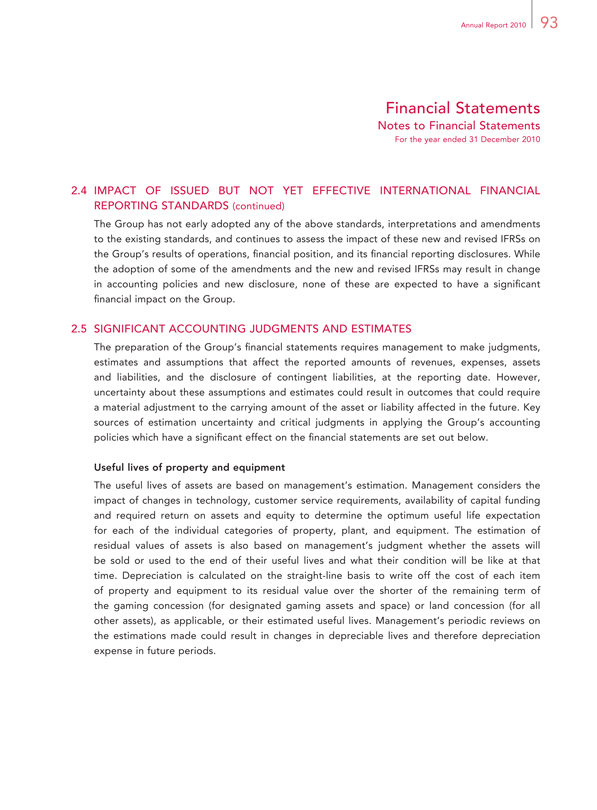
Annual Report 2010 93
Financial Statements
Notes to Financial Statements
For the year ended 31 December 2010
IMPACT OF ISSUED BUT NOT YET EFFECTIVE INTERNATIONAL FINANCIAL REPORTING STANDARDS (continued) The Group has not early adopted any of the above standards, interpretations and amendments to the existing standards, and continues to assess the impact of these new and revised IFRSs on the Group’s results of operations, financial position, and its financial reporting disclosures. While the adoption of some of the amendments and the new and revised IFRSs may result in change in accounting policies and new disclosure, none of these are expected to have a significant financial impact on the Group.
SIGNIFICANT ACCOUNTING JUDGMENTS AND ESTIMATES
The preparation of the Group’s financial statements requires management to make judgments, estimates and assumptions that affect the reported amounts of revenues, expenses, assets and liabilities, and the disclosure of contingent liabilities, at the reporting date. However, uncertainty about these assumptions and estimates could result in outcomes that could require a material adjustment to the carrying amount of the asset or liability affected in the future. Key sources of estimation uncertainty and critical judgments in applying the Group’s accounting policies which have a significant effect on the financial statements are set out below.
Useful lives of property and equipment
The useful lives of assets are based on management’s estimation. Management considers the impact of changes in technology, customer service requirements, availability of capital funding and required return on assets and equity to determine the optimum useful life expectation for each of the individual categories of property, plant, and equipment. The estimation of residual values of assets is also based on management’s judgment whether the assets will be sold or used to the end of their useful lives and what their condition will be like at that time. Depreciation is calculated on the straight-line basis to write off the cost of each item of property and equipment to its residual value over the shorter of the remaining term of the gaming concession (for designated gaming assets and space) or land concession (for all other assets), as applicable, or their estimated useful lives. Management’s periodic reviews on the estimations made could result in changes in depreciable lives and therefore depreciation expense in future periods.
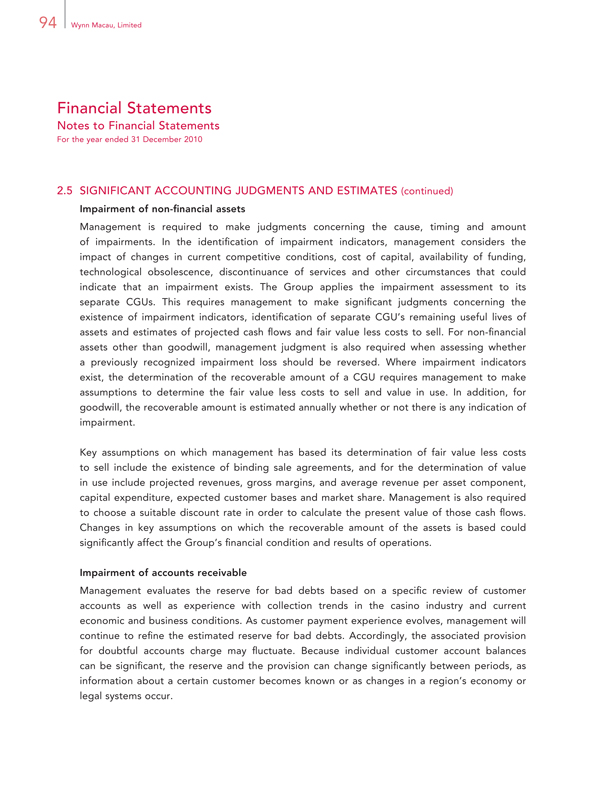
94 Wynn Macau, Limited
Financial Statements
Notes to Financial Statements
For the year ended 31 December 2010
SIGNIFICANT ACCOUNTING JUDGMENTS AND ESTIMATES (continued)
Impairment of non-financial assets
Management is required to make judgments concerning the cause, timing and amount of impairments. In the identification of impairment indicators, management considers the impact of changes in current competitive conditions, cost of capital, availability of funding, technological obsolescence, discontinuance of services and other circumstances that could indicate that an impairment exists. The Group applies the impairment assessment to its separate CGUs. This requires management to make significant judgments concerning the existence of impairment indicators, identification of separate CGU’s remaining useful lives of assets and estimates of projected cash flows and fair value less costs to sell. For non-financial assets other than goodwill, management judgment is also required when assessing whether a previously recognized impairment loss should be reversed. Where impairment indicators exist, the determination of the recoverable amount of a CGU requires management to make assumptions to determine the fair value less costs to sell and value in use. In addition, for goodwill, the recoverable amount is estimated annually whether or not there is any indication of impairment.
Key assumptions on which management has based its determination of fair value less costs to sell include the existence of binding sale agreements, and for the determination of value in use include projected revenues, gross margins, and average revenue per asset component, capital expenditure, expected customer bases and market share. Management is also required to choose a suitable discount rate in order to calculate the present value of those cash flows.
Changes in key assumptions on which the recoverable amount of the assets is based could significantly affect the Group’s financial condition and results of operations.
Impairment of accounts receivable
Management evaluates the reserve for bad debts based on a specific review of customer accounts as well as experience with collection trends in the casino industry and current economic and business conditions. As customer payment experience evolves, management will continue to refine the estimated reserve for bad debts. Accordingly, the associated provision for doubtful accounts charge may fluctuate. Because individual customer account balances can be significant, the reserve and the provision can change significantly between periods, as information about a certain customer becomes known or as changes in a region’s economy or legal systems occur.
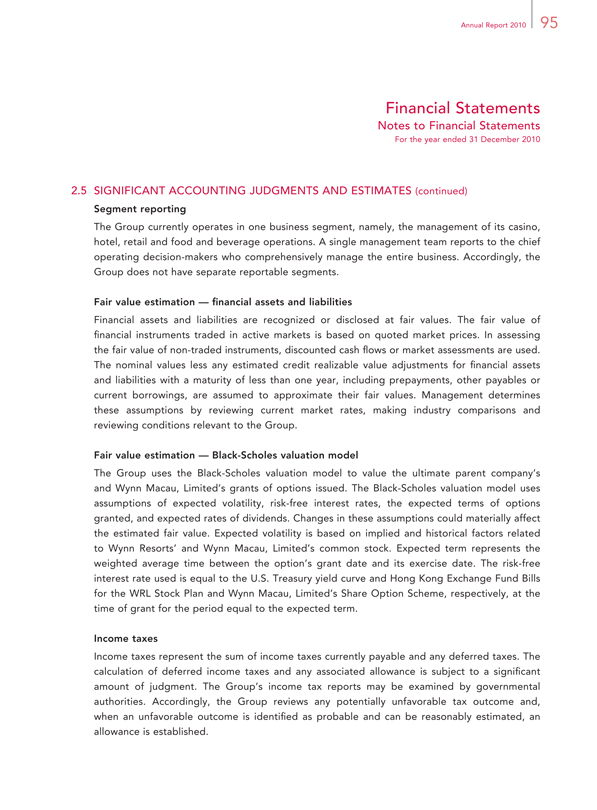
Annual Report 2010 95
Financial Statements
Notes to Financial Statements
For the year ended 31 December 2010
SIGNIFICANT ACCOUNTING JUDGMENTS AND ESTIMATES (continued)
Segment reporting
The Group currently operates in one business segment, namely, the management of its casino, hotel, retail and food and beverage operations. A single management team reports to the chief operating decision-makers who comprehensively manage the entire business. Accordingly, the Group does not have separate reportable segments.
Fair value estimation — financial assets and liabilities
Financial assets and liabilities are recognized or disclosed at fair values. The fair value of financial instruments traded in active markets is based on quoted market prices. In assessing the fair value of non-traded instruments, discounted cash flows or market assessments are used.
The nominal values less any estimated credit realizable value adjustments for financial assets and liabilities with a maturity of less than one year, including prepayments, other payables or current borrowings, are assumed to approximate their fair values. Management determines these assumptions by reviewing current market rates, making industry comparisons and reviewing conditions relevant to the Group.
Fair value estimation — Black-Scholes valuation model
The Group uses the Black-Scholes valuation model to value the ultimate parent company’s and Wynn Macau, Limited’s grants of options issued. The Black-Scholes valuation model uses assumptions of expected volatility, risk-free interest rates, the expected terms of options granted, and expected rates of dividends. Changes in these assumptions could materially affect the estimated fair value. Expected volatility is based on implied and historical factors related to Wynn Resorts’ and Wynn Macau, Limited’s common stock. Expected term represents the weighted average time between the option’s grant date and its exercise date. The risk-free interest rate used is equal to the U.S. Treasury yield curve and Hong Kong Exchange Fund Bills for the WRL Stock Plan and Wynn Macau, Limited’s Share Option Scheme, respectively, at the time of grant for the period equal to the expected term.
Income taxes
Income taxes represent the sum of income taxes currently payable and any deferred taxes. The calculation of deferred income taxes and any associated allowance is subject to a significant amount of judgment. The Group’s income tax reports may be examined by governmental authorities. Accordingly, the Group reviews any potentially unfavorable tax outcome and, when an unfavorable outcome is identified as probable and can be reasonably estimated, an allowance is established.
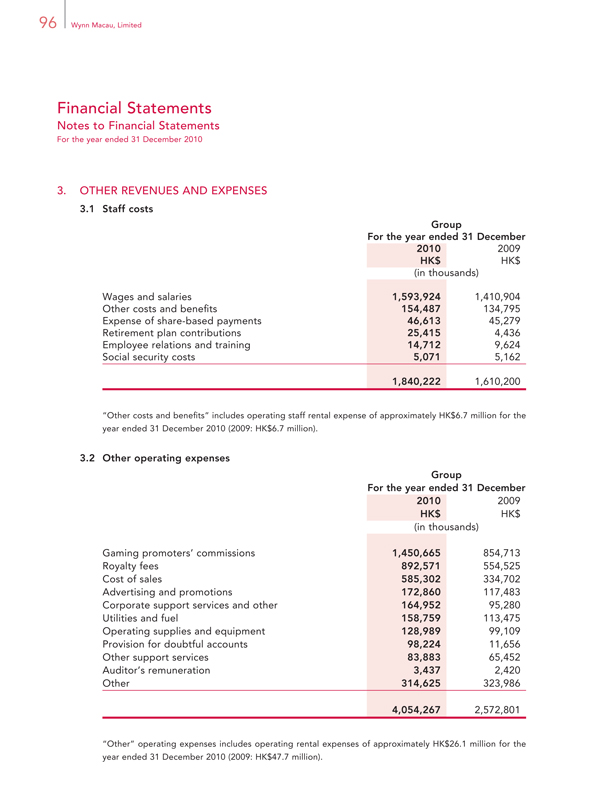
96 Wynn Macau, Limited
Financial Statements
Notes to Financial Statements
For the year ended 31 December 2010
OTHER REVENUES AND EXPENSES
3.1 Staff costs
“Other costs and benefits” includes operating staff rental expense of approximately HK$6.7 million for the year ended 31 December 2010 (2009: HK$6.7 million).
3.2 | | Other operating expenses |
Group
For the year ended 31 December
2010 2009
HK$ HK$
(in thousands)
Gaming promoters’ commissions 1,450,665 854,713
Royalty fees 892,571 554,525
Cost of sales 585,302 334,702
Advertising and promotions 172,860 117,483
Corporate support services and other 164,952 95,280
Utilities and fuel 158,759 113,475
Operating supplies and equipment 128,989 99,109
Provision for doubtful accounts 98,224 11,656
Other support services 83,883 65,452
Auditor’s remuneration 3,437 2,420
Other 314,625 323,986
4,054,267 2,572,801
“Other” operating expenses includes operating rental expenses of approximately HK$26.1 million for the year ended 31 December 2010 (2009: HK$47.7 million).
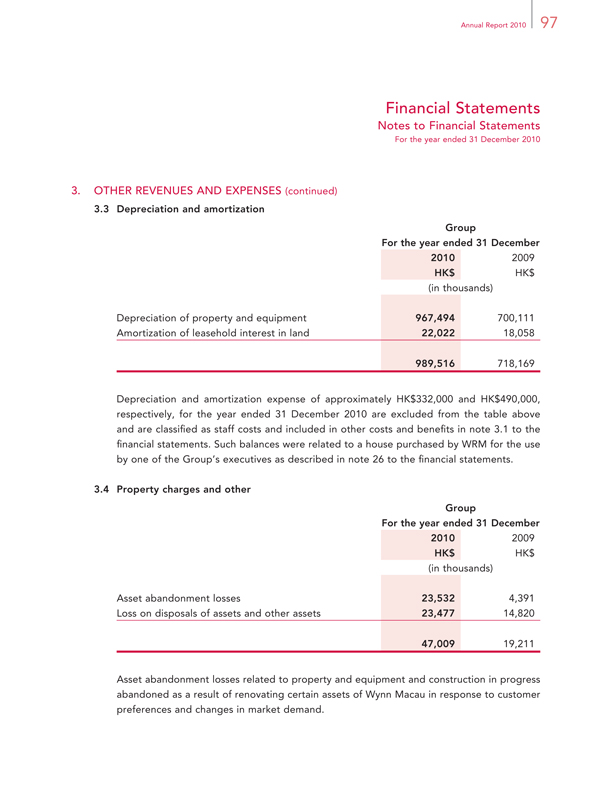
Annual Report 2010 97
Financial Statements
Notes to Financial Statements
For the year ended 31 December 2010
OTHER REVENUES AND EXPENSES (continued)
3.3 Depreciation and amortization
Group
For the year ended 31 December
2010 2009
HK$ HK$
(in thousands)
Depreciation of property and equipment 967,494 700,111
Amortization of leasehold interest in land 22,022 18,058
989,516 718,169
Depreciation and amortization expense of approximately HK$332,000 and HK$490,000, respectively, for the year ended 31 December 2010 are excluded from the table above and are classified as staff costs and included in other costs and benefits in note 3.1 to the financial statements. Such balances were related to a house purchased by WRM for the use by one of the Group’s executives as described in note 26 to the financial statements.
3.4 Property charges and other
Group
For the year ended 31 December
2010 2009
HK$ HK$
(in thousands)
Asset abandonment losses 23,532 4,391
Loss on disposals of assets and other assets 23,477 14,820
47,009 19,211
Asset abandonment losses related to property and equipment and construction in progress abandoned as a result of renovating certain assets of Wynn Macau in response to customer preferences and changes in market demand.
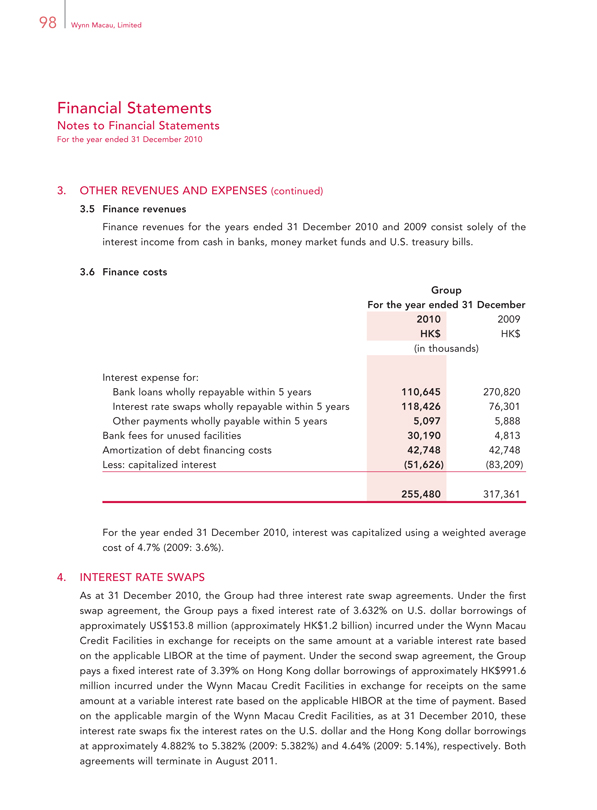
98 Wynn Macau, Limited
Financial Statements
Notes to Financial Statements
For the year ended 31 December 2010
OTHER REVENUES AND EXPENSES (continued)
Finance revenues
Finance revenues for the years ended 31 December 2010 and 2009 consist solely of the interest income from cash in banks, money market funds and U.S. treasury bills.
Finance costs
Group
For the year ended 31 December
2010 2009
HK$ HK$
(in thousands)
Interest expense for:
Bank loans wholly repayable within 5 years 110,645 270,820
Interest rate swaps wholly repayable within 5 years 118,426 76,301
Other payments wholly payable within 5 years 5,097 5,888
Bank fees for unused facilities 30,190 4,813
Amortization of debt financing costs 42,748 42,748
Less: capitalized interest(51,626)(83,209)
255,480 317,361
For the year ended 31 December 2010, interest was capitalized using a weighted average cost of 4.7% (2009: 3.6%).
INTEREST RATE SWAPS
As at 31 December 2010, the Group had three interest rate swap agreements. Under the first swap agreement, the Group pays a fixed interest rate of 3.632% on U.S. dollar borrowings of approximately US$153.8 million (approximately HK$1.2 billion) incurred under the Wynn Macau Credit Facilities in exchange for receipts on the same amount at a variable interest rate based on the applicable LIBOR at the time of payment. Under the second swap agreement, the Group pays a fixed interest rate of 3.39% on Hong Kong dollar borrowings of approximately HK$991.6 million incurred under the Wynn Macau Credit Facilities in exchange for receipts on the same amount at a variable interest rate based on the applicable HIBOR at the time of payment. Based on the applicable margin of the Wynn Macau Credit Facilities, as at 31 December 2010, these interest rate swaps fix the interest rates on the U.S. dollar and the Hong Kong dollar borrowings at approximately 4.882% to 5.382% (2009: 5.382%) and 4.64% (2009: 5.14%), respectively. Both agreements will terminate in August 2011.
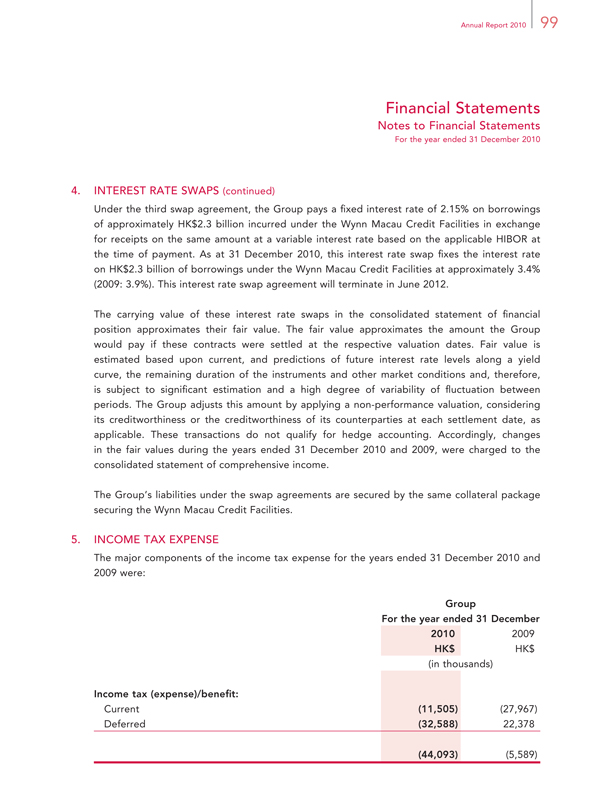
Annual Report 2010 99
Financial Statements
Notes to Financial Statements
For the year ended 31 December 2010
INTEREST RATE SWAPS (continued)
Under the third swap agreement, the Group pays a fixed interest rate of 2.15% on borrowings of approximately HK$2.3 billion incurred under the Wynn Macau Credit Facilities in exchange for receipts on the same amount at a variable interest rate based on the applicable HIBOR at the time of payment. As at 31 December 2010, this interest rate swap fixes the interest rate on HK$2.3 billion of borrowings under the Wynn Macau Credit Facilities at approximately 3.4% (2009: 3.9%). This interest rate swap agreement will terminate in June 2012.
The carrying value of these interest rate swaps in the consolidated statement of financial position approximates their fair value. The fair value approximates the amount the Group would pay if these contracts were settled at the respective valuation dates. Fair value is estimated based upon current, and predictions of future interest rate levels along a yield curve, the remaining duration of the instruments and other market conditions and, therefore, is subject to significant estimation and a high degree of variability of fluctuation between periods. The Group adjusts this amount by applying a non-performance valuation, considering its creditworthiness or the creditworthiness of its counterparties at each settlement date, as applicable. These transactions do not qualify for hedge accounting. Accordingly, changes in the fair values during the years ended 31 December 2010 and 2009, were charged to the consolidated statement of comprehensive income.
The Group’s liabilities under the swap agreements are secured by the same collateral package securing the Wynn Macau Credit Facilities.
INCOME TAX EXPENSE
The major components of the income tax expense for the years ended 31 December 2010 and 2009 were:
(44,093)
(5,589)
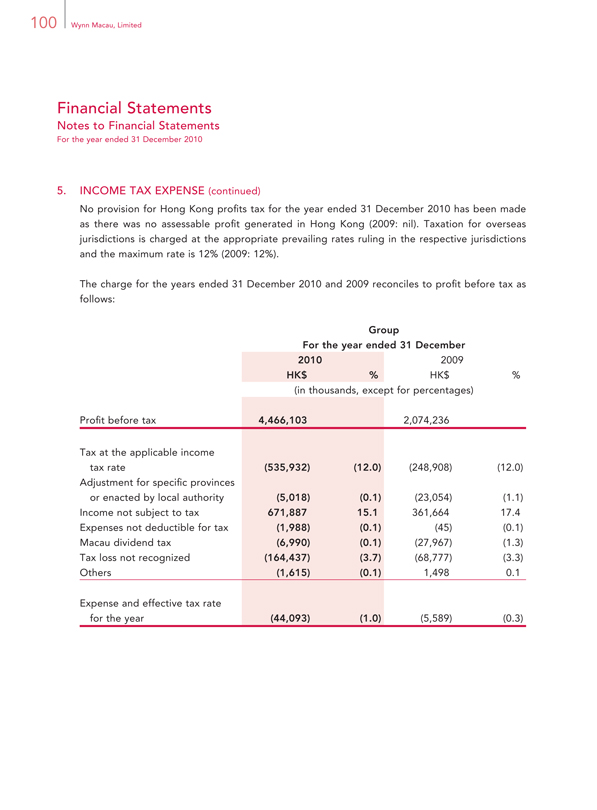
100 Wynn Macau, Limited
Financial Statements
Notes to Financial Statements
For the year ended 31 December 2010
INCOME TAX EXPENSE (continued)
No provision for Hong Kong profits tax for the year ended 31 December 2010 has been made as there was no assessable profit generated in Hong Kong (2009: nil). Taxation for overseas jurisdictions is charged at the appropriate prevailing rates ruling in the respective jurisdictions and the maximum rate is 12% (2009: 12%).
The charge for the years ended 31 December 2010 and 2009 reconciles to profit before tax as follows:
Group For the year ended 31 December 2010 2009 HK$ % HK$ % (in thousands, except for percentages) Profit before tax 4,466,103 2,074,236 Tax at the applicable income tax rate (535,932) (12.0) (248,908) (12.0) Adjustment for specific provinces or enacted by local authority (5,018) (0.1) (23,054) (1.1) Income not subject to tax 671,887 15.1 361,664 17.4 Expenses not deductible for tax (1,988) (0.1) (45) (0.1) Macau dividend tax (6,990) (0.1) (27,967) (1.3) Tax loss not recognized (164,437) (3.7) (68,777) (3.3) Others (1,615) (0.1) 1,498 0.1 Expense and effective tax rate for the year (44,093) (1.0) (5,589) (0.3)
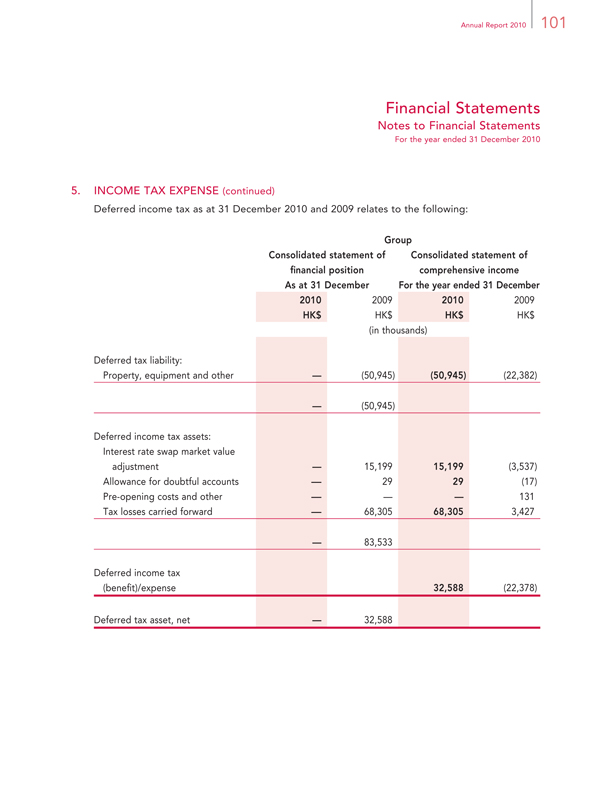
Annual Report 2010 101
Financial Statements
Notes to Financial Statements
For the year ended 31 December 2010
INCOME TAX EXPENSE (continued)
Deferred income tax as at 31 December 2010 and 2009 relates to the following:
Group
Consolidated statement of
Consolidated statement of
financial position
comprehensive income
As at 31
December
For the year ended 31 December
2010
2009
2010
2009
HK$
HK$
HK$
HK$ (in thousands)
Deferred tax liability:
Property, equipment and other
—
(50,945)
(50,945)
(22,382)
—
(50,945)
Deferred income tax assets:
Interest rate swap market value
adjustment
—
15,199
15,199
(3,537)
Allowance for doubtful accounts
—
29
29
(17)
Pre-opening costs and other
—
—
—
131
Tax losses carried forward
—
68,305
68,305
3,427
—
83,533
Deferred income tax
(benefit)/expense
32,588
(22,378)
Deferred tax asset, net
—
32,588
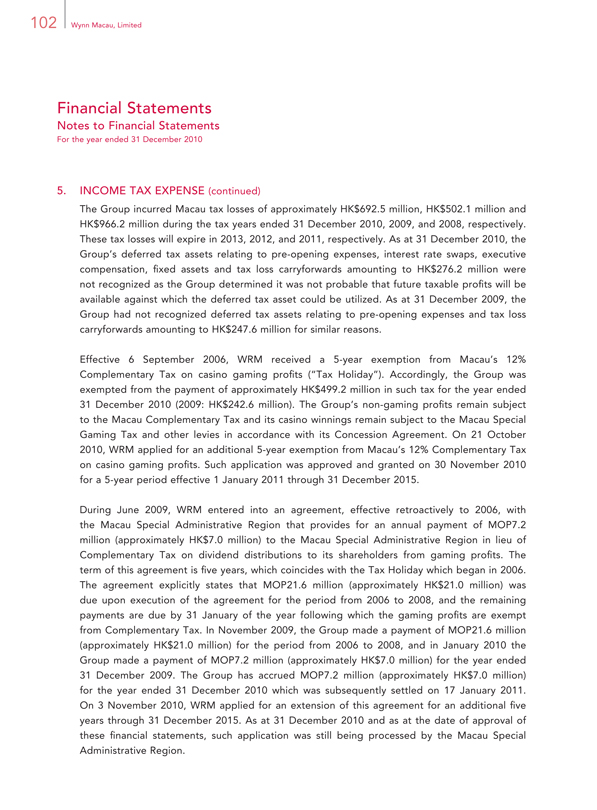
102 Wynn Macau, Limited Financial Statements Notes to Financial Statements For the year ended 31 December 2010 5. INCOME TAX EXPENSE (continued) The Group incurred Macau tax losses of approximately HK$692.5 million, HK$502.1 million and HK$966.2 million during the tax years ended 31 December 2010, 2009, and 2008, respectively. These tax losses will expire in 2013, 2012, and 2011, respectively. As at 31 December 2010, the Group’s deferred tax assets relating to pre-opening expenses, interest rate swaps, executive compensation, fixed assets and tax loss carryforwards amounting to HK$276.2 million were not recognized as the Group determined it was not probable that future taxable profits will be available against which the deferred tax asset could be utilized. As at 31 December 2009, the Group had not recognized deferred tax assets relating to pre-opening expenses and tax loss carryforwards amounting to HK$247.6 million for similar reasons. Effective 6 September 2006, WRM received a 5-year exemption from Macau’s 12% Complementary Tax on casino gaming profits (“Tax Holiday”). Accordingly, the Group was exempted from the payment of approximately HK$499.2 million in such tax for the year ended 31 December 2010 (2009: HK$242.6 million). The Group’s non-gaming profits remain subject to the Macau Complementary Tax and its casino winnings remain subject to the Macau Special Gaming Tax and other levies in accordance with its Concession Agreement. On 21 October 2010, WRM applied for an additional 5-year exemption from Macau’s 12% Complementary Tax on casino gaming profits. Such application was approved and granted on 30 November 2010 for a 5-year period effective 1 January 2011 through 31 December 2015. During June 2009, WRM entered into an agreement, effective retroactively to 2006, with the Macau Special Administrative Region that provides for an annual payment of MOP7.2 million (approximately HK$7.0 million) to the Macau Special Administrative Region in lieu of Complementary Tax on dividend distributions to its shareholders from gaming profits. The term of this agreement is five years, which coincides with the Tax Holiday which began in 2006. The agreement explicitly states that MOP21.6 million (approximately HK$21.0 million) was due upon execution of the agreement for the period from 2006 to 2008, and the remaining payments are due by 31 January of the year following which the gaming profits are exempt from Complementary Tax. In November 2009, the Group made a payment of MOP21.6 million (approximately HK$21.0 million) for the period from 2006 to 2008, and in January 2010 the Group made a payment of MOP7.2 million (approximately HK$7.0 million) for the year ended 31 December 2009. The Group has accrued MOP7.2 million (approximately HK$7.0 million) for the year ended 31 December 2010 which was subsequently settled on 17 January 2011. On 3 November 2010, WRM applied for an extension of this agreement for an additional five years through 31 December 2015. As at 31 December 2010 and as at the date of approval of these financial statements, such application was still being processed by the Macau Special Administrative Region.
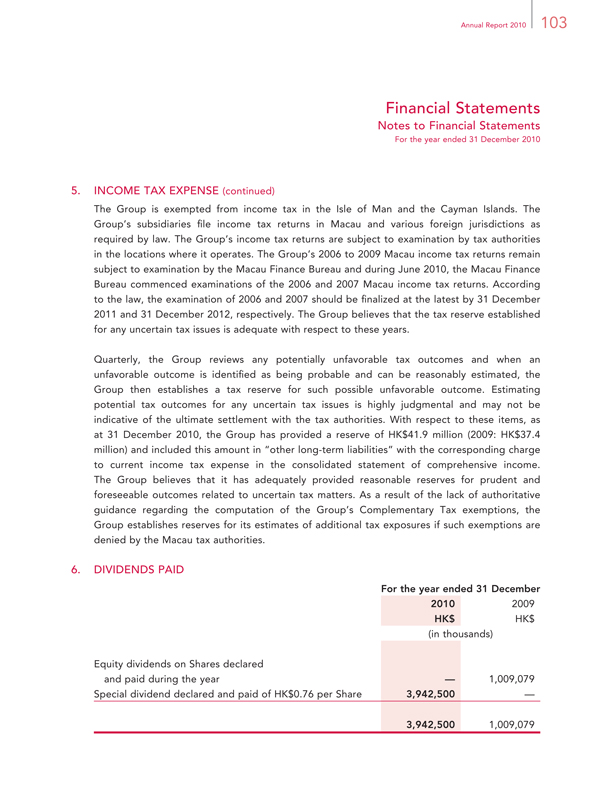
Annual Report 2010 103 Financial Statements Notes to Financial Statements For the year ended 31 December 2010 5. INCOME TAX EXPENSE (continued) The Group is exempted from income tax in the Isle of Man and the Cayman Islands. The Group’s subsidiaries file income tax returns in Macau and various foreign jurisdictions as required by law. The Group’s income tax returns are subject to examination by tax authorities in the locations where it operates. The Group’s 2006 to 2009 Macau income tax returns remain subject to examination by the Macau Finance Bureau and during June 2010, the Macau Finance Bureau commenced examinations of the 2006 and 2007 Macau income tax returns. According to the law, the examination of 2006 and 2007 should be finalized at the latest by 31 December 2011 and 31 December 2012, respectively. The Group believes that the tax reserve established for any uncertain tax issues is adequate with respect to these years. Quarterly, the Group reviews any potentially unfavorable tax outcomes and when an unfavorable outcome is identified as being probable and can be reasonably estimated, the Group then establishes a tax reserve for such possible unfavorable outcome. Estimating potential tax outcomes for any uncertain tax issues is highly judgmental and may not be indicative of the ultimate settlement with the tax authorities. With respect to these items, as at 31 December 2010, the Group has provided a reserve of HK$41.9 million (2009: HK$37.4 million) and included this amount in “other long-term liabilities” with the corresponding charge to current income tax expense in the consolidated statement of comprehensive income. The Group believes that it has adequately provided reasonable reserves for prudent and foreseeable outcomes related to uncertain tax matters. As a result of the lack of authoritative guidance regarding the computation of the Group’s Complementary Tax exemptions, the Group establishes reserves for its estimates of additional tax exposures if such exemptions are denied by the Macau tax authorities. 6. DIVIDENDS PAID For the year ended 31 December 2010 2009 HK$ HK$ (in thousands) Equity dividends on Shares declared and paid during the year — 1,009,079 Special dividend declared and paid of HK$0.76 per Share 3,942,500 — 3,942,500 1,009,079
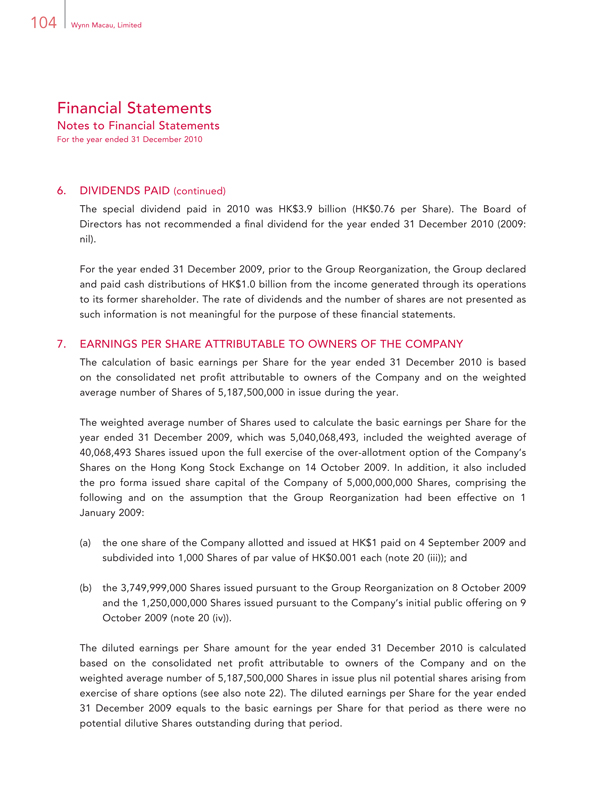
104 Wynn Macau, Limited Financial Statements Notes to Financial Statements For the year ended 31 December 2010 6. DIVIDENDS PAID (continued) The special dividend paid in 2010 was HK$3.9 billion (HK$0.76 per Share). The Board of Directors has not recommended a final dividend for the year ended 31 December 2010 (2009: nil). For the year ended 31 December 2009, prior to the Group Reorganization, the Group declared and paid cash distributions of HK$1.0 billion from the income generated through its operations to its former shareholder. The rate of dividends and the number of shares are not presented as such information is not meaningful for the purpose of these financial statements. 7. EARNINGS PER SHARE ATTRIBUTABLE TO OWNERS OF THE COMPANY The calculation of basic earnings per Share for the year ended 31 December 2010 is based on the consolidated net profit attributable to owners of the Company and on the weighted average number of Shares of 5,187,500,000 in issue during the year. The weighted average number of Shares used to calculate the basic earnings per Share for the year ended 31 December 2009, which was 5,040,068,493, included the weighted average of 40,068,493 Shares issued upon the full exercise of the over-allotment option of the Company’s Shares on the Hong Kong Stock Exchange on 14 October 2009. In addition, it also included the pro forma issued share capital of the Company of 5,000,000,000 Shares, comprising the following and on the assumption that the Group Reorganization had been effective on 1 January 2009: (a) the one share of the Company allotted and issued at HK$1 paid on 4 September 2009 and subdivided into 1,000 Shares of par value of HK$0.001 each (note 20 (iii)); and (b) the 3,749,999,000 Shares issued pursuant to the Group Reorganization on 8 October 2009 and the 1,250,000,000 Shares issued pursuant to the Company’s initial public offering on 9 October 2009 (note 20 (iv)). The diluted earnings per Share amount for the year ended 31 December 2010 is calculated based on the consolidated net profit attributable to owners of the Company and on the weighted average number of 5,187,500,000 Shares in issue plus nil potential shares arising from exercise of share options (see also note 22). The diluted earnings per Share for the year ended 31 December 2009 equals to the basic earnings per Share for that period as there were no potential dilutive Shares outstanding during that period.
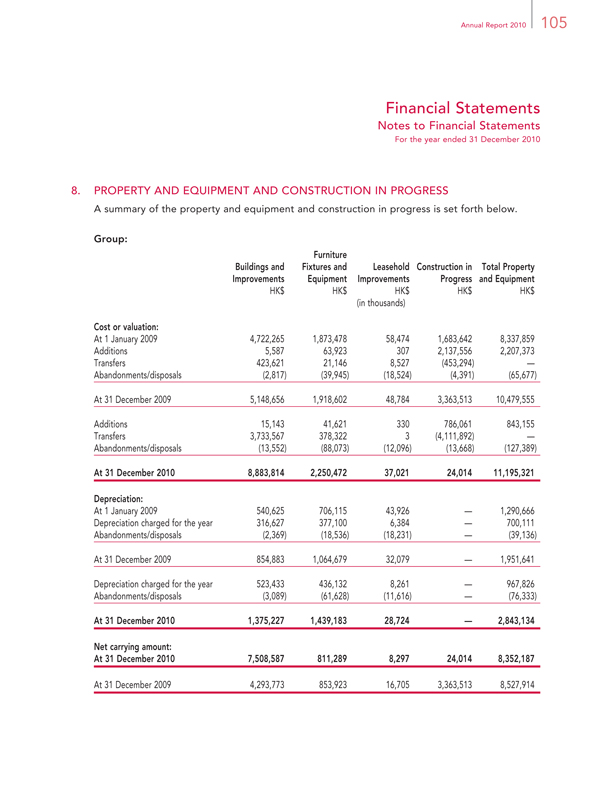
Annual Report 2010 105 Financial Statements Notes to Financial Statements For the year ended 31 December 2010 8. PROPERTY AND EQUIPMENT AND CONSTRUCTION IN PROGRESS A summary of the property and equipment and construction in progress is set forth below. Group: Furniture Buildings and Fixtures and Leasehold Construction in Total Property Improvements Equipment Improvements Progress and Equipment HK$ HK$ HK$ HK$ HK$ (in thousands) Cost or valuation: At 1 January 2009 4,722,265 1,873,478 58,474 1,683,642 8,337,859 Additions 5,587 63,923 307 2,137,556 2,207,373 Transfers 423,621 21,146 8,527 (453,294) —Abandonments/disposals (2,817) (39,945) (18,524) (4,391) (65,677) At 31 December 2009 5,148,656 1,918,602 48,784 3,363,513 10,479,555 Additions 15,143 41,621 330 786,061 843,155 Transfers 3,733,567 378,322 3 (4,111,892) —Abandonments/disposals (13,552) (88,073) (12,096) (13,668) (127,389) At 31 December 2010 8,883,814 2,250,472 37,021 24,014 11,195,321 Depreciation: At 1 January 2009 540,625 706,115 43,926 — 1,290,666 Depreciation charged for the year 316,627 377,100 6,384 — 700,111 Abandonments/disposals (2,369) (18,536) (18,231) — (39,136) At 31 December 2009 854,883 1,064,679 32,079 — 1,951,641 Depreciation charged for the year 523,433 436,132 8,261 — 967,826 Abandonments/disposals (3,089) (61,628) (11,616) — (76,333) At 31 December 2010 1,375,227 1,439,183 28,724 — 2,843,134 Net carrying amount: At 31 December 2010 7,508,587 811,289 8,297 24,014 8,352,187 At 31 December 2009 4,293,773 853,923 16,705 3,363,513 8,527,914
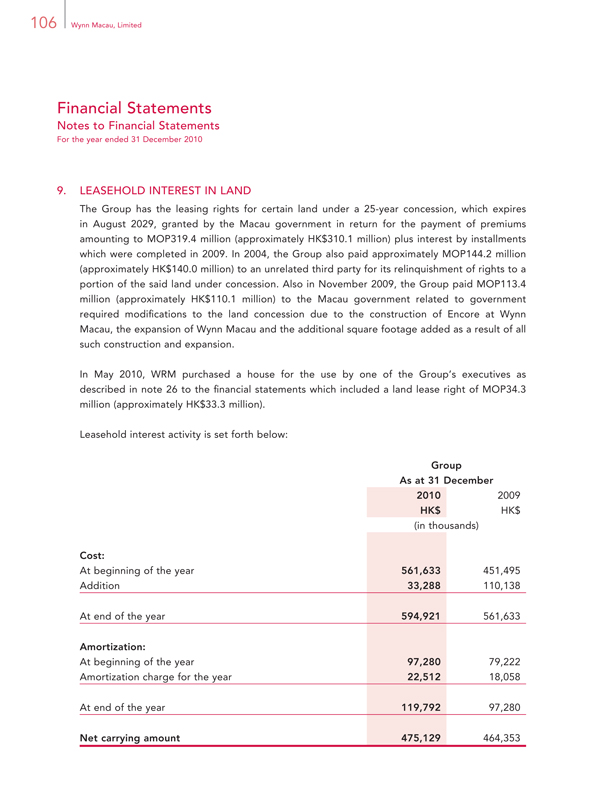
106 Wynn Macau, Limited Financial Statements Notes to Financial Statements For the year ended 31 December 2010 9. LEASEHOLD INTEREST IN LAND The Group has the leasing rights for certain land under a 25-year concession, which expires in August 2029, granted by the Macau government in return for the payment of premiums amounting to MOP319.4 million (approximately HK$310.1 million) plus interest by installments which were completed in 2009. In 2004, the Group also paid approximately MOP144.2 million (approximately HK$140.0 million) to an unrelated third party for its relinquishment of rights to a portion of the said land under concession. Also in November 2009, the Group paid MOP113.4 million (approximately HK$110.1 million) to the Macau government related to government required modifications to the land concession due to the construction of Encore at Wynn Macau, the expansion of Wynn Macau and the additional square footage added as a result of all such construction and expansion. In May 2010, WRM purchased a house for the use by one of the Group’s executives as described in note 26 to the financial statements which included a land lease right of MOP34.3 million (approximately HK$33.3 million). Leasehold interest activity is set forth below: Group As at 31 December 2010 2009 HK$ HK$ (in thousands) Cost: At beginning of the year 561,633 451,495 Addition 33,288 110,138 At end of the year 594,921 561,633 Amortization: At beginning of the year 97,280 79,222 Amortization charge for the year 22,512 18,058 At end of the year 119,792 97,280 Net carrying amount 475,129 464,353
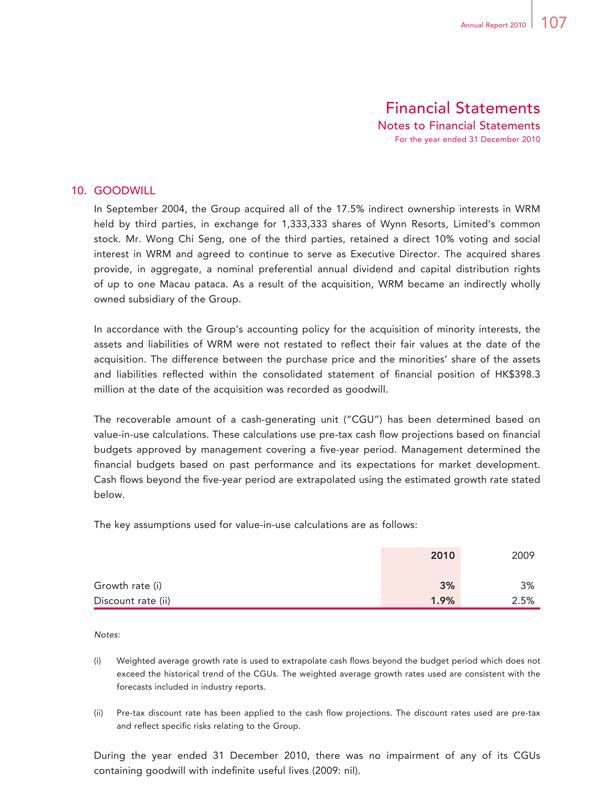
Annual Report 2010 107 Financial Statements Notes to Financial Statements For the year ended 31 December 2010 10. GOODWILL In September 2004, the Group acquired all of the 17.5% indirect ownership interests in WRM held by third parties, in exchange for 1,333,333 shares of Wynn Resorts, Limited’s common stock. Mr. Wong Chi Seng, one of the third parties, retained a direct 10% voting and social interest in WRM and agreed to continue to serve as Executive Director. The acquired shares provide, in aggregate, a nominal preferential annual dividend and capital distribution rights of up to one Macau pataca. As a result of the acquisition, WRM became an indirectly wholly owned subsidiary of the Group. In accordance with the Group’s accounting policy for the acquisition of minority interests, the assets and liabilities of WRM were not restated to reflect their fair values at the date of the acquisition. The difference between the purchase price and the minorities’ share of the assets and liabilities reflected within the consolidated statement of financial position of HK$398.3 million at the date of the acquisition was recorded as goodwill. The recoverable amount of a cash-generating unit (“CGU”) has been determined based on value-in-use calculations. These calculations use pre-tax cash flow projections based on financial budgets approved by management covering a five-year period. Management determined the financial budgets based on past performance and its expectations for market development. Cash flows beyond the five-year period are extrapolated using the estimated growth rate stated below. The key assumptions used for value-in-use calculations are as follows: 2010 2009 Growth rate (i) 3% 3% Discount rate (ii) 1.9% 2.5% Notes: (i) Weighted average growth rate is used to extrapolate cash flows beyond the budget period which does not exceed the historical trend of the CGUs. The weighted average growth rates used are consistent with the forecasts included in industry reports. (ii) Pre-tax discount rate has been applied to the cash flow projections. The discount rates used are pre-tax and reflect specific risks relating to the Group. During the year ended 31 December 2010, there was no impairment of any of its CGUs containing goodwill with indefinite useful lives (2009: nil).
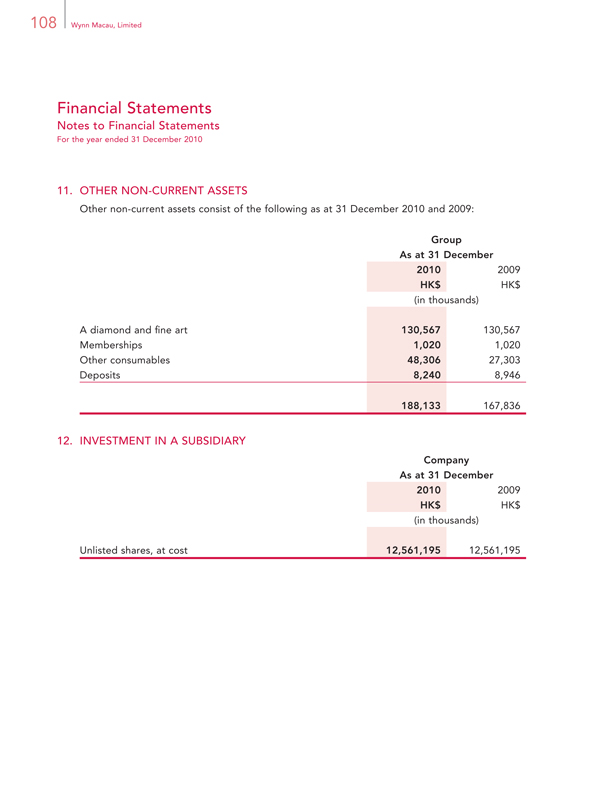
108 Wynn Macau, Limited Financial Statements Notes to Financial Statements For the year ended 31 December 2010 11. OTHER NON-CURRENT ASSETS Other non-current assets consist of the following as at 31 December 2010 and 2009: Group As at 31 December 2010 2009 HK$ HK$ (in thousands) A diamond and fine art 130,567 130,567 Memberships 1,020 1,020 Other consumables 48,306 27,303 Deposits 8,240 8,946 188,133 167,836 12. INVESTMENT IN A SUBSIDIARY Company As at 31 December 2010 2009 HK$ HK$ (in thousands) Unlisted shares, at cost 12,561,195 12,561,195
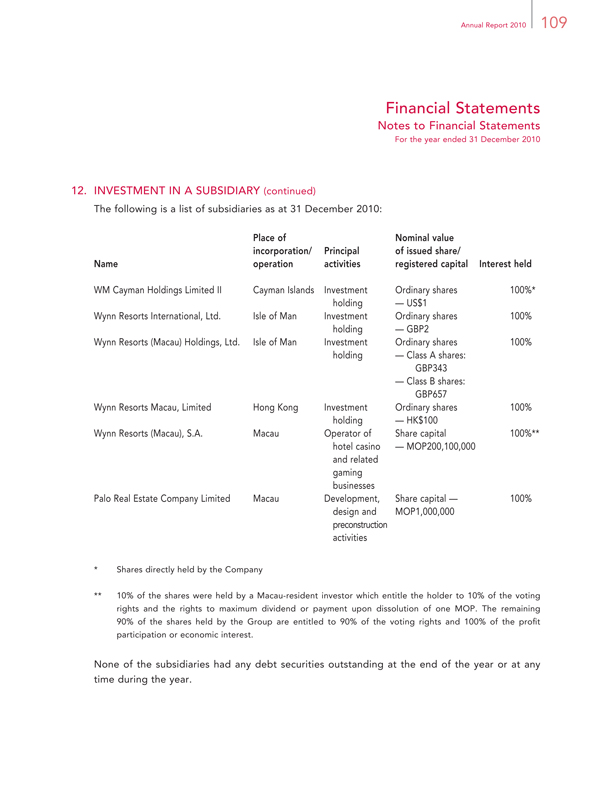
Annual Report 2010 109 Financial Statements Notes to Financial Statements For the year ended 31 December 2010 12. INVESTMENT IN A SUBSIDIARY (continued) The following is a list of subsidiaries as at 31 December 2010: Place of Nominal value incorporation/ Principal of issued share/ Name operation activities registered capital Interest held WM Cayman Holdings Limited II Cayman Islands Investment Ordinary shares 100%* holding — US$1 Wynn Resorts International, Ltd. Isle of Man Investment Ordinary shares 100% holding — GBP2 Wynn Resorts (Macau) Holdings, Ltd. Isle of Man Investment Ordinary shares 100% holding — Class A shares: GBP343 — Class B shares: GBP657 Wynn Resorts Macau, Limited Hong Kong Investment Ordinary shares 100% holding — HK$100 Wynn Resorts (Macau), S.A. Macau Operator of Share capital 100%** hotel casino — MOP200,100,000 and related gaming businesses Palo Real Estate Company Limited Macau Development, Share capital — 100% design and MOP1,000,000 preconstruction activities * Shares directly held by the Company ** 10% of the shares were held by a Macau-resident investor which entitle the holder to 10% of the voting rights and the rights to maximum dividend or payment upon dissolution of one MOP. The remaining 90% of the shares held by the Group are entitled to 90% of the voting rights and 100% of the profit participation or economic interest. None of the subsidiaries had any debt securities outstanding at the end of the year or at any time during the year.
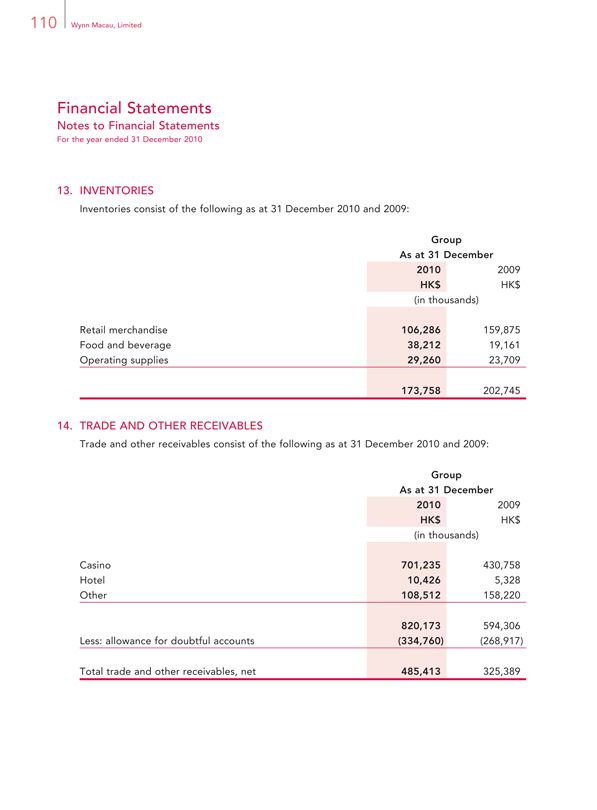
110 Wynn Macau, Limited Financial Statements Notes to Financial Statements For the year ended 31 December 2010 13. INVENTORIES Inventories consist of the following as at 31 December 2010 and 2009: Group As at 31 December 2010 2009 HK$ HK$ (in thousands) Retail merchandise 106,286 159,875 Food and beverage 38,212 19,161 Operating supplies 29,260 23,709 173,758 202,745 14. TRADE AND OTHER RECEIVABLES Trade and other receivables consist of the following as at 31 December 2010 and 2009: Group As at 31 December 2010 2009 HK$ HK$ (in thousands) Casino 701,235 430,758 Hotel 10,426 5,328 Other 108,512 158,220 820,173 594,306 Less: allowance for doubtful accounts (334,760) (268,917) Total trade and other receivables, net 485,413 325,389
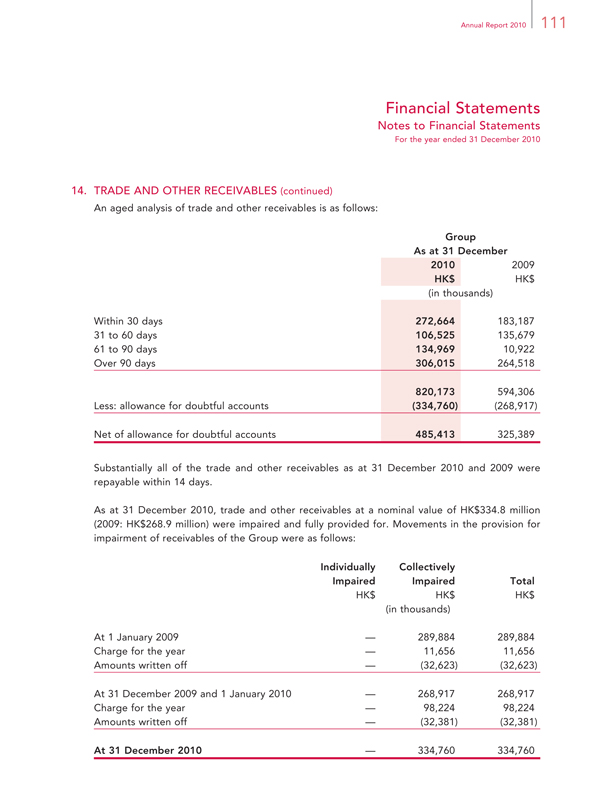
Annual Report 2010 111 Financial Statements Notes to Financial Statements For the year ended 31 December 2010 14. TRADE AND OTHER RECEIVABLES (continued) An aged analysis of trade and other receivables is as follows: Group As at 31 December 2010 2009 HK$ HK$ (in thousands) Within 30 days 272,664 183,187 31 to 60 days 106,525 135,679 61 to 90 days 134,969 10,922 Over 90 days 306,015 264,518 820,173 594,306 Less: allowance for doubtful accounts (334,760) (268,917) Net of allowance for doubtful accounts 485,413 325,389 Substantially all of the trade and other receivables as at 31 December 2010 and 2009 were repayable within 14 days. As at 31 December 2010, trade and other receivables at a nominal value of HK$334.8 million (2009: HK$268.9 million) were impaired and fully provided for. Movements in the provision for impairment of receivables of the Group were as follows: Individually Collectively Impaired Impaired Total HK$ HK$ HK$ (in thousands) At 1 January 2009 — 289,884 289,884 Charge for the year — 11,656 11,656 Amounts written off — (32,623) (32,623) At 31 December 2009 and 1 January 2010 — 268,917 268,917 Charge for the year — 98,224 98,224 Amounts written off — (32,381) (32,381) At 31 December 2010 — 334,760 334,760
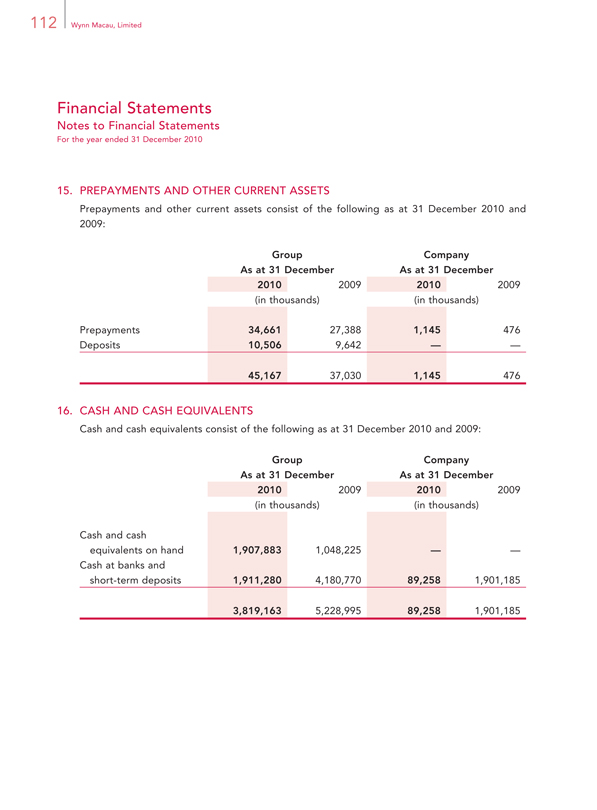
112 Wynn Macau, Limited Financial Statements Notes to Financial Statements For the year ended 31 December 2010 15. PREPAYMENTS AND OTHER CURRENT ASSETS Prepayments and other current assets consist of the following as at 31 December 2010 and 2009: Group Company As at 31 December As at 31 December 2010 2009 2010 2009 (in thousands) (in thousands) Prepayments 34,661 27,388 1,145 476 Deposits 10,506 9,642 — — 45,167 37,030 1,145 476 16. CASH AND CASH EQUIVALENTS Cash and cash equivalents consist of the following as at 31 December 2010 and 2009: Group Company As at 31 December As at 31 December 2010 2009 2010 2009 (in thousands) (in thousands) Cash and cash equivalents on hand 1,907,883 1,048,225 — —Cash at banks and short-term deposits 1,911,280 4,180,770 89,258 1,901,185 3,819,163 5,228,995 89,258 1,901,185
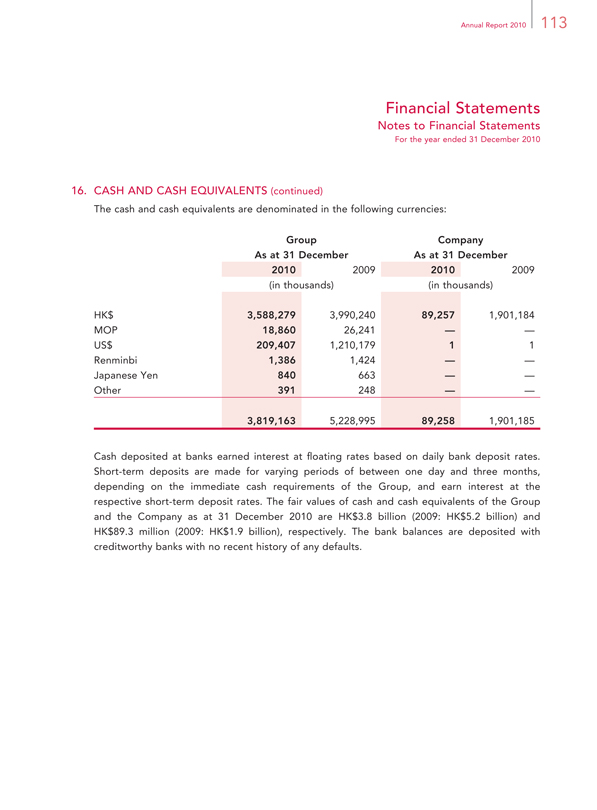
Annual Report 2010 113 Financial Statements Notes to Financial Statements For the year ended 31 December 2010 16. CASH AND CASH EQUIVALENTS (continued) The cash and cash equivalents are denominated in the following currencies: Group Company As at 31 December As at 31 December 2010 2009 2010 2009 (in thousands) (in thousands) HK$ 3,588,279 3,990,240 89,257 1,901,184 MOP 18,860 26,241 — —US$ 209,407 1,210,179 1 1 Renminbi 1,386 1,424 — —Japanese Yen 840 663 — —Other 391 248 — — 3,819,163 5,228,995 89,258 1,901,185 Cash deposited at banks earned interest at floating rates based on daily bank deposit rates. Short-term deposits are made for varying periods of between one day and three months, depending on the immediate cash requirements of the Group, and earn interest at the respective short-term deposit rates. The fair values of cash and cash equivalents of the Group and the Company as at 31 December 2010 are HK$3.8 billion (2009: HK$5.2 billion) and HK$89.3 million (2009: HK$1.9 billion), respectively. The bank balances are deposited with creditworthy banks with no recent history of any defaults.
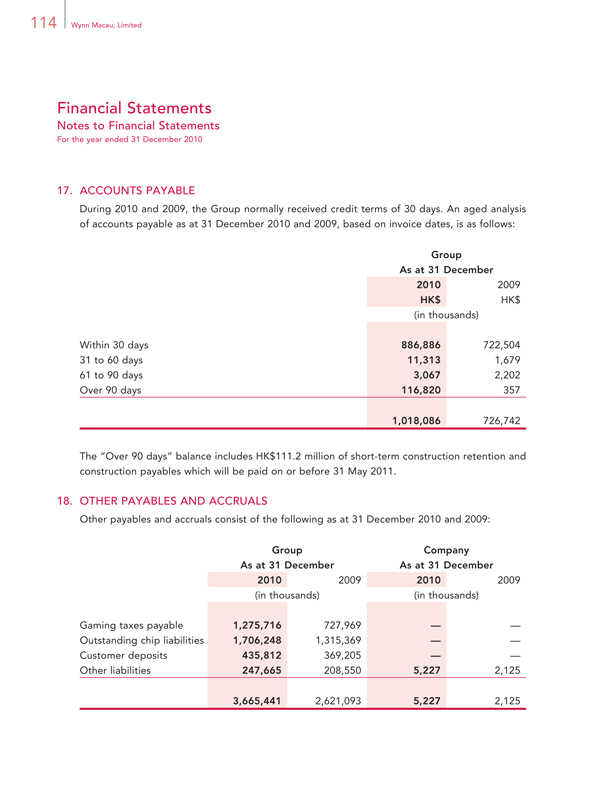
114 Wynn Macau, Limited Financial Statements Notes to Financial Statements For the year ended 31 December 2010 17. ACCOUNTS PAYABLE During 2010 and 2009, the Group normally received credit terms of 30 days. An aged analysis of accounts payable as at 31 December 2010 and 2009, based on invoice dates, is as follows: Group As at 31 December 2010 2009 HK$ HK$ (in thousands) Within 30 days 886,886 722,504 31 to 60 days 11,313 1,679 61 to 90 days 3,067 2,202 Over 90 days 116,820 357 1,018,086 726,742 The “Over 90 days” balance includes HK$111.2 million of short-term construction retention and construction payables which will be paid on or before 31 May 2011. 18. OTHER PAYABLES AND ACCRUALS Other payables and accruals consist of the following as at 31 December 2010 and 2009: Group Company As at 31 December As at 31 December 2010 2009 2010 2009 (in thousands) (in thousands) Gaming taxes payable 1,275,716 727,969 — —Outstanding chip liabilities 1,706,248 1,315,369 — —Customer deposits 435,812 369,205 — —Other liabilities 247,665 208,550 5,227 2,125 3,665,441 2,621,093 5,227 2,125
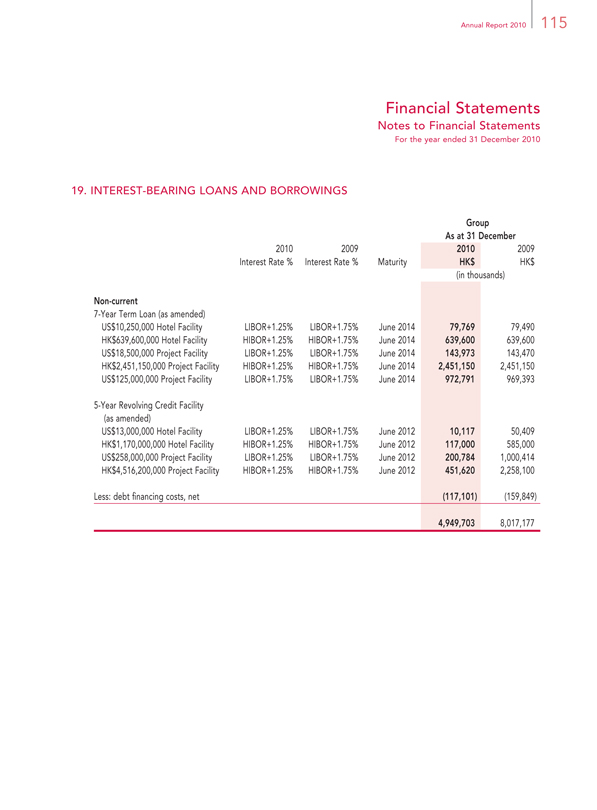
Annual Report 2010 115 Financial Statements Notes to Financial Statements For the year ended 31 December 2010 19. INTEREST-BEARING LOANS AND BORROWINGS Group As at 31 December 2010 2009 2010 2009 Interest Rate % Interest Rate % Maturity HK$ HK$ (in thousands) Non-current 7-Year Term Loan (as amended) US$10,250,000 Hotel Facility LIBOR+1.25% LIBOR+1.75% June 2014 79,769 79,490 HK$639,600,000 Hotel Facility HIBOR+1.25% HIBOR+1.75% June 2014 639,600 639,600 US$18,500,000 Project Facility LIBOR+1.25% LIBOR+1.75% June 2014 143,973 143,470 HK$2,451,150,000 Project Facility HIBOR+1.25% HIBOR+1.75% June 2014 2,451,150 2,451,150 US$125,000,000 Project Facility LIBOR+1.75% LIBOR+1.75% June 2014 972,791 969,393 5-Year Revolving Credit Facility (as amended) US$13,000,000 Hotel Facility LIBOR+1.25% LIBOR+1.75% June 2012 10,117 50,409 HK$1,170,000,000 Hotel Facility HIBOR+1.25% HIBOR+1.75% June 2012 117,000 585,000 US$258,000,000 Project Facility LIBOR+1.25% LIBOR+1.75% June 2012 200,784 1,000,414 HK$4,516,200,000 Project Facility HIBOR+1.25% HIBOR+1.75% June 2012 451,620 2,258,100 Less: debt financing costs, net (117,101) (159,849) 4,949,703 8,017,177
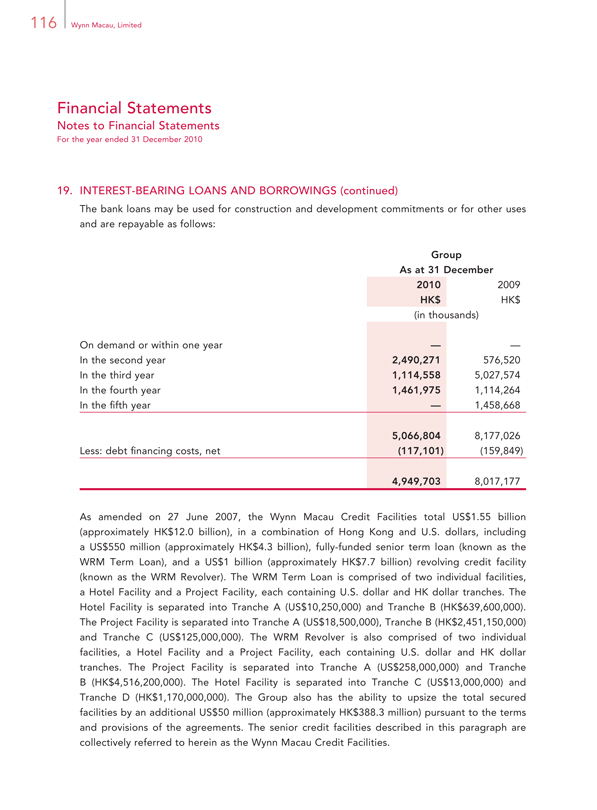
116 Wynn Macau, Limited Financial Statements Notes to Financial Statements For the year ended 31 December 2010 19. INTEREST-BEARING LOANS AND BORROWINGS (continued) The bank loans may be used for construction and development commitments or for other uses and are repayable as follows: Group As at 31 December 2010 2009 HK$ HK$ (in thousands) On demand or within one year — —In the second year 2,490,271 576,520 In the third year 1,114,558 5,027,574 In the fourth year 1,461,975 1,114,264 In the fifth year — 1,458,668 5,066,804 8,177,026 Less: debt financing costs, net (117,101) (159,849) 4,949,703 8,017,177 As amended on 27 June 2007, the Wynn Macau Credit Facilities total US$1.55 billion (approximately HK$12.0 billion), in a combination of Hong Kong and U.S. dollars, including a US$550 million (approximately HK$4.3 billion), fully-funded senior term loan (known as the WRM Term Loan), and a US$1 billion (approximately HK$7.7 billion) revolving credit facility (known as the WRM Revolver). The WRM Term Loan is comprised of two individual facilities, a Hotel Facility and a Project Facility, each containing U.S. dollar and HK dollar tranches. The Hotel Facility is separated into Tranche A (US$10,250,000) and Tranche B (HK$639,600,000). The Project Facility is separated into Tranche A (US$18,500,000), Tranche B (HK$2,451,150,000) and Tranche C (US$125,000,000). The WRM Revolver is also comprised of two individual facilities, a Hotel Facility and a Project Facility, each containing U.S. dollar and HK dollar tranches. The Project Facility is separated into Tranche A (US$258,000,000) and Tranche B (HK$4,516,200,000). The Hotel Facility is separated into Tranche C (US$13,000,000) and Tranche D (HK$1,170,000,000). The Group also has the ability to upsize the total secured facilities by an additional US$50 million (approximately HK$388.3 million) pursuant to the terms and provisions of the agreements. The senior credit facilities described in this paragraph are collectively referred to herein as the Wynn Macau Credit Facilities.
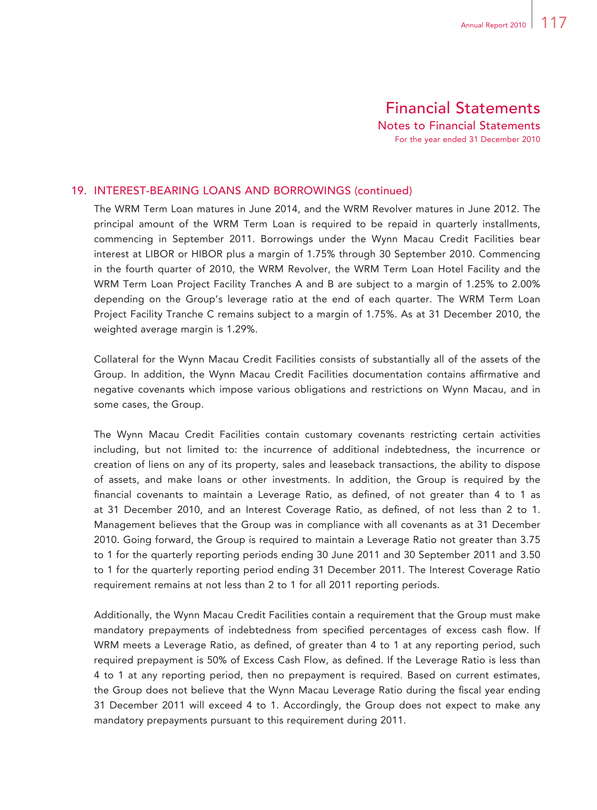
Annual Report 2010 117 Financial Statements Notes to Financial Statements For the year ended 31 December 2010 19. INTEREST-BEARING LOANS AND BORROWINGS (continued) The WRM Term Loan matures in June 2014, and the WRM Revolver matures in June 2012. The principal amount of the WRM Term Loan is required to be repaid in quarterly installments, commencing in September 2011. Borrowings under the Wynn Macau Credit Facilities bear interest at LIBOR or HIBOR plus a margin of 1.75% through 30 September 2010. Commencing in the fourth quarter of 2010, the WRM Revolver, the WRM Term Loan Hotel Facility and the WRM Term Loan Project Facility Tranches A and B are subject to a margin of 1.25% to 2.00% depending on the Group’s leverage ratio at the end of each quarter. The WRM Term Loan Project Facility Tranche C remains subject to a margin of 1.75%. As at 31 December 2010, the weighted average margin is 1.29%. Collateral for the Wynn Macau Credit Facilities consists of substantially all of the assets of the Group. In addition, the Wynn Macau Credit Facilities documentation contains affirmative and negative covenants which impose various obligations and restrictions on Wynn Macau, and in some cases, the Group. The Wynn Macau Credit Facilities contain customary covenants restricting certain activities including, but not limited to: the incurrence of additional indebtedness, the incurrence or creation of liens on any of its property, sales and leaseback transactions, the ability to dispose of assets, and make loans or other investments. In addition, the Group is required by the financial covenants to maintain a Leverage Ratio, as defined, of not greater than 4 to 1 as at 31 December 2010, and an Interest Coverage Ratio, as defined, of not less than 2 to 1. Management believes that the Group was in compliance with all covenants as at 31 December 2010. Going forward, the Group is required to maintain a Leverage Ratio not greater than 3.75 to 1 for the quarterly reporting periods ending 30 June 2011 and 30 September 2011 and 3.50 to 1 for the quarterly reporting period ending 31 December 2011. The Interest Coverage Ratio requirement remains at not less than 2 to 1 for all 2011 reporting periods. Additionally, the Wynn Macau Credit Facilities contain a requirement that the Group must make mandatory prepayments of indebtedness from specified percentages of excess cash flow. If WRM meets a Leverage Ratio, as defined, of greater than 4 to 1 at any reporting period, such required prepayment is 50% of Excess Cash Flow, as defined. If the Leverage Ratio is less than 4 to 1 at any reporting period, then no prepayment is required. Based on current estimates, the Group does not believe that the Wynn Macau Leverage Ratio during the fiscal year ending 31 December 2011 will exceed 4 to 1. Accordingly, the Group does not expect to make any mandatory prepayments pursuant to this requirement during 2011.
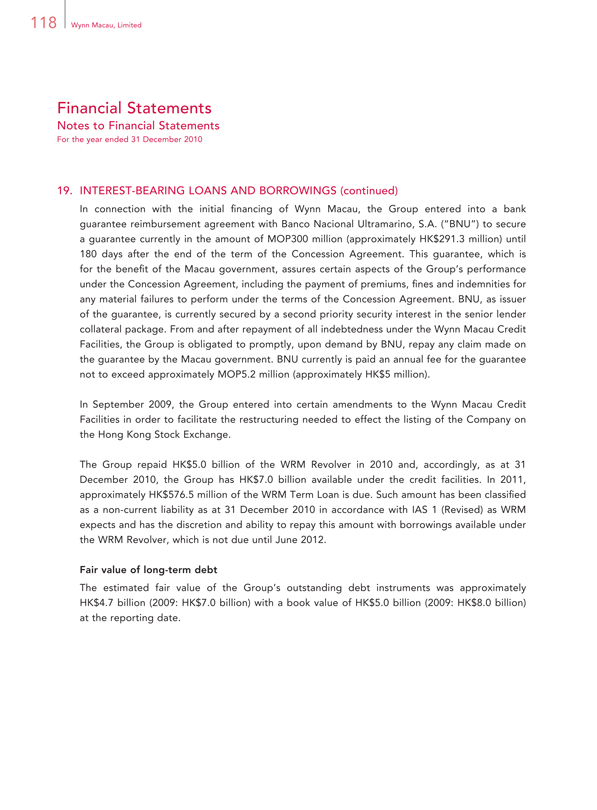
118 Wynn Macau, Limited Financial Statements Notes to Financial Statements For the year ended 31 December 2010 19. INTEREST-BEARING LOANS AND BORROWINGS (continued) In connection with the initial financing of Wynn Macau, the Group entered into a bank guarantee reimbursement agreement with Banco Nacional Ultramarino, S.A. (“BNU”) to secure a guarantee currently in the amount of MOP300 million (approximately HK$291.3 million) until 180 days after the end of the term of the Concession Agreement. This guarantee, which is for the benefit of the Macau government, assures certain aspects of the Group’s performance under the Concession Agreement, including the payment of premiums, fines and indemnities for any material failures to perform under the terms of the Concession Agreement. BNU, as issuer of the guarantee, is currently secured by a second priority security interest in the senior lender collateral package. From and after repayment of all indebtedness under the Wynn Macau Credit Facilities, the Group is obligated to promptly, upon demand by BNU, repay any claim made on the guarantee by the Macau government. BNU currently is paid an annual fee for the guarantee not to exceed approximately MOP5.2 million (approximately HK$5 million). In September 2009, the Group entered into certain amendments to the Wynn Macau Credit Facilities in order to facilitate the restructuring needed to effect the listing of the Company on the Hong Kong Stock Exchange. The Group repaid HK$5.0 billion of the WRM Revolver in 2010 and, accordingly, as at 31 December 2010, the Group has HK$7.0 billion available under the credit facilities. In 2011, approximately HK$576.5 million of the WRM Term Loan is due. Such amount has been classified as a non-current liability as at 31 December 2010 in accordance with IAS 1 (Revised) as WRM expects and has the discretion and ability to repay this amount with borrowings available under the WRM Revolver, which is not due until June 2012. Fair value of long-term debt The estimated fair value of the Group’s outstanding debt instruments was approximately HK$4.7 billion (2009: HK$7.0 billion) with a book value of HK$5.0 billion (2009: HK$8.0 billion) at the reporting date.
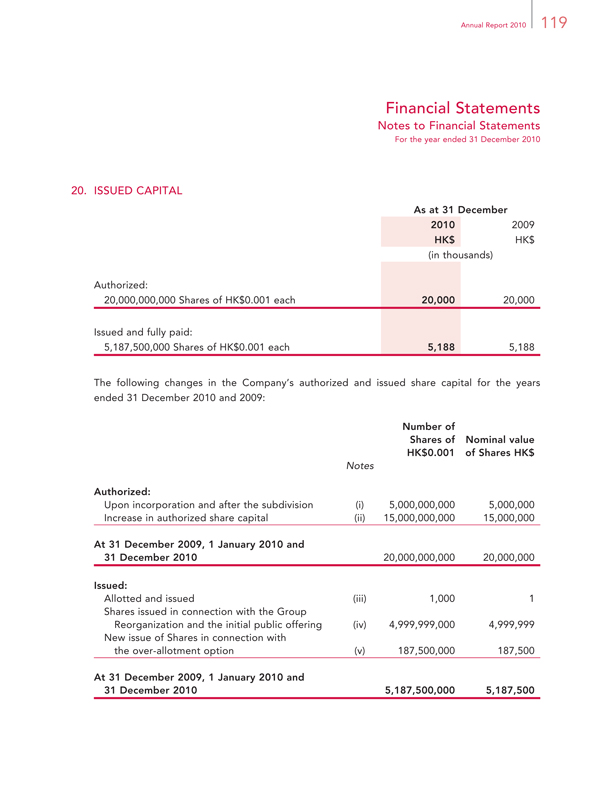
Annual Report 2010 119 Financial Statements Notes to Financial Statements For the year ended 31 December 2010 20. ISSUED CAPITAL As at 31 December 2010 2009 HK$ HK$ (in thousands) Authorized: 20,000,000,000 Shares of HK$0.001 each 20,000 20,000 Issued and fully paid: 5,187,500,000 Shares of HK$0.001 each 5,188 5,188 The following changes in the Company’s authorized and issued share capital for the years ended 31 December 2010 and 2009: Number of Shares of Nominal value HK$0.001 of Shares HK$ Notes Authorized: Upon incorporation and after the subdivision (i) 5,000,000,000 5,000,000 Increase in authorized share capital (ii) 15,000,000,000 15,000,000 At 31 December 2009, 1 January 2010 and 31 December 2010 20,000,000,000 20,000,000 Issued: Allotted and issued (iii) 1,000 1 Shares issued in connection with the Group Reorganization and the initial public offering (iv) 4,999,999,000 4,999,999 New issue of Shares in connection with the over-allotment option (v) 187,500,000 187,500 At 31 December 2009, 1 January 2010 and 31 December 2010 5,187,500,000 5,187,500
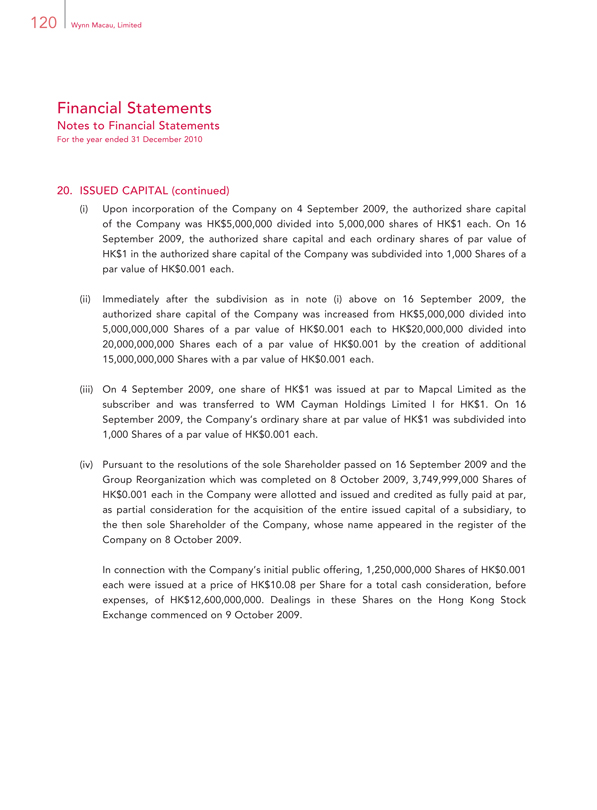
120 Wynn Macau, Limited Financial Statements Notes to Financial Statements For the year ended 31 December 2010 20. ISSUED CAPITAL (continued) (i) Upon incorporation of the Company on 4 September 2009, the authorized share capital of the Company was HK$5,000,000 divided into 5,000,000 shares of HK$1 each. On 16 September 2009, the authorized share capital and each ordinary shares of par value of HK$1 in the authorized share capital of the Company was subdivided into 1,000 Shares of a par value of HK$0.001 each. (ii) Immediately after the subdivision as in note (i) above on 16 September 2009, the authorized share capital of the Company was increased from HK$5,000,000 divided into 5,000,000,000 Shares of a par value of HK$0.001 each to HK$20,000,000 divided into 20,000,000,000 Shares each of a par value of HK$0.001 by the creation of additional 15,000,000,000 Shares with a par value of HK$0.001 each. (iii) On 4 September 2009, one share of HK$1 was issued at par to Mapcal Limited as the subscriber and was transferred to WM Cayman Holdings Limited I for HK$1. On 16 September 2009, the Company’s ordinary share at par value of HK$1 was subdivided into 1,000 Shares of a par value of HK$0.001 each. (iv) Pursuant to the resolutions of the sole Shareholder passed on 16 September 2009 and the Group Reorganization which was completed on 8 October 2009, 3,749,999,000 Shares of HK$0.001 each in the Company were allotted and issued and credited as fully paid at par, as partial consideration for the acquisition of the entire issued capital of a subsidiary, to the then sole Shareholder of the Company, whose name appeared in the register of the Company on 8 October 2009. In connection with the Company’s initial public offering, 1,250,000,000 Shares of HK$0.001 each were issued at a price of HK$10.08 per Share for a total cash consideration, before expenses, of HK$12,600,000,000. Dealings in these Shares on the Hong Kong Stock Exchange commenced on 9 October 2009.
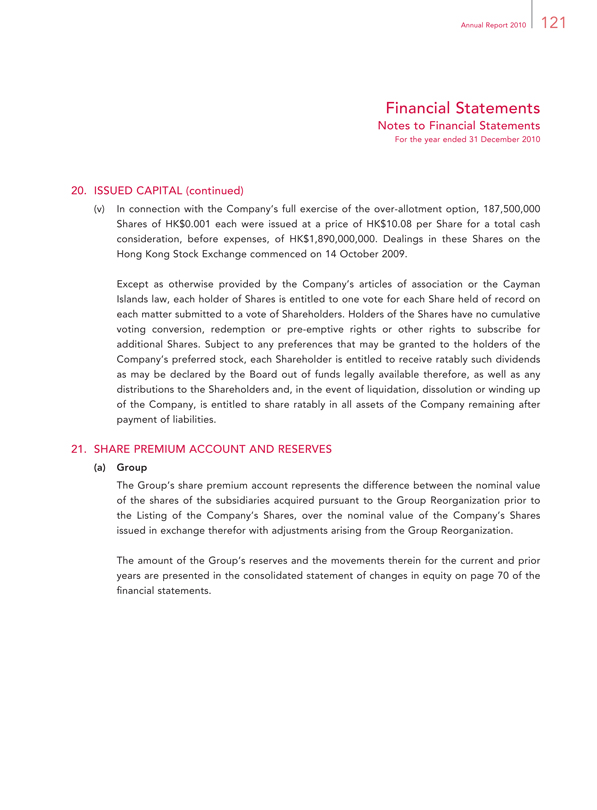
Annual Report 2010 121 Financial Statements Notes to Financial Statements For the year ended 31 December 2010 20. ISSUED CAPITAL (continued) (v) In connection with the Company’s full exercise of the over-allotment option, 187,500,000 Shares of HK$0.001 each were issued at a price of HK$10.08 per Share for a total cash consideration, before expenses, of HK$1,890,000,000. Dealings in these Shares on the Hong Kong Stock Exchange commenced on 14 October 2009. Except as otherwise provided by the Company’s articles of association or the Cayman Islands law, each holder of Shares is entitled to one vote for each Share held of record on each matter submitted to a vote of Shareholders. Holders of the Shares have no cumulative voting conversion, redemption or pre-emptive rights or other rights to subscribe for additional Shares. Subject to any preferences that may be granted to the holders of the Company’s preferred stock, each Shareholder is entitled to receive ratably such dividends as may be declared by the Board out of funds legally available therefore, as well as any distributions to the Shareholders and, in the event of liquidation, dissolution or winding up of the Company, is entitled to share ratably in all assets of the Company remaining after payment of liabilities. 21. SHARE PREMIUM ACCOUNT AND RESERVES (a) Group The Group’s share premium account represents the difference between the nominal value of the shares of the subsidiaries acquired pursuant to the Group Reorganization prior to the Listing of the Company’s Shares, over the nominal value of the Company’s Shares issued in exchange therefor with adjustments arising from the Group Reorganization. The amount of the Group’s reserves and the movements therein for the current and prior years are presented in the consolidated statement of changes in equity on page 70 of the financial statements.
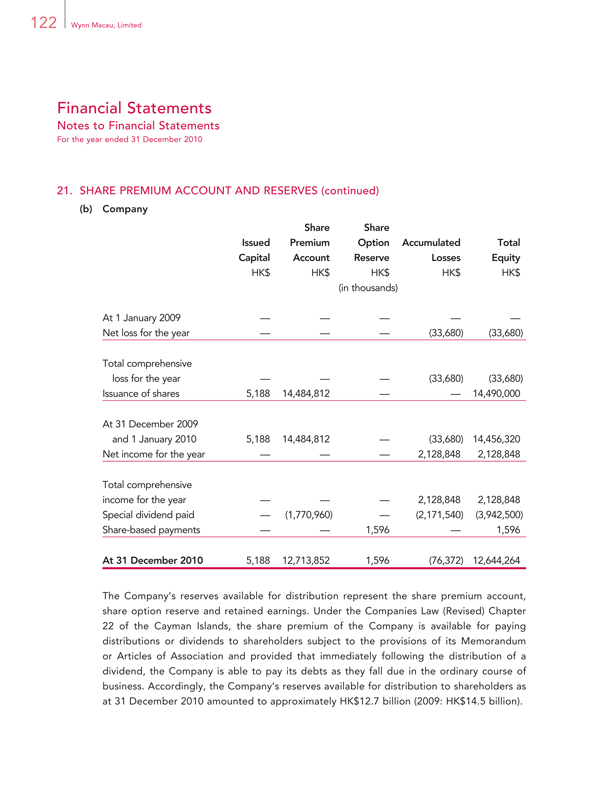
122 Wynn Macau, Limited Financial Statements Notes to Financial Statements For the year ended 31 December 2010 21. SHARE PREMIUM ACCOUNT AND RESERVES (continued) (b) Company Share Share Issued Premium Option Accumulated Total Capital Account Reserve Losses Equity HK$ HK$ HK$ HK$ HK$ (in thousands) At 1 January 2009 — — — — —Net loss for the year — — — (33,680) (33,680) Total comprehensive loss for the year — — — (33,680) (33,680) Issuance of shares 5,188 14,484,812 — — 14,490,000 At 31 December 2009 and 1 January 2010 5,188 14,484,812 — (33,680) 14,456,320 Net income for the year — — — 2,128,848 2,128,848 Total comprehensive income for the year — — — 2,128,848 2,128,848 Special dividend paid — (1,770,960) — (2,171,540) (3,942,500) Share-based payments — — 1,596 — 1,596 At 31 December 2010 5,188 12,713,852 1,596 (76,372) 12,644,264 The Company’s reserves available for distribution represent the share premium account, share option reserve and retained earnings. Under the Companies Law (Revised) Chapter 22 of the Cayman Islands, the share premium of the Company is available for paying distributions or dividends to shareholders subject to the provisions of its Memorandum or Articles of Association and provided that immediately following the distribution of a dividend, the Company is able to pay its debts as they fall due in the ordinary course of business. Accordingly, the Company’s reserves available for distribution to shareholders as at 31 December 2010 amounted to approximately HK$12.7 billion (2009: HK$14.5 billion).
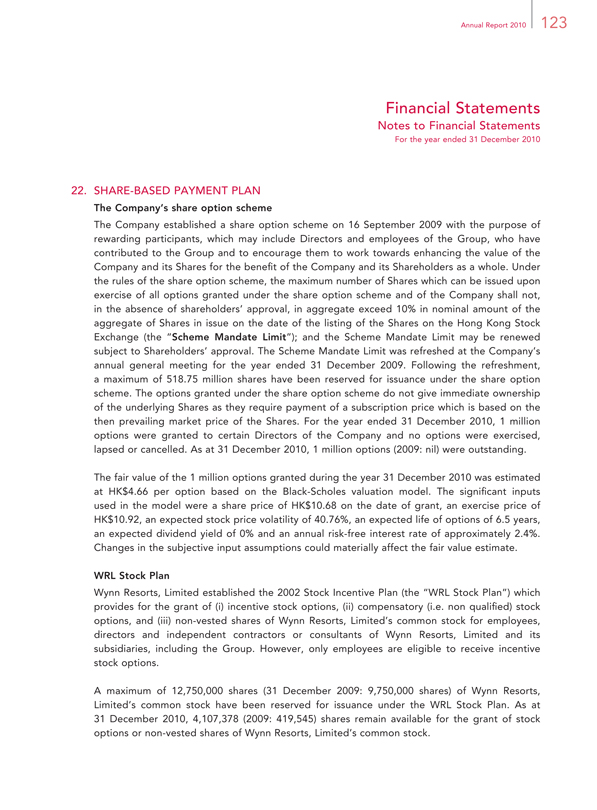
Annual Report 2010 123 Financial Statements Notes to Financial Statements For the year ended 31 December 2010 22. SHARE-BASED PAYMENT PLAN The Company’s share option scheme The Company established a share option scheme on 16 September 2009 with the purpose of rewarding participants, which may include Directors and employees of the Group, who have contributed to the Group and to encourage them to work towards enhancing the value of the Company and its Shares for the benefit of the Company and its Shareholders as a whole. Under the rules of the share option scheme, the maximum number of Shares which can be issued upon exercise of all options granted under the share option scheme and of the Company shall not, in the absence of shareholders’ approval, in aggregate exceed 10% in nominal amount of the aggregate of Shares in issue on the date of the listing of the Shares on the Hong Kong Stock Exchange (the “Scheme Mandate Limit”); and the Scheme Mandate Limit may be renewed subject to Shareholders’ approval. The Scheme Mandate Limit was refreshed at the Company’s annual general meeting for the year ended 31 December 2009. Following the refreshment, a maximum of 518.75 million shares have been reserved for issuance under the share option scheme. The options granted under the share option scheme do not give immediate ownership of the underlying Shares as they require payment of a subscription price which is based on the then prevailing market price of the Shares. For the year ended 31 December 2010, 1 million options were granted to certain Directors of the Company and no options were exercised, lapsed or cancelled. As at 31 December 2010, 1 million options (2009: nil) were outstanding. The fair value of the 1 million options granted during the year 31 December 2010 was estimated at HK$4.66 per option based on the Black-Scholes valuation model. The significant inputs used in the model were a share price of HK$10.68 on the date of grant, an exercise price of HK$10.92, an expected stock price volatility of 40.76%, an expected life of options of 6.5 years, an expected dividend yield of 0% and an annual risk-free interest rate of approximately 2.4%. Changes in the subjective input assumptions could materially affect the fair value estimate. WRL Stock Plan Wynn Resorts, Limited established the 2002 Stock Incentive Plan (the “WRL Stock Plan”) which provides for the grant of (i) incentive stock options, (ii) compensatory (i.e. non qualified) stock options, and (iii) non-vested shares of Wynn Resorts, Limited’s common stock for employees, directors and independent contractors or consultants of Wynn Resorts, Limited and its subsidiaries, including the Group. However, only employees are eligible to receive incentive stock options. A maximum of 12,750,000 shares (31 December 2009: 9,750,000 shares) of Wynn Resorts, Limited’s common stock have been reserved for issuance under the WRL Stock Plan. As at 31 December 2010, 4,107,378 (2009: 419,545) shares remain available for the grant of stock options or non-vested shares of Wynn Resorts, Limited’s common stock.
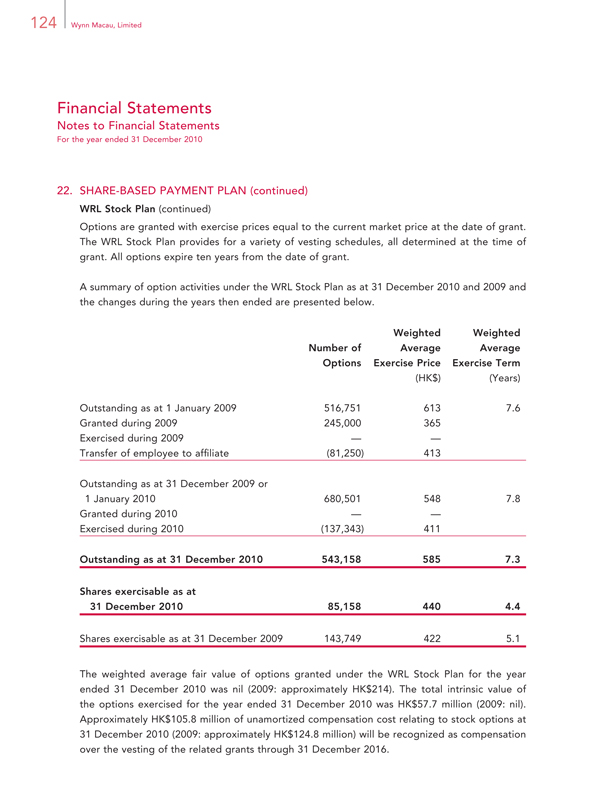
124 Wynn Macau, Limited Financial Statements Notes to Financial Statements For the year ended 31 December 2010 22. SHARE-BASED PAYMENT PLAN (continued) WRL Stock Plan (continued) Options are granted with exercise prices equal to the current market price at the date of grant. The WRL Stock Plan provides for a variety of vesting schedules, all determined at the time of grant. All options expire ten years from the date of grant. A summary of option activities under the WRL Stock Plan as at 31 December 2010 and 2009 and the changes during the years then ended are presented below. Weighted Weighted Number of Average Average Options Exercise Price Exercise Term (HK$) (Years) Outstanding as at 1 January 2009 516,751 613 7.6 Granted during 2009 245,000 365 Exercised during 2009 — —Transfer of employee to affiliate (81,250) 413 Outstanding as at 31 December 2009 or 1 January 2010 680,501 548 7.8 Granted during 2010 — —Exercised during 2010 (137,343) 411 Outstanding as at 31 December 2010 543,158 585 7.3 Shares exercisable as at 31 December 2010 85,158 440 4.4 Shares exercisable as at 31 December 2009 143,749 422 5.1 The weighted average fair value of options granted under the WRL Stock Plan for the year ended 31 December 2010 was nil (2009: approximately HK$214). The total intrinsic value of the options exercised for the year ended 31 December 2010 was HK$57.7 million (2009: nil). Approximately HK$105.8 million of unamortized compensation cost relating to stock options at 31 December 2010 (2009: approximately HK$124.8 million) will be recognized as compensation over the vesting of the related grants through 31 December 2016.
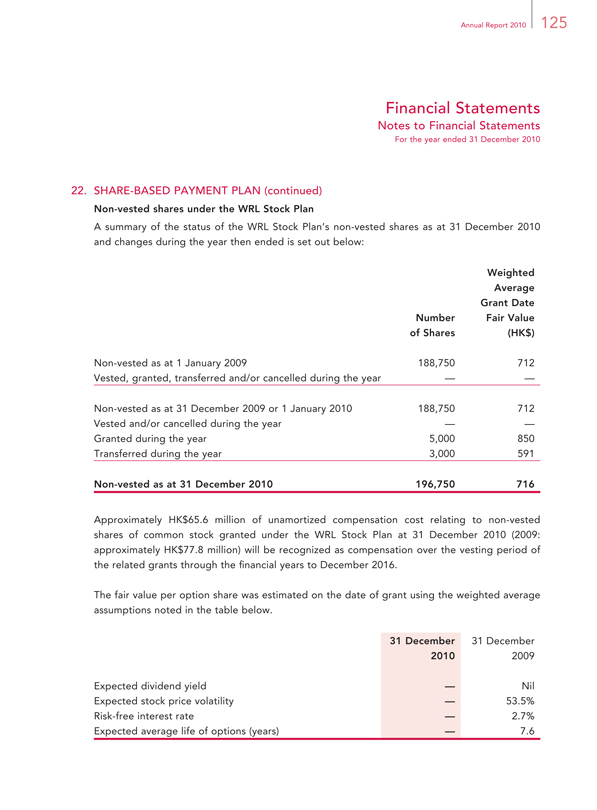
Annual Report 2010 125 Financial Statements Notes to Financial Statements For the year ended 31 December 2010 22. SHARE-BASED PAYMENT PLAN (continued) Non-vested shares under the WRL Stock Plan A summary of the status of the WRL Stock Plan’s non-vested shares as at 31 December 2010 and changes during the year then ended is set out below: Weighted Average Grant Date Number Fair Value of Shares (HK$) Non-vested as at 1 January 2009 188,750 712 Vested, granted, transferred and/or cancelled during the year — — Non-vested as at 31 December 2009 or 1 January 2010 188,750 712 Vested and/or cancelled during the year — —Granted during the year 5,000 850 Transferred during the year 3,000 591 Non-vested as at 31 December 2010 196,750 716 Approximately HK$65.6 million of unamortized compensation cost relating to non-vested shares of common stock granted under the WRL Stock Plan at 31 December 2010 (2009: approximately HK$77.8 million) will be recognized as compensation over the vesting period of the related grants through the financial years to December 2016. The fair value per option share was estimated on the date of grant using the weighted average assumptions noted in the table below. 31 December 31 December 2010 2009 Expected dividend yield — Nil Expected stock price volatility — 53.5% Risk-free interest rate — 2.7% Expected average life of options (years) — 7.6
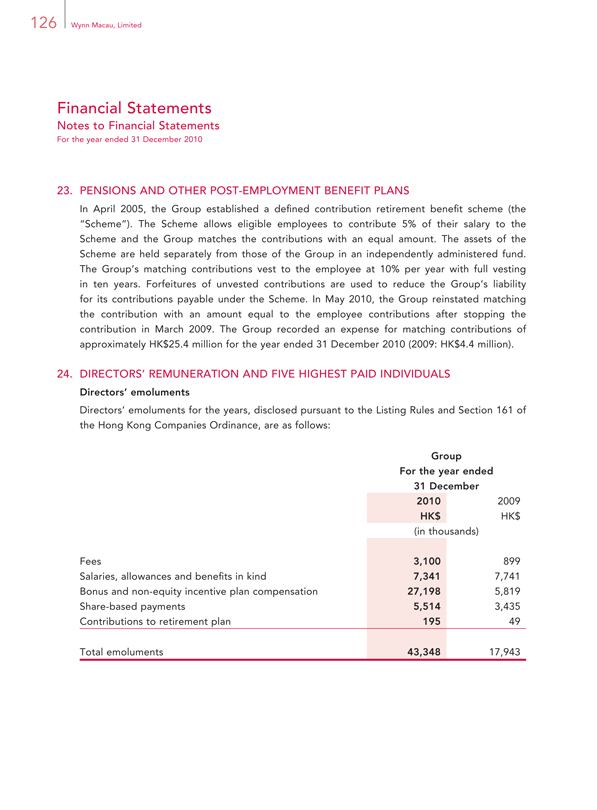
126 Wynn Macau, Limited Financial Statements Notes to Financial Statements For the year ended 31 December 2010 23. PENSIONS AND OTHER POST-EMPLOYMENT BENEFIT PLANS In April 2005, the Group established a defined contribution retirement benefit scheme (the “Scheme”). The Scheme allows eligible employees to contribute 5% of their salary to the Scheme and the Group matches the contributions with an equal amount. The assets of the Scheme are held separately from those of the Group in an independently administered fund. The Group’s matching contributions vest to the employee at 10% per year with full vesting in ten years. Forfeitures of unvested contributions are used to reduce the Group’s liability for its contributions payable under the Scheme. In May 2010, the Group reinstated matching the contribution with an amount equal to the employee contributions after stopping the contribution in March 2009. The Group recorded an expense for matching contributions of approximately HK$25.4 million for the year ended 31 December 2010 (2009: HK$4.4 million). 24. DIRECTORS’ REMUNERATION AND FIVE HIGHEST PAID INDIVIDUALS Directors’ emoluments Directors’ emoluments for the years, disclosed pursuant to the Listing Rules and Section 161 of the Hong Kong Companies Ordinance, are as follows: Group For the year ended 31 December 2010 2009 HK$ HK$ (in thousands) Fees 3,100 899 Salaries, allowances and benefits in kind 7,341 7,741 Bonus and non-equity incentive plan compensation 27,198 5,819 Share-based payments 5,514 3,435 Contributions to retirement plan 195 49 Total emoluments 43,348 17,943
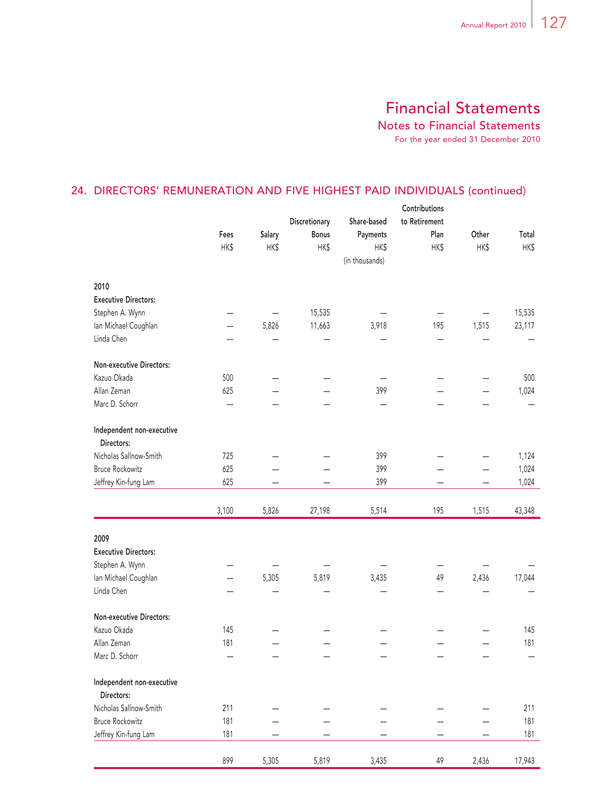
Annual Report 2010 127 Financial Statements Notes to Financial Statements For the year ended 31 December 2010 24. DIRECTORS’ REMUNERATION AND FIVE HIGHEST PAID INDIVIDUALS (continued) Contributions Discretionary Share-based to Retirement Fees Salary Bonus Payments Plan Other Total HK$ HK$ HK$ HK$ HK$ HK$ HK$ (in thousands) 2010 Executive Directors: Stephen A. Wynn — — 15,535 — — — 15,535 Ian Michael Coughlan — 5,826 11,663 3,918 195 1,515 23,117 Linda Chen — — — — — — — Non-executive Directors: Kazuo Okada 500 — — — — — 500 Allan Zeman 625 — — 399 — — 1,024 Marc D. Schorr — — — — — — — Independent non-executive Directors: Nicholas Sallnow-Smith 725 — — 399 — — 1,124 Bruce Rockowitz 625 — — 399 — — 1,024 Jeffrey Kin-fung Lam 625 — — 399 — — 1,024 3,100 5,826 27,198 5,514 195 1,515 43,348 2009 Executive Directors: Stephen A. Wynn — — — — — — —Ian Michael Coughlan — 5,305 5,819 3,435 49 2,436 17,044 Linda Chen — — — — — — — Non-executive Directors: Kazuo Okada 145 — — — — — 145 Allan Zeman 181 — — — — — 181 Marc D. Schorr — — — — — — — Independent non-executive Directors: Nicholas Sallnow-Smith 211 — — — — — 211 Bruce Rockowitz 181 — — — — — 181 Jeffrey Kin-fung Lam 181 — — — — — 181 899 5,305 5,819 3,435 49 2,436 17,943
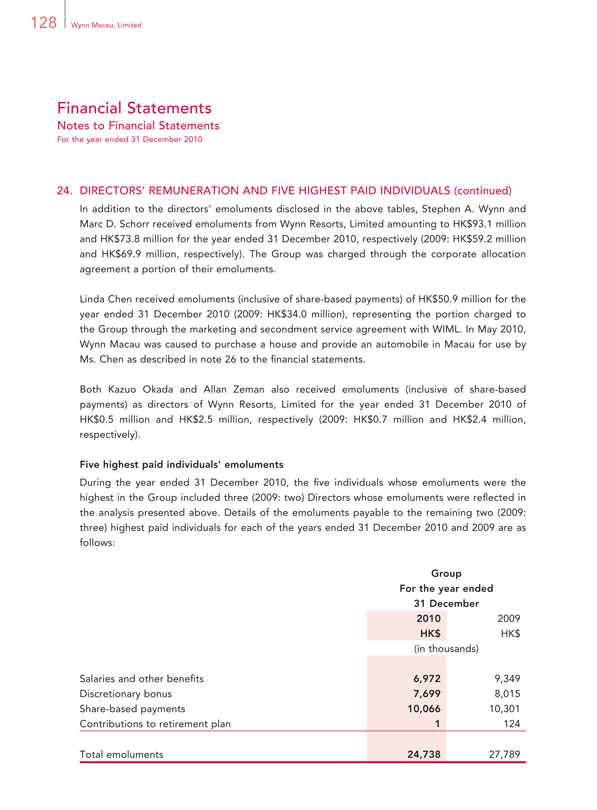
128 Wynn Macau, Limited Financial Statements Notes to Financial Statements For the year ended 31 December 2010 24. DIRECTORS’ REMUNERATION AND FIVE HIGHEST PAID INDIVIDUALS (continued) In addition to the directors’ emoluments disclosed in the above tables, Stephen A. Wynn and Marc D. Schorr received emoluments from Wynn Resorts, Limited amounting to HK$93.1 million and HK$73.8 million for the year ended 31 December 2010, respectively (2009: HK$59.2 million and HK$69.9 million, respectively). The Group was charged through the corporate allocation agreement a portion of their emoluments. Linda Chen received emoluments (inclusive of share-based payments) of HK$50.9 million for the year ended 31 December 2010 (2009: HK$34.0 million), representing the portion charged to the Group through the marketing and secondment service agreement with WIML. In May 2010, Wynn Macau was caused to purchase a house and provide an automobile in Macau for use by Ms. Chen as described in note 26 to the financial statements. Both Kazuo Okada and Allan Zeman also received emoluments (inclusive of share-based payments) as directors of Wynn Resorts, Limited for the year ended 31 December 2010 of HK$0.5 million and HK$2.5 million, respectively (2009: HK$0.7 million and HK$2.4 million, respectively). Five highest paid individuals’ emoluments During the year ended 31 December 2010, the five individuals whose emoluments were the highest in the Group included three (2009: two) Directors whose emoluments were reflected in the analysis presented above. Details of the emoluments payable to the remaining two (2009: three) highest paid individuals for each of the years ended 31 December 2010 and 2009 are as follows: Group For the year ended 31 December 2010 2009 HK$ HK$ (in thousands) Salaries and other benefits 6,972 9,349 Discretionary bonus 7,699 8,015 Share-based payments 10,066 10,301 Contributions to retirement plan 1 124 Total emoluments 24,738 27,789
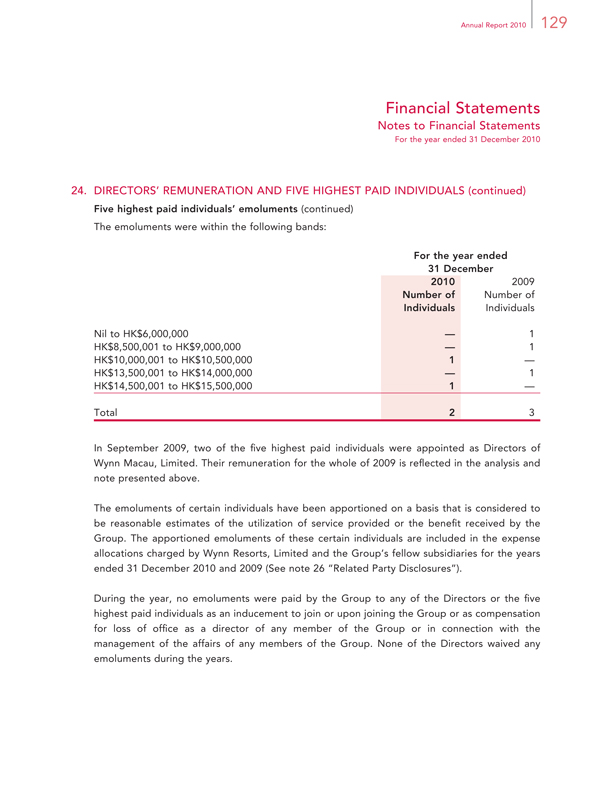
Annual Report 2010 129 Financial Statements Notes to Financial Statements For the year ended 31 December 2010 24. DIRECTORS’ REMUNERATION AND FIVE HIGHEST PAID INDIVIDUALS (continued) Five highest paid individuals’ emoluments (continued) The emoluments were within the following bands: For the year ended 31 December 2010 2009 Number of Number of Individuals Individuals Nil to HK$6,000,000 — 1 HK$8,500,001 to HK$9,000,000 — 1 HK$10,000,001 to HK$10,500,000 1 —HK$13,500,001 to HK$14,000,000 — 1 HK$14,500,001 to HK$15,500,000 1 — Total 2 3 In September 2009, two of the five highest paid individuals were appointed as Directors of Wynn Macau, Limited. Their remuneration for the whole of 2009 is reflected in the analysis and note presented above. The emoluments of certain individuals have been apportioned on a basis that is considered to be reasonable estimates of the utilization of service provided or the benefit received by the Group. The apportioned emoluments of these certain individuals are included in the expense allocations charged by Wynn Resorts, Limited and the Group’s fellow subsidiaries for the years ended 31 December 2010 and 2009 (See note 26 “Related Party Disclosures”). During the year, no emoluments were paid by the Group to any of the Directors or the five highest paid individuals as an inducement to join or upon joining the Group or as compensation for loss of office as a director of any member of the Group or in connection with the management of the affairs of any members of the Group. None of the Directors waived any emoluments during the years.
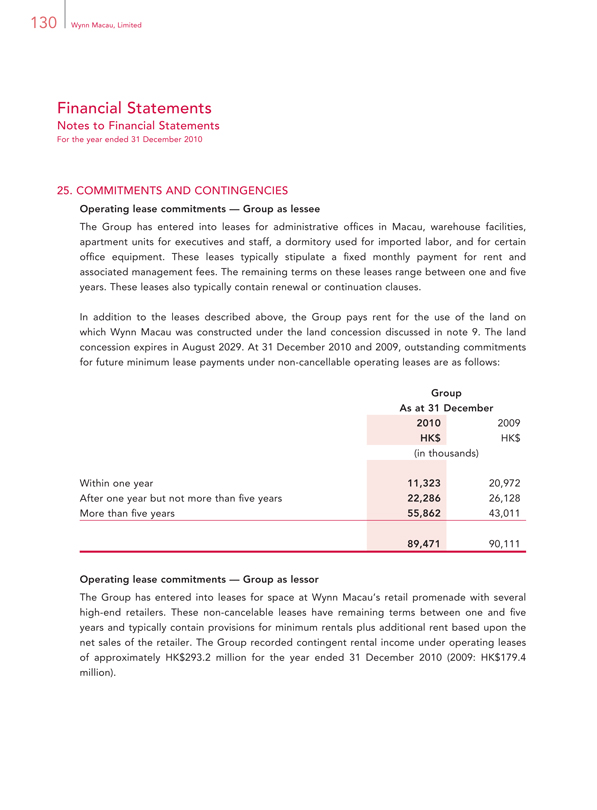
130 Wynn Macau, Limited Financial Statements Notes to Financial Statements For the year ended 31 December 2010 25. COMMITMENTS AND CONTINGENCIES Operating lease commitments — Group as lessee The Group has entered into leases for administrative offices in Macau, warehouse facilities, apartment units for executives and staff, a dormitory used for imported labor, and for certain office equipment. These leases typically stipulate a fixed monthly payment for rent and associated management fees. The remaining terms on these leases range between one and five years. These leases also typically contain renewal or continuation clauses. In addition to the leases described above, the Group pays rent for the use of the land on which Wynn Macau was constructed under the land concession discussed in note 9. The land concession expires in August 2029. At 31 December 2010 and 2009, outstanding commitments for future minimum lease payments under non-cancellable operating leases are as follows: Group As at 31 December 2010 2009 HK$ HK$ (in thousands) Within one year 11,323 20,972 After one year but not more than five years 22,286 26,128 More than five years 55,862 43,011 89,471 90,111 Operating lease commitments — Group as lessor The Group has entered into leases for space at Wynn Macau’s retail promenade with several high-end retailers. These non-cancelable leases have remaining terms between one and five years and typically contain provisions for minimum rentals plus additional rent based upon the net sales of the retailer. The Group recorded contingent rental income under operating leases of approximately HK$293.2 million for the year ended 31 December 2010 (2009: HK$179.4 million).
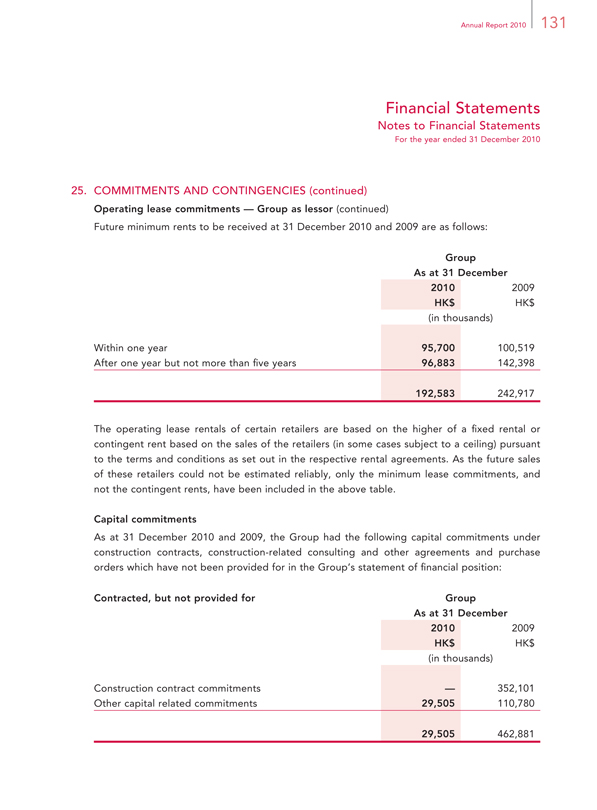
Annual Report 2010 131 Financial Statements Notes to Financial Statements For the year ended 31 December 2010 25. COMMITMENTS AND CONTINGENCIES (continued) Operating lease commitments — Group as lessor (continued) Future minimum rents to be received at 31 December 2010 and 2009 are as follows: Group As at 31 December 2010 2009 HK$ HK$ (in thousands) Within one year 95,700 100,519 After one year but not more than five years 96,883 142,398 192,583 242,917 The operating lease rentals of certain retailers are based on the higher of a fixed rental or contingent rent based on the sales of the retailers (in some cases subject to a ceiling) pursuant to the terms and conditions as set out in the respective rental agreements. As the future sales of these retailers could not be estimated reliably, only the minimum lease commitments, and not the contingent rents, have been included in the above table. Capital commitments As at 31 December 2010 and 2009, the Group had the following capital commitments under construction contracts, construction-related consulting and other agreements and purchase orders which have not been provided for in the Group’s statement of financial position: Contracted, but not provided for Group As at 31 December 2010 2009 HK$ HK$ (in thousands) Construction contract commitments — 352,101 Other capital related commitments 29,505 110,780 29,505 462,881
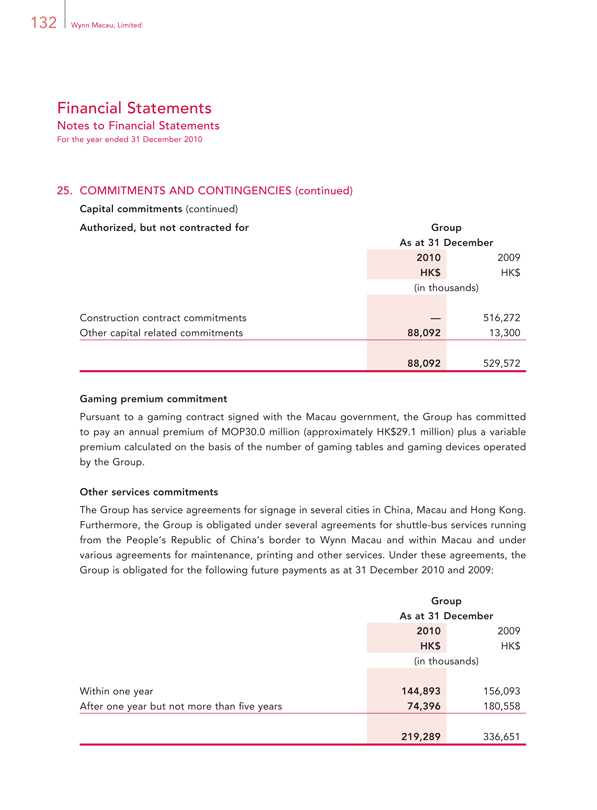
132 Wynn Macau, Limited Financial Statements Notes to Financial Statements For the year ended 31 December 2010 25. COMMITMENTS AND CONTINGENCIES (continued) Capital commitments (continued) Authorized, but not contracted for Group As at 31 December 2010 2009 HK$ HK$ (in thousands) Construction contract commitments — 516,272 Other capital related commitments 88,092 13,300 88,092 529,572 Gaming premium commitment Pursuant to a gaming contract signed with the Macau government, the Group has committed to pay an annual premium of MOP30.0 million (approximately HK$29.1 million) plus a variable premium calculated on the basis of the number of gaming tables and gaming devices operated by the Group. Other services commitments The Group has service agreements for signage in several cities in China, Macau and Hong Kong. Furthermore, the Group is obligated under several agreements for shuttle-bus services running from the People’s Republic of China’s border to Wynn Macau and within Macau and under various agreements for maintenance, printing and other services. Under these agreements, the Group is obligated for the following future payments as at 31 December 2010 and 2009: Group As at 31 December 2010 2009 HK$ HK$ (in thousands) Within one year 144,893 156,093 After one year but not more than five years 74,396 180,558 219,289 336,651
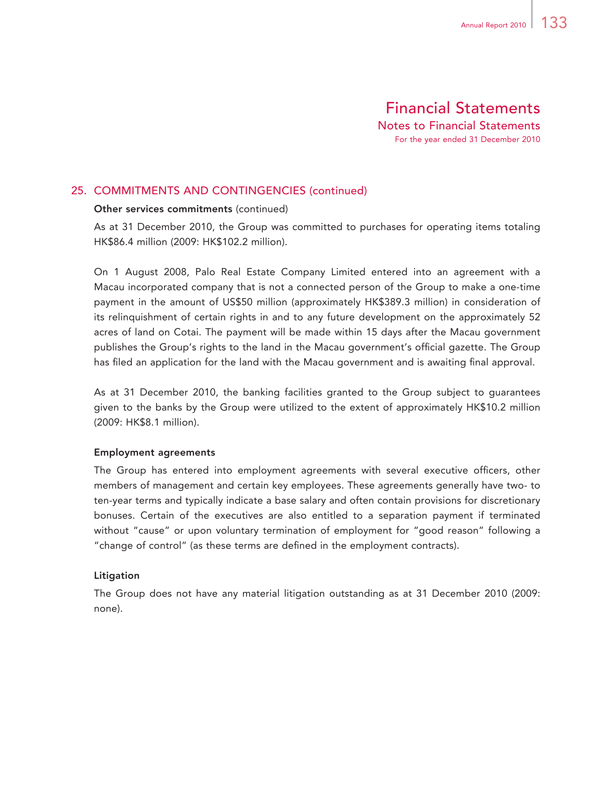
Annual Report 2010 133 Financial Statements Notes to Financial Statements For the year ended 31 December 2010 25. COMMITMENTS AND CONTINGENCIES (continued) Other services commitments (continued) As at 31 December 2010, the Group was committed to purchases for operating items totaling HK$86.4 million (2009: HK$102.2 million). On 1 August 2008, Palo Real Estate Company Limited entered into an agreement with a Macau incorporated company that is not a connected person of the Group to make a one-time payment in the amount of US$50 million (approximately HK$389.3 million) in consideration of its relinquishment of certain rights in and to any future development on the approximately 52 acres of land on Cotai. The payment will be made within 15 days after the Macau government publishes the Group’s rights to the land in the Macau government’s official gazette. The Group has filed an application for the land with the Macau government and is awaiting final approval. As at 31 December 2010, the banking facilities granted to the Group subject to guarantees given to the banks by the Group were utilized to the extent of approximately HK$10.2 million (2009: HK$8.1 million). Employment agreements The Group has entered into employment agreements with several executive officers, other members of management and certain key employees. These agreements generally have two- to ten-year terms and typically indicate a base salary and often contain provisions for discretionary bonuses. Certain of the executives are also entitled to a separation payment if terminated without “cause” or upon voluntary termination of employment for “good reason” following a “change of control” (as these terms are defined in the employment contracts). Litigation The Group does not have any material litigation outstanding as at 31 December 2010 (2009: none).
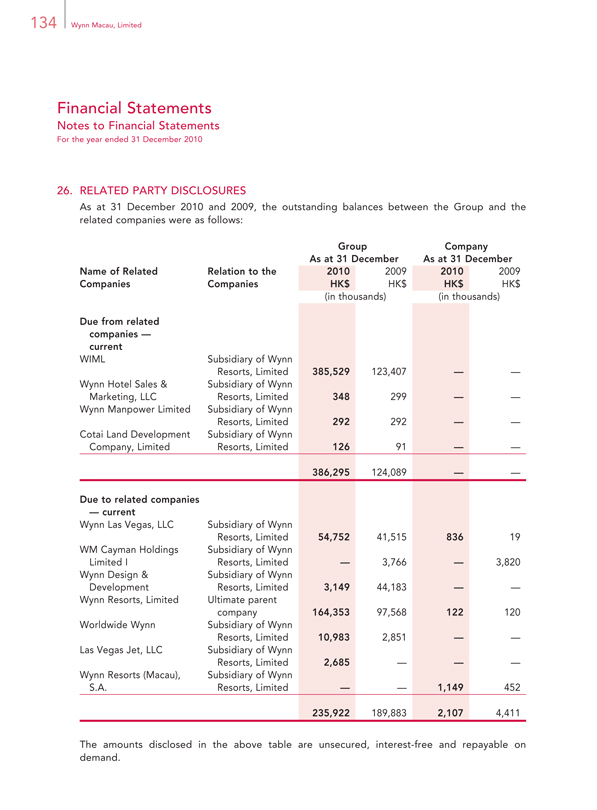
134 Wynn Macau, Limited Financial Statements Notes to Financial Statements For the year ended 31 December 2010 26. RELATED PARTY DISCLOSURES As at 31 December 2010 and 2009, the outstanding balances between the Group and the related companies were as follows: Group Company As at 31 December As at 31 December Name of Related Relation to the 2010 2009 2010 2009 Companies Companies HK$ HK$ HK$ HK$ (in thousands) (in thousands) Due from related companies — current WIML Subsidiary of Wynn Resorts, Limited 385,529 123,407 — —Wynn Hotel Sales & Subsidiary of Wynn Marketing, LLC Resorts, Limited 348 299 — —Wynn Manpower Limited Subsidiary of Wynn Resorts, Limited 292 292 — —Cotai Land Development Subsidiary of Wynn Company, Limited Resorts, Limited 126 91 — — 386,295 124,089 — — Due to related companies — current Wynn Las Vegas, LLC Subsidiary of Wynn Resorts, Limited 54,752 41,515 836 19 WM Cayman Holdings Subsidiary of Wynn Limited I Resorts, Limited — 3,766 — 3,820 Wynn Design & Subsidiary of Wynn Development Resorts, Limited 3,149 44,183 — —Wynn Resorts, Limited Ultimate parent company 164,353 97,568 122 120 Worldwide Wynn Subsidiary of Wynn Resorts, Limited 10,983 2,851 — —Las Vegas Jet, LLC Subsidiary of Wynn Resorts, Limited 2,685 — — —Wynn Resorts (Macau), Subsidiary of Wynn S.A. Resorts, Limited — — 1,149 452 235,922 189,883 2,107 4,411 The amounts disclosed in the above table are unsecured, interest-free and repayable on demand.
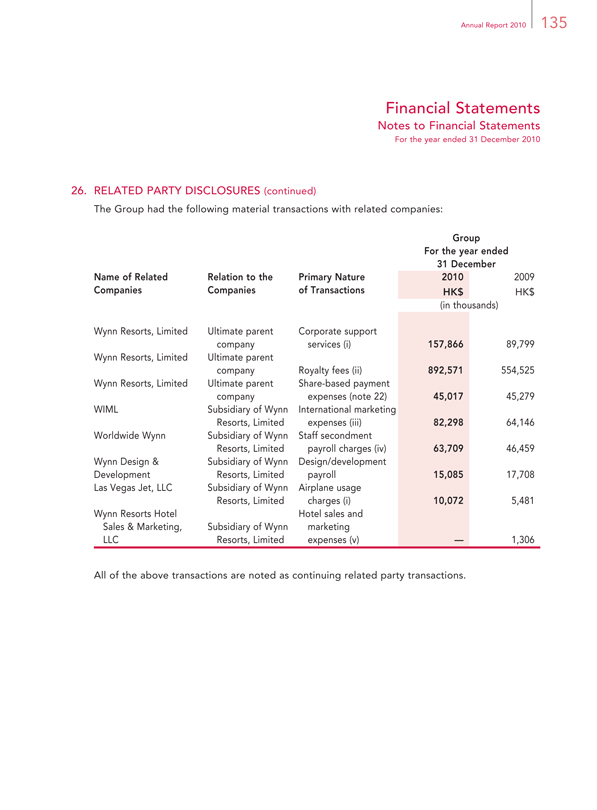
Annual Report 2010 135 Financial Statements Notes to Financial Statements For the year ended 31 December 2010 26. RELATED PARTY DISCLOSURES (continued) The Group had the following material transactions with related companies: Group For the year ended 31 December Name of Related Relation to the Primary Nature 2010 2009 Companies Companies of Transactions HK$ HK$ (in thousands) Wynn Resorts, Limited Ultimate parent Corporate support company services (i) 157,866 89,799 Wynn Resorts, Limited Ultimate parent company Royalty fees (ii) 892,571 554,525 Wynn Resorts, Limited Ultimate parent Share-based payment company expenses (note 22) 45,017 45,279 WIML Subsidiary of Wynn International marketing Resorts, Limited expenses (iii) 82,298 64,146 Worldwide Wynn Subsidiary of Wynn Staff secondment Resorts, Limited payroll charges (iv) 63,709 46,459 Wynn Design & Subsidiary of Wynn Design/development Development Resorts, Limited payroll 15,085 17,708 Las Vegas Jet, LLC Subsidiary of Wynn Airplane usage Resorts, Limited charges (i) 10,072 5,481 Wynn Resorts Hotel Hotel sales and Sales & Marketing, Subsidiary of Wynn marketing LLC Resorts, Limited expenses (v) — 1,306 All of the above transactions are noted as continuing related party transactions.
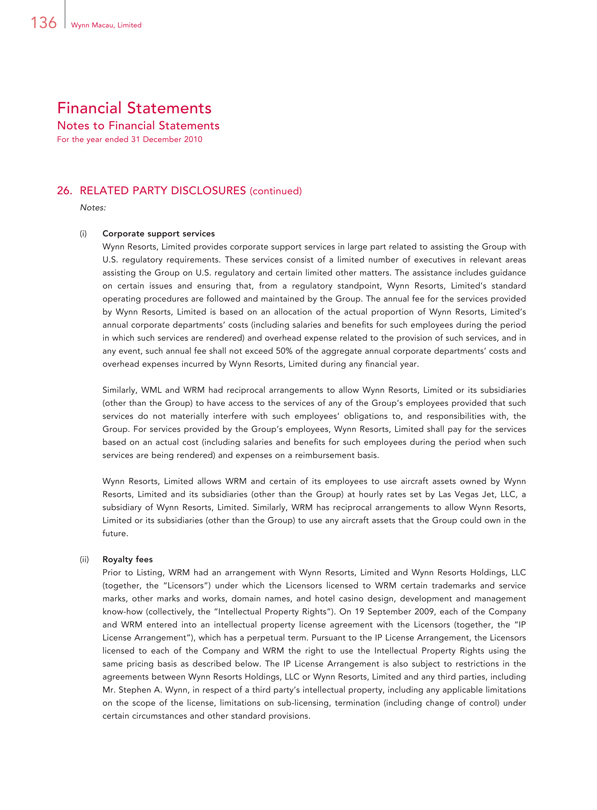
136 Wynn Macau, Limited Financial Statements Notes to Financial Statements For the year ended 31 December 2010 26. RELATED PARTY DISCLOSURES (continued) Notes: (i) Corporate support services Wynn Resorts, Limited provides corporate support services in large part related to assisting the Group with U.S. regulatory requirements. These services consist of a limited number of executives in relevant areas assisting the Group on U.S. regulatory and certain limited other matters. The assistance includes guidance on certain issues and ensuring that, from a regulatory standpoint, Wynn Resorts, Limited’s standard operating procedures are followed and maintained by the Group. The annual fee for the services provided by Wynn Resorts, Limited is based on an allocation of the actual proportion of Wynn Resorts, Limited’s annual corporate departments’ costs (including salaries and benefits for such employees during the period in which such services are rendered) and overhead expense related to the provision of such services, and in any event, such annual fee shall not exceed 50% of the aggregate annual corporate departments’ costs and overhead expenses incurred by Wynn Resorts, Limited during any financial year. Similarly, WML and WRM had reciprocal arrangements to allow Wynn Resorts, Limited or its subsidiaries (other than the Group) to have access to the services of any of the Group’s employees provided that such services do not materially interfere with such employees’ obligations to, and responsibilities with, the Group. For services provided by the Group’s employees, Wynn Resorts, Limited shall pay for the services based on an actual cost (including salaries and benefits for such employees during the period when such services are being rendered) and expenses on a reimbursement basis. Wynn Resorts, Limited allows WRM and certain of its employees to use aircraft assets owned by Wynn Resorts, Limited and its subsidiaries (other than the Group) at hourly rates set by Las Vegas Jet, LLC, a subsidiary of Wynn Resorts, Limited. Similarly, WRM has reciprocal arrangements to allow Wynn Resorts, Limited or its subsidiaries (other than the Group) to use any aircraft assets that the Group could own in the future. (ii) Royalty fees Prior to Listing, WRM had an arrangement with Wynn Resorts, Limited and Wynn Resorts Holdings, LLC (together, the “Licensors”) under which the Licensors licensed to WRM certain trademarks and service marks, other marks and works, domain names, and hotel casino design, development and management know-how (collectively, the “Intellectual Property Rights”). On 19 September 2009, each of the Company and WRM entered into an intellectual property license agreement with the Licensors (together, the “IP License Arrangement”), which has a perpetual term. Pursuant to the IP License Arrangement, the Licensors licensed to each of the Company and WRM the right to use the Intellectual Property Rights using the same pricing basis as described below. The IP License Arrangement is also subject to restrictions in the agreements between Wynn Resorts Holdings, LLC or Wynn Resorts, Limited and any third parties, including Mr. Stephen A. Wynn, in respect of a third party’s intellectual property, including any applicable limitations on the scope of the license, limitations on sub-licensing, termination (including change of control) under certain circumstances and other standard provisions.
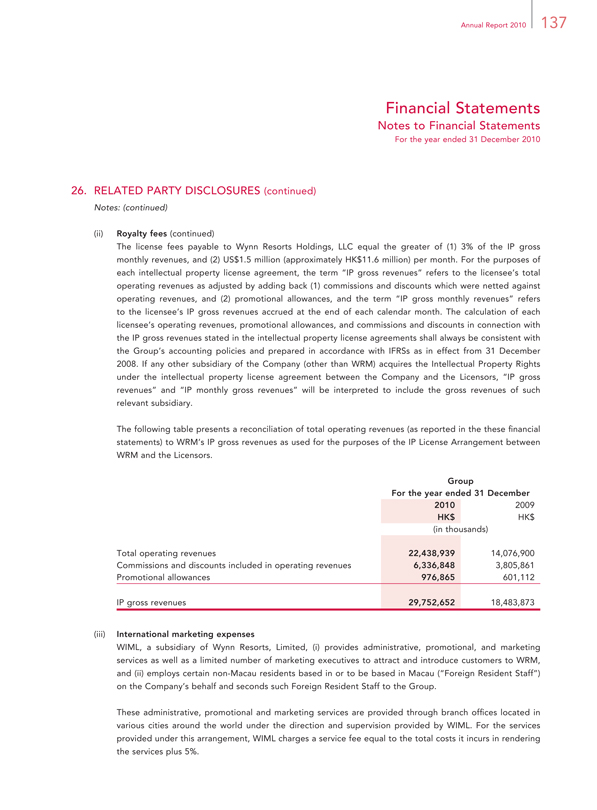
Annual Report 2010 137 Financial Statements Notes to Financial Statements For the year ended 31 December 2010 26. RELATED PARTY DISCLOSURES (continued) Notes: (continued) (ii) Royalty fees (continued) The license fees payable to Wynn Resorts Holdings, LLC equal the greater of (1) 3% of the IP gross monthly revenues, and (2) US$1.5 million (approximately HK$11.6 million) per month. For the purposes of each intellectual property license agreement, the term “IP gross revenues” refers to the licensee’s total operating revenues as adjusted by adding back (1) commissions and discounts which were netted against operating revenues, and (2) promotional allowances, and the term “IP gross monthly revenues” refers to the licensee’s IP gross revenues accrued at the end of each calendar month. The calculation of each licensee’s operating revenues, promotional allowances, and commissions and discounts in connection with the IP gross revenues stated in the intellectual property license agreements shall always be consistent with the Group’s accounting policies and prepared in accordance with IFRSs as in effect from 31 December 2008. If any other subsidiary of the Company (other than WRM) acquires the Intellectual Property Rights under the intellectual property license agreement between the Company and the Licensors, “IP gross revenues” and “IP monthly gross revenues” will be interpreted to include the gross revenues of such relevant subsidiary. The following table presents a reconciliation of total operating revenues (as reported in the these financial statements) to WRM’s IP gross revenues as used for the purposes of the IP License Arrangement between WRM and the Licensors. Group For the year ended 31 December 2010 2009 HK$ HK$ (in thousands) Total operating revenues 22,438,939 14,076,900 Commissions and discounts included in operating revenues 6,336,848 3,805,861 Promotional allowances 976,865 601,112 IP gross revenues 29,752,652 18,483,873 (iii) International marketing expenses WIML, a subsidiary of Wynn Resorts, Limited, (i) provides administrative, promotional, and marketing services as well as a limited number of marketing executives to attract and introduce customers to WRM, and (ii) employs certain non-Macau residents based in or to be based in Macau (“Foreign Resident Staff”) on the Company’s behalf and seconds such Foreign Resident Staff to the Group. These administrative, promotional and marketing services are provided through branch offices located in various cities around the world under the direction and supervision provided by WIML. For the services provided under this arrangement, WIML charges a service fee equal to the total costs it incurs in rendering the services plus 5%.
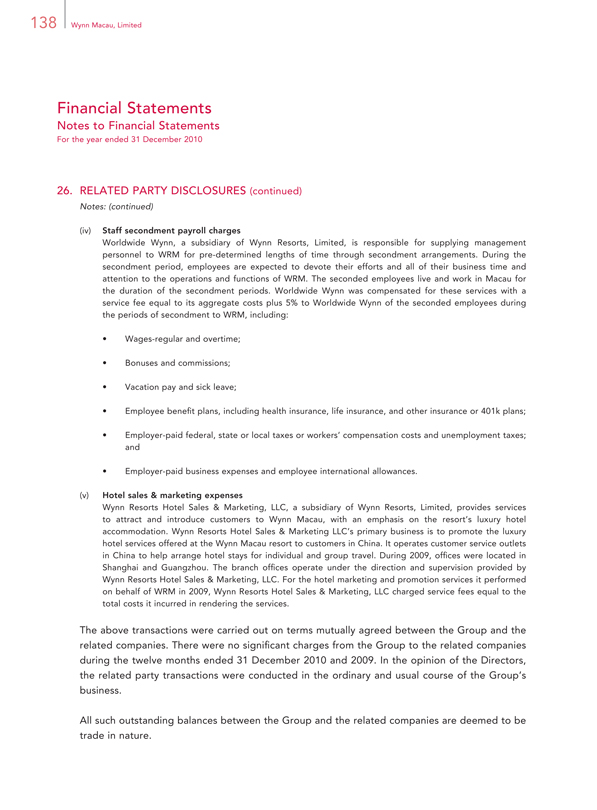
138 Wynn Macau, Limited Financial Statements Notes to Financial Statements For the year ended 31 December 2010 26. RELATED PARTY DISCLOSURES (continued) Notes: (continued) (iv) Staff secondment payroll charges Worldwide Wynn, a subsidiary of Wynn Resorts, Limited, is responsible for supplying management personnel to WRM for pre-determined lengths of time through secondment arrangements. During the secondment period, employees are expected to devote their efforts and all of their business time and attention to the operations and functions of WRM. The seconded employees live and work in Macau for the duration of the secondment periods. Worldwide Wynn was compensated for these services with a service fee equal to its aggregate costs plus 5% to Worldwide Wynn of the seconded employees during the periods of secondment to WRM, including: • Wages-regular and overtime; • Bonuses and commissions; • Vacation pay and sick leave; • Employee benefit plans, including health insurance, life insurance, and other insurance or 401k plans; • Employer-paid federal, state or local taxes or workers’ compensation costs and unemployment taxes; and • Employer-paid business expenses and employee international allowances. (v) Hotel sales & marketing expenses Wynn Resorts Hotel Sales & Marketing, LLC, a subsidiary of Wynn Resorts, Limited, provides services to attract and introduce customers to Wynn Macau, with an emphasis on the resort’s luxury hotel accommodation. Wynn Resorts Hotel Sales & Marketing LLC’s primary business is to promote the luxury hotel services offered at the Wynn Macau resort to customers in China. It operates customer service outlets in China to help arrange hotel stays for individual and group travel. During 2009, offices were located in Shanghai and Guangzhou. The branch offices operate under the direction and supervision provided by Wynn Resorts Hotel Sales & Marketing, LLC. For the hotel marketing and promotion services it performed on behalf of WRM in 2009, Wynn Resorts Hotel Sales & Marketing, LLC charged service fees equal to the total costs it incurred in rendering the services. The above transactions were carried out on terms mutually agreed between the Group and the related companies. There were no significant charges from the Group to the related companies during the twelve months ended 31 December 2010 and 2009. In the opinion of the Directors, the related party transactions were conducted in the ordinary and usual course of the Group’s business. All such outstanding balances between the Group and the related companies are deemed to be trade in nature.
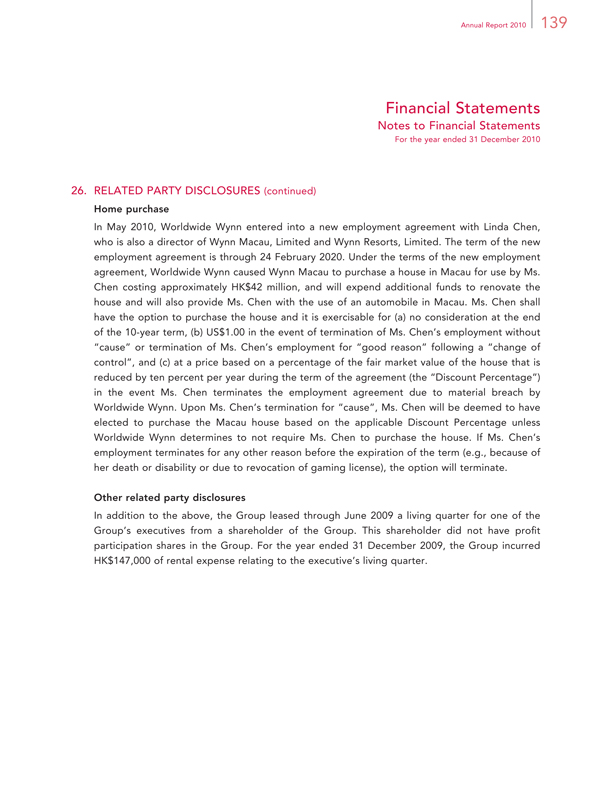
Annual Report 2010 139 Financial Statements Notes to Financial Statements For the year ended 31 December 2010 26. RELATED PARTY DISCLOSURES (continued) Home purchase In May 2010, Worldwide Wynn entered into a new employment agreement with Linda Chen, who is also a director of Wynn Macau, Limited and Wynn Resorts, Limited. The term of the new employment agreement is through 24 February 2020. Under the terms of the new employment agreement, Worldwide Wynn caused Wynn Macau to purchase a house in Macau for use by Ms. Chen costing approximately HK$42 million, and will expend additional funds to renovate the house and will also provide Ms. Chen with the use of an automobile in Macau. Ms. Chen shall have the option to purchase the house and it is exercisable for (a) no consideration at the end of the 10-year term, (b) US$1.00 in the event of termination of Ms. Chen’s employment without “cause” or termination of Ms. Chen’s employment for “good reason” following a “change of control”, and (c) at a price based on a percentage of the fair market value of the house that is reduced by ten percent per year during the term of the agreement (the “Discount Percentage”) in the event Ms. Chen terminates the employment agreement due to material breach by Worldwide Wynn. Upon Ms. Chen’s termination for “cause”, Ms. Chen will be deemed to have elected to purchase the Macau house based on the applicable Discount Percentage unless Worldwide Wynn determines to not require Ms. Chen to purchase the house. If Ms. Chen’s employment terminates for any other reason before the expiration of the term (e.g., because of her death or disability or due to revocation of gaming license), the option will terminate. Other related party disclosures In addition to the above, the Group leased through June 2009 a living quarter for one of the Group’s executives from a shareholder of the Group. This shareholder did not have profit participation shares in the Group. For the year ended 31 December 2009, the Group incurred HK$147,000 of rental expense relating to the executive’s living quarter.
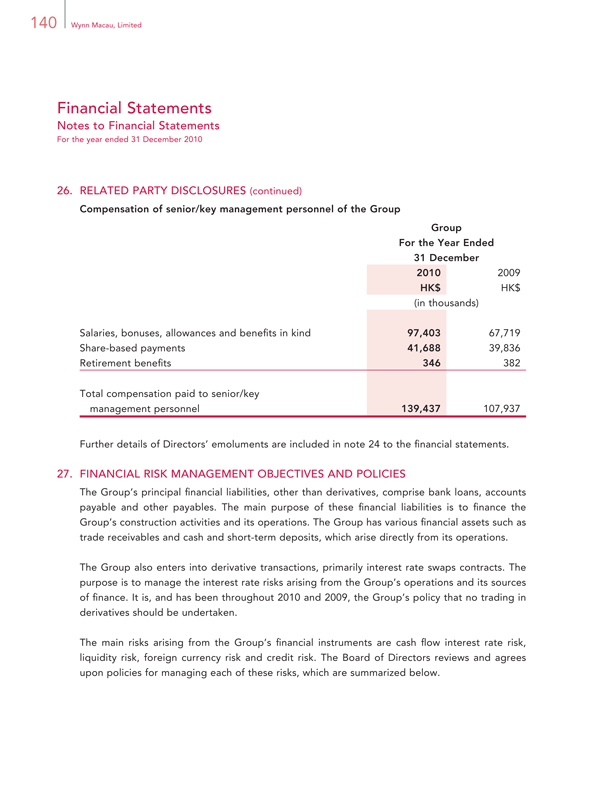
140 Wynn Macau, Limited Financial Statements Notes to Financial Statements For the year ended 31 December 2010 26. RELATED PARTY DISCLOSURES (continued) Compensation of senior/key management personnel of the Group Group For the Year Ended 31 December 2010 2009 HK$ HK$ (in thousands) Salaries, bonuses, allowances and benefits in kind 97,403 67,719 Share-based payments 41,688 39,836 Retirement benefits 346 382 Total compensation paid to senior/key management personnel 139,437 107,937 Further details of Directors’ emoluments are included in note 24 to the financial statements. 27. FINANCIAL RISK MANAGEMENT OBJECTIVES AND POLICIES The Group’s principal financial liabilities, other than derivatives, comprise bank loans, accounts payable and other payables. The main purpose of these financial liabilities is to finance the Group’s construction activities and its operations. The Group has various financial assets such as trade receivables and cash and short-term deposits, which arise directly from its operations. The Group also enters into derivative transactions, primarily interest rate swaps contracts. The purpose is to manage the interest rate risks arising from the Group’s operations and its sources of finance. It is, and has been throughout 2010 and 2009, the Group’s policy that no trading in derivatives should be undertaken. The main risks arising from the Group’s financial instruments are cash flow interest rate risk, liquidity risk, foreign currency risk and credit risk. The Board of Directors reviews and agrees upon policies for managing each of these risks, which are summarized below.
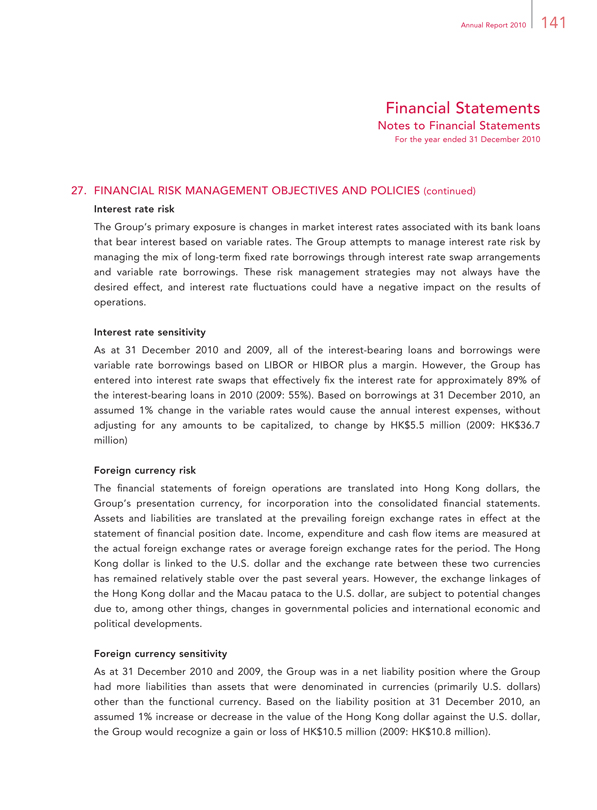
Annual Report 2010 141 Financial Statements Notes to Financial Statements For the year ended 31 December 2010 27. FINANCIAL RISK MANAGEMENT OBJECTIVES AND POLICIES (continued) Interest rate risk The Group’s primary exposure is changes in market interest rates associated with its bank loans that bear interest based on variable rates. The Group attempts to manage interest rate risk by managing the mix of long-term fixed rate borrowings through interest rate swap arrangements and variable rate borrowings. These risk management strategies may not always have the desired effect, and interest rate fluctuations could have a negative impact on the results of operations. Interest rate sensitivity As at 31 December 2010 and 2009, all of the interest-bearing loans and borrowings were variable rate borrowings based on LIBOR or HIBOR plus a margin. However, the Group has entered into interest rate swaps that effectively fix the interest rate for approximately 89% of the interest-bearing loans in 2010 (2009: 55%). Based on borrowings at 31 December 2010, an assumed 1% change in the variable rates would cause the annual interest expenses, without adjusting for any amounts to be capitalized, to change by HK$5.5 million (2009: HK$36.7 million) Foreign currency risk The financial statements of foreign operations are translated into Hong Kong dollars, the Group’s presentation currency, for incorporation into the consolidated financial statements. Assets and liabilities are translated at the prevailing foreign exchange rates in effect at the statement of financial position date. Income, expenditure and cash flow items are measured at the actual foreign exchange rates or average foreign exchange rates for the period. The Hong Kong dollar is linked to the U.S. dollar and the exchange rate between these two currencies has remained relatively stable over the past several years. However, the exchange linkages of the Hong Kong dollar and the Macau pataca to the U.S. dollar, are subject to potential changes due to, among other things, changes in governmental policies and international economic and political developments. Foreign currency sensitivity As at 31 December 2010 and 2009, the Group was in a net liability position where the Group had more liabilities than assets that were denominated in currencies (primarily U.S. dollars) other than the functional currency. Based on the liability position at 31 December 2010, an assumed 1% increase or decrease in the value of the Hong Kong dollar against the U.S. dollar, the Group would recognize a gain or loss of HK$10.5 million (2009: HK$10.8 million).
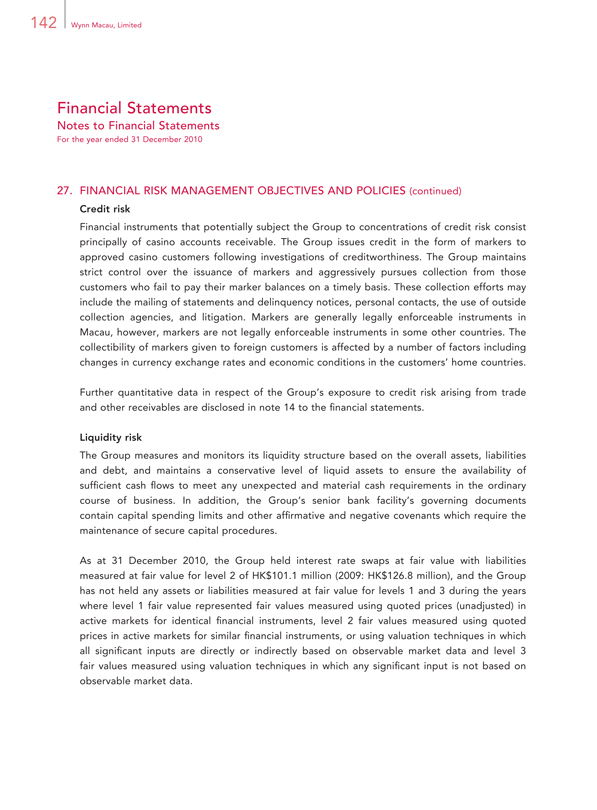
142 Wynn Macau, Limited Financial Statements Notes to Financial Statements For the year ended 31 December 2010 27. FINANCIAL RISK MANAGEMENT OBJECTIVES AND POLICIES (continued) Credit risk Financial instruments that potentially subject the Group to concentrations of credit risk consist principally of casino accounts receivable. The Group issues credit in the form of markers to approved casino customers following investigations of creditworthiness. The Group maintains strict control over the issuance of markers and aggressively pursues collection from those customers who fail to pay their marker balances on a timely basis. These collection efforts may include the mailing of statements and delinquency notices, personal contacts, the use of outside collection agencies, and litigation. Markers are generally legally enforceable instruments in Macau, however, markers are not legally enforceable instruments in some other countries. The collectibility of markers given to foreign customers is affected by a number of factors including changes in currency exchange rates and economic conditions in the customers’ home countries. Further quantitative data in respect of the Group’s exposure to credit risk arising from trade and other receivables are disclosed in note 14 to the financial statements. Liquidity risk The Group measures and monitors its liquidity structure based on the overall assets, liabilities and debt, and maintains a conservative level of liquid assets to ensure the availability of sufficient cash flows to meet any unexpected and material cash requirements in the ordinary course of business. In addition, the Group’s senior bank facility’s governing documents contain capital spending limits and other affirmative and negative covenants which require the maintenance of secure capital procedures. As at 31 December 2010, the Group held interest rate swaps at fair value with liabilities measured at fair value for level 2 of HK$101.1 million (2009: HK$126.8 million), and the Group has not held any assets or liabilities measured at fair value for levels 1 and 3 during the years where level 1 fair value represented fair values measured using quoted prices (unadjusted) in active markets for identical financial instruments, level 2 fair values measured using quoted prices in active markets for similar financial instruments, or using valuation techniques in which all significant inputs are directly or indirectly based on observable market data and level 3 fair values measured using valuation techniques in which any significant input is not based on observable market data.
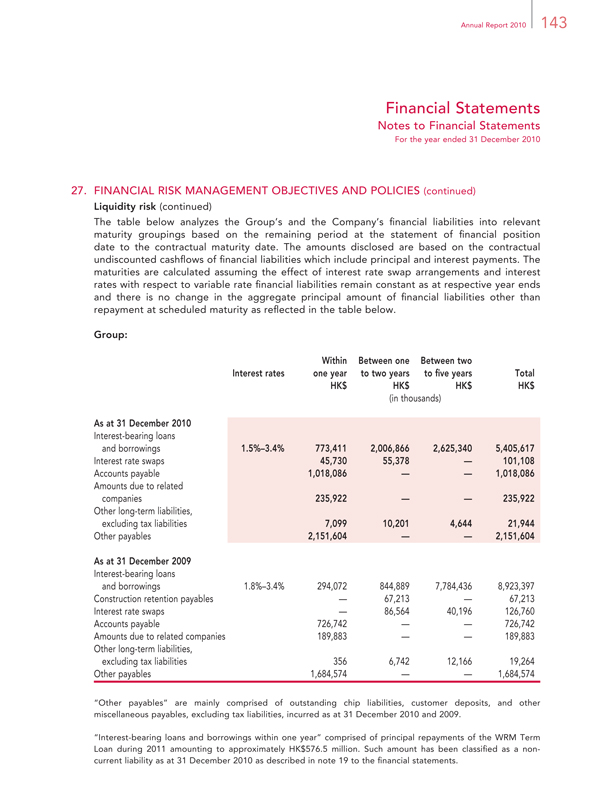
Annual Report 2010 143 Financial Statements Notes to Financial Statements For the year ended 31 December 2010 27. FINANCIAL RISK MANAGEMENT OBJECTIVES AND POLICIES (continued) Liquidity risk (continued) The table below analyzes the Group’s and the Company’s financial liabilities into relevant maturity groupings based on the remaining period at the statement of financial position date to the contractual maturity date. The amounts disclosed are based on the contractual undiscounted cashflows of financial liabilities which include principal and interest payments. The maturities are calculated assuming the effect of interest rate swap arrangements and interest rates with respect to variable rate financial liabilities remain constant as at respective year ends and there is no change in the aggregate principal amount of financial liabilities other than repayment at scheduled maturity as reflected in the table below. Group: Within Between one Between two Interest rates one year to two years to five years Total HK$ HK$ HK$ HK$ (in thousands) As at 31 December 2010 Interest-bearing loans and borrowings 1.5%–3.4% 773,411 2,006,866 2,625,340 5,405,617 Interest rate swaps 45,730 55,378 — 101,108 Accounts payable 1,018,086 — — 1,018,086 Amounts due to related companies 235,922 — — 235,922 Other long-term liabilities, excluding tax liabilities 7,099 10,201 4,644 21,944 Other payables 2,151,604 — — 2,151,604 As at 31 December 2009 Interest-bearing loans and borrowings 1.8%–3.4% 294,072 844,889 7,784,436 8,923,397 Construction retention payables — 67,213 — 67,213 Interest rate swaps — 86,564 40,196 126,760 Accounts payable 726,742 — — 726,742 Amounts due to related companies 189,883 — — 189,883 Other long-term liabilities, excluding tax liabilities 356 6,742 12,166 19,264 Other payables 1,684,574 — — 1,684,574 “Other payables” are mainly comprised of outstanding chip liabilities, customer deposits, and other miscellaneous payables, excluding tax liabilities, incurred as at 31 December 2010 and 2009. “Interest-bearing loans and borrowings within one year” comprised of principal repayments of the WRM Term Loan during 2011 amounting to approximately HK$576.5 million. Such amount has been classified as a non-current liability as at 31 December 2010 as described in note 19 to the financial statements.
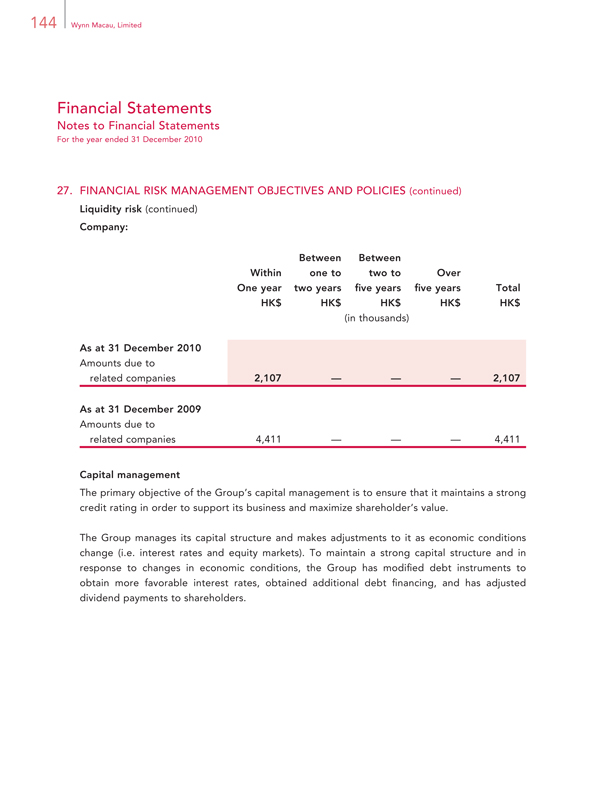
144 Wynn Macau, Limited Financial Statements Notes to Financial Statements For the year ended 31 December 2010 27. FINANCIAL RISK MANAGEMENT OBJECTIVES AND POLICIES (continued) Liquidity risk (continued) Company: Between Between Within one to two to Over One year two years five years five years Total HK$ HK$ HK$ HK$ HK$ (in thousands) As at 31 December 2010 Amounts due to related companies 2,107 — — — 2,107 As at 31 December 2009 Amounts due to related companies 4,411 — — — 4,411 Capital management The primary objective of the Group’s capital management is to ensure that it maintains a strong credit rating in order to support its business and maximize shareholder’s value. The Group manages its capital structure and makes adjustments to it as economic conditions change (i.e. interest rates and equity markets). To maintain a strong capital structure and in response to changes in economic conditions, the Group has modified debt instruments to obtain more favorable interest rates, obtained additional debt financing, and has adjusted dividend payments to shareholders.
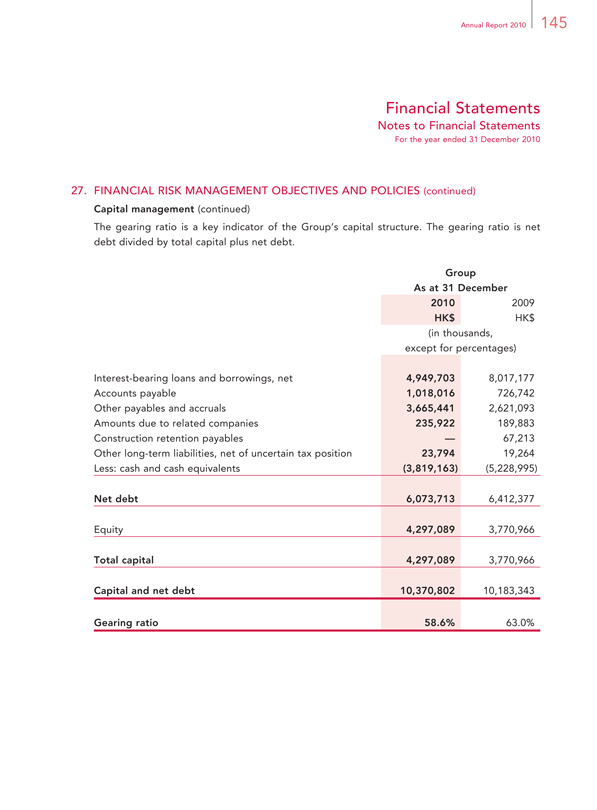
Annual Report 2010 145 Financial Statements Notes to Financial Statements For the year ended 31 December 2010 27. FINANCIAL RISK MANAGEMENT OBJECTIVES AND POLICIES (continued) Capital management (continued) The gearing ratio is a key indicator of the Group’s capital structure. The gearing ratio is net debt divided by total capital plus net debt. Group As at 31 December 2010 2009 HK$ HK$ (in thousands, except for percentages) Interest-bearing loans and borrowings, net 4,949,703 8,017,177 Accounts payable 1,018,016 726,742 Other payables and accruals 3,665,441 2,621,093 Amounts due to related companies 235,922 189,883 Construction retention payables — 67,213 Other long-term liabilities, net of uncertain tax position 23,794 19,264 Less: cash and cash equivalents (3,819,163) (5,228,995) Net debt 6,073,713 6,412,377 Equity 4,297,089 3,770,966 Total capital 4,297,089 3,770,966 Capital and net debt 10,370,802 10,183,343 Gearing ratio 58.6% 63.0%
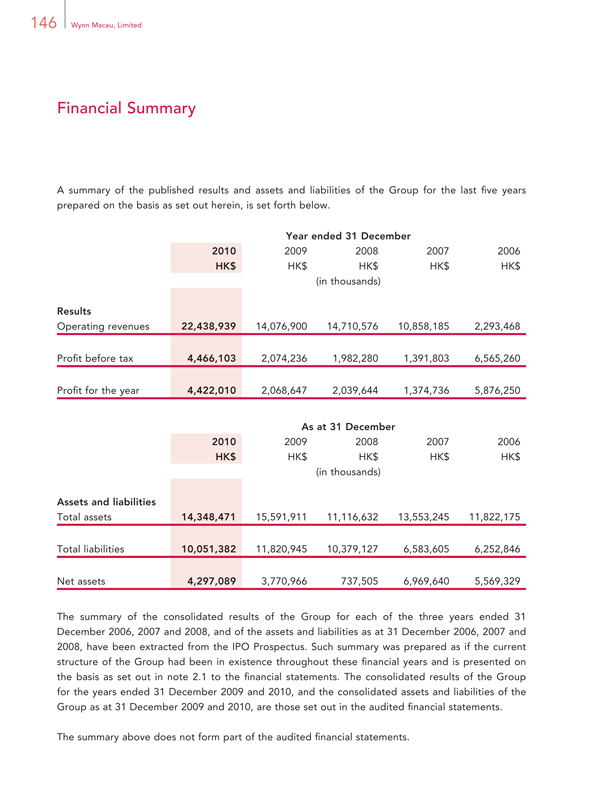
146 Wynn Macau, Limited Financial Summary A summary of the published results and assets and liabilities of the Group for the last five years prepared on the basis as set out herein, is set forth below. Year ended 31 December 2010 2009 2008 2007 2006 HK$ HK$ HK$ HK$ HK$ (in thousands) Results Operating revenues 22,438,939 14,076,900 14,710,576 10,858,185 2,293,468 Profit before tax 4,466,103 2,074,236 1,982,280 1,391,803 6,565,260 Profit for the year 4,422,010 2,068,647 2,039,644 1,374,736 5,876,250 As at 31 December 2010 2009 2008 2007 2006 HK$ HK$ HK$ HK$ HK$ (in thousands) Assets and liabilities Total assets 14,348,471 15,591,911 11,116,632 13,553,245 11,822,175 Total liabilities 10,051,382 11,820,945 10,379,127 6,583,605 6,252,846 Net assets 4,297,089 3,770,966 737,505 6,969,640 5,569,329 The summary of the consolidated results of the Group for each of the three years ended 31 December 2006, 2007 and 2008, and of the assets and liabilities as at 31 December 2006, 2007 and 2008, have been extracted from the IPO Prospectus. Such summary was prepared as if the current structure of the Group had been in existence throughout these financial years and is presented on the basis as set out in note 2.1 to the financial statements. The consolidated results of the Group for the years ended 31 December 2009 and 2010, and the consolidated assets and liabilities of the Group as at 31 December 2009 and 2010, are those set out in the audited financial statements. The summary above does not form part of the audited financial statements.
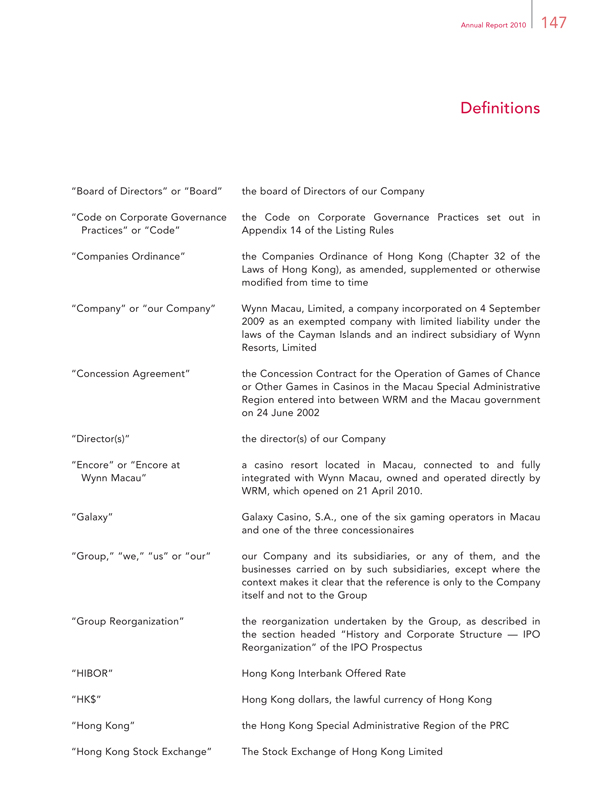
Annual Report 2010 147 Definitions “Board of Directors” or “Board” the board of Directors of our Company “Code on Corporate Governance the Code on Corporate Governance Practices set out in Practices” or “Code” Appendix 14 of the Listing Rules “Companies Ordinance” the Companies Ordinance of Hong Kong (Chapter 32 of the Laws of Hong Kong), as amended, supplemented or otherwise modified from time to time “Company” or “our Company” Wynn Macau, Limited, a company incorporated on 4 September 2009 as an exempted company with limited liability under the laws of the Cayman Islands and an indirect subsidiary of Wynn Resorts, Limited “Concession Agreement” the Concession Contract for the Operation of Games of Chance or Other Games in Casinos in the Macau Special Administrative Region entered into between WRM and the Macau government on 24 June 2002 “Director(s)” the director(s) of our Company “Encore” or “Encore at a casino resort located in Macau, connected to and fully Wynn Macau” integrated with Wynn Macau, owned and operated directly by WRM, which opened on 21 April 2010. “Galaxy” Galaxy Casino, S.A., one of the six gaming operators in Macau and one of the three concessionaires “Group,” “we,” “us” or “our” our Company and its subsidiaries, or any of them, and the businesses carried on by such subsidiaries, except where the context makes it clear that the reference is only to the Company itself and not to the Group “Group Reorganization” the reorganization undertaken by the Group, as described in the section headed “History and Corporate Structure — IPO Reorganization” of the IPO Prospectus “HIBOR” Hong Kong Interbank Offered Rate “HK$” Hong Kong dollars, the lawful currency of Hong Kong “Hong Kong” the Hong Kong Special Administrative Region of the PRC “Hong Kong Stock Exchange” The Stock Exchange of Hong Kong Limited
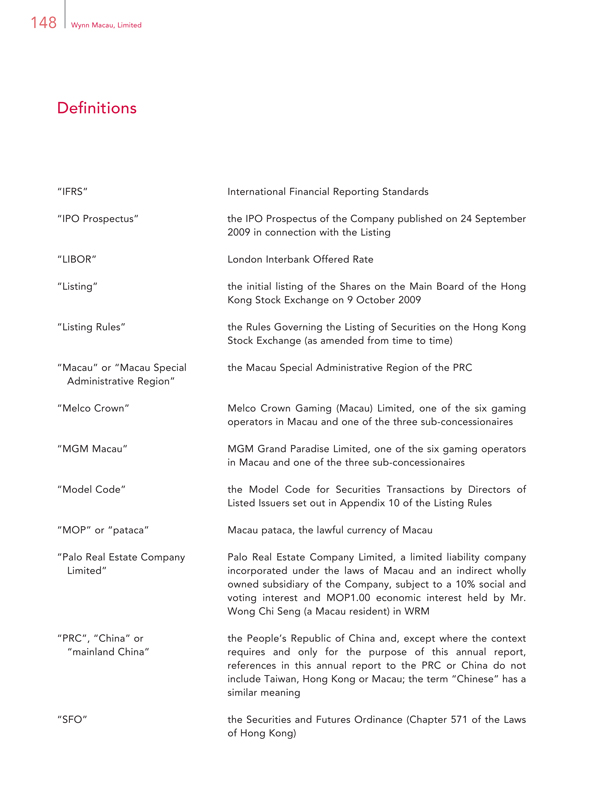
148 Wynn Macau, Limited Definitions “IFRS” International Financial Reporting Standards “IPO Prospectus” the IPO Prospectus of the Company published on 24 September 2009 in connection with the Listing “LIBOR” London Interbank Offered Rate “Listing” the initial listing of the Shares on the Main Board of the Hong Kong Stock Exchange on 9 October 2009 “Listing Rules” the Rules Governing the Listing of Securities on the Hong Kong Stock Exchange (as amended from time to time) “Macau” or “Macau Special the Macau Special Administrative Region of the PRC Administrative Region” “Melco Crown” Melco Crown Gaming (Macau) Limited, one of the six gaming operators in Macau and one of the three sub-concessionaires “MGM Macau” MGM Grand Paradise Limited, one of the six gaming operators in Macau and one of the three sub-concessionaires “Model Code” the Model Code for Securities Transactions by Directors of Listed Issuers set out in Appendix 10 of the Listing Rules “MOP” or “pataca” Macau pataca, the lawful currency of Macau “Palo Real Estate Company Palo Real Estate Company Limited, a limited liability company Limited” incorporated under the laws of Macau and an indirect wholly owned subsidiary of the Company, subject to a 10% social and voting interest and MOP1.00 economic interest held by Mr. Wong Chi Seng (a Macau resident) in WRM “PRC”, “China” or the People’s Republic of China and, except where the context “mainland China” requires and only for the purpose of this annual report, references in this annual report to the PRC or China do not include Taiwan, Hong Kong or Macau; the term “Chinese” has a similar meaning “SFO” the Securities and Futures Ordinance (Chapter 571 of the Laws of Hong Kong)
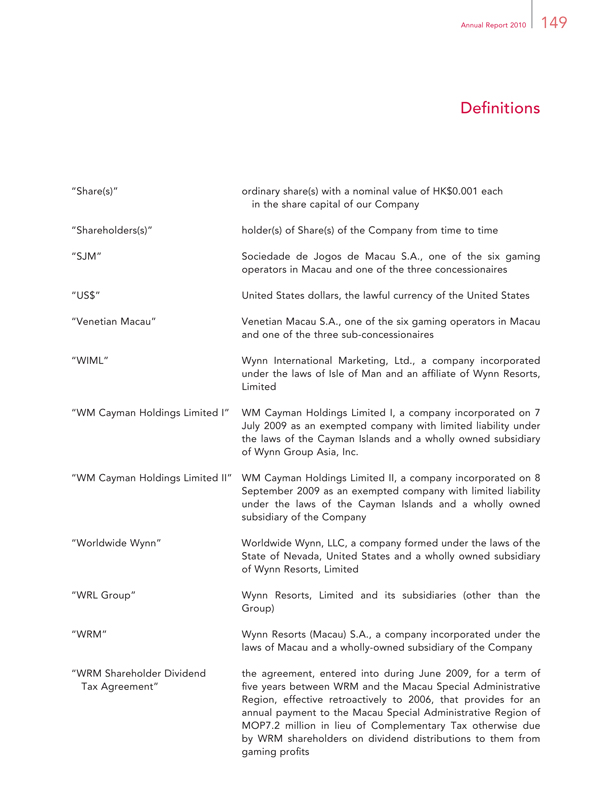
Annual Report 2010 149 Definitions “Share(s)” ordinary share(s) with a nominal value of HK$0.001 each in the share capital of our Company “Shareholders(s)” holder(s) of Share(s) of the Company from time to time “SJM” Sociedade de Jogos de Macau S.A., one of the six gaming operators in Macau and one of the three concessionaires “US$” United States dollars, the lawful currency of the United States “Venetian Macau” Venetian Macau S.A., one of the six gaming operators in Macau and one of the three sub-concessionaires “WIML” Wynn International Marketing, Ltd., a company incorporated under the laws of Isle of Man and an affiliate of Wynn Resorts, Limited “WM Cayman Holdings Limited I” WM Cayman Holdings Limited I, a company incorporated on 7 July 2009 as an exempted company with limited liability under the laws of the Cayman Islands and a wholly owned subsidiary of Wynn Group Asia, Inc. “WM Cayman Holdings Limited II” WM Cayman Holdings Limited II, a company incorporated on 8 September 2009 as an exempted company with limited liability under the laws of the Cayman Islands and a wholly owned subsidiary of the Company “Worldwide Wynn” Worldwide Wynn, LLC, a company formed under the laws of the State of Nevada, United States and a wholly owned subsidiary of Wynn Resorts, Limited “WRL Group” Wynn Resorts, Limited and its subsidiaries (other than the Group) “WRM” Wynn Resorts (Macau) S.A., a company incorporated under the laws of Macau and a wholly-owned subsidiary of the Company “WRM Shareholder Dividend the agreement, entered into during June 2009, for a term of Tax Agreement” five years between WRM and the Macau Special Administrative Region, effective retroactively to 2006, that provides for an annual payment to the Macau Special Administrative Region of MOP7.2 million in lieu of Complementary Tax otherwise due by WRM shareholders on dividend distributions to them from gaming profits
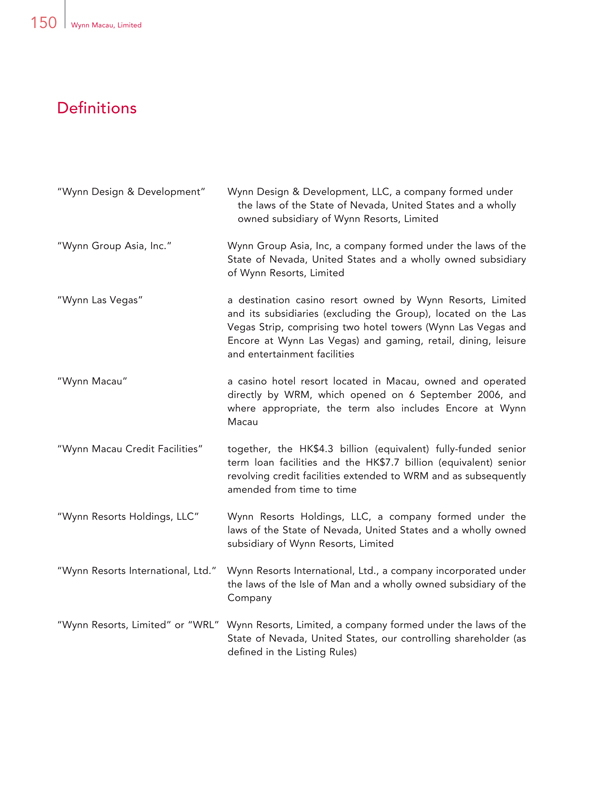
150 Wynn Macau, Limited Definitions “Wynn Design & Development” Wynn Design & Development, LLC, a company formed under the laws of the State of Nevada, United States and a wholly owned subsidiary of Wynn Resorts, Limited “Wynn Group Asia, Inc.” Wynn Group Asia, Inc, a company formed under the laws of the State of Nevada, United States and a wholly owned subsidiary of Wynn Resorts, Limited “Wynn Las Vegas” a destination casino resort owned by Wynn Resorts, Limited and its subsidiaries (excluding the Group), located on the Las Vegas Strip, comprising two hotel towers (Wynn Las Vegas and Encore at Wynn Las Vegas) and gaming, retail, dining, leisure and entertainment facilities “Wynn Macau” a casino hotel resort located in Macau, owned and operated directly by WRM, which opened on 6 September 2006, and where appropriate, the term also includes Encore at Wynn Macau “Wynn Macau Credit Facilities” together, the HK$4.3 billion (equivalent) fully-funded senior term loan facilities and the HK$7.7 billion (equivalent) senior revolving credit facilities extended to WRM and as subsequently amended from time to time “Wynn Resorts Holdings, LLC” Wynn Resorts Holdings, LLC, a company formed under the laws of the State of Nevada, United States and a wholly owned subsidiary of Wynn Resorts, Limited “Wynn Resorts International, Ltd.” Wynn Resorts International, Ltd., a company incorporated under the laws of the Isle of Man and a wholly owned subsidiary of the Company “Wynn Resorts, Limited” or “WRL” Wynn Resorts, Limited, a company formed under the laws of the State of Nevada, United States, our controlling shareholder (as defined in the Listing Rules)
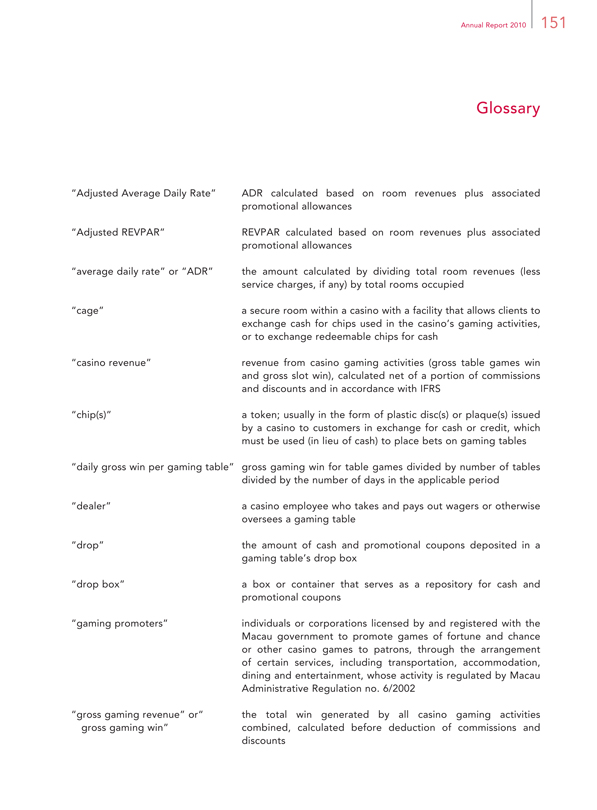
Annual Report 2010 151 Glossary “Adjusted Average Daily Rate” ADR calculated based on room revenues plus associated promotional allowances “Adjusted REVPAR” REVPAR calculated based on room revenues plus associated promotional allowances “average daily rate” or “ADR” the amount calculated by dividing total room revenues (less service charges, if any) by total rooms occupied “cage” a secure room within a casino with a facility that allows clients to exchange cash for chips used in the casino’s gaming activities, or to exchange redeemable chips for cash “casino revenue” revenue from casino gaming activities (gross table games win and gross slot win), calculated net of a portion of commissions and discounts and in accordance with IFRS “chip(s)” a token; usually in the form of plastic disc(s) or plaque(s) issued by a casino to customers in exchange for cash or credit, which must be used (in lieu of cash) to place bets on gaming tables “daily gross win per gaming table” gross gaming win for table games divided by number of tables divided by the number of days in the applicable period “dealer” a casino employee who takes and pays out wagers or otherwise oversees a gaming table “drop” the amount of cash and promotional coupons deposited in a gaming table’s drop box “drop box” a box or container that serves as a repository for cash and promotional coupons “gaming promoters” individuals or corporations licensed by and registered with the Macau government to promote games of fortune and chance or other casino games to patrons, through the arrangement of certain services, including transportation, accommodation, dining and entertainment, whose activity is regulated by Macau Administrative Regulation no. 6/2002 “gross gaming revenue” or” the total win generated by all casino gaming activities gross gaming win” combined, calculated before deduction of commissions and discounts
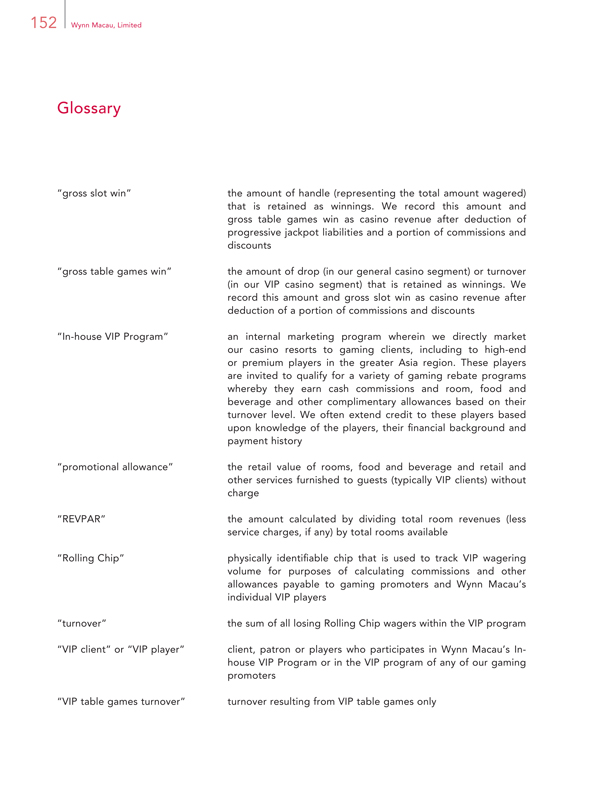
152 Wynn Macau, Limited Glossary “gross slot win” the amount of handle (representing the total amount wagered) that is retained as winnings. We record this amount and gross table games win as casino revenue after deduction of progressive jackpot liabilities and a portion of commissions and discounts “gross table games win” the amount of drop (in our general casino segment) or turnover (in our VIP casino segment) that is retained as winnings. We record this amount and gross slot win as casino revenue after deduction of a portion of commissions and discounts “In-house VIP Program” an internal marketing program wherein we directly market our casino resorts to gaming clients, including to high-end or premium players in the greater Asia region. These players are invited to qualify for a variety of gaming rebate programs whereby they earn cash commissions and room, food and beverage and other complimentary allowances based on their turnover level. We often extend credit to these players based upon knowledge of the players, their financial background and payment history “promotional allowance” the retail value of rooms, food and beverage and retail and other services furnished to guests (typically VIP clients) without charge “REVPAR” the amount calculated by dividing total room revenues (less service charges, if any) by total rooms available “Rolling Chip” physically identifiable chip that is used to track VIP wagering volume for purposes of calculating commissions and other allowances payable to gaming promoters and Wynn Macau’s individual VIP players “turnover” the sum of all losing Rolling Chip wagers within the VIP program “VIP client” or “VIP player” client, patron or players who participates in Wynn Macau’s In-house VIP Program or in the VIP program of any of our gaming promoters “VIP table games turnover” turnover resulting from VIP table games only

Wynn Macau, Limited Rua Cidade de Sintra, NAPE, Macau (853) 2888-9966 www.wynnmacau.com

























































































































































